


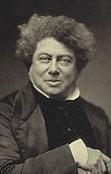



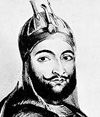






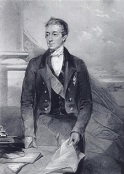
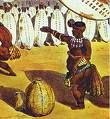


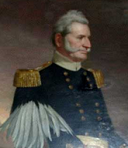


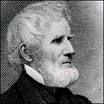




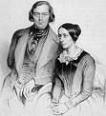







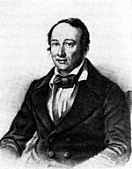
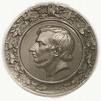









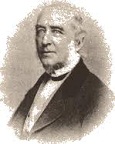








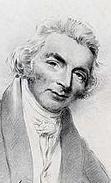


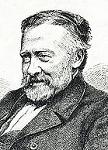
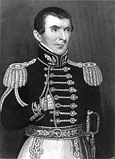



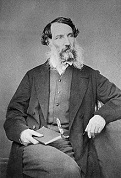

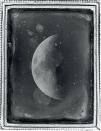





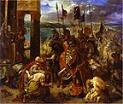



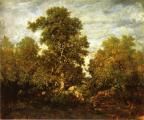
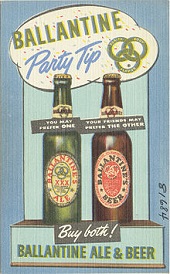
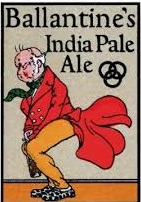
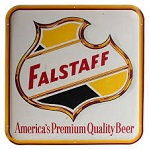
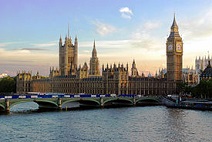
1840 Pop.: Great Britain: 18.5M; Ireland: 8M. The Sixth (6th) U.S. Census reports a total pop. of 17,069,043 (9.8 per sq. mi.); New York City: 313K. Life expectancy in industrialized countries begins to increase by one-quarter of a year (3 mo.) per year. The U.S. struggles with a severe economic depression this year, brought about by the Panic of 1837; meanwhile in this decade Irish-Ams. send $1M back to relatives in Ireland and encourage them to immigrate. I fooled around and fell in love, yes I did? Mass slaughter of the 36M buffalo (bison) in the U.S. begins at the rate of 1M-2M a year under a U.S. govt. policy to "settle the vexed Indian question"; by 1875 only 5.5M remain, down to 541 in 1889 and 300 in 1900; in 1875 Gen. Philip Sheridan tells the Tex. legislature that whites should "kill, skin and sell until the buffaloes are exterminated. Then your prairie can be covered with speckled cattle and the festive cowboy - the forerunner of an advanced civilization." China has one-third of world GDP, which begins plummeting in the two Opium Wars, bottoming out at 2% by 1980, then rising to 15% by 2013. The Second Industrial Rev. begins about this time, bringing railroads, large-scale steel production, increased use of steam power and petroleum, mass production, and factory electrification. This year is classified as a fun-with-Bambi Messianic Year by the Qabbalists (Kabbalists) in Europe, maybe because the Ottomans reestablish control of Jerusalem , which has a pop. of 10,750 incl. 3K Jews and 3,359 Christians, giving foreigners permission to buy land in 1850, after which the Jewish pop. zooms, becoming the majority group in 1850 (6K vs. 5,350 Muslims and 3,650 Christians), followed by 8K in in 1860, 11K in 1870, 17K in 1880, 25K in 1890, 35K in 1900, 45K in 1910, and 34.4K in 1921. Between this year and 1900 7M U.S. patents are granted. By this year there are 494 steamboats operating on midwest U.S. rivers. By this year there are 2,816 mi. of railroads in operation in the U.S. and 1,331 in England. On Jan. 13 the steamboat Lexington burns in Long Island Sound with the loss of over 100 lives; four days later a lithograph by Culithograph in the New York Sun by Currier and Ives becomes the first line diagram to illustrate a current event in a U.S. newspaper; the career of Currier and Ives in New York City (founded 1834) is launched, going on to pub. 7K+ different 10-cent prints in a factory with hundreds of employees until 1907. On Jan. 17 the Repub. of the Rio Grande in NE Mexico proclaims independence from Mexico; too bad, the rebellion is quashed by Nov. 6. In Jan. Zulu chief (since 1828) Dingane is overthrown and killed by his half-brother Mpande (1798-1872) (also half-brother of Shaka) with the help of Andries Pretorius and 400 burghers, and he becomes Zulu chief (until 1872) (longest ruling); meanwhile Mzilikazi (Mosilikatze) ("Great Road") (1790-1868), a former lt. of Shaka Zulu who rebelled in 1823 and fled to exile with his Khumalo tribe, first to Mozambique then to Transvaal founds Matabeleland in modern-day Zimbabwe between the Zambezi and Limpopo Rivers, with capital in Bulawayo ("town of the persecuted one") (modern-day pop. 1.2M), named after Shaka Zulu's capital. On Feb. 6 the Treaty of Waitangi is signed with the Maori, promising British protection of Maori land in protection for recognizing British rule, and the British formally annex New Zealand, founding the city of Auckland on the Tasman Sea on the N side of North Island (modern-day pop. 1.6M), named for India gov.-gen. (1836-42) George Eden, 1st Earl of Auckland (1784-1849), which next year becomes the capital until 1865 - I roamed under it as a tired nude Maori? That comes out just right? On Feb. 10 after she can't stand living with her mother and proposes to him on Oct. 15, 1839 on his 2nd visit, Queen Alexandrina Victoria (1819-1901) marries her 1st cousin (nephew of her mother) Prince Albert of Saxe-Coburg-Gotha (1819-61) in St. James's Palace, in London; she is given away by her favorite uncle (6th son of George III) Prince Augustus Frederick, Duke of Sussex (1773-1843); she becomes the first English royal bride to forgo the traditional heavy brocade dress, wearing a white satin gown trimmed with orange blossoms and lace (from her widow pics, what happened?); Princess Victoria (Vicky) Adelaide (1840-1901), their first of nine children is born on Nov. 22, followed by future king Edward VII (big disappointment to his mommy?) Albert Edward, Prince of Wales (1841-1910); too bad for Liberals, her hubby takes charge and turns her back to the Conservative view. In Feb. German physician Julius Robert von Mayer (1814-78) sails from Rotterdam in the 3-masted ship Java, and after docking at Surabaya he notices that the venous blood of sailors he's bleeding is brighter red, indicating less oxygen being consumed than in colder climates, causing him to have a bright idea that food is oxidized to create not only animal heat but work, hence that heat and work are interchangeable in some way. On Mar. 19 the Council House Fight (Massacre) in San Antonio, Tex. sees white Texians pissed-off at the failure of a delegation of Comanche chiefs to release white POWs massacre 12 chiefs inside the Council House, murder 23 more on the streets, and take 30 POW, causing the pissed-off Comanches to stage the Great Raid of 1840 on Aug. 7 in Victoria and Linnville, Tex., killing 41, becoming the largest Native Am. raid on a U.S. white city (until ?), after which the Battle of Plum Creek near Lockhart, Tex. on Aug. 12 sees 1K Comanches under Chief Buffalo Hump (-1870) defeated by 200 Rangers and Tex. militia led by Col. Edward Burleson and Tonkawa chief Placido. On Apr. 15 Daniel O'Connell founds the Repeal Assoc. in Ireland to campaign for a repeal of the 1800 Act of Union between Ireland and Great Britain, and works for cooperation between Catholics and Protestants (mainly Presbyterians in Ulster) in fighting for Irish home rule. On Apr. 20 S.C.-born Barnard Elliott Bee Sr. (1787-1853) is appointed as ambassador to the U.S. by Texas after he went to Mexico last year and tried unsuccessfully to negotiate peace and permanent borders; he goes on to negotiate the recognition of Texas with Daniel Webster, which is achieved next Dec. 13; after Texas is annexed in 1845, pissed-off Bee returns to his native S.C., and his two sons later become Confed. gens., and Bernard Jr. becomes the one who gives Stonewall Jackson his name. On May 1 after shorthand inventor Isaac Pitman wins a Ł200 govt. prize for the best method of collecting the pence for prepaid letters, the first adhesive postage stamps are sold in Britain, the Penny Black (with a portrait of Queen Victoria) on May 1 and the Two Penny (Pence) Blue on May 6, based on the ideas of reformer Sir Rowland Hill (1795-1879) (whose portrait bears a striking resemblance to Hollywood actor Paul Newman (1925-2008)?), author of the pamphlet Post Office Reform: Its Importance and Practicability in 1837, calling for "low and uniform rates" based on weight instead of distance, with prepayment based on stamps. On May 5-6 the 1840 Dem. Nat. Convention in Baltimore, Md. unanimously nominates "Old Kinderhook" Pres. Martin Van Buren for a 2nd term; this U.S. pres. campaign becomes the first that consists mainly of mass entertainment, the first image campaign, the first time that big money is a factor, and the first time that women can openly participate; the Whigs paint Van Buren as an "effete sybarite" who runs a "royal establishment" in the "presidential palace" (his pet tigers, given to him by the Sultan of Oman are mentioned); the "hurricane" campaign (J.Q. Adams) results in a landslide for "log cabin and hard cider" William Henry Harrison, whose pres. campaign turns around mockery that he is only suited to sit in a log cabin drinking hard cider by flaunting it and calling himself the log cabin candidate (although he doesn't actually do that in real life), with an emblem of a log cabin made of buckeye (horse chestnut) timbers, while John Bear "the Buckeye Blacksmith" from South Bloomfield, Ohio makes 331 speeches for Harrison, causing Ohio to become known as the Buckeye State; in 1888 A.H. Smythe pub. The Harrison Log Cabin Song Book, containing the campaign song "The Log Cabin Song", with the lyrics: "Oh where, tell me where, was your buckeye cabin made?" On May 7 the Great Natchez Tornado (F5) in Miss. kills 317 and causes $1.26M damage. On June 2 the Battle of Chokachotta in Fla. is a V for the U.S. over the Seminoles, making a hero of lt. col. (later gen.) Bennet C. Riley (1787-1853), who in 1849 becomes the 6th and last military gov. of Calif. before statehood. On June 6 Whig William Henry Harrison gives a speech in Columbus, Ohio, becoming the first U.S. pres. to give a campaign speech, and the first of 20+ around Ohio, drawing crowds of up to 100K, with miles-long parades featuring rolling log cabins, marching bands, and a 15-ft. rolling Harrison Ball plastered with campaign slogans that spawns the phrase "Keep the ball rolling"; when women begin cheering for Harrison, the Dems. diss them as "of doubtful reputation", and the New York Herald says "Ladies are better mending their stockings or making puddings than becoming politicians", becoming the first U.S. pres. election to disparage women; in Oct. Martin Van Buren claims that he has "a card to play that nobody could dream of", after which federal prosecutors in New York announce the upcoming indictment of some Whig politicians for bringing in illegal voters from Philly in the 1838 election of N.Y. gov. William Seward, with the Washington Globe running the headline: "A Gigantic Plot to Elect Harrison President by Fraud"; too bad, the voters don't buy it. On June 7 Prussian king (since 1797) Frederick William III (b. 1770) dies, and his liberal son Frederick William (Friedrich Wilhelm) IV (1795-1861) becomes king of Prussia (until Jan. 2, 1861), permitting German anti-French anti-Polish nationalist Ernst Moritz Arndt (1769-1860) to return to his post as prof. of history at the U. of Bonn., from which he had been suspended since 1820. On June 10 18-y.-o. Edward Oxford (1822-1900) attempts to assassinate Queen Victoria on Constitution Hill near Buckingham Palace, firing two shots, becoming the first of eight attempted assassins; he is later acquitted on grounds of insanity. Anti-slavery action heats up in Britain and America, while in the latter it gets women into heat? In June the World Anti-Slavery Convention in London is held; Lucretia Mott and other women are denied seats, pissing them off and turning them onto women's rights work, causing the U.S. abolitionist movement to split between nonviolent (but wanting it now, not gradually) "moral suasion" William Lloyd Garrison and his Am. Anti-Slavery Society, which links abolition with women's rights, and Theodore Dwight Weld (1803-95) (husband of Emily Grimke), moral reform philanthropists Arthur Tappan (1786-1865) and his brother Lewis Tappan (1788-1873), and the "pragmatic" (gradualist) abolitionists, who form the Am. and Foreign Anti-Slavery Society (AFASS) and enter politics through the anti-slavery Liberty Party (ancestor of the Free-Soil Party and Repub. Party), founded by James Gillespie Birney (1792-1857), their pres. candidate this year and 1844, who also founds the Nat. Anti-Slavery Society; Gerrit Smith (1797-1874) is the vice-pres. candidate; membership in the Am. Anti-Slavery Society (founded 1833) peaks at 200K (mostly women); by 1854 the AFASS carries on the bulk of antislavery agitation in conjunction with numerous state orgs. - ah, the heady feel of freeing one's fellow men, fudge the sneaky feeling of loosing a lower race of savages and undoing everything civilization has built? On July 4 after years of fighting, Pres. Van Buren finally gets his Independent Treasury, where the govt. keeps its funds in its own vaults and does business entirely in hard money, after John C. Calhoun leaves the Whigs, returns to the Democrats and comes out in favor of it; the Whigs repeal it in 1841, and it is restored in 1846. On July 151840 London Convention for the Pacification of the Levant London Straits Convention (Protocol des Droits) is signed by the U.K., Austria, Prussia, Russia, and the Ottoman Empire in return for the latter closing the Dardanelle Straits to all warships in peacetime, and the Black Sea to Russian warships, offering Mehmet Ali permanent control over Egypt and Acre under Ottoman suzerainty if he withdraws his forces from Syria, Hijaz (Arabia), the Holy Land, Crete, and Adana within 10 days and returns the defecting Ottoman fleet in Alexandria; too bad, after obtaining naval backing by France led by Adm. Julian Pierre Anne Laland,, Mehmet Ali declines, leading to the Oriental Crisis of 1840, during which British and Austrian forces attack Syria and Alexandria in Sept., shelling Sidon and Beirut on Sept. 11, followed by Acre on Nov. 3, capturing it in Nov.; meanwhile in Oct. France chickens-out and switches sides, and on Nov. 27 faced with revolts in occupied territories and a gen. deterioration of his military he finally accepts the terms, signing the Convention of Alexandria, negotiated by British Adm. Charles Napier, abandoning all claims to Syria (incl. Damascus) and returning the Ottoman fleet, whle claiming Egyptian status as a unprecedented privileged hereditary Ottoman province with a standing army of 18K men and rule over Sudan, which Egyptian nationalists later use as a legal basis for fighting British occupation; meanwhile Britain occupies Aden in S Yemen to stop Egyptian advances; it takes a cent., but in 1937 England makes Aden a British crown colony; Britain emerges as an active player in the Middle East as the Ottoman Empire's ally for the next 37 years, with the right to enter the Straits in times of war, while Russian relations with the Ottomans begin to deteriorate. On July 18 Brazilian emperor (since 1831) Pedro II (1825-91) reaches the age of majority and is crowned the 2nd and last emperor of Brazil, beginning a prosperous and beneficent rule of bah bah Brazil. In July after becoming the first U.S. Navy ship to reach the Antarctic on Jan. 19, the USS Vincennes goes on a scientific expedition to Fiji, which turns into an imperalist hunter-killer revenge tour, attacking several villages in reprisal for alleged attacks. In July PS Britannia, the first royal mail packet steamer of Sir Samuel Cunard (1787-1865) begins the first regular steamship mail service, crossing from Liverpool to Halifax, N.S. and Boston, Ma. in 14 days 8 hours, winning a Blue Riband for the fastest crossing of the Atlantic - wait till 1912? On Sept. 20 Paraguayan dictator Dr. Jose Gaspar Rodriguez de Francia ("El Supremo") (b. 1766) dies, and on Sept. 20 Manuel Antonio Ortiz succeeds him as pres. of this widow-laden slave labor plantation country (until Jan. 22 1841). On Oct. 7 resistance to his reforms causes king (since Mar. 16, 1815 )William I to abdicate, and his son William II (1792-1849) becomes king #2 of the Netherlands (until Mar. 17, 1849), facing a sick economy. On Oct. 8 the kingdom of Hawaii adopts the 1840 Hawaiian Constitution, the first Hawaiian language constitution, providing for criminal punishments for Christian sins incl. adultery, and seeks recognition by the U.S. and Europe. On Oct. 14 Mt. Lebanon emir (since 1788) Bashir Chehab II (1767-1850) surrenders to the British and goes into exile, and Bashir Chehab III (Bashir Qasim al-Chehab) (1775-1860) is appointed in his place as emir #7, becoming known as a do-nothing ruler called the Father of Flour (Abou Theen), who stays on his roof breeding pigeons and urinating frequently into a rooftop toilet. On Oct. 30-Dec. 2 the 1840 U.S. Pres. Election sees Whig William Henry Harrison defeat Dem. Martin Van Buren by 234 to 60 electoral votes and 1,275,000 vs. 1,128,000 popular votes (52% of the popular vote); Harrison becomes the first U.S. pres. to receive over 1M votes; as a legacy of the Jackson years, the proportion of adult white males who vote in the pres. election triples from 26.5% in 1824 to 78.0% this year; Abraham Lincoln chases a man from a polling place in Springfield, Ill. after he harasses Whig voters, wishing that he had stood and fought so that the could "knock him down and leave him kicking". In Oct. yet-another-proud-Spaniard Gen. Baldomero Espartero (1793-1879) leads a revolt in Spain, forcing Maria Christina to abdicate and flee; Espartero becomes regent of her daughter Isabella II and controls the govt. (until June 1843). On Nov. 2 the Rhone River and Saone River overflow, with catastrophic results, incl. floods in Lyon; a flood of the Tigris River buries Baghdad in mud, and the resulting plague and starvation reduce the pop. from 100K to a few hundred? On Nov. 3 Afghan leader Dost Mohammed surrenders to British forces, and is exiled to India; too bad, Afghanis have them mean mountains to hide and regroup in, and they don't get mad they get even, and on Dec. 6 his son Mohammad (Wazir) Akbar Khan (1816-45) leads a revolt, becoming emir of Afghanistan in May 1842 (until 1845). On Dec. 15 Napoleon's body is taken to France, and his ashes are given a funeral at the Invalides in Paris. On Dec. 17 the Fifth Tex. Congress establishes Lamar County in NE Tex., named after Tex. Repub. pres. #2 Mirabeau Buonaparte Lamar; the city of Paris, Tex. (modern-day pop. 25K) is founded there; on Feb. 23, 1861 it becomes one of 18 Tex. counties voting against secession; its mostly white pop. becomes known for white supremacy incl. lynchings of blacks in 1893 and 1920; in 1943 the U.S. Supreme Court rules in Largent v. Tex. that a city ordinance requiring a permit to sell or distribute religious (esp. Jehovah's Witness) pubs. is unconstitutional; in 1916 a fire destroys half of the town and causes $11M in property damage; it goes on to be named "Best Small Town in Texas" in 1997. Louis Napoleon Bonaparte is imprisoned at the Fortress of Ham for conspiracy (until 1846). Swiss immigrant John Augustus Sutter Sr. (Johann August Suter) (1803-80), who arrived via Oregon, Hawaii, and Alaska in Calif.'s remote Central Valley on Aug. 13, 1839, and persuaded the Mexican govt. to give him a 48K-acre land grant on the American River near its junction with the Sacramento River (modern-day Sacramento) erects a fort called New Helvetia (Sutter's Fort) with 18-ft.-high walls, living like a feudal baron while entertaining illegal gringo immigrants arriving over the California Trail through the Sierras, stretching his credit to buy 2K fruit trees in 1847, founding the Sacramento Valley agriculture industry, and hiring James Marshall to build a sawmill. Former U.S. pres. (1825-9) John Quincy Adams (1767-1848) argues before the U.S. Supreme Court on behalf of the African slaves illegally abducted by the Spanish in the Amistad Case, using African-born translator James Covey (Kai Nyangua) (1819-), with the soundbyte: "The Africans were in possession, and had the presumptive right of ownership; they were in peace with the United States... They were not pirates; they were on a voyage to their native homes... The ship was theirs, and being in immediate communication with the shore, was in the territory of the State of New York; or, if not, at least half the number were actually on the soil of New York, and entitled to all the provisions of the law of nations, and the protection and comfort which the laws of that State secure to every human being within its limits." Christian VIII of Denmark establishes a commission to consider establishment of a nat. assembly for Iceland, which recommends an independent Althing. The Damascus Affair results after Cappucine priest Tommaso disappears, and a number of Jews are tortured into confessing that they used his blood to make matzoh (the "blood libel"); an internat. effort led by Britain, Austria and the U.S. frees them, becoming the first U.S. diplomatic action in the Middle East. The LDS Church begins practicing Baptism for the dead (proxy or vicarious baptism), which is considered heretical by mainstream Christianity; they claim that the dead soul gets to choose whether to accept or reject the favor done on their behalf; meanwhile in 1840 Joseph Smith Jr. issues the White Horse Prophesy, that when the U.S. Constitution hangs by a thread, Mormon elders will rig, er, ride in on a white horse and save the country, becoming a Mormon code phrase later used in 1855 by Brigham Young, and in 2010 by Glenn Beck. In this decade the coal mining industry in Wales peaks (untl 1925), centered in the Rhondda Valley. In this decade the heavily industrialized area of West Midlands, England N and W of Birmingham is first called the Black Country; Blackpool on the Irish Sea between the Ribble and Wyre River estuaries (27 mi. N of Liverpool) becomes a major tourism center after a railway is built connecting it with the Black Country. In this decade Mary Ann Hall (-1886) becomes the madame of a 3-story brick brothel at 349 Maryland Ave., SW in Washington, D.C. four blocks W of the U.S. Capital; in 1864 the U.S. Army Provost Marshall pub. a list of 450 brothels in Washington, D.C., listing hers as having 18 hos, making it the city's largest out of 5K total hos; it closes in 1878. Afternoon tea is introduced to England by Anna, Duchess of Bedford - it's jolly good with Bird's Custard? Early in this decade the city of Plano, Tex. (Sp. "flat") 17 mi. NE of modern-day Dallas, Tex. (modern-day pop. 2670K/7.1M) is founded by Euro settlers. English-born Quaker Henry Dilworth Gilpin (1801-60) becomes U.S. atty. gen. #14 (until 1841), going on to lose the Amistad case. U.S. Pres. Van Buren establishes a 10-hour day on public works. The German Teutonic Order is revived under Hapsburg auspices, reverting to its original function of ambulance service in war. The pesky dropout Dukhobors religious sect is banished to wasteland in the Caucasus near the Turkish border, and build a flourishing community - Duke, Duke, Duke, Duke of Bors? Cumberland Road, stretching 600 mi. from Cumberland, Md. to Vandalia, Ill. is completed. After reaching the age of majority, Mswati II (Mavuso III) (1820-68) becomes king of Swaziland (until 1868), expanding its boundaries and giving it its name. New Scottish physician (Anderson College, Glasgow) David Livingstone (b. 1813) is ordained and sent by the London Missionary Society to Africa on the HMS George, and arrives in South Africa, going next year to Kuruman in Bechuanaland, founded by Scottish missionary Robert Moffat, marrying his daughter Mary in 1844, then beginning a trek into the interior together. Francisco Morazan is driven into exile in Peru, and the Central Am. Confederation is dissolved. The French gain possession of Senegal. Transportation of criminals from England to New South Wales (Australia) ends. Ottoman sultan Abdul Mejid I ends the prohibition on the mohair (mukhayyar) (Angora goat hair) trade in Turkey. By this year there are 78 colleges and universities in the U.S., 35 of them founded after 1830, mostly by churches. The unincorporated city of Silver Spring, Md. N of Washington, D.C. (modern-day pop. 79K) is founded by Francis Preston Blair Jr. (1791-1876) as a summer home near a mica-flecked spring near 7th St. Pike in modern-day Acorn Park; it goes on to become the HQ of the U.S. Food and Drug Admin. (FDA), the Nat. Oceanic and Atmospheric Admin. (NOAA), the Ahmadiyya Muslim Community, and the Seventh-Day Adventist Church; Blair goes on to help found the Repub. Party along with his daughter Elizabeth, who marries Samuel Phillips Lee, 3rd cousin of Robert E. Lee, whose son Francis Preston Blair Lee becomes the first popuarly-elected U.S. Sen.; Blair's son Montgomery Blair goes on to become U.S. postmaster gen. under Pres. Lincoln, representing Dred Scott before the SCOTUS. French explorer Jules Dumont d'Urville (1790-1842) sails from Hobart, Tasmania, and discovers Adelie (Adélie) Land in Antarctica, naming it for his wife and claiming it for France; D'Urville Sea N of Adelie Land (where a Russian ship plants a flag to mark the location of the Earth's south magnetic pole in 2008), and Cape d'Urville in Netherlands New Guinea are named after him; he discovers and names the cute Adelie Penguin, and becomes a big hero, being promoted to rear adm. on his return. Ballantine Brewing Co. (originally Patterson and Ballantine Brewing Co.) in Newark, N.J. is founded, becoming famous for its pale ale, becoming one of the first to sell it in 6-packs in the 1930s (known for "XXX" inscribed on the label), and becoming the first TV sponsor of the New York Yankees. Cambridge historian-philosopher William Whewell (1794-1866) coins the word "scientist" (Lat. "scire" = to know, Lat. "scindire" = to cut, Gr. "schizein" = to split) ("We need very much a name to describe a cultivator of science in general. I should incline to call him a scientist"); he also coins the term "physicist". The Polka (invented in 1834) is introduced to Paris, becoming a craze. By this year Am. beavers are trapped out, beaver hats are out of fashion, and the day of the mountain men is over. 47-y.-o. former wigwam-rocker Texas Gov. Sam Houston marries 21-y.-o. lily-white Ala. beauty Margaret Lea (1848-1906); despite naysayers, they have eight children - amazing what the fish-rice diet can do? William Tecumseh Sherman (b. 1820) graduates from West Point. Margherita Barezzi, wife of new Italian opera composer Giuseppe Verdi (1813-1901) dies, which, combined with the death of their two children in infancy helps change him into a star? The Dead Poet's, er, Percy Society for the pub. of old ballads is founded in honor of dead poet Thomas Percy (1729-1811) (until 1852). During this decade Irish and Scottish immigrants to the U.S. bring the celebration of Halloween with them. During this decade commercial Valentine cards begin to be sold in stores. During this decade Conn., Mass. and Penn. pass laws limiting hours of employment of minors in textile factories. Mass. eliminates compulsory militia service, followed in 1844 by Maine, Ohio, and Vt., in 1946 by Conn. and N.Y., in 1847 by Mo., and 1851 by N.H.; in 1844 N.J. eliminates imprisonment for failure to pay a militia fine, followed in 1846 by Ohio, in 1850 by Mich., and in 1856 by Calif. The first bathtub is installed in the U.S. Fairhaven, Mass.-born Freemason John Cook Bennett (1804-67) arrives in Commerce, Ill. and begins recruiting Mormons into Freemasonry incl. Sidney Rigdon, Joseph Rigdon, and Joseph Smith Jr., who on Mar. 15, 1842 get to skip the usual memorization for the first three degrees by being made "Masons on Sight"; other Mormon Freemasons incl. Heber C. Kimball, Joseph Smith Sr., and Hyrum Smith; too bad, after moving to Nauvoo, Ill. and becoming mayor #1 on Feb. 1, 1841, along with maj.-gen. of the Nauvoo Legion, earning praise from Abraham Lincoln for his lobbying efforts on behalf of Mormons, he gets caught using his position as a physician to seduce women (introducing the term "spiritual wifery" to cover for it, causing polygamy or plural marriage to get confused with free love and polygyny by the public, causing nat. outrage), and is excommunicated on May 11, 1842, losing his job as mayor and becoming a bitter enemy of Joseph Smith Jr., pub. the expose The History of the Saints: An Expose of Joe Smith and Mormonism in 1842, accusing Joseph Smith Jr. and his followers of treason, conspiracy to commit murder, prostitution, adultery et al., with the preface beginning: "I have been induced to prepare and publish the following work by a desire to expose the enormous iniquities which have perpetrated by one of the grosses and most infamous impostors that ever appeared upon the face of the earth, and by many of his minions, under the name and garb of Religion, and professedly by the direct will and command of Almighty God"; he goes on to lead a Union co. in the U.S. Civil War, champion the health benefits of the tomato, pioneer the anesthetic chloroform, create the Plymouth Rock fowl and other chicken breeds, and establish medical colleges, which he taints by selling diplomas; meanwhile after returning from Scotland in 1841, elder Orson Pratt Sr. hears rumors that Bennett accused Joseph Smith Jr. of proposing marriage to his wife (since July 4, 1836) Sarah Marinda Bates Pratt (1817-88), which Smith denies, while more rumors accuse her of hooking up with Bennett, causing him to reject plural marriage and force a 4-day public meeting examining Smith's moral character, which vindicates him, after which Pratt is excommunicated on Aug. 20, 1842, toying with the idea of exposing Mormonism before flopping and kissing up, getting reinstated to the Quorum of the Twelve Apostles on Jan. 20, 1843, going on to marry 10 women, pissing-off Sarah, who divorces him in 1868 for his "obsession with marrying younger women", with the soundbyte that polygamy "demoralizes good men and makes bad men correspondingly worse. As for the women - well, God help them! First wives it renders desperate, or else heart-broken, mean-spirited creatures", and the 1877 soundbyte: "Here was my husband, gray headed, taking to his bed young girls in mockery of marriage. Of course there could be no joy for him in such an intercourse except for the indulgence of his fanaticism and of something else, perhaps, which I hesitate to mention", going apostate and getting excommunicated on Oct. 4, 1874, founding the Anti-Polygamy Society in Salt Lake City, Utah. Bethany College in Bethany, Va. (later W. Va.) is founded by Disciples of Christ founder Alexander Campbell. George Palmer Putnam (1814-72) of Maine becomes a partner in the New York City pub. firm of Wiley & Putnam, then goes to London next year to organize a branch, becoming the first U.S. pub. to become established in England; after returning to the U.S. in 1848, he goes solo, then in 1866 adds his eldest son George Haven Putnam (1844-1930) (recently returned from a Confed. POW camp), then in 1871 finally calls it G.P. Putnam and Sons. In this decade the Barbizon School of French landscape painters who live in the village of Barbizon, paint directly from nature and revel in realism is founded, led by Pierre-Etienne Theodore Rousseau (1812-67), and incl. Jean-Baptiste-Camille Corot (1796-1875) and (in 1850) Jean-Francois Millet (1814-75) (ends 1870) - a hyphenated first name is mandatory? Bridgewater State U. (originally Bridgewater Normal School) in Conn. is founded by Horace Mann (1796-1859) to train schoolteachers, opening in the basement of the town hall on Sept. 9 and becoming the oldest public higher ed. inst. in Mass. to survive to modern times. Horace Henry Hayden (1769-1844) and Chapin Aaron Harris (1806-60) found the Baltimore College of Dental Surgery in Md. on Feb. 1, becoming the world's first dental school, granting the doctor of dentistry degree; it graduates its first two students in 1842; they also found the Am. Society of Dental Surgeons in New York City on Aug. 10. In this decade playwright Henrik Ibsen (b. 1828) has an affair with an older married woman at Grimstad. Amelia Jenks marries Dexter Bloomer, giving her 1849 women's fashion craze a catchier name? After her father Friedrich Wieck (his piano instructor) takes him to court to stop it, and she reaches the legal age of 21 so he can't prevent it any longer, German Romantic composer Robert Alexander Schumann (1810-56) marries fellow (one of the top) concert pianist Clara Josephine Wieck (1819-96), who talks him into writing for orchestra rather than just piano; too bad, after attempting suicide and being confined in a mental institution at his own request for two years, he croaks in middle age - long before all those cliches about actors in L.A.? German poet Fritz Reuter, a political prisoner since 1833 is set free by a general amnesty. The Bible is trans. into the Amharic language of Ethiopia. In this decade the Bowery Boys of New York City become the first to use the slang word "Hi" for "Hello". In this decade Victorian feather mattresses are strapped down, causing the phrase "sleep tight" to be originated. In this decade Concord, Mass. (pop. 2K) becomes the center of an Am. lit. renaissance led by Ellery Channing (1780-1842), Amos Bronson Alcott (1799-1888), Ralph Waldo Emerson (1803-82), Nathaniel Hawthorne (1804-64), Sarah Margaret Fuller (1810-50), Henry David Thoreau (1817-62), and Louisa May Alcott (1832-88); in 1840 Sarah Margaret Fuller (1810-50), Ralph Waldo Emerson (1803-82), and George Ripley (1802-80) found the Transcendentalist journal The Dial (ends 1929); meanwhile Louisa (who had a childhood crush on him) carries on with Henry and also with Ralph, while Ralph and Nathaniel have crushes on Margaret, who jilts them both, travels to Italy and falls for a revolutionary nobleman; meanwhile Henry and his brother John fall for Ellen Sewall, who refuses marriages proposals from both - perhaps a wee bit of guilt over what their ancestors did to the aborigines in 1675 would be in order? Viennese dancer Fanny Elssler tours the U.S. (ends 1842). In this decade Coney Island becomes a resort with a pavilion and bath house, becoming a mecca for the rich. In 1840-1 British colonist Edward John Eyre (1815-1901) explores South and West Australia, becoming the first Euro to traverse the coastline of the Great Australian Bight and Nullarbor Plain - lay me kangaroo down, sport? The Royal Botanical Gardens in Kew, London, England open. The London Library in England opens. The Protestant Washington Temperance Society is founded in Baltimore, Md. The Australian Cattle Dog is bred by Thomas Hall using Drover Dogs and dingoes; it is originally called Hall's Heeler. Antoine's La. Creole restaurant is founded in the French Quarter of New Orleans, La. by Antoine Alciatore, whose son Jules invents Oysters Rockefeller (named after John D. Rockefeller) (1889), Pompano en Papillote, and Eggs Sardou, and creating the Rex Room; Jules' son Roy Alciatore gives it an internat. reputation, going on to host VIPs incl. the Duke and Duchess of Windsor, Pope John Paul II, and several U.S. presidents. P. Ballantine and Sons Brewing Co. (Patterson and Ballantine Brewing Co. until 1857) is founded in Newark, N.J. on the Passaic River by Scottish immigrant Peter Ballantine (1791-1883) and Erastus Patterson (who sells-out in 1845), introducing Ballantine XXX Ale and Ballantine India Pale Ale and becoming the 6th largest brewery in the U.S. in 1879, 2x as large as Anheuser-Busch, adopting a 3-ring trademark in 1879, going on to become a favorite of Ronald Reagan, Ernest Hemingway, John Steinbeck, Frank Sinatra, Hunter S. Thompson, Martin Crane in "Frasier" et al.; in the 1940s-1960s it sponsors the New York Yankees ML baseball team; it sells-out to Falstaff Brewing Co. in 1972. After bringing the yeast with him on a fast Clipper ship, Bavarian immigrant John Wagner brews the first lager beer in the U.S. in Philadelphia, Penn. William J. Lemp Brewery (originally Western Brewery) is founded in St. Louis, Mo. by Gruningen, Germany-born Johann Adam Lemp (1798-1862), utilizing underground caves to lager and store the beer, adopting the "Blue Ribbon" trademark for its popular Falstaff brand; in 1921 it sells-out to Griesedieck Beverage Co., which is renamed the Falstaff Corp., surviving Prohibition by selling near bear, soft drinks, and cured hams, and going public; in 1936 it acquires the Krug Brewery in Omaha, Neb., making it the first brewery with plants in two different states, growing to the 3rd largest brewery in the U.S. in the 1960s; too bad, in 1965 as sales peak (7M barrels) it acquires Narragansett Brewing Co. of R.I., causing the state of R.I. to bring an antitrust suit against them that they win in 1973 after heavy legal costs that fatally wound them, and throughout the 1970s sales plummet, dropping to 11th in 1975 (2M barrels); in 1990 its last brewery in Fort Wayne, Ind. closes, and the brand name is acquired by Pabst, who discontinues it in May 2005. Sports: On Jan. 1 Knickerbocker Alleys in New York City opens, becoming the first indoor bowling alley, where the first recorded 10-pin bowling match is played; the lanes are made of baked clay; meanwhile in this decade the game of Skittles (Ninepins) reaches its peak of popularity in the U.S. - beer and skittles? Architecture: Sir Charles Barry (1795-1860) and Augustus Welby Pugin (1812-52) begin the Gothic revival Houses of Parliament (Palace of Westminster) in London (finished 1860). A number of Etruscan tombs are discovered in the vicinity of Perugia, Italy. Hickory Mill mansion in McLean, Va. is built, later becoming the home of U.S. Supreme Court justice Robert H. Jackson, JFK, and his brother RFK. Nelson's Column is erected in Trafalgar Square, London (finished 1843) to commemorate Adm. Horatio Nelson's death at the 1805 BAttle of Trafalgar; designed by William Railton, statue by E.H. Bailey. Casa Antigua de Guardia in Malaga, Spain on the Alameda Principal is built, serving sweet table wine (Seco, Moscatel, Pedro Ximen, Malaga Quina) to customers poured from barrels on the wall. The Northwestern Tower, a copy of Prior Goldstone's Southwestern Tower is added to Canterbury Cathedral in England. The first corrugated iron roof is constructed in the East Counties RR station. The first steel cable suspension bridge is constructed in Pittsburgh, Penn. Inventions: A.F. Debain (1809-77) invents the Harmonium (orgue expressif) small reed organ (patented in 1842). In this decade Philly blacksmith Henry Deringer (1786-1868) invents the short-barreled easily-concealable Deringer Pistol, becoming the favorite weapon for card sharks and hos - he couldn't find a hooker in a whorehouse? Henry Draper (1837-82) makes the first Photographs of the Moon. John Dresser of Stockbridge, Mass. invents a hand-powered veneer lathe, making the commercial manufacture of plywood possible. German chemist Justus von Liebig invents Extractum Carnis Liebig, a meat extract containing 4% salt; it takes 3kg of meat to make 100g of extract; after a factory is opened in Uruguay in 1866 using cattle being butchered for hides, it becomes a big hit in Europe, going on to be used by Allied forces in WWI and WWII. Sir Charles Wheatstone invents the Chromoscope for measuring color values and intensities. English surgeon John Wright of Birmingham invents Electroplating using silver cyanide in a potassium cyanide solution, which is patented by manufacturer George Richards Elkington (1801-65). Science: German physician Karl Adolph von Basedow (1799-1854) describes Basedow's Disease, AKA Graves' Disease (exophthalmic or toxic diffuse goiter), named after Irish physician Robert James Graves (1796-1853), an excess of thyroid secretion causing protruding eyeballs, along with the Jod-Basedow Effect (Syndrome) (Phenomenon), hyperthyroidism caused by administration of iodine or an iodide - should be Eye-Gore's Disease? Swiss-German chemist Germain Henri Hess (1802-50) pub. Hess' Law of Constant Heat Summation, that the total energy (enthalpy) gained or lost in a series of chemical reactions depends only on the initial and final statements, becoming a progenitor of the First Law of Thermodynamics; in 1842 he proposes the law of thermoneutrality, that exchange reactions of neutral salts in aqueous solutions evolve no heat. English amateur scientist James Prescott Joule (1818-89) pub. the I^2*R law for the heat given off by a conductor of resistance R carrying a current I (Joulean heat) - the reason Easy-Bake Ovens work? Seeing the popularity of fighting matches, King ? of Thailand begins licensing and collecting Siamese (Betta) Fighting Fish; in 1849 after obtaining some, Dr. Theodor Cantor pub. an article calling them Macropodus Pugnax; in 1892 they are imported to Paris, France by Pierre Carbonnier, followed in 1896 to Moscow, Russia by Paul Matte of Berlin, Germany; in 1909 Charles Tate Regan renames them Betta speldens. Nonfiction: Louis Agassiz (1807-73), Studies of Glaciers (Etudes sur les Glaciers); explains the role of glaciers in geological change, making a Biblical Flood unnecessary; in the fall noted Biblical Flood proponent Rev. William Buckland of Oxford debates with Agassiz at the annual meeting of the British Assoc. for the Advancement of Science in Edinburgh, and they end up going to Blackford Hill to the S to outpoint each other, and after Buckland gets the first points for an unstratified boulder, Agassiz takes him to a nearby cliff and points out hidden striations, indicating a moving glacier, and shouts "That is the work of ice", instantly converting him?; the scientific community remains unconvinced for a dozen years until the snow cover of Greenland is found to lie on top of a gigantic moving ice sheet, and the drift deposits on the Baltic coastline are explained by moving icebergs, giving scientists the rush of a new potential sciencescope; too bad, linguistic evidence of primitive cultures describing a universal flood also begins to be uncovered, so the battle rages on. Jean Louis Burnouf (1775-1844), Methode pour Etudier la Langue Latine. Etienne Cabet (1788-1856), Histoire Populaire de la Revolution Francaise de 1789 a 1830 (5 vols.). Victor Cousin (1792-1867), Cours d'Histoire de la Philosophie Morale au XVIIIe Siecle (1840-1). Richard Henry Dana Jr. (1815-82), Two Years before the Mast; an account of the hide and tallow trade in Mexican Calif. during a voyage in 1834-6. Charles Darwin (1809-82) (ed.), The Zoology of the Voyage of H.M.S. Beagle (1840-3); his revulsion with slavery in Brazil and genocide in Argentina; "It makes one's blood boil, yet heart tremble, to think that we Englishmen and our American descendants, with their boastful cry of liberty, have been and are so guilty." John Bovee Dods (1795-1872), Thirty Short Sermons on Various Important Subjects Both Doctrinal and Practical. Carl Friedrich Gauss (1777-1855), Diptrische Untersuchungen. Karl Immermann (1796-1840), Dusseldorfer Anfange; his experiments in dramaturgy. William Ladd (1778-1841), An Essay on the Congress of Nations; proposes a precursor to the League of Nations. Eliphas Levi (1810-75), The Gospel of the People. Justus von Liebig (1803-73), Organic Chemistry in Its Application to Agriculture and Physiology; founds agricultural chemistry, establishes the value of fertilizers, and predicts that one day soils would be tested to decide which chemicals are needed; too bad, it takes until the 7th ed. in 1862 to really found modern agriculture? Augustus De Morgan (1806-71), The Elements of Arithmetic; First Notions of Logic, Preparatory to the Study of Geometry. Pierre-Joseph Proudhon (1809-65), Qu'est-ce que la Propriete? ou Recherche sur le Principe du Droit et du Gouvernment (What is Property? or, An Inquiry into the Principle of Right and of Government); contains the anarchist slogan "La propriete, c'est le vol" (Property is theft). Josiah Quincy III (1772-1864), History of Harvard University. Frederick Augustus Rauch (1806-41), Psychology, or a View of the Human Soul, including Anthropology, Adapted for the Use of Colleges. William Smyth (1765-1849), Lectures on Modern History (w/Jared Sparks) (2 vols.) (1840-1); Lectures on the French Revolution (3 vols.) (1840-1). David Friedrich Strauss (1808-74), On Christian Doctrine (Christliche glaubenslehre) (2 vols.) (1840-1); the history of Christian doctrines has been the history of their disintegration? Forbes Benignus Winslow (1810-74), The Anatomy of Suicide; claims that most suicides are victims of mental disease and not criminals. Music: Gaetano Donizetti (1797-1848), La Favorite (opera) (Dec. 2) (Academie Royale de Musique, Paris); libretto by Alphonse Royer and Gustave Vaez based on the unperformed libretto "L'ange de Niside" and the play "Le Comte de Comminges" by Baculard d'Arnaud; La Fille du Regiment (Paris) (Opera Comique). Carl Otto Nicolai, Il Templario (opera) (Turin). Johann Strauss I (1804-49), Viennese Sentiments, Op. 116. Giuseppe Verdi (1813-1901), Un Giorno di Regno (opera) (Sept. 5) (Teatro alla Scala, Milan); a flop, partly caused by the death of Verdi's wife during its composition. Art: Jean-Baptiste-Camille Corot (1796-1875), View of Avray. Eugene Delacroix (1798-1863), Entry of the Crusaders into Constantinople, Apr. 12, 1204. William Etty (1787-1849), The Wrestlers; a black man vs. a white man. Jean Auguste Dominique Ingres (1780-1867), Odalisque with a Slave. Jean Francois Millet (1814-75), Self-Portrait (1840-1). Pierre-Etienne Rousseau (1812-67), The Pond. Abraham Solomon (1823-62), Rabbi Expounding the Scriptures. Plays: Casimir Delavigne (1793-1843), Le Conseiller Rapporteur. Friedrich Hebbel (1813-63), Judith (tragedy) (Berlin) (first play); makes him a star in Germany; Genoveva. Poetry: Robert Browning (1812-89), Sordello (Mar.); about famous 13th cent. Lombard troubadour Sordella da Goito (Goit) (-1269), mentioned in Dante's "Purgatorio"; too bad, it's so difficult and obscure that his rep takes a nosedive for a decade, causing him to abandon Shelleyan poetry and develop his own style; speaking of style, in 1846 he marries older more successful poet Elizabeth Barret and moves with her to sunny Italy. Ramon de Campoamor y Compoosorio (1817-1901), Ternezas y Flores. Victor Hugo (1802-85), Les Rayons et les Ombres; his first repub. stirrings? Mikhail Lermontov (1814-41), The Demon; celebrates the carnal passions of the "eternal spirit of atheism" to a "maid of mountains"; banned by the Russian govt. for decades. Max Schneckenburger (1819-49), Wacht am Rhein (Watch on the Rhine); set to music in 1854 by conductor Karl (Carl) Wilhelm (1815-73), becoming Germany's most popular patriotic song during the Franco-Prussian War of 1870-1. Novels: Willibald Alexis (1798-1871), Der Roland von Berlin; turned into an opera by Ruggero Leoncavallo in 1904. Anna Louise Geertruida Bosboom-Toussaint (1812-86), Het Huis Lauernesse; Robert Dudley in the Netherlands in 1845-55. Etienne Cabet (1788-1856), Voyage et Aventures de Lord William Carisdall en Icarie; a high flying, er, highly planned and regulated utopian communist community that preserves the family; spawns the Icarian Movement. James Fenimore Cooper (1789-1851), The Pathfinder; #4 in the Leatherstocking Tales; set on Lake Ontario. Charles Dickens (1812-70), The Old Curiosity Shop (1840-1); Little Nell and her grandfather, whose London curiosity shop is seized for debt by repulsive dwarf Quilp, causing them to flee and wander through the countryside, having many adventures while he pursues them, finally settling in a quiet village; people line up on the New York City docks to learn the fate of Little Nell; "It would take a heart of stone to read the death of Little Nell without laughing" (Oscar Wilde). Alexandre Dumas pere (1802-70), John Davis, le Capitaine Pamphile. Fernan Caballero (1797-1877), Sola; pub. anon. in German. John Pendleton Kennedy (1795-1870), Annals of Quodlibet; political satire. Charles James Lever (1806-72), Con Cregan. Alessandro Manzoni (1785-1873), The Betrothed (I Promessi Sposi); later pub. in a revised form in the Tuscan dialect. Prosper Merimee (1803-70), Colomba (July 1); a Corsican girl pushes her brother to commit murder to avenge their father's death. George Sand (1804-76), Horace; Le Compagnon du Tour de France (The Companion of the Tour of France); Spiridion. William Makepeace Thackeray (1811-63), The Paris Sketch Book: A Shabby Genteel Story (first novel). Frances Trollope (1780-1863), Michael Armstrong: Factory Boy; first British industrial novel; first woman to issue her novels in monthly parts. Births: Belgian Flemish Roman Catholic missionary Father Damien (St. Damien of Molokai) (Jozef "Zef" De Veuster) (d. 1889) on Jan. 3 in Tremelo, Brabant; 1873 founder of leper colony in Molokai, Hawaii; feast day: May 10/Apr. 15. U.S. Lt. Gen. (Army chief of staff #1, 1903-4) Samuel Baldwin Marks Young (d. 1924) on Jan. 9 in Pittsburgh, Penn.; educated at Jefferson College. English "Vignettes in Rhyme" poet-writer Henry Austin Dobson (d. 1921) on Jan. 18 in Plymouth. English "Esoteric Buddhism" Theosophist writer Alfred Percy Sinnett (d. 1921) on Jan. 18 in London. German physicist (inventor of the refractometer) Ernst Karl Abbe (d. 1905) on Jan. 23 in Eisenach. French Socialist politician and Commune member Edouard Marie Vaillant (d. 1915) on Jan. 28 in Vierzon. Am. oil tycoon and philanthropist ("the Brains of the Standard Oil Trust") Henry Huttleston Rogers (d. 1909) on Jan. 29 in Mattapoisett, Mass. British inventor Sir Hiram Stevens Maxim (d. 1916) on Feb. 4 in Sangerville, Maine; inventor of the Maxim gun, common mousetrap, and menthol inhaler (Pipe of Peace); emigrates to England in 1881; knighted in 1901. Scottish pneumatic rubber tire inventor John Boyd Dunlop (d. 1921) on Feb. 5 in Dreghorn, North Ayrshire. British gen. Sir Charles Warren (d. 1927) on Feb. 7 in Bangor, Gwynedd, Wales. U.S. rear adm. William Thomas Sampson (d. 1902) on Feb. 9 in Palmyra, N.Y. Swedish chemist Per Teodor Cleve (d. 1905) on Feb. 10 in Stockholm; educated at the U. of Uppsala. German Social-Dem. Party co-founder August Ferdinand Bebel (d. 1913) on Feb. 22 in Deutz (near Cologne). Austrian economist (founder of the Austrian School of Economics) Carl Menger (d. 1921) on Feb. 28 in Neu Sandec, Galicia (Nowy Sacz, Poland); father of Karl Menger (1902-85). Am. novelist Constance Fenimore Woolson (d. 1894) on Mar. 5 in Claremont, N.H.; grandniece of James Fenimore Cooper (1789-1851); grows up in Cleveland, Ohio; hooks up with writer Henry James in 1880? French photographer Charles-Antoine Lumiere (Lumičre) (d. 1911) on Mar. 13 in Haute-Saone, Ormoy; husband (1861-) of Jeanne Josephine Costille Lumiere; father of Auguste Marie Lumiere (1862-1954) and Louis Jean Lumiere (1864-1948). English "Epic of Gilgamesh" Assyriologist George Smith (d. 1876) on Mar. 26 in Chelsea, London. English Firth of Forth Railway Bridge engineer Sir Benjamin Baker (d. 1907) on Mar. 31. German physician-explorer (Africa) (Jewish) Mehmet (Mehmed) Emin (Arab. "faithful one") Pasha (Isaack Eduard or Eduard Carl Oscar Theodor Schnitzer) (d. 1892) on Mar. 28 in Oppeln, Silesia; converts to Islam in 1865? English "Life and Labour of the People of London" statistician-philanthropist Charles Booth (d. 1916) on Mar. 30 in Liverpool; cousin of Beatrice Webb (1858-1943). French "Nana", "Germinal", "J'accuse" novelist (founder of the lit. school of naturalism) Emile Edouard (Émile Édouard) Charles Antoine Zola (d. 1902) on Apr. 2 in Paris. German musicologist Franz Xaver Haberl (d. 1910) on Apr. 12 in Oberellenbach (Mallersdorf-Pfaffenberg), Bavaria. Am. art collector Isabella Stewart Gardner (d. 1924) on Apr. 14 in New York City. French Symbolist painter-lithographer Bertrand-Jean "Odilon" (d. 1916) on Apr. 20 in Bordeaux, Aquitaine; pupil of Ignace Fantin-Latour. Am. publisher John Clark Ridpath (d. 1900) on Apr. 26 in Putnam County, Ind.; popularizer of general knowledge. English mountaineer Edward Whymper (d. 1911) on Apr. 27 in London; first to climb Mt. Chimborazo (1880). Russian "Swan Lake", "1812 Overture", "Nutcracker", "Eugene Onegin" composer Peter (Pyotr) (Piotr) (Petr) Ilich (Ilyich) Tchaikovsky (Tschaikowsky) (d. 1893) on May 7 (Apr. 25 Old Style) in Votkinsk. French "Le Nabab" novelist Alphonse Daudet (d. 1897) on May 13 in Nimes; brother of Ernest Daudet; father of Leon Daudet (1867-1942) and Lucien Daudet (1883-1946). Swedish chemist Lars Fredrik Nilson (d. 1899) on May 27. Austrian historical painter Hans Makart (d. 1884) on May 28 in Salzburg; influences Gustav Klimt. English "Jude the Obscure", "Tess of the d'Urbervilles" novelist-poet Thomas Hardy (d. 1928) on June 2 [Gemini] in Upper Bockhampton (near Dorchester), Wessex; 1st wife Emma dies in 1912, after which he marries his secy. Florence Dugdale; his somber novels and lyrical poetry are living proof that Geminis are dual-natured? French artist Emile Munier (d. 1895) on June 2. Mexican empress (1864-7) Carlotta (Marie Charlotte Amelie) (d. 1927) on June 7 in Laeken, Brussels, Belgium; only daughter of Belgian king Leopold I (1790-1865) and 2nd wife Louise-Marie of France (1812-150); wife (1864-7) of emperor Maximilian I. Czech writer-journalist Jakub Arbes (d. 1914) on June 12 in Prague. Am. dry goods store magnate Benjamin Altman (d. 1913) on July 12 in New York City. Chilean pres. #11 (1886-91) Jose Manuel Emiliano Balmaceda Fernandez (d. 1891) on July 19 in Santiago. Am. Christian fundamentalist leader and oil tycoon (co-founder of Unocal and Biola U., and pres. of Union Oil) Lyman Stewart (d. 1923) on July 22 in NW Penn.; brother of Milton Stewart. Am. Civil War. Union lt. gen. Ranald Slidell "Bad Hand" "No-Finger Chief" "Perpetual Punisher" Mackenzie (d. 1889) on July 27 in Westchester County, N.Y.; nephew of Confed. diplomat John Slidell; brother of navy lt. cmdr. Alexander Slidell Mackenzie; graduates #1 in his 1862 West Point class, becoming known as the most promising young officer in the Union army despite his harsh discipline. Am. Neo-Lamarckian paleontologist Edward Drinker Cope (d. 1897) on July 28 in Philadelphia, Penn.; rival of Othniel C. Marsh (1831-99). Austrian-German "Psychopathia Sexualis" physician-neurologist-sexologist Baron Richard von Krafft-Ebing (Richard Fridolin Joseph Freiherr Krafft von Festenberg auf Frohnberg, gennant von Ebing) (d. 1902) on Aug. 14 in Mannheim, Baden; educated at the U. of Heidelberg; coins the term "masochism". English painter Briton Riviere (d. 1920) on Aug. 14 in London. English poet-traveler Sir Wilfred (Wilfrid) Scawen Blunt (d. 1922) on Aug. 17 in Petworth House, Sussex; educated at St. Mary's College, Oscott; husband (1869-) of Lady Anne Blunt (1837-1917). Am. singer-hymnodist ("the Sweet Singer of Methodism") Ira David Sankey (d. 1908) on Aug. 28 in Edinburg (near New Castle), Penn. Italian "Cavalleria Rusticana" realistic novelist-dramatist Giovanni Verga (d. 1922) on Sept. 2 in Catania, Sicily; spends most of his life in Rome, but writes about Sicily; English novelist D.H. Lawrence tr. his works and popularizes him - gee, he's on the verge? Ottoman sultan #33 (1876) Murad V (d. 1904) on Sept. 21/22 in Istanbul; son of Abdul Mecid I (1823-61); brother of Abdul Hamid II (1842-1918). Am. "The Influence of Sea Power Upon History" naval historian Rear Adm. Alfred Thayer Mahan (d. 1914) on Sept. 27 in West Point, N.Y.; educated at Columbia U. Am. nasty cartoonist ("Father of the Am. Cartoon") Thomas Nast (d. 1902) on Sept. 27 in Landau, Rhine Palatinate, Bavaria, Germany; "a recruiting sergeant for the Union cause" (Abraham Lincoln). English "Soldier Love" poet-essayist (gay) John Addington Symonds (d. 1893) on Oct. 5 in Bristol; educated at Balliol College, Oxford U.; father of Madge Vaughn, lesbian lover of Virginia Woolf, and Charlotte Symonds, wife of Walter Leaf. English Pre-Raphaelite painter (Jewish) (gay) (alcoholic) Simeon Solomon (d. 1905) on Oct. 9 in Bishopsgate, London; lover of Oscar Browning (1837-1923). Am. Shakespearean stage actress Madame Helena Modjeska (Modrzejewska) (Opid) (d. 1909) (Polish "modrzew" = larch) on Oct. 12 in Krakow, Poland; emigrates to the U.S. in 1876, settling in Anaheim, Calif. near the future Disneyland. German geologist-mountaineer Paul Gussfeldt (Güssfeldt) (d. 1920) on Oct. 14 in Berlin; educated at the U. of Heidelberg. German experimental physicist Friedrich Wilhelm Georg Kohlrausch (d. 1910) on Oct. 14 in Rinteln. Am. pro-laissez-faire sociologist-anthropologist William Graham Sumner (d. 1910) on Oct. 30 in Paterson, N.J.; educated at Yale U. (Skull & Bones); first in the U.S. to teach a course on "sociology"; coins the term "ethnocentrism". British banker-politician (Jewish) (first unconverted Jewish member of the House of Lords, 1885) Nathan Mayer "Natty" Rothschild, 1st Baron Rothschild (d. 1915) on Nov. 8; eldest son of Lionel Nathan de Rothschild (1808-79) and Charlotte Rothschild (1819-84); grandson of Nathan Meyer Rotschild (1777-1836); educated at Trinity College, Cambridge U.; father of Lionel Walter Rotschild (1868-1937). French "The Thinker" sculptor Francois Auguste Rene Rodin (d. 1917) on Nov. 12 in Paris. French painter (founder of Impressionism) Oscar-Claude Monet (d. 1926) on Nov. 14 in Paris; husband (1870-) of Camille Doncieux (1847-79); not to be confused with fellow Parisian Edouard Manet (1832-83), whom he outlives by 40+ years because he Da Man and Manet had syphilis? English princess Victoria "Vicky" Adelaide (d. 1901) on Nov. 22; eldest child of Queen Victoria and Prince Albert. French Impressionist painter Marie Bracquemond (d. 1916) on Dec. 1 in Argenton-en-Landunvez (near Brest); one of the Trois Grandes Dames of Impressionism along with Berthe Morisot (1841-95) and Mary Cassatt (1844-1926). German "Symphony in F" composer Hermann Gustav Goetz (d. 1876) on Dec. 17 in Konigsberg, East Pruddia. Canadian judge Charles Borromee (Borromée) Rouleau (d. 1901) on Dec. 16 in L'Isle Verte. French paleontologist-geologist (discoverer of Cro-Magnons) Louis Lartet (d. 1899) in Castelnau-Magnoac, Seissan, Gers; son of Edouard Lartet (1801-71). Afghani Barakzai emir (1880-1901) Abdur Rahman Khan (d. 1901); 3rd son of Afzul Khan (grandson of Dost Mahommed Khan); father of Habibullah Khan (1872-1919). Irish astronomer Sir Robert Ball (d. 1913). English novelist Rhoda Broughton (d. 1920). English stage actress-mgr. Marie Effie Wilton, Lady Bancroft (d. 1921) in Doncaster, Yorkshire. Sudanese Mahdist leader (Sunni Muslim) Osman Digna ("bearded") (Osman Ali) (d. 1926) in Suakin; member of the Hadendoa tribe of the Beja people. English paleographer (dir. #1 of the British Museum, 1888-1909) Edward Maunde Thompson (d. 1929); educated at Rugby School and Univ. College, Oxford U.; knighted in 1895. Deaths: German botanist (physical anthropology founder) Johann Friedrich Blumenbach (b. 1752) on Jan. 22 in Gottingen. English "Evelina" novelist Fanny Burney (b. 1752) on Jan. 6 in Bath. Swedish entomologist Leonard Gyllenhaal (b. 1752) on May 13. French conservative philosopher Louis Gabriel Ambroise, vicomte de Bonald (b. 1754) on Nov. 23 in Le Monna. German sculptor Johann Heinrich von Dannecker (b. 1758) on Dec. 8 in Stuttgart. Scottish landscape painter Alexander Nasmyth (b. 1758) on Apr. 10 in Edinburgh. German astronomer Heinrich Olbers (b. 1758) on Mar. 2 in Bremen. English-born Am. political philosopher Thomas Cooper (b. 1759) on May 11 in Columbia, S.C. Am. geologist William Maclure (b. 1763). Dutch theologian Johannes Henricus van der Palm (b. 1763) on Sept. 8 in Leiden. English adm. Sir William Sidney Smith (b. 1764) on May 26 in Paris. French gen. Pierre Dupont d l'Etang (b. 1764) on Mar. 9. French marshal Alexandre MacDonald, 1st duc de Taranto (b. 1765) on Sept. 7 in Courcellesle-Roi, Seine et Oise. Paraguayan dictator Dr. Jose Gaspar Rodriguez de Francia (b. 1766) on Sept. 20. English princess Augusta Sophia (b. 1768) on Sept. 22 in Clarence House, London. German singer-composer Johann Michael Vogl (b. 1768) on Nov. 19 in Vienna. German field marshal Johann Friedrich von der Decken (b. 1769) on May 22. Am. Navy commodore Isaac Chauncy (b. 1770) on Jan. 27 in Washington, D.C. British princess Elizabeth (b. 1770) on Jan. 10 in Frankfurt, Germany. Prussian king (1797-1840) Frederick William III (b. 1770) on June 7 in Berlin. Japanese emperor #119 (1780-1817) Kokau (b. 1771) on Dec. 11. French poet-dramatist Louis-Jean Nepomucene Lemercier (b. 1771) on June 7 in Paris. English writer-statesman Henry Richard Vassall Fox, 3rd Baron Holland (b. 1773) on Oct. 22 in London. U.S. Sen. (Whig-Tenn.) (1825-40) Hugh Lawson White (b. 1773) on Apr. 10 in Knoxville, Tenn. German Romantic landscape painter Caspar David Friedrich (b. 1774) on May 7. Corsican prince Lucien Bonaparte (b. 1775) on June 29 in Viterbo (stomach cancer); he, his father Carlo, sister Pauline, and brother Napoleon all die of the same thing? U.S. atty. gen. #13 (1838-40) Felix Grundy (b. 1777) on Dec. 19 in Nashville, Tenn. English man of wit and fashion Beau (George Bryan) Brummell (b. 1778) on Mar. 30 in Caen, France; after fleeing to France in 1816 to avoid his creditors, being made consul in Caen in 1830, then jailed for debt in 1835, he dies in a mental institution. German architect Johan Carl Ludvig Engel (b. 1778). French Arc de Triomphe architect Jean-Nicholas Huyot (b. 1780) on Aug. 2 in Paris. French chemist Pierre-Jean Robiquet (b. 1780) in Apr. Am. Tex. settler William Stafford (b. 1780) in Sept. in Fort Bend County, Tex. French mathematician Simeon Denis Poisson (b. 1781) on Apr. 25 in Sceaux, Hauts-de-Seine: "Life is good for only two things: doing mathematics, and teaching it." Italian violinist-composer Nicolo Paganini (b. 1782). German father of plastic surgery Karl Ferdinand von Grafe (b. 1787) on July 4. English statesman (Canadian gov.-gen. #1) John George Lambton, 1st earl of Durham (b. 1792) on July 28 in Cowes. German writer Karl Immermann (b. 1796) on Aug. 25. Welsh poet John Blackwell (b. 1797). German landscape painter Karl Blechen (b. 1798) on July 23 in Berlin. Irish novelist-dramatist Gerald Griffin (b. 1803) on June 12 in Cork. Am. Pres. Martin Van Buren's granddaughter Rebecca Van Buren (b. 1840) in Washington, D.C.; first person to die in the White House.











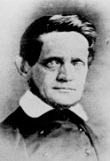


















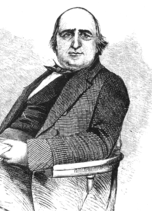
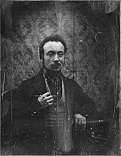
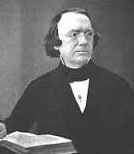

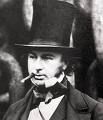

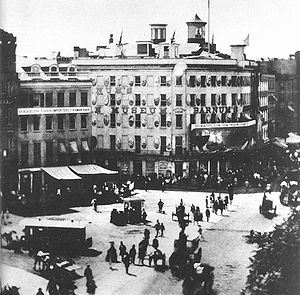

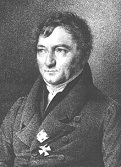


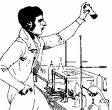


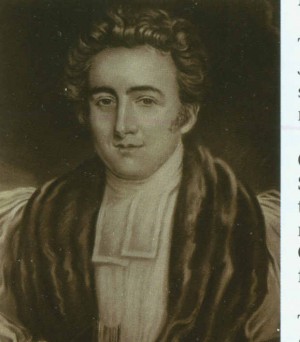





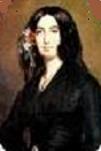








1841 There is a yellow fever epidemic in the U.S. There is a famine in Russia. On Jan. 1 Gen. Francisco Ferrera (1794-1851) becomes pres. of Honduras (until 1844), keeping close ties with fellow conservative govts. in Salvador and Guatemala and reinstating Church tithes and colonial legislation. On Jan. 2 the Chartist Circular is pub. in Britain, trying to convince voters of the desirability of universal adult male suffrage, after which they field eight candidates in the gen. election, who together win 692 votes and are all defeated; in 1847 their nine candidates get 2,848 votes, and leader Feargus O'Connor (1796-1855) defeats Whig MP Sir John Cam Hobhouse. Paraguay goes through a couple of pair of guys to get a real guy? On Jan. 22 Manuel Antonio Ortiz is replaced by Juan Jose Medina as pres. of Paraguay until Feb. 9, when he is replaced by Mariana Roque Alonzo, who on Mar. 14 is replaced by seminary-trained Carlos Antonio Lopez (1790-1862) (until 1862), known for his extensive knowledge of law and govt., who (gasp) stays in office for life. On Jan. 20 the island of Hong Kong ("fragrant harbor") at E side of the mouth of the Pearl River S of the Chinese province of Guangdong and E of Macau (modern-day pop. 7.4M) is ceded to Britain by China, and on Jan. 26 Britain formally occupies it (ends 1997); too bad, China failed to fortify the Pearl and Yangtze Deltas against British warships, turning into a major disaster; in 1860 the colony expands to the Kowloon Peninsula; in 1898 it signs a 99-year lease with China (ends 1997). In Jan. after sailing to the Antarctic in 1839 aboard HMS Erebus and HMS Terror, British explorer Sir James Clark Ross (1800-62) discovers Victoria Land, Ross Island, the Ross Sea, the Ross Ice Shelf et al., and goes on to explore and claim large areas of the Antarctic for Britain by 1843, setting a southern latitude record that lasts for 60 years - and now everybody snowboarding the Transantarctic Mountains has to stop by and say aloha? On Feb. 10 the 1840 Act of Union (British North Am. Act) of the English Parliament (enacted July 1840) is proclaimed in Montreal, uniting the Provinces of Lower and Upper Canada as the Province of Canada (until July 1, 1867); on June 14 the first Canadian parliament opens. On Feb. 17 2.8K British and sepoy troops, commanded by British Gen. Sir Charles James Napier (1782-1853) defeat a Baluch army of 30K at the Battle of Miani (Meeanee), ending the revolt of the emirs of Sindh, going on to conquer the whole Sindh Province despite orders only to put down the rebels; in 1844 Punch mag. pub. the message "Peccavi" (I have sinned) under his name, written by Catherine Winkworth, after which the saying goes "If this was a piece of rascality, it was a noble piece of rascality"; in 1847 Napier returns to England, then is sent back in 1849 as British CIC of Bombay (until 1851). On Feb. 14 Minh Mang (b. 1791) dies, and his son Thieu Tri (1807-47) becomes Nguyen emperor #3 of Vietnam (until 1847), becoming known for writing a circular palindrome poem with 12 readings. On Feb. 27 Anglican prelate John Henry Newman (1801-90) splits with the Anglican Church with the pub. of Tract Ninety; the Oxford authorities censure it on Mar. 15, and the Oxford Movement (begun 1833) fizzles. On Mar. 3 Peter Vivian Daniel (1784-1860), of old white colonial Va. stock becomes U.S. Supreme Court justice #28 (until May 31, 1860) to replace Philip Pendleton Barbour (1836-41), keeping the court at nine members; Daniel shows his colors by siding with the majority in the Dred Scott case. Number nine, I am the tippy hairy walrus, coo coo whigchoo, Tyler is ten, and William and Mary come to him? On Mar. 4 (Thur.) 68-y.-o. Va.-born William Henry Harrison (1773-1841), AKA "Old Tippecanoe", "Granny Harrison", "General Mum", "the Log Cabin Candidate", "the Cincinnatus of the West" becomes the 9th U.S. pres (until Apr. 4, 1841) in the 14th U.S. Pres. Inauguration in Washington, D.C. (oldest U.S. pres. at inauguration until ?) (last U.S. pres. born a British subject); first of four Whig presidents through 1853; John Tyler (1790-1862) becomes the 10th vice-pres. (until Apr. 4, 1841; both are born in Charles City County, Va.; First Lady is Anna Tuthill Symmes Harrison (1775-1864), who is sick and stays at home in North Bend, Ohio until it's too late and never moves into the White House; on Mar. 4 Harrison becomes the first sitting U.S. pres. to have his photograph taken; on Apr. 4 Harrison dies from pneumonia caught while giving a long-winded 100 min. 8K-word (longest speech ever, combined with shortest term ever) inaugural address in the rain without a hat or coat, becoming the first U.S. pres. to die in office, the first Whig to become U.S. pres., and the first Whig to die in office, starting a disturbing trend known as the Zero-Year Presidential Curse (Curse of Tippecanoe), where from now on every U.S. pres. elected in a year ending in zero dies in office, until forgetful Reagan in 1980 (whose brain only dies, does that count?); on Apr. 6 Richmond, Va.-born (Va. Dynasty) pro-slavery pro-states-rights strict constructionist atty. (William and Mary grad.) John Tyler (1790-1862), AKA "His Accidency", "President Without a Party", "Traitor Tyler" becomes the 10th U.S. pres. (until Mar. 4, 1845) in the 15th U.S. Pres. Inauguration in Washington, D.C., becoming the first veep to succeed to pres. upon the death of the incumbent, the first veep never to cast a tie-breaking vote as pres. of the U.S. Senate, and the first pres. not to have a vice-pres. (Fillmore, Johnson, Arthur); the 1st time that the U.S. has three presidents in the same year (Van Buren, Harrison, Tyler) (2nd time 1881); First Lady Letitia Christian Tyler (1790-1842) has been confined to an invalid's chair for the past two years, and dies next year; since there was no precedent, many are confused as to whether he is really the pres., despite his delivering an inaugural address; J.Q. Adams challenges his succession, claiming he can only wield the powers of the presidency but must remain vice-pres.; Tyler stands his hand, wins, and establishes a precedent, returning unopened all correspondence not addressed to him as pres.; as a former Dem. elected on a Whig ticket with a Whig Congress dominated by Henry "Mr. Whig" Clay, when he vetoes a bill chartering a new nat. bank and goes against the nationalist policies of the Whig party, Henry Clay leads a walkout of his cabinet (except secy. of state Daniel Webster, who leaves in 1843), and expels Traitor Tyler from the party, first calling him "His Accidency"; Tyler receives hundreds of assassination threats; meanwhile on Oct. 12 Tyler appoints John Canfield Spencer (1788-1855) (the special prosecutor who investigated the disappearance of William Morgan in 1826, and became a strong anti-Mason) as war secy. #17 (until Mar. 4, 1843), who goes on to propose a chain of army outposts from Council Bluffs, Iowa W to the Columbia River; too bad, next year his 19-y.-o. son, midshipman Philip Spencer (1823-43) is executed sans court-martial with two other sailors aboard the USS Somers for mutiny. On Mar. 7 King (until 1858) Lobe a Bebe of the Douala region of S Cameroon signs a treaty with British Capt. William Simpson Blount of the Pluto, agreeing to end sale and transport of slaves, reverting to barter trade in palms and ivory; domestic slavery continues. On Mar. 9 after eloquent arguments by former U.S. pres. J.Q. Adams, the U.S. Supreme Court rules 8-1 in U.S. vs. Schooner Amistad to set the Amistad prisoners free, and private funds are raised to send the 35 survivors back to Africa; Yale-educated middle-of-the-roader (epileptic) Henry Baldwin (1780-1844) of Penn. becomes the lone dissenter, becoming the first justice to pub. his dissenting opinions. On May 25 the Second Chartist Petition is presented to Parliament, accompanied by 1.3M signatures; too bad, it is rejected in Commons by the single vote of the speaker, and the fight goes on. On June 19 after the Repub. of Texas claims Santa Fe as part of its territory, the Texan Santa Fe Expedition of 21 ox-drawn wagons carrying $200K in merchandise plus 320 militia leaves Kenney's Fort near Austin, Tex. with the real goal of controlling the Santa Fe Trail and developing trade links with New Mexico, backed by Tex. pres. Mirabeau B. Lamar to stave off the growing Tex. annexation movement; too bad in mid-Sept. after arriving in N.M. they are met near modern-day Tucumcari, N.M. by a 1.5K-man Mexican army sent out by N.M. gov. Manuel Armijo, and are promised safe conduct in exchange for surrender, only to be double-crossed by Armijo, who has them chained and mistreated, then puts their fate to his officers, who by one vote decide not to execute them, after which they are forced to march 2K mi. to Mexico City, and released from Perote Prison leper colony in Veracruz on June 13, 1842, arriving in New Orleans, La. via Veracruz on Sept. 5, their number reduced to 47; in 1844 Mont Vernon, N.H.-born George Wilkins Kendall (1809-67), founder of The New Orleans Picayune in New Orleans, La. in 1837, who suffers smallpox in prison pub. the 900-page book Narrative of an Expedition Across the Great Southwestern Prairies, from Texas to Santa Fe, which sells 40K copies by 1852, going on to use his newspaper to advocate annexation of Tex. and war with Mexico, becoming the #1 war correspondent during the 1846-8 Mexican-Am. War before going into the sheep ranching business in Tex. in 1852 on the Nueces River, moving to Waco Springs then Boerne, becoming known as "Father of the Tex. Sheep Business". On June 21 Fordham U. (originally St. John's College until 1907) is founded in Tarrytown, N.Y. is founded by the Catholic Diocese of New York under the care of the Jesuits, becoming the first Roman Catholic higher ed. inst. in the NE U.S., receiving a charter from the New York legislature in 1846, and opening a chapter in Manhattan, N.Y., which becomes the independent College of St. Francis Xavier in 1861; in 1847 poet Edgar Allan Poe arrives in Fordham, N.Y., becoming lifelong friends with the college Jesuits, pub. "The Bells" in 1849; sports teams are called the Rams; alumni incl. Vince Lombardi, Pres. Donald Trump, Geraldine Ferraro, Andrew Cuomo, William J. Casey, John N. Mitchell, John O. Brennan, Cardinal Francis Spellman, Wellington Mara, Charles Osgood, G. Gordon Liddy, Denzel Washington, Alan Alda, Dylan McDermott, Mary Higgins Clark, Don DeLillo, Bob Keeshan, John LaFarge, and historian John Gilmary Shea. On July 19 the ship India, bound from Scotland to Australia sinks off Rio de Janeiro, killing 17. In July a Conservative V in the British gen. election causes Whig PM Lord Melbourne to resign, allowing Conservative Tory Sir Robert Peel (1788-1850) on Aug. 30 to become PM and chancellor of the exchequer again (until June 29, 1846), forming a cabinet incl. future PMs Wellington, Ripon, Stanley, Aberdeen, Gladstone and Disraeli; the Tories inherit five years of deficits caused by the blundering finances of the Liberal Whigs; Lord Aberdeen directs the foreign policy of the cabinet (until June 29, 1846); dick-whipped conservative Victoria avidly supports the Tories, and listens to her hubby's arguments that the sovereign's head, er, hole, er, roll, er, role in state affairs should not be strictly advisory - mister mike just don't talk, baby, it rules? On Aug. 24 new Manchester MP Richard Cobden (1804-65), an anti-protectionist laissez-faire manufacturer gives his first speech in the House of Commons, advocating repeal of the Corn Laws, going on to become a key player in Parliament. In Aug. 1841 after the Boer Voortrekkers proclaim the Natalia Repub., with capital in Durban, pissing-off the British gov. in the Cape, he sends a force of 250 to reassert control, but they end up under siege, with supplies running out; too bad, just as Andries Pretorius and his men are closing in, reinforcements under Col. Abraham Josias Cleete (1794-1886) arrive, causing the Boers to retreat N to Pietermaritzburg in Transorangia. On Sept. 23 bookkeeper John Colt (b. 1810), brother of gun and explosives manufacturer Samuel Colt is arrested for the murder of printer Samuel Adams, whose body was found in a packing case in the docks of feces-filled New York City and traced to him; he claims self-defense after a fist fight, and despite a high power defense paid for by his bro', he is convicted of first degree murder and scheduled to be hanged on Nov. 18, 1842; at noon he is allowed to marry Caroline Henshaw (who was already married to his brother Sam) and after an hour's conjugal visit the execution is about to begin when an explosion causes a prison fire, and after the confusion John is found dead in his cell with a butcher knife in his chest; later suspicions arise that Sam set the explosion, used his wife as a shill, had her switch clothes with John, bribed guards to let them substitute another body, and then spirited John to Europe, with a mysterious closed carriage parked next to the jail as the getaway vehicle - wait for the Dan Brown novel? In Oct. a hurricane destroys Ft. Dulany in SW Fla., causing Ft. Harvie to be built; in 1850 its name is changed to Fort Myers in honor of Jewish-Am. Col. Abraham Charles Myers (1811-89); it is abandoned in 1858, reoccupied in Dec. 1863 by Union troops, who use it as a base for cattle raids, then abandoned in Mar. 1865 after a Confed. attack. In Oct. after the Cofradia de San Jose religious movement, founded in 1832 by Apolinario de la Cruz (AKA Hermano Pule) (1814-41) to hold monthly masses for Joseph and Mary makes the mistake of admitting only natives and is mistaken for a political movement, the govt. sends troops, and after they fight back and take up arms, they make their second mistake and become a real insurrection, causing the govt. to step up the juice, killing Cruz on Nov. 4, and by next Jan. 1K members are killed and the movement is exterminated. Are you scared to take the Clorox 2 challenge? A brave white politician makes slave owners giddy? On Nov. 7 slave ship Creole is taken over by its 135 slaves en route from Hampton Roads, Va. to New Orleans, La., and after killing the captain they sail to Nassau, where they become free under British law, pissing-off the U.S. govt., secy. of state Daniel Webster demanding their return as property of U.S. citizens, which causes Whig abolitionist Joshua Reed Giddings (1795-1864) to introduce into the U.S. House of Reps a resolution declaring that slavery does not exist under federal but only under state laws; he is censured, resigns and is reelected, going on to lead opposition to the extension of slavery and go Republican; the slaves are never returned. On Nov. 18 the Battle of Ingavi in Bolivia sees a Bolivian force under Gen. Jose Ballivian defeat an invading Peruvian army under Marshal Agustin Gamarra (b. 1785), who is KIA, ending his vision of a united Peru and Bolivia. In Nov. the city of Dallas, Tex. (Gael. "dwellers by the waterfall") (modern-day pop. 5.1M/7.7M) in NE Tex. on 640 acres overlooking the Three Forks area of the Trinity River is settled by Tenn. trader-atty. John Neely Bryan (1810-77); the site is where JFK is assassinated on Nov. 22, 1963; in 1846 after attracting Anglo-Am. (non-Hispanic) settlers, it and the surrounding county are named after Philly-born Anglo U.S. vice-pres. #11 (1845-9) George Mifflin Dallas (1792-1864) - shouldn't that be Houston-Mufflin? On Dec. 7, after Britain and Prussia jointly appoint him as the first Protestant bishop in Jerusalem, Hebrew-speaking Prussian-born Jewish convert Michael Solomon Alexander (1799-1845) is ordained as the first Anglican bishop of the United Church of England and Ireland in Jerusalem, and sent by Queen Victoria and PM Gladstone on a warship to Jaffa with a number of missionaries, arriving in Jerusalem on Jan. 21, 1842, and founding the first Anglican church outside of England, announcing his intention of bringing Jews to Christ, pissing them off, esp. after baptiizng three Jews on May 21, 1843 in the new Hebrew Christ Church near the Jaffa Gate and next door to the British consulate; more Jews are baptized in 1844; the Roman Catholic Church responds by reestablishing their Latin Patriarchate in Jerusalem; Alexander dies on Nov. 23, 1845. On Dec. 13 pres. (since Dec. 10, 1838) Mirabeau Lamar steps down as pres. of the Repub. of Texas after gaining formal recognition by the major European powers and establishing a public school system (incl. the basis of the U. of Texas), and on Dec. 21 Sam Houston is reelected as Tex. pres. #3 (until Dec. 9, 1844), appointing Chester District, S.C.-born John Hemphill (1803-62) as chief justice of the Tex. Supreme Court (until 1858), becoming known as "the John Marshall of Texas"; on the side Hemphill lives with his black slave Sabina for over a decade and fathers two daughters by her. In Dec. Prince Albert decorates the first Christmas tree in Windsor Castle. The Second Repub. of Yucatan declares independence from the Mexican Federation (until 1848), promulgating a constitution that guarantees individual rights, religious freedom, and amparo (English civil law protection). The smaller they are the more they want a corner on the market? Jacksonian Dem. Thomas Wilson Dorr (1805-54) leads a popular reform movement against the outdated 1663 royal charter which burdens Rhode Island with the most restricted suffrage of all U.S. states; on Oct. 6 the extralegal People's Convention promulgates a new constitution providing for white manhood suffrage, regardless of property holdings; the state legislature holds a rival Landowners' Convention, and each elects its own govt. and gov.; too bad, money talks, and the vested interests call the game by summoning federal and state military force. Chile defeats the Peru-Bolivian Confederation, ending the war begun in 1835, and Gen. Manuel Bulnes becomes pres. of Chile (until 1846); meanwhile this decade is marked by discovery of new coal, copper, and silver deposits and a mining boom, which peaks out just as the Calif. Gold Rush begins, giving thousands of workers a place to go. Egyptian-controlled Syria (incl. Damascus) is restored to Turkey. Minh Mang dies, and his son Ang Duong (1796-1860) becomes king of Cambodia (until 1844, then 1845 to Oct. 19, 1860). The U.S. Preemption Act legalizes squatting on lands in the Am. West, and the Great Migration begins, the first wave of wagons crossing the Missouri River headed for Calif. and Oregon along the I-can't-help-myself Oregon Trail, led by missionary Marcus Whitman (1802-47) from Ft. Hall in E Idaho; Oregon City, Ore. is founded, becoming the first white town in Ore. (incorporated 1849); Am. Shoshone chief Washakie (1798-1900) of Utah and Wyo. aids settlers moving W, being more friendly to whites than his enemies the Sioux. Turkey's sovereignty is guaranteed by the five Great Powers, and the Turkish govt. grants hereditary sovereignty to Mehmet Ali and his heirs. The Russians finally abandon Ft. Ross on Port Rumiantsev (Bodega Bay, Calif.) (founded 1812), having exhausted the otter and seal pop. and failed to successfully farm the area, and after having cost the Russian govt. 45K rubles a year for the last four years to support them; the colonists sell their livestock and equipment to John Sutter and return to Sitka. Racine, Wisc. on Lake Michigan at the mouth of the Root River 60 mi. N of Chicago, Ill. is incorporated. Napoleon's exiled brother Joseph Bonaparte is allowed to return from the U.S. to Italy to join his wife Julia Marie Clary (-1845), sister-in-law of King Bernadotte of Sweden; one of her daughters, Zenaide Charlotte Julie becomes the wife of her cousin Charles, Prince of Canino, son of Lucien Bonaparte; the other, Charlotte Napoleone marries her cousin Louis Napoleon, 2nd son of Louis Bonaparte. The first U.S. Senate filibuster takes place over govt. printing. The streets of Canadian capital Toronto become the first to be illuminated by gas streetlights. The German establishment begins a Hegelianism Elimination Program from the minds of Prussian youth, and Frederick IV calls philosopher Freidrich Wilhelm Joseph Schelling (1775-1854), whose "identity of subject and object" philosophy, based on Kant, Fichte, and Spinoza has been tested in most leading German univs. to Berlin. The 412m Morpeth Roll is signed by 160K in honor of departing chief secy. to Ireland (1835-41) Lord Morpeth; it incl. two Thomas Reagans from Ballyporeen, County Tipperary, the great-uncle and great-grandfather of Pres. Ronald Reagan, and Patrick Feeny, grandfather of dir. John Ford. The Royal College of Psychiatrists is founded in England; the original name is Assoc. of Medical Officers of Asylums and Hospitals for the Insane, then the Medico Psychological Assoc., then in 1926 the Royal Medico Psychological Assoc., receiving its current name in 1971. The Great Western Railway in England, designed by Isambard Kingdom Brunel (1806-59) is finished, featuring tracks set 7 ft. apart instead of the standard 4 ft. 8.5 in. The Mercantile Agency is founded, becoming the first major credit info. business in the U.S.; in 1859 Robert Graham Dun (1825-1900) takes it over. Bethel, Conn.-born Phineas Taylor "P.T." Barnum (1810-91) buys Scudder's Am. Museum at the corner of Broadway and Ann St. in New York City, renaming it after himself and starting out as a freakshow, going on to offer strange and unusual attractions, peaking at 15K visitors/day until it burns down in 1865 after servicing 38M paying customers at 25 cents each in a country with a total pop. of 32M; Barnum allegedly coins the slogan "There's a sucker born every minute." After Friedrich Liszt turns it down due to ill health, Karl Marx becomes ed. of the Neue Rheinische Zeitung in Cologne, Germany. English Baptist minister and cabinet maker Thomas Cook (1808-92) begins arranging excursions for temperance supporters combining transportation, accomodations, and activities into a package, starting with a temperance meeting in Loughborough, Leicestershire, going on to found the modern internat. $4T/year tourist industry; in 1871 it becomes Thomas Cook & Son; in 1948 it is nationalized along with the railways under the British Transport Commission; in 1972 railways are denationalized, and it goes private; in 2007 it merges with MyTravel Group, which declares bankruptcy on Sept. 23, 2019, causing 150K Brits to be stranded worldwide, and the British govt. to step in to return them home; "Whole classes have for the 1st time found easy access to foreign countries and have acquired some of the familiarity with them which breeds not contempt but kindness." (William Gladstone) Future Russian novelist Fyodor Mikhailovich Dostyoevski (1821-81) graduates from the School of Military Engineers in St. Petersburg and is commissioned in the army (until 1844). French novelist George Sand (Amandine or Amantine Lucile Aurore, Baroness Dupine-Dudevant (1804-76) gets out of her romantic novel funk and begins writing brilliant pleas for a Socialist rev. in Europe (until 1848). London Library opens a subscription library. The first univ. degrees are granted to U.S. women. The Chemical Society of London is founded by 77 scientists after chemist Robert Warington (1807-67) (chemist at London brewery Truman, Hanbury & Buxton) acts as the driving force, receiving a royal charter in 1847. The utopian cooperative Brook Farm community in Mass. near Boston is formed by Transcendentalists incl. Nathaniel Hawthorne. Victor Marie Hugo is elected to the Academie Francaise. Felix Mendelssohn is called to Berlin by Frederick William IV of Prussia to reorganize the cathedral choir and direct concerts. 61-y.-o. Jean Auguste Dominique Ingres (b. 1780) marries 33-y.-o. Delphine Ramel (1808-87) three years after his first wife Madeline dies - let's rehearse that Turkish bath scene again? Amherst, N.H.-born Horace Greeley (1811-72) founds the New-York Tribune (New-York Daily Tribune until 1866) as a "Great Moral Organ" for Whigs, positioning it between the sensational New York Herald and the academically detached New York Evening Post, writing against unequal distribution of wealth, monopolies, and land grabs by railroads, while promoting protective tariffs, development of agriculture, and migration to the Am. West; in 1852-62 Karl Marx is hired as their London-based European correspondent, with his collaborator Friedrich Engels allowed to submit articles under his byline; it ceases pub. in 1966. The humorous weekly periodical Punch is founded in London by Henry Mayhew (1812-87) and engraver Ebenezer Landells (1808-60), helping to coin the term "cartoon" and reaching its peak influence in the 1840s-1850s; it closes in 1992, and is revived in 1996-2002. Jon Sigurdsson (1811-79) et al. found Ny Felagsrit (Ný Félagsrit), a newspaper advocating Icelandic nationalism. French photographer Joseph-Philibert Girault de Prangey (1804-92) tours the Holy Land incl. Egypt, Syria, Turkey, Greece, and Palestine (until 1844), making the first modern photographs (daguerreotypes) of Jerusalem; they are discovered in the 1920s, and first exhibited on Jan. 30, 2019 by the Metropolitan Museum of Art in New York City; in May 2003 Qatar Sheikh Saud Al Thai buys one for a world record price of Ł565,250 ($922,488). tours the Holy Land (until 1844), making the first modern photographs (daguerreotypes) of Jerusalem; they are discovered in the 1920s, and first exhibited on Jan. 30, 2019 by the Metropolitan Museum of Art in New York City; in May 2003 Qatar Sheikh Saud Al Thani buys one for a world record price of Ł565,250 ($922,488). Austrian brewer ("the King of Brewers") Anton Dreher (1810-63), friend of Gabriel Sedlmayr Jr. of Spaten Brewery introduces Schwechater Lagerbier, pioneering Pale Lager, which combines the crispness of lager with the pale hues of English ale, becoming known as Vienna Style Beer. in 1862 Dreher acquires Kobanya Brewery in Budapest, Hungary (founded 1854); the combined co. becomes independent in 1907 until the Communist takeover in 1949, which nationalizes it; in 1993 it joins the South African Breweries (SAB), which in May 2002 merges with the Miller Brewing Co. to create SABMiller. Architecture: The Palais de Rohan (begun 1731) in Strasbourg is finished. Mormon leader Joseph Smith Jr. builds the Red Brick Store on Water St. in Nauvoo, Ill., turning the 2nd floor into his HQ. Sports: Conn. bans ninepin bowling because of betting, causing 10-pin bowling to be created to get around the law. Inventions: Prussian gunsmith Johann Nikolas Dreyse designs the first breech-loading military rifle. Frederick de Moleyns of England is granted the first patent for an incandescent lamp, using powdered charcoal between two platinum wires in a vacuum bulb. Viennese mathematician Joseph Petzval (1807-91) of Hungary invents the photographic Petzval Portrait Lens with a speed of f/3.6, after which entrepreneur Peter Wilhelm Friedrich von Voigtlander (Voigtländer) (1812-78) gets in a fight over patent rights; too bad, Petzval's house is broken into in 1859 and all his papers stolen, causing him to become bitter and broke and end up in a monastery in 1877. Belgian instrument maker Antoine-Joseph "Adolphe" Sax (1814-94) invents the Saxophone (patented on June 28, 1846); also the saxhorn and the saxotromba. English mechanical engineer Sir Joseph Whitworth (1803-87) devises the British system of standard screw threads - it's not worth a whit? Science: Scottish physician James Braid (1795-1860) coins the term "hypnotism", becoming the first to use it in the modern sense as a "psycho-physiological" rather than occult phenomenon. Friedrich Wilhelm Bessel determines the ellipticity of the Earth as 1/299. C.J. Fritzsche of Germany produces aniline oil by treating indigo with potassium hydroxide. Swiss embryologist Rudolf Albert von Kolliker (1817-1905) describes spermatozoa, and supports the neuron doctrine. German zoologist Martin Hinrich Carl Lichtenstein (1780-1857) founds the Berlin Zoological Garden after talking Frederick William IV of Prussia to donate the grounds of his pheasantry; it opens in 1844. Carlo Matteucci (1811-68) of Italy discovers a difference of electrical potential between an excised nerve and damaged muscle, leading Emil du Bois-Reymond (1818-96) to found a German school of physiologists seeking to reduce physiological phenomena to physico-chemical processes. In 1841 Irish physician Sir William Brooke O'Shaughnessy (1809-89) introduces cannabis sativa (hashish, marijuana) to Western medicine. English zoologist Sir Richard Owen (1804-92) coins the term "dinosaur" (Gr. "fearfully great or terrible lizard"). Nonfiction: Bronson Alcott (1799-1888), Spiritual Culture. Hans Christian Andersen (1805-75), Fairy Tale of My Life (autobio.). Bruno Bauer (1809-82) and Karl Marx (1818-83), The Trumpet of the Last Judgment Against Hegel the Atheist and Antichrist (parody); Hegelian Bauer breaks his 2-year friendship with Marx over Communism. Catharine Esther Beecher (1880-78), A Treatise on Domestic Economy: For the Use of Young Ladies at Home and at School; bestseller by the sister of Harriet Beecher Stowe, making her famous first; a guide to domestic self-mgt. for women, making the home their domain; she goes on to argue for a greater role for women in society, female education, and the incorporation of kindergarten into the education of children. Louis Blanc (1811-82), History of the Years 1830-1840. George Henry Borrow (1803-81), Zincali, or the Gypsies in Spain; based on his travels in Spain, Portugal, and Russia in 1833-40. George Bradshaw (1800-53), Railway Guide. Thomas Carlyle (1795-1881), On Heroes, Hero Worship, and the Heroic in History; a series of lectures given in May 1840; how world civilization is powered by "great men", incl. Muhammad, ergo democracy sucks?; calls Muhammad a genuinely religious man, but condemns the Quran as the most boring book on Earth, "as toilsome reading as I ever undertook. A wearisome, confused jumble, crude, incondite; endless iterations, long-windedness, entanglement; most crude, incondite, insupportible stupidity in short"; still, hero Muhammad can't be a false prophet: "A false man found a religion? Why, a false man cannot build a brick house!... It will not stand for twelve centuries, to lodge a hundred-and-eighty million; it will fall straightaway"; "All that mankind has done, thought, gained or been: it is lying as in magic preservation in the pages of books"; "What we become depends on what we read after all of the professors have finished with us. The greatest university of all is a collection of books"; "Histories are a kind of distilled newspapers"; "In books lies the soul of the whole Past Time; the articulate audible voice of the Past, when the body and material substance of it has altogether vanished like a dream"; "A man lives by believing something; not by debating and arguing about many things." George Catlin (1796-1872), Manners, Customs, and Conditions of the North American Indians. Jean-Francois Champollion (1790-1832), Egyptian Dictionary (1842-3) (posth.). Victor Cousin (1792-1867), Cours d'Histoire de la Philosophie Moderne. William Cooper Dendy (1794-1871), The Philosophy of Mystery; about dreams, spectral illusions et al. Ralph Waldo Emerson (1803-82), Essays, First Series; incl. the essays Self-Reliance, ("A foolish consistency is the hobgoblin of little minds, adored by little statesmen and philosophers and divines") ("To be great is to be misunderstood") (“To believe your own thought, to believe that what is true for you in your private heart is true for all men, — that is genius. Speak your latent conviction, and it shall be the universal sense; for the inmost in due time becomes the outmost", and The Over-Soul ("The Supreme Critic on the errors of the past and the present, and the only prophet of that which must be, is that great nature in which we rest, as the earth lies in the soft arms of the atmosphere; that Unity, that Over-soul, within which every man's particular being is contained and made one with all other; that common heart.") Ludwig Feuerbach (1804-72), The Essence of Christianity (Das Wesen des Christentums); claims that religious faith is based on contradictions, and that its true essence is anthropological, and God is the outward projection of man's inward nature; makes fans of Karl Marx and Friedrich Engels. Nathaniel Hawthorne (1804-64), Grandfather's Chair; New England history for children. Georg Herwegh, Gedichte eines Lebendigen (2 vols.) (1841, 1844). Moses Hess (1812-75), European Triarchy. Yevhen Hrebinka (1812-48), Lastovka; early Ukrainian almanac. Isaac D'Israeli (1766-1848), Amenities of Literature (3 vols.). Soren Kierkegaard (1813-55), The Concept of Irony with Reference to Socrates; his univ. thesis. Friedrich List (1789-1846), The National System of Political Economy (Nationales System der Politischen Okonomie); written after emigrating to Penn. in 1825 and discovering coal in his land before returning to Germany in 1833, bringing Henry Clay's American System with him; backs protectionism as necessary for a country to catch up with rivals, and considers state regulation of industry essential; advocates an alliance between Germany and Britain to counter the rising of the U.S. and Russia; big hit, becoming the bestselling German economics book after Karl Marx's "Das Kapital", influencing National Socialism and the European Economic Community; "Any nation which by means of protective duties and restrictions on navigation has raised her manufacturing power and her navigation to such a degree of development that no other nation can sustain free competition with her, can do nothing wiser than to throw away these ladders of her greatness, to preach to other nations the benefits of free trade, and to declare in penitent tones that she has hitherto wandered in the paths of error, and has now for the first time succeeded in discovering the truth"; "Adam Smith's doctrine is, in respect to national and international conditions, merely a continuation of the physiocratic system. Like the latter, it ignores the very nature of nationalities, seeks almost entirely to exclude politics and the power of the State, presupposes the existence of a state of perpetual peace and of universal union, underrates the value of a national manufacturing power, and the means of obtaining it, and demands absolute freedom of trade. Adam Smith fell into these fundamental errors in exactly the same way as the physiocrats had done before him, namely, by regarding absolute freedom in international trade as an axiom assent to which is demanded by common sense, and by not investigating to the bottom how far history supports this idea." Charles Mackay (1814-89), Extraordinary Popular Delusions and the Madness of Crowds; "Men, it has been well said, think in herds... They go mad in herds, while they only recover their senses slowly, and one by one." Theodore Parker (1810-60), The Transient and Permanent in Christianity; West Roxbury, Mass. Unitarian minister shocks conservatives with his crypto-denial of miracles, or at least people's present need for them. Edward Robinson (1794-1863), Biblical Researches in Palestine, Mount Sinai and Arabia Petraea (and the Adjacent Regions) (3 vols.); his magnum opus, based on travels to Palestine in 1838, pioneering Biblical geography by identifying numerous Bible sites for the first time incl. Robinson's Arch in Jerusalem; he returns in 1852, pub. an enlarged ed. in 1856. John Lloyd Stephens (1805-52), Incidents of Travel in Central America, Chiapas and Yucatan (2 vols.); illustrated by his partner Frederick Catherwood (1799-1854); their travels to the lost Mayan world in 1840-1 incl. Chichen Itza; big hit, causing travelers to flock in; Edgar Allan Poe becomes a fan. C.B. Thompson (1814-95), Evidences in Proof of the Book of Mormon; claims that America is the promised land (of whites). Alexander Young, Chronicles of The Pilgrim Fathers of The Colony of Plymouth: 1602-1625) (Boston). Music: Adolphe Charles Adam (1803-56), Jean Coralli, and Jules Perrot, Giselle (ballet); "the Hamlet of the dance"; the story of a peasant girl who falls in love with a nobleman in disguise, then goes insane and dies after discovering that he is already engaged and has betrayed her. Daniel Auber (1782-1871), Les Diamants de la Couronne (opera) (Opera Comique, Paris). Niels Wilhelm Gade (1817-90), Ossian Overture; gets him a stipend from Christian VIII to travel in Italy and study in Leipzig. Charles Gounod (1818-93), Messe a Tre (Rome). Fromental Halevy (1799-1862), Le Guitarrero (opera); La Reine de Chypre (opera); makes Richard Wagner a fan. Carl Otto Nicolai, Gildippe e Odoardo (opera) (Genoa); Il Proscritto (opera) (Milan); Mariana (opera) (Milan). Gioacchino Rossini (1792-1868), Stabat Mater (Salle Herz, Paris). Robert Schumann (1810-56), Symphony No. 1 in B-flat major, Op. 38 ("Spring Symphony") (Leipzig) (Mar. 31); debut conducted by Felix Mendelssohn. Plays: Dion Boucicault (1820-90), London Assurance (comedy) (debut) (Mar.) (Covent Garden); makes this Irishman an instant success, so he decides to stay in London. Ferdinand Freiligrath, Glaubensbekenntnis - baby let your hair hang down? Friedrich Hebbel (1813-63), Der Diamant (comedy). Poetry: Robert Browning (1812-89), Pippa Passes (Bells and Pomegranates No. 1); a young innocent girl in the crime-ridden town of Asolo; its frank sexuality pisses-off Victorians; contains the soundbyte: "The lark's on the vine;/ The snail's on the thorn;/ God's in his Heaven;/ All's right with the world!"; at the end he goofs up royal, with Pippa calling out "Then owls, and bats, cowls and twats,/ Monks and nuns, in a cloister's moods,/ Adjourn to the oak-stump pantry!"; he later admits that he misread a 1660 rhyme "They talk't of his having a Cardinall's Hat/ They'd send him as soon an Old Nun's Twat", thinking a twat is a nun's habit?; the town of Pippa Passes, Ky. is named for the poem. Henry Wadsworth Longfellow (1807-82), Ballads and Other Poems; incl. The Village Blacksmith, The Wreck of the Hesperus (about the Jan. 6, 1839 shipwreck of the Favorite off Norman's Woe, Gloucester, Mass.). Edgar Allan Poe (1809-49), The Sleeper; from his 1831 poetry collection; pub. in the Philadelphia Saturday Courier on May 22; considers it to be his best poem, better than "The Raven". John Sterling (1806-44), The Election. Novels: William Harrison Ainsworth (1805-82), Windsor Castle. Honore de Balzac (1799-1850), La Cousine Bette (Cousin Betty). Jules Amedee Barbey d'Aurevilly (1808-89), L'Amour Impossible. James Fenimore Cooper (1789-1851), The Deerslayer; last of the Leather-Stocking Tales about Natty Bumppo. Charles Dickens (1812-70), Barnaby Rudge; his first historical novel, inspired by Sir Walter Scott (1771-1832), about the 1780 Gordon Riots in London, local idiot Rudge and his pet raven Grip at the Maypole Inn in Chigwell, proprietor John Willet, father of Joe Willet, lover of Dolly Varden, daughter of locksmith Gabriel Varden; in 1753 Rudge's daddy Rudge Sr. murdered Reuben Haredale of the Warren and his gardener, switched clothes with the latter and split, then shows up during the Gordon Riots; Edgar Allan Poe gets the idea for "The Raven" from Grip. Joseph von Eichdorff, Die Glucksritter. Jeremias Gotthelf (Albert Bitzius) (1797-1854), Uli the Farmhand (Uli, der Knecht); works for farmer Johannes and drinks his wages. Maurus Jokai (1825-1904), Weekdays. Gottfried Keller (1819-90), Gedichte (debut); gets him a govt. stipend, allowing to study philosophy at Heidelberg U. Charles James Lever (1806-72), Charles O'Malley. Frederick Marryat (1792-1848), Masterman Ready. Edgar Allan Poe (1809-49), The Murders in the Rue Morgue (Apr.); pub. in Graham's Mag.; the first detective (mystery) story; the sequel is The Mastery of Marie Roget: A Sequel to "The Murders in the Rue Morgue" (pub. in Nov. 1842-Feb. 1843 in Snowden's Ladies Companion, becoming the first murder mystery based on a real crime. The Mystery of Marie Roget. Jules Sandeau (1811-83), Le Docteur Herbeau. Charles Sealsfield (Karl Anton Postl) (1793-1864), Das Kajutenbuch (The Cabin Book). Emily Anne Eliza Shirreff (1814-97) and Maria Georgina Grey (1816-1906), Passion and Principle; the crying deficiencies in education of English women. M.A. Titmarsh (ed.), Comic Tales and Sketches (2 vols.); incl. "The Great Hoggarty Diamond" and "The Second Funeral", "The Chronicle of the Drum" by William Makepeace Thackeray. Charlotte Elizabeth Tonna (1790-1846), Conformity; Falsehood and Truth; Helen Fleetwood: Tales of the Factories. Births: Scottish "Who's Who in Mythology" archeologist Alexander Stuart Murray (d. 1904) on Jan. 8 in Arbroath; educated at the U. of Edinburgh, and U. of Berlin. Am. engineer and Arctic explorer Rear Adm. George Wallace Melville (d. 1912) on Jan. 10 in New York City; educated at the Brooklyn Polytechnic Inst. Dutch philologist (in Germany) Bernhard Egidius Konrad ten Brink (d. 1892) on Jan. 12 in Amsterdam. French Impressionist painter Berthe Marie Pauline Morisot (d. 1905) on Jan. 14; first woman to join the Impressionists; one of the Trois Grandes Dames of Impressionism with Marie Bracquemond (1840-1916) and Mary Cassatt (1844-1926). Am. liberal Presbyterian scholar-theologian Charles Augustus Briggs (d. 1913) on Jan. 15 in New York Cit; educated at Union Theological Seminary, and U. of Berlin. English Conservative politician (Freemason) Frederick Arthur Stanley, 16th Earl of Derby (Lord Stanley of Preston) (d. 1908) on Jan. 15; educated at Eton and Sandhurst. French "Pieces Pictoresque" Romantic composer Alexis-Emmanuel Chabrier (d. 1894) on Jan. 18 in Ambert, Auvergne. U.S. Civil War Union Col. Alonzo Hersford Cushing (d. 1963) on Jan. 19 in Delafield, Wisc.; grows up in Fredonia, N.Y. French actor-mgr. Benoit-Constant Coquelin (Coquelin aine) (d. 1909) on Jan. 23 in Boulogne-sur-Mer, Pas-de-Calais; the original Cyrano de Bergerac. British adm. John Arbuthnot "Jacky" "Jackie" Fisher, 1st Baron Fisher of Kilverstone (d. 1920) on Jan. 25 in Ramboda, Ceylon; #2 British adm. after Horatio Nelson. English Harrods dept. store magnate Charles Digby Harrod (d. 1905) on Jan. 25; son of Charles Henry Harrod (1799-1885). British (Welsh) "Dr. Livingstone, I presume?" journalist-explorer (Africa) Sir Henry Morton Stanley (John Rowlands) (d. 1904) on Jan. 28 in Denbigh; his parents abandon him as an infant, causing him to be called a bastard; raised by his maternal grandfather Moses Parry; emigrates to the U.?S. in 1859, meeting wealthy trader Henry Hope Stanley (-1878) when he disembarks in New Orleans, La., and becoming his de facto adopted son, pretending to be U.S.-born and joining the Confed. Army, fighting in the 1862 Battle of Shiloh, getting taken POW and put in Camp Douglas in Ill., and turned into a "Galvanized Yankee", joining the Union Army on June 4, 1862 before being discharged on June 22 due to illness, recovering, then joining the Union Navy in July 1864 until jumping ship on Feb. 10, 1865 in N.H.; after the Civil War he becomes a journalist - steady is exciting? French pres. #7 (1895-9) Felix (Félix) Francois Faure (d. 1899) on Jan. 30 in Paris. Italian Dominican confessor Blessed "Apostle of the Rosary" Bartolo Longo on Feb. 10 in Latiano (near Brindisi); beatified on Oct. 26, 1980. Am. Bloomingdale's co-founder (Jewish) Lyman Gustave Bloomingdale (d. 1905) on Feb. 11 in New York City; son of Bavarian German Jewish immigrant Benjamin Bloomingdale; brother of Joseph Bernard Bloomingdale (1842-1904). Spanish Catalon composer-musicologist Felip Pedrell (d. 1922) on Feb. 19 in Tortosa. Am. engineer (submarine inventor) John Philip Holland (d. 1914) on Feb. 24 in Liscannor, County Clare, Ireland; emigrates to the U.S. in 1873. French Impressionist painter Pierre-Auguste Renoir (d. 1919) on Feb. 25 in Limoges, Haute-Vienne; father of Pierre Renoir Jr. (1885-1952) and Jean Renoir (1894-1979); pupil of Charles Geyre; known for painting rosy face cheeks on his zillions of plump nude women. French tragic actor Jean Mounet-Sully (Jean-Sully Mounet) (d. 1916) on Feb. 28 in Bergerac; brother of Jean Paul Mounet (1847-1922). British statesman-diplomat Evelyn Baring, 1st Earl of Cromer (d. 1917) on Feb. 26; first British gov. of Egypt (1879-1907); father of Sir Evelyn Baring (1903-73). U.S. Sen. (1875-81) (black) Blanche Kelso Bruce (d. 1898) on Mar. 1 in Farmville, Va; born a slave to a white father and black mother. Canadian oceanographer ("Father of Modern Oceanography") Sir John Murray (d. 1914) on Mar. 3 in Cobourg, Ont.; Scottish immigrant parents; knighted in 1898; coiner of the term "oceanography". Am. Kansas City Star publisher William Rockhill Nelson (d. 1915) on Mar. 7 in Fort Wayne, Ind.; son of Isaac De Groff Nelson (1810-91) and Elizabeth Rockhill (1816-89), daughter of William R. Rockhill (1793-1865); educated at Notre Dame U. U.S. Supreme Court justice #58 (1902-32) ("the Great Dissenter") ("the Magnificent Yankee") Oliver Wendell Holmes Jr. (d. 1935) on Mar. 8 in Boston, Mass.; son of Oliver Wendell Holmes Sr. (1809-94); educated at Harvard U. Italian Liberal PM (1910-11) (Jewish) Luigi Luzzatti (d. 1927) on Mar. 11 in Venice; first Jewish PM of Italy. South African PM (1908-10) John Xavier Merriman (d. 1926) on Mar. 15 in Street, Somerset, England. English actress-mgr. Henrietta Hodson (d. 1910) on Mar. 26 in Westminster, London; wife (1887-) of Henry Labouchere (1831-1912). Egyptian rev. leader (first fellahin) Col. Ahmed (Ahmad) Orabi (Urabi) (Ourabi) (d. 1911) on Mar. 31 in Hirriyat Razna (near Zagazig), Sharqia Governate. French inventor and aviation pioneer Clement Ader (d. 1925) on Apr. 2 in Muret, Haute Garonne. Am. liquor distiller Joseph Emm Seagram (d. 1919) on Apr. 15 in Fisher's Mills (near Cambridge), Ont. Czech "Jan Maria Plojhar" novelist-dramatist Julius Zeyer (d. 1901) on Apr. 26 in Prague; German-French parents. Am. poet-essayist Edward Rowland Sill (d. 1887) on Apr. 29 in Windsor, Conn.; educated at Yale U., and Harvard Divinity School. British Vice-Adm. Charles Cooper Penrose-Fitzgerald (d. 1921) on Apr. 30 in Corkbeg, Ireland. Canadian whiskey distiller French "The Crowd" sociologist Gustave Le Bon (d. 1931) on May 7 in Nogent-le-Routrou. Am. New York Herald newspaper pub. and sportsman James Gordon Bennett Jr. (d. 1918) on May 10 in New York City; son of James Gordon Bennett Sr. (1795-1872). U.S. Rep. (R-Iowa) (1889-91, 1893-1907) John Fletcher Lacey (d. 1913) on May 30 in New Martinsville, W. Va. Am. geologist-volcanologist Clarence Edward Dutton (d. 1912) on May 15 in Wallingford, Conn.; educated at Yale U. French "Philomela" novelist-poet-playwright (Jewish) Catulle Mendes (Mendčs) (d. 1909) on May 22 in Bordeaux; of Sephardic Jewish descent. French automobile pioneer Louis Francois Rene Panhard (d. 1908) on May 27 in Paris. Italian pianist-composer Giovanni Sgambati (d. 1914) on May 28 in Rome. Am. financier (co-founder of the Standard Oil Co.) (Jewish) William Avery Rockefeller Jr. (d. 1922) on May 31 in Richford, N.Y.; 3rd son of salt-timber trader and vagabond William Avery "Big Bill" Rockefeller Sr. (1810-1906) and Eliza Davison (1813-89); brother of John D. Rockefeller Sr. (1839-1937). Am. sociologist-geologist-paleontologist ("Father of American Sociology") Lester Frank Ward (d. 1913) on June 18 in Joliet, Ill.; serves in the U.S. Treasury Dept. in 1865-81, the U.S. Geological Survey in 1881-92, switches to paleontologist until 1906, then switches to prof. of sociology at Brown U. German historian (in the U.S.) Hermann Eduard von Holst (d. 1904) on June 19 in Fellin (Viljandi), Russian Livonia; lives in the U.S. in 1867-1900, teaching German historical methods. German architect Paul Wallot (d. 1912) on June 26 in Oppenheim am Rhein; of Huguenot descent; co-designer with Friedrich von Thiersch of the Berlin Reichstag. U.S. Dem. Navy secy. #31 (1885-9) and automobile pioneer William Collins Whitney (d. 1904) on July 5 in Conway, Mass.; descendant of Plymouth gov. William Bradford; brother of Henry Melville Whitney (1839-1923); educated at Yale U. (Skull & Bones), and Harvard U. Austrian architect Otto Koloman Wagner (d. 1918) on July 13 in Penzing, Vienna; pioneer of modern reinforced concrete structure. English "Jackanapes" children's writer Juliana Horatia Ewing (nee Gatty) (d. 1885) on Aug. 3 in Ecclesfield, Yorkshire. Anglo-Argentinian "Green Mansions" naturalist novelist William Henry Hudson (d. 1922) on Aug. 4 in Quilmes (near Buenos Aires), Argentina; Am. parents; emigrates to England in 1874. Scottish "The Book of Orm" poet-dramatist-novelist Robert Williams Buchanan (d. 1901) on Aug. 18 in Caverswall, Staffordshire. Swiss surgeon (thyroid researcher) Emil Theodor Kocher (d. 1917) on Aug. 25 in Bern; first surgeon to treat goiter by removing the thyroid gland. Scottish classical Greek scholar Sir Richard Claverhouse Jebb (d. 1905) on Aug. 27 in Dundee; educated at Charterhouse School, and Trinity College, Cambridge U. French inventor ("the Father of Cinematography") Louis Aime (Aimé) Augustin Le Prince (d. 1890) on Aug. 28 in Metz. Czech #1 "New World Symphony" composer Antonin Leopold Dvorak (d. 1904) (pr. DVOR-zhak) on Sept. 8 in Nelahozeves (Muhlhausen), Bohemia; child violin prodigy; studies with Anton Liebmann; teacher of Josef Suk and Vitezlav Novak. English Biblical scholar Thomas Kelly "T.K." Cheyne (d. 1915) on Sept. 18 in London; educated at Oxford U.; converts to Baha'i in 1912. Latvian "Lacplesis" poet Andrejs Pumpurs (d. 1902) on Sept. 22. Am Dem. Tex. gov. #22 (1899-1903) Joseph Draper Sayers (d. 1929) on Sept. 23 in Grenada, Miss.; moves to Bastrop, Tex. in 1851. French statesman and PM (1906-9, 1917-20) ("Le Tigre") Georges Eugene Benjamin Clemenceau (d. 1929) on Sept. 28 in Mouilleron-en-Pareds, Vendee. Dutch brewer Gerard Adriaan Heineken (d. 1893) on Sept. 28 in Amsterdam. Am. physicist-meteorologist (stylometry pioneer) Thomas Corwin Mendenhall (d. 1924) on Oct. 4 in Hanoverton, Ohio; self-taught; Am. Christian Zionist Methodist evangelist William Eugene Blackstone (d. 1935) on Oct. 6 in Adams, N.Y. English London Daily Telegraph drama critic (1871-98) Clement Scott (d. 1904) on Oct. 6 in London; converts to Roman Catholicism at age 20. Montenegran Petrovic king (1910-18) Nicholas (Nikola) I Mirkov Petrovich-Nyegosh (d. 1921) on Oct. 7 (Sept. 25 Old Style) in Niegusi; nephew of Danilo I. Danish botanist Johann Eugenius (Eugen) Bulow Warming (d. 1924) on Nov. 3 in Mando; educated at the U. of Copenhagen - should have been a meteorologist? Japanese PM #1 (1885-6, 1892-6, 1898, 1900-1) Prince Ito Hirobumi (Hayashi Risuke) (AKA Ito Shunsuke, Hirofumi, Hakubun) (d. 1909) on Oct. 16 in Tsukari, Yamaguchi Prefecture. Am. rubber manufacturer Benjamin Franklin Goodrich (d. 1888) on Nov. 4 in Ripley, N.Y.; educated at Cleveland Medical College (Case Western Reserve U. School of Medicine), and U. of Penn.; starts out as a battlefront surgeon for the Union Army in the U.S. Civil War. Am. "Payne-Aldrich Tariff" Repub. Sen. (1883-1913) Nelson Wilmarth Aldrich (d. 1915) on Nov. 6 in Foster, R.I. French pres. #9 (1906-13) and PM (1883) Clement (Clément) Armand Fallieres (Falličres) (d. 1931) on Nov. 6 in Mezin. Scottish "A Daughter of Heth" novelist William Black (d. 1898) on Nov. 9 in Glasgow. English king (1901-10) ("the Peacemaker") Edward VII (Albert Edward) (d. 1910) on Nov. 9 in Buckingham Palace, London; eldest son of Queen Victoria (1819-1901) and Prince Albert (1819-61); uncle of Kaiser Wilhelm II (1859-1941); educated at Oxford U., Cambridge U. and Edinburgh U.; first Saxe-Coburg-Gotha British monarch. British explorer Adm. Sir Albert Hastings Markham (d. 1918) on Nov. 11 in Bagneres-de-Bigorre, France; grows up in Guernsey and London; knighted in 1903; designer of the New England flag. Austro-Hungarian diplomat Count Laszlo Szogyeny (Szogyény-Marich de Magyar-Szogyén et Szolgaegyháza) (d. 1916) on Nov. 12 in Vienna; born into an old Hungarian noble family. Canadian Liberal PM #8 (1896-1911) Sir Henri Charles Wilfrid Laurier (d. 1919) on Nov. 20 in St. Lin, Lower Canada (Quebec); first French-Canadian PM; knighted in 1897. Am. Repub. politician and Civil War Union brig. gen. (Freemason) Henry Harrison Bingham (d. 1912) on Dec. 4 in Philadelphia, Penn. Am. judge (creator of the loganberry) James Harvey Logan (d. 1928) on Dec. 8 in Rockfille, Ind. French Protestant Socialist pacifist politician Ferdinand Edouard Buisson (d. 1932) on Dec. 20. German "Johann Sebastian Bach" music historian-musicologist Julius August Philipp Spitta (d. 1894) on Dec. 27 in Wechold (near Hoya); educated at the U. of Gottingen. English biologist (discoverer of imprinting) Douglas Alexander Spalding (d. 1877) in Islington, London. French realist painter Jean Charles Cazin (d. 1901). Mexican archeologist-politician Alfredo Chavero (d. 1906). Norwegian Hansen's Disease (leprosy) physician Armauer Gerhard Heinrik Hansen (d. 1912) in Bergen. Am. voting machine inventor Jacob Hiram Myers (d. 1920) in Bellefonte, Penn.; educated at Bellefonte Academy. Deaths: French canning inventor Nicolas Francois Appert (b. 1749). Am. Baptist minister John Leland (b. 1754) on Jan. 14. French Rev. leader Bertrand Barere de Vieuzac (b. 1755) on Jan. 13. French geologist Jean-Francois d'Aubuisson de Voisins (b. 1762) on Aug. 20. French marshal Claude Victor-Perrin, 1st duke of Belluno (b. 1764) on Mar. 1 in Paris. English Elgin Marbles diplomat Thomas Bruce, 7th Earl of Elgin (b. 1766) on Nov. 14 in Paris. English surgeon Sir Astley Paston Cooper (b. 1768) on Feb. 12 in London. French Gen. Pierre Cambronne (b. 1770) on Jan. 29 in Nantes; the Place Cambronne in Paris is later erected in his honor, along with a statue in Nantes. U.S. pres. #9 William Henry Harrison (b. 1773) on Apr. 4 (pneumonia). Spanish poet-theologian Jose Maria Blanco White (b. 1775) on May 20 in Liverpool, England. English educator George Birkbeck (b. 1776) on Dec. 1 in London. German philosopher-educator Johann Friedrich Herbart (b. 1776) on Aug. 11 in Gottingen. Swiss botanist Augustin Pyramus de Candolle (b. 1778) on Sept. 9 in Geneva. Am. anti-war activist William Ladd (b. 1778) on Apr. 9 in Portsmouth, N.H. U.S. secy. of state (1834-41) John Forsyth (b. 1780) on Oct. 21 in Washington, D.C. English "Chantrey Bequest" sculptor Sir Francis Chantrey (b. 1781); leaves a sum to the Royal Academy to buy works by British artists, which end up in the Tate Gallery. German architect Karl Friedrich Schinkel (b. 1781) on Oct. 9. U.S. Supreme Court justice #24 (1836-41) Philip Pendleton Barbour (b. 1783) on Feb. 21 in Washington, D.C. Peruvian pres. #10 (1829-33) and #14 (1838-41) Marshal Agustin Gamarra (b. 1785) on Nov. 18 in Ingavi, Bolivia (KIA). Hungarian philologist Alexander Csoma de Koros (b. 1784) on Apr. 11 in Darjeeling, India. Scottish genre painter Sir David Wilkie (b. 1785) on June 1. English novelist-humorist Theodore Edward Hook (b. 1788) on Aug. 24 in London; dies deeply in debt to the state for Ł12K stolen by his deputy when he was treasurer of Mauritius in 1812-17. Japanese painter Watanabe Kazan (b. 1793) on Nov. 23 in Edo (seppuku). Am. Mormon leader Oliver Granger (b. 1794) on Aug. 27 in Kirtland, Ohio; his funeral draws a large crowd. Scottish explorer Alexander Burnes (b. 1805). German-born Am. educator Frederick Augustus Rauch (b. 1806) on Mar. 2 in Mercersburg, Penn. Filipino religious leader Apolinario de la Cruz (b. 1814) on Nov. 4 in Tayabas (executed). Russian poet-novelist Mikhail Lermontov (b. 1814) on July 27 in Pyatigorsk (killed in a duel with fellow soldier Nikolai Martynov); 3 vols. of unpub. Poetry are discovered in his knapsack, and pub. after his death - the good die young? Am. Mormon leader Don Carlos Smith (b. 1816) on Aug. 7 in Nauvoo, Ill. (malaria); his wife Agnes Moulton Coolbrith marries brother Joseph Smith Jr. on Jan. 6, 1842.


















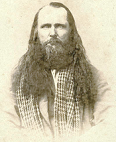




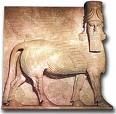







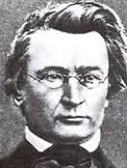

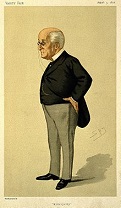

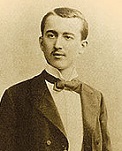



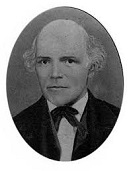







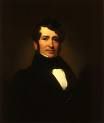
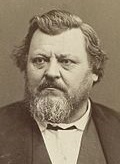



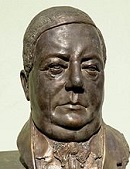
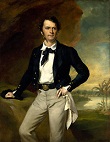



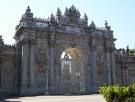

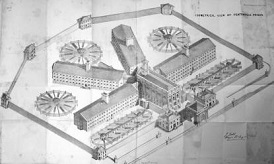

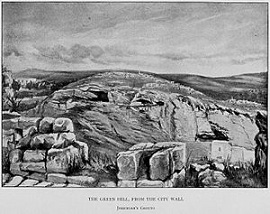
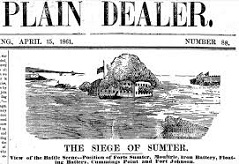

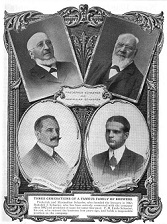

1842 The worst retreat in British history and it's where, the country that has not been conquered since Alexander the Great? On Jan. 6 an uprising causes 4.5K British troops and 12K native auxiliaries under incompetent Scottish-born maj. gen. William George Keith Elphinstone (1782-1842) to decide to retreat from Kabul to Jalalabad 90 mi. away, but they are ambushed on Jan. 8 (Sat.) at the narrow (5-150 yd.) Khoord-Kabul (Khyber) Pass (home of the Afridi tribe) by the Ghilzais border tribe under Mohammad Akbar Khan, after which the remnants are wiped out on Jan. 13 near Gandamak, with one Brit, asst. surgeon William Brydon (1811-73) allowed to escape to tell the other Brits the horror story; the British keep a stiff upper lip and send more forces, force the pass in Sept. and seige Kabul; Shah Shoja is murdered, the British take Kabul, declare victory, and retreat, er, leave on Oct. 11, allowing Dost Mohammed to return to power (until 1863), ending the First Anglo-Afghan War (begun 1839); in May Mohammad Akbar Khan becomes emir of Afghanistan (until 1845) - the Afghans don't teach them Westerners any lasting lessons? On Jan. 13 Ottoman sultan (1839-61) Abdulmeced I deposes Bashir III, and appoints Omar Pasha as gov. of Mt. Lebanon, ending the Chehab (Shihab) Dynasty (founded 1697). On Jan. 21 after Britain and Prussia appoint him the first Protestant bishop in Jerusalem and ordain him on Dec. 7, 1841, Jewish convert Bishop Michael Solomon Alexander (1799-1845) arrives, announcing his intention of bringing Jews to Christ, pissing them off, esp. after baptiizng three Jews on May 21, 1843 in the new Hebrew Christ Church near the Jaffa Gate and next door to the British consulate; more Jews are baptized in 1844; the Roman Catholic Church responds by reestablishing their Latin Patriarchate in Jerusalem; Alexander dies on Nov. 23, 1845. On Jan. 24 the U.S. Supreme (Taney) Court rules unanimously in Swift v. Tyson that federal courts hearing cases brought under their diversity jurisdiction (U.S. Constitution Article 3, Para. 2) pursuant to the U.S. Judiciary Act of 1789 must apply the statutory law of the states when their legislatures had spoken on the issue, but don't have to when they hadn't, allowing the development of a federal common law; too bad, it leads to forum shopping instead; overturned in Erie Railroad Co. v. Tompkins (1938). On Jan. 31 Pres. Tyler's daughter Elizabeth "Lizzie" Tyler (1823-50) marries William Nevison Waller (1820-70) in the East Room of the White House, becoming the 2nd daughter of a pres. to marry in the White House (next 1874); cabinet members and high govt. officials attend, but there's still no public interest. On Feb. 22 (110th anniv. of George Washington's Birth) Springfield, Ill. lawyer Abraham Lincoln (33) gives his Temperance Address to the Springfield Washington Temperance Society at the Second Presbyterian Church, pushing "kind, unassuming persuasian" instead of harsh measures, and ending with the soundbyte: "Happy day, when all appetites controled, all passions subdued, all matters subjected, mind, all conquering mind, shall live and move the monarch of the world. Glorious consummation! Hail fall of Fury! Reign of Reason, all hail!"; speaking of reason, and on Nov. 4 he marries mentally unstable Mary Ann "Mollie" Todd (1818-82) of Ky.; they have 4 sons (Robert, Edward, William, Thomas or Tad) and no daughters; Edward dies in infancy, William during his presidency at age 11, Tad at age 18; Robert Todd Lincoln (1843-1926) grows up and makes good; in 1844 they buy Abe's only home in Springfield, Ind. for $1.2K from Rev. Charles Dresser, who performed the marriage ceremony. On Mar. 1 the U.S. Supreme (Taney) Court rules 6-3 in Prigg v. Pennsylvania that state liberty laws designed to circumvent the U.S. Fugitive Slave Act of 1793 are unconstitutional, the slave owner's right to his property taking precedence over state legislation; at the same time, it holds that the enforcement of the law is entirely a federal responsibility, and that state officers have no obligation to help them round up Uncle Toms or Little Lizas. On Mar. 17 the Wyandot agree to relinquish all claims to lands in Ohio and Mich., and settle in Kansas. In Mar. the Mass. Supreme Court (chief justice Lemuel Shaw) makes a landmark ruling in Commonwealth v. Hunt that the formation of a trade union is not in itself illegal, nor a demand that employers hire only union members, and that workers may strike whenever an employer hires nonunion labor; the opinion frees labor unions from the old doctrine of criminal conspiracy, and is hailed as "Labor's Magna Carta" - let that dog hunt? In Mar. after planning an invasion to retake Tex. in early Jan., then staging another revolt and forcing Anastasio "Bust a Move" "I'm Busted" Bustamante from power again, Gen. Santa Anna becomes pres. of Mexico again, and orders an invasion of his arch-enemy Tejas, er, Texas, but 1.4K troops are routed at the Battle of Salado Creek in Salado Creek, Tex. on Sept. 17 by 220 Tex. milia, with 60 Mexicans KIA and hundreds wounded vs. 1 Texian KIA and 9-12 wounded; Bustamente serves with the Mexican army during the 1846-8 U.S.-Mexican War. On Apr. 2 the New York Philharmonic Society (first in the U.S.) is founded by violinist-conductor Ureli Corelli Hill (1802-75) (pres. #1) et al., becoming #1 of the Big Five U.S. Symphonies; their inaugural concert on Dec. 7 is Beethoven's Fifth Symphony. On May 2 the Third Chartist Petition is presented to Parliament by Radical MP ("the Radical Dandy") ("the Dandy Demagogue") Thomas Slingsby "Honest Tom" Duncombe (1796-1861) accompanied by 3,315,752 signatures (most from Yorkshire and Lancashire); to bad, it is ignored. On May 5-8 the Great 1842 Fire of Hamburg in Germany destroys one-third of the city and shuts it down for awhile, but it's too busy to let it keep it down for long, and is rebuilt bigger and more modern. On May 6 (eve.) after moving to a house in the City of Zion plot in Independence, Mo. three blocks E of Temple Lot, Mormon archenemy Lilburn Williams Boggs (1796-1860) (gov. #6 of Mo. in 1836-40) is shot through a window as he reads a newspaper in his study, almost killing him; after a revolver is discovered at the scene, Mormon Danite Orrin Porter "Old Port" Rockwell (1813-78), bodyguard and close associate of Joseph Smith Jr. known as "the Destroying Angel of Mormondom" is arrested, then tried and acquitted in 1843 after spending 8 mo. in jail, moving to Nauvoo, Ill., where Smith prophesies that as long as he doesn't cut his hair "no bullet or blade can harm thee" a la Samson. On May 14 (Whit Sat.) the weekly Illustrated London News begins pub. in London, England, becoming the first illustrated newspaper; the debut issue features a fancy dress ball given by Queen Victoria at Buckingham Palace; it is discontinued in 2003; meanwhile London coffeehouse keeper Edward Lloyd (1815-90) launches the copycat Sun. morning Lloyd's Weekly. On May 18 Thomas Wilson Dorr and his followers give up arguing and seize a state armory in Rhode Island, beginning Dorr's Rebellion. On May 24 English-born colonist Richard Philip "Dick" King (1813-71) and his Zulu servant boy Ndongeni are sent by a beleaguered force of 250 British soldiers bottled up in Durban Harbor in South Africa to get help from the British base at Grahamstown 300 mi. to the S; after an arduous trek on horseback he arrives on June 4, and returns 1 mo. later with relief forces, becoming a British hero. On May 29 John Francis attempts to assassinate Queen Victoria in St. James's Park, but misses, and is transported to Australia for life; after a new Treason Act reduces the max. sentence from death to seven years for using a weapon in the monarch's presence, in July John William Bean is caught near the queen with a gun near loaded with tobacco and paper, and is sentenced to 18 mo. In May Joseph Smith Jr. creates the Quorum of the Anointed (Holy Order), giving them their washings and anointings and endowments in the upper floor of his Red Brick Store in Nauvoo, Ill., with membership eventually reaching 60+. In May after Bent's Fort misses a shipment of hides wanted by the East, causing them to see their chance, Pueblo, Colo. on the N bank of the Arkansas River at its confluence with Fountain Creek in S Colo. on the border of the Louisiana Purchase (modern-day pop. 110K) is founded as Ft. Pueblo (El Pueblo) by Bent's Fort trader George Simpson et al., who build a log fort to protect against hostile Utes, attracting Va.-born part-black mountain man James P. "Jim" Beckwourth (1798-1867), white mountain man Christopher Houston "Kit" Carson (1809-68), et al. while reaching 100 pop., encouraging farming and ranching; in winter 1846 a party of several hundred Mormons from Miss. arrive, and are joined by a group of sick members of the Mormon Battalion incl. women and children, who all leave for the Salt Lake Valley next July; too bad, the 1848 Mexican-Am. War and the 1849 Calif. Gold Rush deplete it, and by 1854 only 15-20 live there. On July 23 the capstone of the new Bunker Hill Monument (begun 1825) is laid; it is dedicated next June 17. On Aug. 9 the Webster-Ashburton Treaty between Britain and the U.S. is signed, settling disputes over the Canadian border, taking away from the U.S. a strip claimed by Maine while ceding to them territory N of Vt. and N.Y. claimed by Canada, incl. the iron-rich Mesabi Range (Ojibway "missabe wudjiu" = giant mountain) in NE Minn. On Aug. 13-15 13,745 ft. (4,189m) Fremont Peak in Wyo. is first climbed by Am. explorer John Charles Fremont (1813-90) (son-in-law of Mo. U.S. Sen. Thomas Hart Benton) on the first of four expeditions of the Am. West., guided by Christopher Houston "Kit" Carson (1809-68), going on to pub. A Report on an Exploration of the Country Lying between the Missouri River and the Rocky Mountains on the Line of the Kansas and Great Platte Rivers, which was printed by newspapers across the U.S., making him a celeb, with the nickname "The Pathfinder", describing the 700-mi. Old Spanish Trail from Santa Fe to Los Angeles, parts of which go back to the 16th cent., w hich has been extensively used by pack trains since 1830 (until the mid-1850s); Carson goes on to become the most famous Am. frontiersman after Daniel Boone. On Aug. 14 the Second Seminole War (begun 1835) ends, and the Seminoles agree to go W to Ark. then to Indian Territory in Okla.; a few hundred Seminoles hide in their swamps; Chief Billy Bowlegs (1810-59) is taken to Washington, D.C. to awe the other chiefs - we took care of the conquistadors, and one day day day? On Aug. 18 after suppressing a rebellion and restoring him to the throne, Sultan Omar Ali Saifuddien II of Brunei on NW Borneo gives English adventurer James Brooke (1803-68) the title of rajah and the right to rule Sarawak; in 1846 he presents Labuan Island to the British govt., who appoints him gov. and CIC; the publicity causes naturalist Alfred Russel Wallace to lead an 8-year expedition there in 1854-62. On Aug. 29 the First Anglo-Chinese (Opium) War (begun Nov. 3 1839) is ended by the Treaty of Nanking, confirming the cession of Hong Kong to the British drug lords, and making Canton a treaty port open to foreign trade, freeing the Brits to addict millions of Chinese to opium (until 1908) under Hong Kong gov. #1 (June 26, 1843-May 8, 1844) Sir Henry Eldred Curwen Pottinger (1789-1856) (June 26, 1843 to May 8, 1844) - it's going to be a bright sunshiny day? On Sept. 14 Serbian prince (since July 8, 1839) Michael (Mihailo) Obrenovic III is deposed by a revolt led by Serbian #2 strongman Toma Vucic-Perisic (1787-1859), known for the soundbyte: "I'm not afraid of anyone, I'm just afraid of the Constitution", and Aleksandar (Alexander) Karadordevic (1806-85) becomes prince of Serbia (until Dec. 23, 1858)), going on to found a regular army along with a cannon foundry, improve the school system, and establish a nat. library and museum. On Sept. 15 after Francisco Morazan (b. 1799) organizes an army and invades Costa Rica, proclaiming the Central Am. Confederation restored, he is captured, tried and executed in San Jose - real celebrities become real cops? On Sept. 17 the Dawson Expedition (Massacre) sees 36 Texian militiamen KIA and 15 of 54 captured by 500 Mexican cavalry near San Antonio, Tex. after the Texians raise a white flag but the two Mexican cannons keep firing. In Sept. the Cherokee Slave Revolt sees black slaves unsuccessfully revolt from their Cherokee masters. In Sept. Wetzlar, Prussia, German-born brothers Frederick Schaefer (1817-97) and Maximilian Karl Emil Schaefer (1819-1904) found F&M Schaefer Brewing Co. in Manhattan, N.Y., brewing their first lager beer in 1848 using caves along the East River, and growing to the 6th largest brewery in the U.S. in 1871, and 5th largest in the 1970s, with the slogan "America's first lager, since 1842"; the co. is taken over by Maximilian's son Rudolph Schaefer, followed by Rudolph's son F.M. Emile Schaefer; in 1968 it goes public, opening a new plant in Allentown, Penn. in 1972, reaching 2.5M barrels/year in 1974 and 5M barrels/year in 1975; in 1981 it is acquired by Stroh Brewing Co., which is acquired in 1999 by Pabst Brewing Co. On Oct. 5 after the citizens grow dissatisfied with top-fermented beer, emptying several casks in public, bottom-fermented Pilsner (Pilsen) (Pils) style pale (blonde) lager beer is first produced by the new municipal Pilsner Urquell Brewery in Pilsen, Bohemia, headed by Josef Groll (1813-87), who becomes known as "the Father of the Pils"; pilsner beer goes on to make up two-thirds of modern beer production. On Oct. 15 (Sat.) The Nation, official organ of the Young Ireland Movement begins pub. in Dublin, advocating "defensive physical force" against the govt. when necessary, causing a split with Daniel O'Connell's Repeal Assoc. in 1846; cooperation with Protestant leaders and Young Italy results in opposition by Pope Gregory XVI; it is shut down by the govt. on July 28, 1848, then revived in Sept. 1849 (until 1900). On Oct. 29 a Category 2 (60 mph) hurricane hits SW Spain after passing near Madeira. In Oct. after the Boers in Natal across the Orange River from Cape Colony and sign a truce with the Brits, they proclaim the Orange Free State; too bad, the Brits begin sending their own immigrants in, ignoring Boer land claims. In Nov. Thomas Wilson Dorr's Rebellion in Rhode Island forces the state to abolish the charter of 1663 and adopt a new 1843 R.I. Constitution, effective next May, giving universal suffrage to males incl. blacks (all five of them), and outlawing slavery; Dorr is tried for treason (first since Benedict Arnold) and sentenced to life in solitary confinement and hard labor, but pardoned in 1854. In Nov. after the Dawson Massacre, the Mier Expedition of the Texian militia against Mexican border settlements in disputed territory between the Rio Grande and Nueces Rivers begins (until Feb. 1843), culminating in the 24-hour Battle of Ciudad Mier on Dec. 25, in which 200 Texians surrender after running out of food, water, and ammo despite sustaining only 30 casualties vs. 800 for the Mexicans; too bad, the Mexicans consider them pirates and march them back to Mexico City for execution, during which an escape attempt fails and 176 of 179 are recaptured and returned to Salado in Tamaulipas, after which pres. Antonio Lopez de Santa Anna intervenes, ordering Coahuila gov. Francisco Mexia to execute them, but he balks, and Santa Anna orders the Black Bean Episode on Mar. 25, 1843, in which the POWs are forced to draw from a jar containing 159 white and 17 black beans in El Rancho Salado, and the unlucky 17 esecuted, along with Scottish-born Capt. Ewen Cameron, who led the escape attempt and is executed on Apr. 26, 1843 despite drawing a white bean. N England is rocked by riots and strikes in industrial areas. The Tory cabinet reorganizes the English system of taxation, imposing an Income Tax for three years, the first in time of peace; it also passes a sweeping simplification and reduction of the tariff schedules, lowering the duty on 750 of the 1200 articles taxed, becoming a step towards free trade. A new tariff bill by Congress imposes a 30% ad valorem rate on all imported goods to help America's distressed economy recover. The French led by vice-adm. Abel Aubert Dupetit Thouars (1793-1864) annex the Marquesa Islands and declare Tahiti and the Society Islands a French protectorate. A 2-man consulate led by elitist Carlos Antonio Lopez (1790-1862) is formed in Paraguay, who evolves into a pres. for life (dictator) as neighboring countries refuse to recognize it, and Argentine dictator Juan Manuel de Rosas closes the Parana River to vessels bound for Asuncion, increasing tensions; meanwhile Lopez ends isolationism and begins hiring foreigners to build up his military. On May 5 the Great 1842 Fire of Hamburg in Germany destroys one-third of the city and shuts it down for awhile, but it's too busy to let it keep it down for long, and is rebuilt bigger and more modern. Am. writer Washington Irving becomes U.S. ambassador to Spain. Venezuelan dictator Jose Antonio Paez has the remains of hero Simon Bolivar (d. 1830) repatriated from Santa Marta, Colombia to his hometown of Caracas, where they are entombed in the Caracas Cathedral with a big procession and ceremony. The Generation of 1842 in Chile is founded by the newly rich mining elite, who develop liberal and radical leanings. The Christian Mission to the Jews (CMJ) establishes Christ Church, the first Anglican church in the Old City of Jerusalem. Albert Gallatin et al. found the Am. Ethnological Society in New York City. At the recommendation of Alexander von Humboldt, German (Prussian) archeologist Karl (Carl) Richard Lepsius (1810-84) is commissioned by Friedrich Wilhelm IV of Prussia to lead an expedition to Egypt and Sudan to take up where Champollion left off, reaching Giza in Nov. and discovering 67 pyramids and 130 noble tombs, visiting Naqa next year and reaching as far S as Khartoum before traveling up the Blue Nile to Sennar in Nubia, then reaching Thebes on Nov. 2, 1844, returning to Europe in 1846, after which Lepsius pub. his 12-vol. masterwork "Monuments from Egypt and Ethiopia" (1849), making him the father of modern Egyptology, coining the term "Book of the Dead" (Totenbuch). Marshalsea Prison in Southwark, London for debtors, smugglers, trespassers, etc. (founded 1329), where Charles Dicken's father was sent in 1824 for a debt of 40 pounds and 10 shillings is abolished; "It is gone now, and the world is none the worse without it" (Charles Dickens, preface to "Little Dorrit"). The penal station of Brisbane, Australia is opened to free settlers. Belgium creates compulsory primary schools with Roman Catholic clergy providing religious instruction; meanwhile Paul Devaux (1801-80) calls for an end to the Catholic-dominated Unionist govt. system and the creation of a party system to allow liberals a voice. Floris Adriaan van Hall (1791-1866) replaces Van Maanen as minister of justice in the Netherlands, then becomes finance minister next year, going on to refinance the state debt to avert bankruptcy; too bad, the country has failed to industrialize, and only has 17 km of railroad tracks, causing the Dutch people to become the white trash of W Europe? The first London Metropolitan Police HQ is founded at 4 Whitehall Place, next to a site called Great Scotland Yard Lane, where the medieval kings of Scotland stayed when visiting, causing it to be nicknamed Scotland Yard. The 10-island Chatham Islands 400 mi. E of the mainland become part of New Zealand; they incl. Chatham Island, Pitt Island, and the Forty-Fours, which becomes the country's easternmost point. Britain extends the principles of the factory acts for textile workers et al. to mine workers. Queen Victoria makes her first railroad journey from Windsor to Paddington in London, and visits the London Zoo, where she sees an orangutan named Jenny, and declares it "frightful and painfully and disagreeably human". German Bible scholar Otto Thenius visits Jerusalem, proposing that a rocky knoll next to Jeremiah's Grotto N of the Damascus Gate was the Biblical Golgotha ("place of the skull") where Jesus Christ was crucified along with the rock-cut Garden Tomb, which makes fans of several Protestant scholars incl. English scholar Canon Henry Baker Tristram, and Fisher Howe, co-founder of Union Theological Seminary in N.Y. , who claims independent discovery; in 1872 British Royal Engineers Lt. Claude Reignier Conder (1848-1910) is sent by the Palestine Exploration Fund to conduct a mapping survey of Western Palestine, backing up Thenius' theory and making more fans, esp. British Maj.-Gen. Charles George "Chinese" Gordon (1833-85), who visits Jerusalem in 1883 and gains mucho publicity for the idea, causing it to become known as Gordon's Calvary. It's all about freedom of expression? German Young Hegelian Friedrich Engels (1820-95) meets former Young Hegelian, German Jewish know-it-all Karl Marx (1818-83) at the offices of the Rheinische Zeitung in Manchester, England, but they are not impressed with each other; Engels hooks up in Manchester with Irish working class radical Mary Burns (1821-63), shacking up with her without doing that old-fashioned marriage thang, making enough money to support Marx, who next June 19 marries childhood friend, Prussian aristocrat Baroness Johanna Bertha Julie Jenny Freiin von Westphalen (1814-81) (after Marx dedicated his doctoral thesis to her liberal father Ludwig von Westphalen); they go on to have seven children, only three of whom survive to adulthood, Jenny, Laura, and Eleanor. Joseph Smith Jr. sends a letter to "Long" John Wentworth (1815-88) (Repub. mayor #19 of Chicago in 1857-8), ed. of the Chicago Democrat, containing the Latter Day Saints Articles of Faith (Epitome of Faith and Doctrine), consisting of 13 fundamental doctrines. The Relief Society (RS) educational women's org. is founded in Nauvoo, Ill. by the LDS Church, reaching 7.1M members in 188 countries by 2017; pres. #1 is Joseph Smith Jr.'s 1st wife Emma Hale Smith Bidamon (1804-79). The Nauvoo Brass Band (originally Joseph's City Band, Pitt's Brass Band) is formed in Nauvoo, Ill. by Dymock, England-born bandleader William Hill Pitt (1813-73) to accompany the Mormon Nauvoo Legion and perform at special events; after raising money at ticketed events in Iowa in 1846 during their emigration to Utah, they scatter until they are reorganized in 1850, performing at the 1853 Salt Lake Temple site dedication ceremony and the cornerstone laying ceremony; in 2003 they are recreated by the LDS Ill. Nauvoo Mission. The Wadsworth Atheneum Museum of Art in Hartford, Conn. is founded by Daniel Wadsworth (1771-1848). Benjamin Lumley (1811-75), son of a Jewish merchant takes over Her Majesty's Theatre in London, traditional home of Italian opera, going on to develop a working relationship with Giuseppe Verdi. Giacomo Meyerbeer becomes musical dir. of the Royal Opera House in Berlin. Villanova U. in Radnor Township (near Philadelphia), Penn. is founded by the Augustinian monastic order, named after St. Thomas of Villanova (1488-1555), becoming the oldest and largest Roman Catholic U. in Penn. Nathaniel Hawthorne bugs out of Brook Farm, marries transcendentalist abolitionist Sophia Amelia Peabody (1809-71), moves to Concord, Mass., and joins the thriving lit. scene. Finnish nationalist Johan Vilhelm Snellman (1806-81) returns to Finland from exile and founds the Finnish newspaper Farmer's Friend and the Swedish newspaper Saima in 1844, the latter closed by the govt. in 1846; the struggle of the Finns to divorce themselves from the Swedish label and their Russian masters continues. Unknown Russian writer Ivan Turgenev (1818-83) fathers daughter Pelageya by his mother's seamstress; she is later renamed Paulinette and brought up by French soprano Pauline Garcia-Viardot (1821-1910), daughter of Spanish opera singer Manuel Garcia, and younger sister of soprano Maria Malibran, whom he falls in love with after hearing her in "The Barber of Seville" in Russia next year, causing him to stalk, er, follow and move in with her and her four kids in 1845. Due to the work of Philip Henry Stanhope, 5th Earl Stanhope (1805-75), the Literary Copyright Act of 1842 is passed in Britain, giving authors protection for 42 years, or their lifetime plus seven years; meanwhile English lit. giant Charles Dickens (1812-70) goes on a 5-mo. Reading Tour of the U.S., lecturing on the need for internat. copyright (calling Yankees pirates, which they have long been, starting with Benjamin Franklin), and against slavery, and is grossed-out by the "universal disregard of the spitoon with which every honourable member is accomodated" as he wades through the disgusting carpet of the U.S. Senate; he pigs out in New York City's famed oyster bars, which have red balloons outside their front doors, giving rise to the term "red light district". 20-y.-o. Mathew B. Brady (1822-96) culminates three years of dabbling with the daguerrotype process by opening a portrait studio in oh-what-a-life New York City. Abraham Lincoln is challenged by Irish-born Ill. state auditor James Shields (1810-79) to a duel for slander, and Lincoln chooses broadswords, stipulating that they must each stand on opposite sides of a log so Lincoln can make use of his height advantage; they then make up and call it off, and become friends; Shields goes on to become a U.S. Civil War Union brig. gen. and serve as senator in a record three different states. Mudie's Circulating Library in England opens (until 1894), founded by Charles Edward Mudie (1818-90), helping promote Victorian novels by charging 1 guinea per year for the right to borrow one vol. at a time, causing the 3-vol. novel to become successful; he refused to stock "immoral" novels, helping keep Victorian England prudish; the rise of govt.-funded public libraries eventually takes away his business. The (Cleveland) Plain Dealer newspaper is founded in Cleveland, Ohio. Sir Isaac Pitman (1813-97) (knighted in 1894) founds the weekly Phonographic Journal, later called the "Phonetic Journal", and later founds a pub. firm putting out pamphlets calling for radical English spelling reform. George Pope Morris (1802-64) becomes ed. of the New York Evening Mirror (until 1846), which pub. stories by Edgar Allan Poe (1809-49), William Cullen Bryant (1794-1878) et al. George Washington Harris (1814-69) begins pub. his humorous Twain-like tales in the New York City newspaper Spirit of the Times. The U. of Chile in Santiago is founded on Nov. 19, with Caracas-born brain man Andres Bello (1781-1865) as first rector (until 1865). The Citadel military school is founded in Charleston, S.C. - time to garrison against Garrison? Roanoke College in Augusta County, Va. (later Salem, Va.) is founded by the Lutherans. Roman Catholic Villanova U. (originally Augustinian College of Villanova) is founded in Radnor Township NW of Philadelphia, Penn. by the Order of St. Augustine; in 1918 it admits nuns to evening parochial school education classes; in 1958 it admits women to its college of engineering; in 1968 it goes fully coed; sports teams are called the Wildcats. Stephen H. Whitman founds Whitman's Candies in Philly, going on to create the Whitman's Sampler in 1912. Architecture: On July 24 La Madeleine Church in Paris is consecrated, designed by French neoclassical architect Jacques-Marie Huve (1783-1852). The domed spired Dolma Bahce (Dolmabahce) Palace (Sarayi) of the sultans in Constantinople on the Bosphorus shore is begun (finished 1853), becoming the main admin. center of the Ottoman Empire in 1856-87 and 1909-22. Due to overcrowding, disease, and high costs at Millbank Prison, Pentonville Prison in Barnsbury, London, England opens to take over Millbank Prison's role as the British Nat. Penitentiary, with Millbank used only for holding prisoners for 3 mo. before being transported, reaching 4K/year by 1850-3, then tapering off until it closes in 1890; in 1902 Pentonville takes over responsibility for executions. A new railroad connects Boston, Mass. and Albany, N.Y. Steel cables are imported from England to build Maine's Fool (Wire) Bridge in Portland, Maine, which sways weirdly when crossed. Inventions: In June Scottish engineer James Nasmyth (1808-90) (son of painter Alexander Nasmyth) patents the Steam Hammer to help forge the paddle shaft of the HMS Great Britain. The first commercial artificial fertilizers are introduced in England. Robert Wilhelm Eberhard von Bunsen (1811-99) of Germany invents the carbon electrode battery, far less expensive than William Robert Grove's platinum electrode battery. This year and next Augusta Ada King, Countess of Lovelace (1815-52), daughter of Lord Byron (1788-1824) tr. a memoir by Italian mathematician Federico Luigi, Count of Menabrea (1809-96) on the Analytical Engine of Charles Babbage, publishing the first known computer program, which calculates Bernoulli numbers; really written by Babbage? Samuel F.B. Morse invents an underwater (submarine) telegraph cable. Scottish maltster (in England) Patrick Stead (1788-1869) patents a revolutinary malting system using steam and hot air to control germination and kilning, becoming the prototype of modern-day mechanical malting; too bad, acceptance is slow. Science: On Mar. 30 Ga.-born U. of Penn. Medical School grad. (1839) Crawford Williamson Long (1815-78) pioneers surgical ether anesthesia during a minor operation to remove a neck tumor from James M. Venable, followed by eight more operations over the next four years, but fails to announce his results until 1849, allowing William T. Morton to grab the glory, after which he has U.S. Sen. William Crosby Dawson present his claims to Congress in 1854; his statue ends up in the crypt of the U.S. Capitol as one of two to represent the state of soporific Magnolia-blossom Jawjaw. French mathematician Joseph Alphonse Adhemar (Adhémar) (1797-1862) pub. Revolutions of the Sea, proposing the astronomical theory of Ice Age causation, which evolves into the theory of Milkanovich Cycles in the 1920s by Serbian mathematician Milutin Milankovic (1879-1958). After being appointed French consul in Mosul in 1841, Turin, Italy-born French archeologist Paul-Emile (Paul-Émile) (Paolo Emiliano) Botta (1802-70) discovers the ruins of the Assyrian capital of Dur-Sharrukin (modern-day Khorsabad) 9 mi. NE of Mosul, Iraq, built ca. 700 B.C.E., returning to France in 1845 with many artifacts from it, making him a star; the entrance to Sargon II's palace throne room features a pair of reliefs of a 16-ft.-high Winged Bull that combines features of a man (head), eagle (wings) and lion (tail); it ends up in the Oriental Inst. of the U. of Chicago. English physician John Hughes Bennett (1812-75) becomes the first to describe apergillosis; in 1845 he becomes the f irst to pub. a description of leukemia as a blood disorder. Austrian physicist Christian Andreas Doppler (1803-53) pub. the first explanation of the Doppler Effect (Shift). Jamaican-born British physician James Manby Gully (1808-83) opens a "water cure" (hydrotherapy) clinic in Great Malvern, becoming a celeb, with patients incl. Thomas Carlyle, Charles Darwin, Charles Dickens, Florence Nightingale, Alfred Lord Tennyson, and Samuel Wilberforce; the treatment incl. wearing a "Neptune Girdle" (wet sheet) around their waists, and abstinence from alcohol. English physicist Joseph Henry (1797-1878) discovers the oscillatory character of electrical discharges. U.S. naval officer Matthew Fontaine Maury (1806-73) becomes supt. of the U.S. Depot of Charts and Instruments of the U.S. Naval Observatory in Washington, D.C., spending the next 19 years doing researches into oceanography, compiling ocean wind and current charts from old ship logs. German physician Julius Robert von Mayer (1814-78) announces an improved value for the mechanical equivalent of heat, calculated by an apparatus pulled by a horse that stirs paper pulp in a cauldron, and proposes the law of conservation of energy, which holds even for living systems, and also states that the Sun is the ultimate source of energy on Earth; not being a recognized scientist (member of a prof. assoc. of stuffed shirts), he is ignored; he says that a weight falling 365m will lose enough potential energy to warm an equal weight of water by 1 deg C, corresponding to a mechanical equivalent of heat of 3.56 Joules per calorie, not far from the real figure of 4.184. The rare earth element Yttrium (Y) (#39) (obtained from monazite sand, known for use in red phosphors for color TVs and garnet crystals) is discovered by Swedish chemist Carl Gustaf (Gustav) Mosander (1797-1858), who also discovers the rare metallic element didymium in cerite, but later finds that it's just a mixture of the elements neodymium and praseodymium. German naturalist August Christoph Carl Vogt (1817-95) discovers the mechanism of apoptosis (programmed cell death) while studying the development of the midwife toad. Nonfiction: Thomas Arnold (1795-1842), Sermons: Christian Life, Its Hopes, Fears and Close; a favorite of Queen Victoria; Introductory Lectures on Modern History; History of Rome (3 vols.) (1838-42) (unfinished). John Cook Bennett (1804-67), The History of the Saints: Or, An Expose of Joe Smith and Mormonism; accuses Joseph Smith Jr. and his followers of treason, conspiracy to commit murder, prostitution, adultery et al.; "I have been induced to prepare and publish the following work by a desire to expose the enormous iniquities which have perpetrated by one of the grosses and most infamous impostors that ever appeared upon the face of the earth, and by many of his minions, under the name and garb of Religion, and professedly by the direct will and command of Almighty God." Friedrich Wilhelm Bessel (1784-1846), Astronomische Untersuchungen (Astronomical Investigations). George Henry Borrow (1803-81), The Bible in Spain (3 vols.); details his efforts to place 14K copies of the Bible in priest-ridden Spain. Thomas Campbell (1777-1844), Life of Mrs. Siddons. Edwin Chadwick, The Sanitary Conditions of the Labouring Population; raises awareness of the need for public health laws in England. Capt. R.T. Claridge (1797-1857), Hydropathy; or The Cold Water Cure, as practiced by Vincent Priessnitz">. Victor Cousin (1792-1867), Lecons de Philosophie sur Kant; tries to combine Kantian idealism with the philosophy of common sense and the doctrines of Descartes. Charles Darwin (1809-82), The Structure and Distribution of Coral Reefs. Charles Dickens (1812-70), American Notes; describes a visit to Almack's Dance Hall in Manhattan's Five Points, where he sees black tap dancer Master Juba (1825-53). Christian Johann Doppler (1803-53), On the Colored Light of the Binary Stars; first description of the Doppler Effect. Ugo Foscolo (1778-1827), Sul Testo della Commedia di Dante (posth.). Oliver Wendell Holmes Sr. (1809-84), The Contagiousness of Puerperal Fever; presented to the Boston Society for Medical Improvement, becoming a landmark in medicine, introducing aseptic techniques in obstetrics (later surgery); in the 20th cent. Dean Cornwell paints Oliver Wendell Holmes Reading The Contagiousness of Puerperal Fever Before the Boston Society for Medical Improvement in 1843. Soren Kierkegaard (1813-55), Either-Or (Euten-Eller); critique of Hegel; his masterpiece? Karl Richard Lepsius (1810-84), Das Todtenbuch der Ägypter nach dem hieroglyphischen Papyrus in Turin mit einem Vorworte zum ersten Male Herausgegeben (The Egyptian Book of the Dead Based on the Hieroglyphic Papyrus in Rurin with a Preface for the First Time). Justus von Liebig (1803-73), Die Thierchemie; reduces all physical and mental actions of animals to chemical reactions? Rudolf Hermann Lotze (1817-81), Allgemeine Pathologie und Therapie als Mechanische Naturwissenschaften - lotze sesquipedalian words? Thomas Babington Macaulay (1800-59), Laws of Ancient Rome. Julius Robert von Mayer (1814-78), On the Forces of Inanimate Nature. Robert Moffatt (1795-1883), Missionary Labours and Scenes in South Africa; Scottish missionary turns a "horde of bloodthirsty savages" into civilized people; by David Livingstone's father-in-law, who later talks him into his work. Augustus De Morgan (1806-71), The Differential and Integral Calculus. Theodore Parker (1810-60), A Discourse on Matters Pertaining to Religion; his Rationalist views on the Bible cause other Unitarian ministers to skunk him, only making him stronger, and causing him to form his own church in Boston and turn into a leading abolitionist. Rene Francois Rohrbacher (1789-1856), Histoire Universelle de l'Eglise Catholique (1842-9); opposes Gallicanism and uses the Bible to predict the fall of the Turkish Empire in 1882. William Smith (1813-93) (ed.), Dictionary of Greek and Roman Antiquities; 2nd ed. in 1848. Frances Trollope (1780-1863), A Visit to Italy (2 vols.) Martin Tupper (1810-89), Proverbial Philosophy, 2nd Series. Heinrich Daniel Zschokke (1771-1848), Eine Selbstschau (autobio.). Music: Frederic Chopin (1810-49), Polonaise in A flat major, Op. 53; super-difficult Romanic piano piece; dedicated to his German banker friend Auguste Leo; "The composition which is the closest to my heart" (Arthur Rubinstein); the theme of the 1946 film Till the End of Time, becoming a hit for Perry Como and spending 10 weeks at #1 on the Billboard charts. Mikhail Glinka (1804-57), Ruslan and Lyudmila (opera) (Bolshoi Theatre, St. Petersburg) (Nov. 27); based on an 1820 Alexander Pushkin poem; too bad, it flops, after which his career tanks and he travels abroad until he croaks in Berlin; incl. Ruslan and Lyudmila Overture. Albert Lortzing (1801-51), The Poacher (Der Wildschutz) (Leipzig). Felix Mendelssohn (1809-47), Scotch Symphony. Giuseppe Verdi (1813-1901), Nabucco (Nebuchadnezzar) (opera) (Mar. 9) (La Scala, Milan); libretto by Temistocle Solera; based on the play by Anicet-Bourgeois and Francis Cornu; makes him a star; incl. Va, Pensiero, Sull'ali Dorate (Fly, Thought, on Golden Wings) (Chorus of the Hebrew Slaves); the only chorus allowed by the Metropolitan Opera; the soprano role of Abigaille has so much high tessitura that it ruins singers' voices, causing Leontyne Price and Joan Sutherland to refuse to sign it, although Ghena Dimitrova (1941-2005) excels at it. Richard Wagner (1813-83), Rienzi, der Letze der Tribunen (Rienzi, the Last of the Tribunes) (Dresden). Art: John Gadsby Chapman, The Lake of the Dismal Swamp. Paul Gavarni, La Flaneur. Horatio Greenough (1805-52),Statue of George Washington; Boston-born Neoclassical sculptor Horatio Greenough (1805-52) (who went to Florence, Italy in 1833 to sculpt figures for author James Fenimore Cooper and received a U.S. govt. commission to sculpt Washington) brings his godlike but partially-draped sculpture to Washington, D.C., unveiling it next year and shocking Victorian sensibilities; it ends up in the Smithsonian; really an Illumani depiction of Baphomet? Charles Deas (1818-67), Lion; a dog spots one. Jean Louis Ernest Meissonier (1815-91), A Game of Chess. Abraham Solomon (1823-62), The Acolyte. J.M.W. Turner (1775-1851), Snowtorms: Steamboat Off a Harbor's Mouth. Plays: Robert Browning (1812-89), King Victor and King Charles (Bells and Pomegranates No. 2). Alexandre Dumas pere (1802-70), Lorenzino. Maurus Jokai, The Jew Boy. Johann Nestroy (1801-62), He Wants to Have a Lark (He'll Go on a Spree) (Einen Jux Will er Sich Machen) (farce); used by Thornton Wilder as a basis for "The Matchmaker" (1956). Eugene Scribe (1791-1861), Le Verre d'Eau (The Glass of Water) (comedy) (Theatre Francais, Paris); Une Chaine (comedy) (Theatre Francais, Paris). Poetry: Steen Steensen Blicher (1782-1848), The Knitting Room. Robert Browning (1812-89), Dramatic Lyrics (Bells and Pomegranates No. 3); incl. My Lost Duchess, Porphyria's Lover, The Pied Piper of Hamelin, Johannes Agricola in Meditation. Ramon de Campoamor y Compoosorio (1817-1901), Fabulas Morales y Politicas. Leigh Hunt (1784-1859), The Palfrey. Nikolaus Lenau (1802-50), Die Albigenser (epic poem). Henry Wadsworth Longfellow (1807-82), Poems on Slavery; his first public support of abolition, "so mild that even a Slaveholder might read them without losing his appetite for breakfast." Moritz von Strachwitz (1822-47), Lieder Eines Erwachenden (Songs of an Awakening) (debut). Alfred, Lord Tennyson (1809-92), Poems (2 vols.); incl. Locksley Hall, Tithonus, Ulysses (written in 1833) ("To strive, to seek, to find, and not to yield"), The Two Voices, Vision of Sin, Lady Clara Vere de Vere ("Kind hearts are more than coronets, and simple faith than Norman blood."). Novels Honore Balzac (1799-1850), La Comedie Humaine (La Comédie Humaine) (The Human Comedy); his magnum opus; a sequence of almost 100 novels and plays presenting a panorama of French life after Napoleon's fall in 1815. Michael Banim (1796-1874), Father Connell; an Irish country priest. Jules Amedee Barbey d'Aurevilly (1808-89), La Bague d'Annibal. Edward George Bulwer-Lytton (1803-73), Zanoni. Annette von Droste-Hulshoff (1797-1848), Die Judenbuche (The Jew's Beech); Gothic murder mystery. Nikolai Gogol (1809-52), The Overcoat (short story); about a poor Russian official who scrapes and saves to buy a new overcoat, only to have it stolen, becoming the #1 Russian short story of all time?; Dead Souls (Chichikov's Journey), Pt. 1; a picaresque novel based on Miguel Cervantes' "Don Quixote"; collegiate councilor Pavel Ivanovich Chichikov buys the titles to dead serfs from their owners to raise loans with them as security; creates a new generation of Russian writers; intended as part 1 of a trilogy; too bad, 10 days before his death he destroys the ms. for Pt. 2 in a fit of hypochondriac melancholy? Wilhelm Haring (1797-1871), Der Falsche Woldemar. Theodore Edward Hook (1788-1841), Peregrine Bunce. Samuel Lover (1797-1868), Handy Andy, an Irish Tale; how all Irish peasants are good-natured comic figures. Alfred de Musset (1810-57), Story of a White Blackbird (Histoire d'un Merle Blanc) (last novel). Edgar Allan Poe (1809-49), The Masque of the Red Death: A Fantasy (short story); Prince Prospero hides from the plague in his abbey, then holds a masquerade ball in seven rooms each decorated in a different color, which is barged in on by a mysterious figure in an empty costume who walks through each room, causing everybody to die. The Pit and the Pendulum; a prisoner of the Spanish Inquisition recounts his tortures; "Down - still unceasingly still inevitably down!... I shrunk convulsively at its every sweep." Everardus Johannes Potgieter (1808-75), Jan, Jannetje, en hun Jongste Kind; three generations of a Dutch family. George Sand (1804-76), Consuelo (1842-3); her masterpiece?; her novels begin to dazzle?; modeled after her friend Pauline Viardot, wife of Louis Viardot. Joseph Marie Eugene Sue (1804-57), The Mysteries of Paris (10 vols.) (1842-3); part of it ends up in "The Protocols of the Learned Elders of Zion"? Births: Am. pragmatist psychologist-philosopher William James (d. 1910) on Jan. 11 in New York City; son of Henry James Sr. (1811-82); brother of Henry James (1843-1916); educated at Harvard U. Austrian Talking Cure (Anna O.) physician-psychologist (pioneer in psychoanalysis) Josef Breuer (d. 1925) on Jan. 15 in Vienna; educated at the U. of Vienna; collaborator of Sigmund Freud (1856-1939). Am. psychologist-philosopher George Trumbull Ladd (d. 1921) on Jan. 19 in Painesville, Ohio; descendant of William Brewster (1567-1644) and William Bradford (1590-1657); Am. cannibal celeb (epileptic) Alfred Griner "Alferd" Packer (d. 1907) on Jan. 21 in Allegheny County, Penn. Am. poet-writer-musician Sidney Clopton Lanier (d. 1881) on Feb. 3 in Macon, Ga. Danish #1 lit. critic Georg Morris Cohen Brandes (d. 1927) on Feb. 4 in Copenhagen; educated at the U. of Copenhagen. French PM (1892-3, 1895, 1914, 1917) Alexandre Felix Joseph Ribot (d. 1923) on Feb. 7 in Saint-Omer. German economist Georg Friedrich Knapp (d. 1926) on Feb. 20 in Geissen. German philosopher Karl Robert Eduard von Hartmann (d. 1906) on Feb. 23 in Berlin. German "Old Shatterhand", "Winnetou" novelist Karl Friedrich May (d. 1912) on Feb. 25 in Ernstthal, Saxony. Greek "Eros and the Painter" painter Nikolaos Gyzis (d. 1901) on Mar. 1 in Tinos Island. Spanish diplomat-writer Enrique Lucio Eugenio Gaspar y Rimbau (d. 1902) on Mar. 2 in Madrid. Scottish philosopher (ed. of Mind) George Croom Robertson (d. 1892) on Mar. 10 in Aberdeen; educated at the U. of Aberdeen. French "Afternoon of a Faun" Symbolist poet Stephane (Etienne) Mallarme (Stéphane Mallarmé) (Étienne Mallarmé) (d. 1898) on Mar. 18 in Paris. Am. landscape painter-etcher Charles Henry Miller (d. 1922) on Mar. 20 in Long Island, N.Y.; known for landscapes of Long Island. Am. "Through Nature to God" philosopher-historian John Fiske (nee Edmune Fiske Green) (d. 1901) on Mar. 30 in Hartford, Conn.; educated at Harvard U. Am. celeb Elizabeth Bacon "Libbie" Custer (nee Bacon) (d. 1933) on Apr. 8 in Monroe, Mich.; wife (1864-76) of Gen. George Armstrong Custer (1839-76). French "La Mascotte" operetta composer Edmond Audran (d. 1901) on Apr. 11 in Lyon. Am. Presbyterian minister and Tammany Hall reformer Charles Henry Parkhurst (d. 1933) on Apr. 17 in Framingham, Mass.; educated at Amherst College. French statesman Maurice Rouvier (d. 1911) on Apr. 17 in Aix-en-Provence. Austrian Viennese "Der Bettelstudent" operetta composer-conductor Karl (Carl) Joseph Millocker (Millöcker) (d. 1899) on Apr. 29 in Vienna. Danish microbiologist (Mycologist) Emil Christian Hansen (d. 1909) on May 8 in Ribe; finances his education by writing novels. French "Thais", "Manon" composer Jules Emile Frederic (Émile Frédéric) Massenet (d. 1912) on May 12 in Montaud. English "The Mikado", "HMS Pinafore", "The Pirates of Penzance" organist-composer-conductor (Freemason) Sir Arthur Seymour Sullivan (d. 1900) on May 13 in Lambeth, London; educated at the Royal Academy of Music (first to be awarded the Mendelssohn Scholarship); composer of light operas to librettos by Sir William Schwenck Gilbert (1836-1911); knighted in 1883. Am. brewer Jacob Mathias Leinenkugel (d. 1899) on May 22 in Prussia; emigrates to the U.S. in 1845; father of Mathias Jacob "Matt" Leinenkugel (1866-1926). Canadian-Am. "Working Principles of Political Economy" historian Silas Marcus MacVane (Macvane) (d. 1914) on June 4 in Rothwell, Prince Edward Island; educated at Acadia U., and Harvard U. Am. actor-playwright-mgr.-inventor James Morrison Steele MacKaye (d. 1894) on June 6 in Buffalo, N.Y. German engineer (inventor of the refrigerator) Carl Paul Gottfried von Linde (d. 1934) on June 11 in Berndorf; educated at the Swiss Federal Inst. of Technology; student of Rudolf Clausius; teacher of Rudolf Diesel; knighted in 1897. Am. Lincoln assassination conspirator David Edgar Herold (d. 1865) on June 16 in Md. Am. humorist (satirist) (asthmatic) ("Bitter Bierce") Ambrose Gwinnett Bierce (d. 1913/4) on June 24 in Meigs County, Ohio. German Neo-Kantian philosopher (Jewish) (anti-zionist) Hermann Cohen (d. 1918) on July 4 in Coswig, Anhalt; teacher of Ernst Cassirer (1874-1945). Am. soprano Clara Louise Kellogg (d. 1916) on July 9 in Sumterville, S.C. English "Principles of Economics" economist Alfred Marshall (d. 1924) on July 26 in Bermondsey, London; educated at St. John's College, Cambridge U.; coiner of the term "economics" to replace political economy. Am. world's oldest living person #1 (in the Guinness Book of Records) Betsy Baker (d. 1955) on Aug. 20 in England. Am. Schlitz brewing magnate Geprge Carl August Uihlen (d. 1911) on Aug. 25 in Wertheim am Main, Baden, Germany; nephew of August Krug (1815-56); emigrates to the U.S. in 1850. German surgeon (inventor of the lumbar puncture) Heinrich Irenaeus Quincke (d. 1922) on Aug. 26 in Frankfurt an der Oder; brother of Georg Hermann Quincke (1834-1924). Am. Dem. politician ("the Lame Lion of Lynchburg") John Warwick Daniel (d. 1910) on Sept. 5 in Lynchburg, Va. German-British chess master (Jewish) Johannes Hermann Zukertort (d. 1888) on Sept. 7 in Lublin, Poland; Christian Protestant missionary father, aristocratic mother; educated at the U. of Breslau. Am. ornithologist (theosophist) Elliott Coues (d. 1899) on Sept. 9 in Portsmouth, N.H.; educated at George Washington U.; standardizes the trinomial nomenclature system of zoology. Scottish Dewar flask chemist-physicist Sir James Dewar (d. 1923) on Sept. 20 in Kincardine-on-Forth; educated at the U. of Edinburgh; knighted in 1904. Turkish Ottoman sultan #34 (1876-1909) (Sunni Muslim) ("the Damned") ("the Great Assassin") ("the Red Sultan") Abdul Hamid (Abdulhamid) II (d. 1918) on Sept. 21/22 in Istanbul; son of Abdulmecid I (1823-61) and Valide Sultan Tirimujgan (1819-52). French "The Kippered Herring" poet-inventor Charles Cros (d. 1888) on Oct. 1 in Fabrezan, Aude. Am. lt. gov. #2 of Okla. (1911-15) James Jackson "J.J." McAlester (d. 1920) on Oct. 1 in Sebastian County, Ark.; grows up in Ft. Smith, Ark. Am. accountant (U.S. Civil War hero) Charles Ezra Sprague (d. 1912) on Oct. 9 in Nassau, N.Y.; maternal grandfather of L. Sprague de Camp (1907-2000). Italian Liberal PM (1892-3, 1903-5, 1906-9, 1911-14, 1920-1) Giovanni Giolitti (d. 1928) on Oct. 27 in Mondovi, Cuneo Province, Piedmont; educated at Turin U. British Gen. Sir Bindon Blood (d. 1940) on Nov. 7 near Jedburgh, Scotland; descendant of Col. Thomas Blood (1618-80). Japanese field marshal (1898-) Prince Iwao Oyama (d. 1916) on Nov. 12 in Satsuma; created prince in 1907. English physicist John William Strutt, 3rd Baron Rayleigh (d. 1919) on Nov. 12 in Maldon, Essex; son of John James Strutt, 2nd baron Rayleigh (1796-1873); father of Robert John Strutt, 4th baron Rayleigh (1875-1947); educated at Harrow School, and Trinity College, Cambridge U. Am. Tammany Hill politician George Washington Plunkitt (d. 1924) on Nov. 17 in New York City. Cuban French Parnassian poet Jose Maria de Heredia y Girard (d. 1905) on Nov. 22 in Santiago de Cuba; Spanish-French parents; disciple of poet Leconte de Lisle; known for his French sonnets. French poet Jose-Maria (José-Maria) de Heredia (d. 1905) on Nov. 22 in Fortuna Cafeyere (near Santiago de Cuba), Cuba; father of Marie de Regnier (1875-1963). English artist Sir William Blake Richmond (d. 1921) on Nov. 29 in London; son of George Richmond (1809-96); grandson of Thomas Richmond (1771-1837); father of Adm. Sir Herbert Richmond (1871-1946) and Ernest Richmond (1874-1955). Am. flour magnate Charles Alfred Pillsbury (d. 1899) on Dec. 3 in Warner, N.H.; of English descent; nephew of John Sargent Pillsbury (1827-1901). Am. chemist-feminist (founder of the science of home economics) Ellen Henrietta "Nellie" Swallow Richards (d. 1911) on Dec. 3 in Dunstable, Mass.; educated at MIT (first woman to be admitted, first woman to be admitted to a U.S. school of science and technology), and Vassar College (first U.S. woman to obtain a degree in chemistry). English Darwin-converting Christian evangelist Elizabeth Reid, Lady Hope (nee Cotton) (d. 1922) on Dec. 9 in Tasmania; daughter of British gen. Sir Arthur Thomas Cotton (1803-99). Norwegian mathematician Marius Sophus Lie (d. 1899) on Dec. 17 in Nordfjordeid; educated at the U. of Christiania. Am. Bloomingdale's co-founder (Jewish) Joseph Bernard Bloomingdale (d. 1904) on Dec. 22; Bavarian German Jewish immigrant father Benjamin Bloomingdale; brother of Lyman Gustave Bloomingdale (1841-1905). Canadian-Am. "O Canada" musician Calixa (Calixte Pacquet dit) Lavallee (Lavallée) (d. 1891) on Dec. 28 in Vercheres (near Montreal), British Canada. Italian portraitist ("the Master of Swish") Giovanni Boldini (d. 1931) on Dec. 31 in Ferrara; educated at the Academy of Florence; friend of Edgar Degas; known for his portraits of Giuseppe Verdi, Lina Cavalieri et al. English "The Daring Young Man on the Flying Trapeze" performer-lyricist George Leybourne (Joe Sanders) (d. 1884) (AKA Champagne Charlies) in Newcastle. Russian painter Vasili Vereshchagin (d. 1901). French philosopher Albert Sorel (d. 1906). French poet-writer Francois Coppee (d. 1908). Am. "Saratoga" dramatist ("Dean of the American Drama") Bronson Crocker Howard (d. 1908) in Detroit, Mich.; first U.S. playwright to earn a living and achieve serious recognition; father is mayor of Detroit; leaves Yale U. because of eye problems. African Barotseland king (1878-1916) (black) Lewanika I (d. 1916). Italian composer-librettist Arrigo Boito (d. 1918). Swedish anatomist Gustaf Retzius (d. 1919). English painter Sir William B. Richmond (d. 1920). English Socialist reformer Henry Mayers Hyndman (d. 1921) in London; educated at Cambridge U. Russian geographer and anarchist writer Prince Peter (Pëtr) Alekseyevich (Alekseevich) Kropotkin (d. 1921) in Moscow. French historian Ernest Lavisse (d. 1922). French astronomer (Nicolas) Camille Flammarion (d. 1925) in Montigny-le-Roi, Haute-Marne; founder of the French Astronomical Society (1887). German industrialist August Thyssen (d. 1926). English chemist Sir William Tilden (d. 1926). Am. Christian Science leader Augusta Stetson (d. 1928). Am. abolitionist-feminist speaker Anna Elizabeth Dickinson (d. 1932) in Philadelphia, Penn. Am. scholar George Herbert Palmer (d. 1933) in Boston, Mass.; husband (1887-) of Alice Freeman. Am. longevity queen Charity Davis (d. 1961). Deaths: Scottish naturalist Archibald Menzies (b. 1754) on Feb. 15. French portrait painter Elisabeth Vigee-Lebrun (b. 1755) on Mar. 30 in Paris; leaves 660 portraits and 200 landscapes. Am. statesman Robert Smith (b. 1757). Italian composer Luigi Cherubini (b. 1760) on Mar. 15 in Paris; buried next to Chopin in the Pere Lachaise Cemetery. German historian Arnold Heeren (b. 1760) on Mar. 6. British gov.-gen. of India (1798-1805) Richard Wellesley (b. 1760) on Sept. 26 in Knightsbridge, London. German Wolfgang Amadeus Mozart's wife Constanze Mozart (b. 1762) on Mar. 6 in Salzburg, Austria. Corsican-born Russian diplomat Count Carlo Andrea Pozzo di Borgo (b. 1764) on Feb. 15 in Paris. French Napoleon's St. Helena companion Count Emmanuel Augustin de Las Cases (b. 1766) on May 15 in Passy-sur-Seine. French military surgeon Dominique Jean Larrey (b. 1766) on July 25 in Lyon. German novelist-critic Johann Friedrich Rochlitz (b. 1769) on Dec. 16 in Leipzig. Am. "Hail Columbia" writer-atty. Joseph Hopkinson (b. 1770). English musician-dramatist T.J. Dibdin (b. 1771). Irish-born British gen. Sir Galbraith Lowry Cole (b. 1772) on Oct. 4 in Highfield Park, Hampshire. British gen. Rowland Hill, 1st viscount Hill (b. 1772) on Dec. 11 in Hardwicke Grange, Hadnall, Shropshire. Swiss historian-economist Jean Charles Leonard Simonde de Sismondi (b. 1773) on June 25 in Chene-Bougeries (stomach cancer). Scottish anatomist Sir Charles Bell (b. 1774) on Apr. 28 in North Hallow, Worcestershire, England. Am. statesman James Barbour (b. 1775) on June 7 in Barboursville, Va. German poet-novelist Clemens Brentano (b. 1778) on July 28. Chilean pres. #3 (1817-23) Bernardo O'Higgins (b. 1778) on Oct. 24 Lima, Peru (exile); buried in Santiago, its main street being named after him. French chemist Pierre Joseph Pelletier (b. 1788) on July 19. Am. Unitarian minister William Ellery Channing (b. 1780) on Oct. 2 in Bennington, Vt.: "We must not waste life in devising means. It is better to plan less and do more" - wait for John Lennon? English landscape painter John Sell Cotman (b. 1782) on July 28. French novelist Stendhal (Marie-Henri Beyle) (b. 1783) on Mar. 23 in Paris; leaves Memoirs of an Egotist (pub. 1892). Scottish poet Allan Cunningham (b. 1784) on Oct. 30; leaves an ed. of Robert Burns (1759-96), and the poem A Wet Sheet and a Flowing Sea; "A wet sheet and a flowing sea,/ A wind that follows fast,/ And fills the white and rustling sail,/ And bends the gallant mast." Am. "The Old Oaken Bucket" poet-playwright Samuel Woodworth (b. 1784) on Dec. 9 in New York City. British writer Maria, Lady Callcott (b. 1785) on Nov. 21. U.S. Navy Secy. Samuel L. Southard (b. 1787). French explorer Jules Dumont d'Urville (b. 1790) on May 8 in Meudon. Am. celeb (John Tyler's wife) Letitia Tyler (b. 1790). Irish man of letters William Maginn (b. 1793). English educator (Rugby headmaster) Thomas Arnold (b. 1795) on June 12 in Rugby (heart attack); dies one day before his birthday just as his fame is spreading; "A man who could burst into tears at his own dinner-table on hearing a comparison made between St. Paul and St. John to the detriment of the latter, and beg that the subject might never be mentioned again in his presence, could never have been an easy companion." (A.C. Benson) Irish novelist John Banim (b. 1798) on Aug. 31 in Kilkenny. Honduran statesman Francisco Morazan (b. 1799) on Sept. 15 in San Jose, Costa Rica (executed). Spanish poet Jose de Espronceda (b. 1808) on May 23 in Madrid.





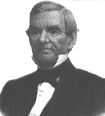







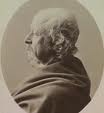


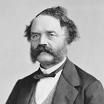



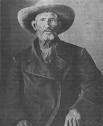








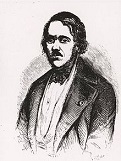





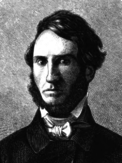

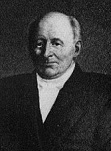
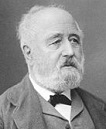
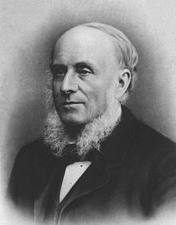
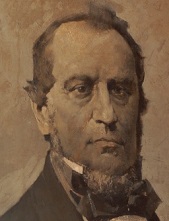


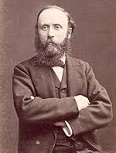
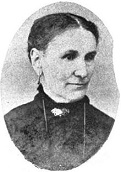



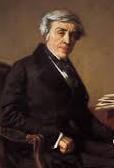

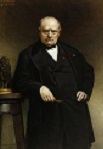
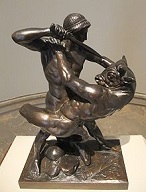


1843 Slave pop. of Cuba: 436K. Mauna Loa ("long mountain") on Hawaii Island erupts, becoming the first documented eruption, followed by 33x more eruptions by 2017. On Jan. 25 after insane Scottish woodsman (any other kind?) Daniel M'Naghten (McNaughton) (1813-65) stalks British PM Sir Robert Peel for several days, he strikes, killing Peel's personal secy. Edward Drummond (b. 1792) instead; his can-of-worms murder trial results in the House of Lords establishing the M'Naghten's Rules, the first legal test for insanity - too bad we can't X-ray their heads and see if they're faking it to get off? On Jan. 31 the Virginia Minstrels (Serenaders) of blackface musicians incl. Mount Vernon, Ohio-born Daniel Decatur "Dan" Emmett (1815-1904), New York City-born Billy Whitlock (1813-78), New York City-born Richard Ward "Dick" Pelham (Pell) (1815-76), and Baltimore, Md.-born Francis Marion "Frank" Brower (1823-74) debuts at the Chatham Theatre in New York City, pioneering the minstrel show, with songs incl. Jimmy Crack Corn (Blue Tail Fly) and Old Dan Tucker. On Feb. 5 the Great March Comet of 1843 is first observed (period 512.4 years), and by Mar. it grows very bright, frightening Australian aborigines. On Feb. 17 the Battle of Miani sees 2.8K British under Sir Charles Napier defeat 20K troops of the amirs of Sindh in in NW India; Sind is conquered and annexed in defiance of its rights under a treaty with its conqueror Britain; "Peccavi, I have Sind" goes the British saying; the Punjab is next (1846). On Mar. 4 Joseph Smith debates with fellow Mormon (his first cousin) George A. (Albert) Smith (1817-75), who argues against capital punishment, while Smith not only approves of it, but demands that hanging be chucked in favor of the Biblical punishment of "blood for blood", with the soundbyte: "I am opposed to hanging, even if a man kill another, I will shoot him, or cut off his head, spill his blood on the ground, and let the smoke thereof ascend up to God"; in a church gen. conference on Apr. 6, 1843 he utters the soundbyte that he would "wring a thief's neck off if I can find him, if I cannot bring him to justice any other way"; later Smith flops, claiming that he would be willing to tolerate men "as corrupt as the devil himself" in Nauvoo, Ill. who "had been guilty of murder and robbery" on the chance that they might "come to the wters of baptism through repentance, and redeem a part of their allotted time", which is approved on Jan. 27, 1845 by his successor Brigham Young, who on Feb. 25, 1846 flops and threatens thieves with throat cutting, getting a law passed in Utah Territory in 1851-88 providing for execution of murderers by decapitation, although nobody is executed; meanwhile Young preaches Blood Atonement (spilling their blood on the ground as a sacrificial offering for crimes so heinous that the atonement of Jesus no longer applies) for murder, theft, fornication, adultery, apostasy, and of course, miscegenation; in 1978 LDS apostle Bruce R. McConkie claims that the doctrine of blood atonement is only applicable in a theocracy; meanwhile George A. Smith gives a speech praising polygamy as superior to monogamy, with the soundbyte: "We breathe the free air, we have the best looking men and handsomest women, and if [non-Mormons] envy us our position, well they may, for they are a poor, narrow-minded, pinch-backed race of men, who chain themselves down to the law of monogamy, and live all their days under the dominion of one wife. They ought to be ashamed of such conduct, and the still fouler channel which flows from their practices; and it is not to be wondered at that they should envy those who so much better understand the social relations." On Mar. 18 the Icelandic Althing meets in Reykjavik, consisting of 20 members elected by male property owners, and six royal appointees. On Mar. 21 British poet Robert "chickens come home to roost" Southey (b. 1744) dies, and William "the Interminable" Wordsworth (1770-1850) becomes poet laureate of England; too bad, his poetic powers have dropped to almost nil since 1807, when his early enthusiasm for the French Rev. was replaced by creeping conservatism, causing Robert Browning to write the soundbyte: "Just for a handful of silver he left us,/ Just for a riband to stick in his coat." - The Lost Leader On Mar. 24 the Battle of Hyderabad (Dubbo) (Sindh) on the Indus River is won by 3K troops of the British East India Co. under Gen. Sir Charles James Napier (1782-1853) over 20K troops under Mir Sher Muhammad Khan Talpur "Sher-i-Sindh", and Hosh Mohammad (who is KIA); the Brits go on to conquer the region of Sindh (modern-day Pakistan), with Napier as gov. of Sindh and CIC of British forces in India. On Mar. 24 William S. Henson and John Stringfellow file articles of incorporation in London for the Aerial Transit Co., the first air transport co.; it turns out to be somewhat premature, and fails? On Mar. 25 the 1,506-ft. pedestrian-only Thames Tunnel between Rotherhithe and Wapping, London, built by Sir Marc Isambard Brunel (b. 1769) and his son Isambard Kingdom Brunel (begun 1825) opens, becoming the world's first underwater tunnel; in the first 4 mo. over 1M pass through it, incl. Queen Victoria and Prince Albert on July 26; trains are first used in 1865. On Apr. 24 after being given authorization on Feb. 16, the Snively Expedition of the 170-man Battalion of Invinciles led by Greencastle, Penn.-born Jacob Snively (1809-71) leaves to intercept a train of Mexican traders returning from Mo. through Tex. via the Santa Fe Trail in retaliation for Mexican raids on San Antonio in 1842, and the mistreatment of Tex. POWs captured in the Mier Expedition and the Santa Fe Expedition; too bad, after defeating a 100-man Mexican force on the Arkansas River on June 20, violating U.S. sovereignty, they are disarmed by U.S. Dragoons on July 15, and 70 diehards continue pursuing the traders, only to find them guarded by Mexican soldiers, giving up and returning to Tex. on Aug. 6. In Apr. secret negotiations to annex Texas, spurred by Southern slaveholders skittish about growing British influence result in a treaty completed by U.S. secy. of state John C. Calhoun being sent to the Senate for ratification; Calhoun then sticks his cotton' pickin' foot in his mouth when he sends the British minister a letter stating that Texas annexation will foil British abolitionists, and solid Whig opposition results in an overwhelming rejection of the treaty. On May 7 the first Japanese immigrants arrive in the U.S. in New York City; Pres. Tyler prophesies that the Pacific coast will be used to open up increased markets for the U.S. in China and Japan. On May 18 the Church of Scotland is disrupted when 457 of its 1.5K ministers sign the Deed of Demission in Edinburgh and form the Free Church of Scotland (the "Wee Free") (until 1900); photographers Robert Adamson (1821-48) and David Octavius Hill (1802-70) begin their careers by photographing the event. In May the migration from Independence, Mo. W along the Oregon Trail begins in earnest, with thousands of families trudging beside ox-drawn, canvas-covered wagons; before the railroad supplants it, 80K-200K make the trek; the migrants are warned to bring 75 lbs. of bacon and 200 lbs. of flour for each adult to last them for the 6-mo. journey; Horace Greeley writes in the New York Daily Tribune that the migrants displayed "an aspect of insanity"; the Brits claimed that the trek would prove impossible, and that they "might as well undertake to go to the Moon"; cholera, accidents, snakes and Indians eventually kill 20K, with half of the deaths occurring before reaching Ft. Laramie; by 1850 there up to four graves per mi. in "America's longest graveyard"; at South Pass, Wyo. at 7,412 ft. the trail climbs 1K ft. in 5 mi., and most wagons have to be lightened by shucking almost everything not essential, creating a giant treasure pile; the Oregon Trail is the only trail along which cattle are driven both west and east, after Oregon turns into cattle country by 1880. In May Des Moines, Iowa (named after the Des Moines River, either a translation of French "Riviere des Moines", i.e., River of the Monks, or River of the Moingwena Tribe) is founded by Capt. James Allen; it is incorporated on Sept. 22, 1851 as Ft. Des Moines. On June 3 (Sat.) the Manchester Courier and Lancashire Gen. Advertiser makes the first mention of "faggots", meaning meatballs made from cheap cuts of pork and or beef, AKA ducks or savoury ducks in Yorkshire, Lincolnshire, and Lancashire. In June Gen. Baldomero Espartero of Spain is ousted by a military coup of Moderados and Progresistas, and 13-y.-o. Isabella II (1830-1904) is declared of age, becoming queen of Spain (until Sept. 30, 1868). In the summer John Charles Fremont (1813-90) goes on his 2nd expedition, crossing the Rocky Mts. N of the Great Salt Lake, and down the Snake River and Columbia River to Oregon, then W to Lake Tahoe next Feb. 14, and down the E slopes of the Sierra Nevadas through Carson Pass into the Central Valley of Calif. to scope it out for gringos waiting for da news back east, then down the American River Valley to Sutter's Fort in Sacramento, then S along the E edge of the San Joaquin Valley, then E through Tehachapi Pass to modern-day Las Vegas, Nev., then N through Utah to South Pass, proving that the Great Basis doesn't have any river flowing towards the sea, disproving the legend of a Buenaventura River; in 1845 Fremont pub. a new map, which is pub. by Congress and used by thousands of immgrants to Ore. and Calif. in 1845-9 incl. the Calif. Gold Rush, inspiring the Mormons to settle in Utah. On July 12 Joseph Smith Jr. receives his divine revelation that polygamy is okay, going on to have 30 wives, incl. wife #28, 14-y.-o. Helen Mar Kimball (1828-96) in May; after the original written version disappears, the revelation is first revealed publicly by Brigham Young in 1852, causing a coverup attempt to the effect that Young introduced polygamy in the first place. On Sept. 29 the Treaty of Bird's Fort between the Repub. of Tex. and "the Indigenous Nations of the Delaware, Chickasaw, Waco, Tawakani, Keechi, Caddo, Anadahkah, Ionie, Biloxi, and Cherokee", negotiated by Edward H. Tarrant and George W. Terrell and signed in modern-day Haltom City, Tex. ends years of warfare, establishing the border of Indian territory as a "line of trading houses" at the junction of the Clear Fork and West Fork of the Trinity River in modern-day Fort Worth, Tex. (modern-day pop. 854K/7.1M) which is founded by the U.S. Army in 1849 as Camp Worth, becoming the northernmost fort protecting the Am. Frontier after the Mexican-Am. War. In Sept. Scottish economist and hatmaker James Wilson (1805-60) founds the weekly financial paper The Economist in London to campaign for free trade and laissez-faire, to "take part in a severe contest between intelligence, which presses forward, and an unworthy, timid ignorance obstructing our progress"; writers incl. Herbert Spencer (1820-1903) and Thomas Hodgskin (1787-1859); by the end of the 20th cent. it has a global circ. of 1.2M. On Oct. 13 the Jewish B'nai B'rith (Heb. "Sons of the Covenant") org. is founded in New York City by Henry Jones and 11 others; its symbol is a menorah; its service agencies later incl. the Anti-Defamation League (founded in Oct. 1913), and the Hillel Foundation for Jewish Campus Life (founded in 1923). The Blancos, aided by Argentine forces siege Colorado-held Montevideo in Uruguay (until 1851). Daniel Webster retires as U.S. secy. of state. Raleigh-born "Tennessee Tailor" Andrew Johnson (1808-75) is elected as a U.S. rep. from Tenn., working up to U.S. Sen. by 1857. The Hungarian Diet passes legislation opening official positions to non-nobles, and making Magyar the language of schools, law courts and legislatures. Paraguay begins a bloody campaign against the Guarani Indians in the yerba mate fields, and in 1846 makes it and exportable lumber state property; in 1848 Indians are divested of special status and all their community lands made state property - Indian = caca? A revolt in Haiti caused by heavy taxes and his arbitrary rule causes pres. (since 1818) Jean-Pierre Boyer to flee to France via Jamaica. Natal is annexed as a British colony. The U.S. recognizes the independence of the Hawaiian islands, followed in 1844 by Belgium, England, and France. The Tahlequah Conference of 16 Indian tribes and U.S. govt. officials is held shortly after the removal of the Five Civilized Tribes to the trans-Mississippi region; 75%-Scottish principal Cherokee chief John Ross (1790-1866), who led the court fight against removal attends. A bloodless rev. in Greece compels Otto I to dismiss his Bavarian advisers and grant a constitution with a bicameral legislature; too bad, he won't restore local self-govt., keeping the Greeks pissed-off. The Serbian Skupstina summons Alexander Karageorgevich (1806-85) (father of Peter I) to become prince of Serbia (until 1858). Faisal ibn Turki returns from exile to Riyadh and defeats his distant cousin Abdallah ibn Thunayyan, going on to rule Arabia until his death in 1865. Louis Philippe of France becomes friendly with Queen Victoria and Prince Albert, exchanging visits between this year and 1845. The republican propaganda of Giuseppe Mazzini begins to gain a strong following in S Italy (slum-infested Naples) after Ferdinand II proves to be just as big a despot as his daddy Francis I and his granddaddy Ferdinand I. The French govt. declares a monopoly on the manufacture of cigarettes, which are made from discarded cigar scraps and known as beggar's smokes. Maine-born Boston girls school head (since 1820) Dorothea Dix (1802-87) reports the shocking conditions in prisons and asylums to the Mass. legislature after visiting them regularly since 1841, going on to see institutes for the insane and destitute founded in 20 U.S. states and Canada - and now girls want to be like Britney Spears and Jessica Simpson? The Mexican govt. closes the Santa Fe Trail. British courts allow the insanity defense - rejuvenate yourself? Mountain man James "Jim" Bridger (1804-81) builds Ft. Bridger, a W Wyo. trading post which becomes a main stop on the Oregon, Calif. and Mormon Trails, a 6-mo., 2K-mi. trek for 1K+ "overlanders" in ox-drawn, canvas-covered "prairie schooners" starting each spring along the Oregon Trail from Independence, Mo. along the North Platte River into Wyo., through South Pass down to Ft. Bridger, down the Snake River to the Columbia River, then to Ft. Vancouver in the Williamette Valley; some branch off from the Snake River down the Calif. Trail across the Sierra Nevada to Calif.; the Williamette settlers of Champoeg organize a provisional govt. The Ortega-Stokes Land Grant in Calif. is made by the Mexican govt. to Edward Stokes, which later becomes the Santa Maria Valley. The secret society known as the Molly Maguires (known for sometimes dressing up as women for disguise) is organized in Ireland to terrorize agents of landlords to prevent evictions - cut the shine I need some names? The SS Great Britain is launched at Bristol, becoming the first screw propeller-driven iron hulled ship to cross the Atlantic. Scottish explorer Sir James Ross proves that Antarctica has an ice barrier. After being sent by Louis Philippe with two botanists and a taxidermist, French naturalist Francois Louis Nompar de Caumont La Force, Comte de Castelnau (1810-80) crosses South Am. from Rio de Janeiro to Lima along the Amazon and La Plata Rivers, ending up in Para in 1848. After William Lloyd One-Man Garrison publicly burns a copy of the U.S. Constitution in 1840, his Am. Anti-Slavery Society adopts a resolution declaring that the U.S. Constitution is a slaveholders' document, a "covenant with Death and an agreement with Hell", and that voting or taking an oath supporting the Constitution would be a sin, adopting the motto "No union with slaveholders", and advocating peaceful separation of free and slave states; only the 15th Amendment (1870) satisfies them and causes them to finally disband; meanwhile, the British are light years ahead of the Yankees, and black-as-coal Samuel Adjai Crowther (1809-91), who was born in Nigeria, sold as a slave in 1821, freed by the British then educated in Sierra Leone and the Church Missionary College in London is ordained into the Anglican Church, going on to return to Africa as a missionary and teacher, becoming the first bishop of the Niger in 1864 and translating the Bible into Yoruba; back in the U.S., former slave Isabella changes her name to Sojourner Truth (1797-1883), and goes on crusade sojourning for the you know what. The Jesuit College of the Holy Cross is founded in Worcester, Mass., becoming the oldest Roman Catholic college in New England. The British Archaeological Assoc. and Royal Archaeological Inst. of Great Britain and Ireland are founded. (Hiram) Ulysses Simpson Grant (b. 1822) graduates from West Point. Siamese-born er, Siamese twins Chang and Eng Bunker (1811-74) marry Sarah Ann (Sally) and Adelaide Yates in a quick double ceremony after being threatened by locals, then move into dual farm houses, the twins servicing them alternately and fathering 22 children (10 Chang, 12 Eng) - feed your busy family with how many pieces of Siamese chicken? By this time the state of Ohio has sent all its Indian tribes to reservations in Kan. and Okla. The city of St. Joseph, Mo. (AKA St. Joe) on the Missouri River in NW Mo. (modern-day pop. 76K) is founded and incorporated by French trapper Joseph Robidoux III (1783-1868), becoming the starting point of the Pony Express and death place of outlaw Jesse James; Robidoux goes on to build Robidoux Row, the first apt. bldg. W of the Mississippi River. The Theatres (Regulation) Act of 1843 is passed in Britain, amending the 1737 Licensing Act by restricting the Lord Chamberlain's power to only prohibit the licensing of plays that in his opinion "is fitting for the preservation of good manners, decorum or of the public peace", giving powers to local authorities to license theaters, breaking the monopoly of the patent theaters and encouraging the building of saloon theaters and music halls; it is repealed by the Theatres Act of 1968. Le Bal des Anglais in Paris is founded, becomes the world's first night club. Brazil becomes the 2nd country to issue postage stamps. Edwin Pearce Christy (1815-62) founds the blackface Christy's Minstrels in Buffalo, N.Y., going on to specialize in works by Stephen Foster (1826-64), incl. "Old Folks at Home". Felix Mendelssohn et al. found the Leipzig Conservatory of Music, and Mendelssohn resumes conductorship of the Gewandhaus Orchestra (until 1844). Daniel Decatur Emmett (1815-1904) produces the first minstrel show. Italian actor Tommaso Salvini (1829-1915) debuts as Pasquino in Goldon's "Donne Curiose", going on to becoming a hit in Italy, England, and the U.S.; Russian actor Constantin Stanislavski sees him in Moscow, inspiring him and causing to call him the "finest representative" of his own acting approach. Sports: Guy's Hospital Football Club in Southwark, London is founded, becoming the world's first football club. The sport of Nordic Skiing (ON "sticks") holds its first event in Tromso, Norway. The 1 mi. Royal Hunt Cup race for Throughbreds aged 3 years and older is founded in Ascot, England. Architecture: St. Peter's Basilica in Montreal, Canada (begun 1843) is completed. Inventions: Scottish inventor Alexander Bain (1811-77), inventor of the electric clock invents the facsimile (fax) machine, using electric clock pendulums to produce a back-and-forth line-by-line scanning mechanism. Alfred Bird (1811-78) invents Baking Powder for people like his wife who don't want yeast in their bread. The first Christmas Cards are sold in England by Sir Henry Cole (1808-82), who hires artist John Calcott Horsley (1817-1903) to design one showing people feeding and clothing the needy and celebrating; later cards feature Santa Claus, snowmen, and trees; Nativity scenes don't become popular until the 20th cent. British judge and physicist Sir William Robert Grove (1811-96) invents the Fuel Cell; the expense causes them to rest dormant until the Space Age, when they are used to power spacecraft. The U.S. Congress grants Samuel Morse $30K to build the first telegraph line in the U.S. from Washington, D.C. to Baltimore; it is inaugurated next year; meanwhile the first German telegraph is built from Berlin to Frankfurt-am-Mein under the supervision of Prussian artillery officer Werner von Siemens (1816-92), who co-founds the telegraphic equipment firm Siemens and Halske in 1847; meanwhile his brother Sir Charles William (Carl Wilhelm) Siemens (1823-83) emigrates to England in 1844 and sets up an English branch. Charles Thurber of Worcester, Mass. patents the first cylindrical platen typewriter. Concertmaster Ferdinand Sommer of Weimar invents the Euphonium wide-bored valved baritone bugle (smaller than a tuba). French scientist Lucien Vidie invents the Aneroid Barometer, which uses a beryllium-copper capsule instead of mercury. Science: On Oct. 16 after a decade of searching for a way to describe rotations in space, Irish mathematician Sir William Rowan Hamilton (1805-65) carves his discovery into the Broome Bridge in Dublin, then pub. the first description of Quaternions, an extension of complex numbers to 3 dimensions. Bohemian scientist Carl Joseph (Karl Josef) Napoleon Balling (1805-68) and Simon Ack invent the Balling Saccharimeter and the Balling Scale for beer sugar content based on specific gravity; in the 1850s it is replaced by the Brix Scale of German engineer Adolf Ferdinand Wenceslaus Brix (1798-1870), improving the accuracy from three decimal places to five; in the early 1900s the Plato Scale of German chemist Fritz Plato (1858-1938) improves it to six decimal places. German chemist Robert Wilhelm Bunsen (b. 1811) loses the use of his right eye in a cacodyl cyanide explosion, and, remembering two near-deaths from arsenic poisoning, he decides to switch from organic to inorganic chemistry. French astronomer Herve (Hervé) Faye (1814-1902) discovers Faye's Comet (period 7.34 years), which has just been deflected by a close passage of Jupiter from a long to a short period orbit. Irish mathematician Sir William Rowan Hamilton (1805-65) pub. the first description of Quaternions, an extension of complex numbers to 3 dimensions. English botanist John Stevens Henslow (1796-1861) discovers coprolitic nodules in the Red Crag at Felixstowe, Suffolk, and in 1845 discovers more in the Cambridge Greensand, leading to the establishment of a phosphate industry in Suffolk and Cambridgeshire. The tendency of learned societies of know-nothings to keep newbies out follows the dismal example of established churches? British (Manchester) brewer and obsessive amateur scientist James Prescott Joule (1818-89) calculates the first fairly accurate value (41.54M ergs or 4.154 Joules per calorie) for the mechanical equivalent of heat; later 10M ergs is called a Joule in his honor; at first his work is disregarded since he's not a recognized academic, and is refused by the Royal Society and learned journals, forcing him to get it pub. in 1847 in a Manchester newspaper on which his brother is the music critic; a few mo. later he is allowed to present it at a scientific gathering, and 23-y.-o. Scottish physicist William Thomson (1824-1907) (later Lord Kelvin) gets it accepted, causing it to be taken up by respectable German scientist Hermann Ludwig Ferdinand von Helmholtz (1821-94), who ends up getting credit for the law of conservation of energy instead of amateurs Joule and Mayer in 1847; Joule finally gets to present his paper to the Royal Society in 1849, making him look like a beer-brewing copycat? Carl Gustav Mosander discovers the rare-earth metallic elements Terbium (Tb) (#65) (#54 of 54 in the rare earth group) and Erbium (Er) (#68) (#50 in the rare earth group) in Ytterby, Sweden. French mathematician Adhemar Jean Claude Barre (Adhémar Jean Claude Barré) de Saint-Venant (1797-1886) pub. the first correct derivation of the Navier-Stokes Equations for viscous flow, and becomes the first to identify the coefficient of viscosity as the multiplying factor for velocity gradients in the flow; too bad, English physicist Sir George Gabriel Stokes (1809-1903) ends up getting credit after he asks his Cambridge students to solve it for prize exams in 1854, even though he got the solution in 1850 from Lord Kelvin. German astronomer Samuel Heinrich Schwabe (1789-1875) discovers 11-year Schwabe Solar Cycles of sunspot counts, with Cycle 1 set in 1755-66 by Swiss astronomer Johann Rudolf Wolf (1816-93) in 1848, who devises the Wolf (Zurich) (Internat. Sunspot) (Relative Sunspot) Number for the number of visible sunspots and sunspot groups; in 1852 Wolf et al. discover the link between the Wolf Cycle and geomagnetic activity on Earth. Nonfiction: Count Cesaro Balbo (1789-1853), The Hopes of Italy; liberal Italian nationalism. Bruno Bauer (1809-82), History of Politics, Culture and Enlightenment in the 18th Century (4 vols.); Christianity Exposed: A Recollection of the 18th Century and a Contribution to the Crisis of the 19th. Thomas Carlyle (1795-1881), Past and Present; how medieval society rocks and modern society sucks? Auguste Comte (1798-1857), Traite Elementaire de Geometrie Analytique. Carl Friedrich Gauss (1777-1855), Uber Gegenstaende der Hoheren Geodesie. Vincenzo Gioberti (1801-52), On the Moral and Civil Primacy of the Italians; pro Italian liberal nationalism. Moses Grandy (1786-), Narrative of the Life of Moses Grandy, Late a Slave in the United States of America. Alexander von Humboldt (1769-1859), Asie Centrale (2 vols.). James Prescott Joule (1818-89), The Calorific Effects of Magneto-Electricity, and the Mechanical Value of Heat; four different procedures to do it? Soren Kierkegaard (1813-55), Either/Or: A Life Fragment (Enten - Eller) (Feb. 20); pub. under the alias Victor Eremita (Victorious Hermit); how consciousness progresses from a hedonistic aesthetic mode to a mature conscience characterized by ethical imperatives; Fear and Trembling (Begrebet Angst) (Oct. 16); pub. under alias Johannes de Silentio, contrasting Abraham's sacrifice of his son Isaac with Agamemnon's sacrifice of his daughter Iphigenia; title refers to Philippians 2:12 and Psalms 55:5; incl. The Knight of Faith, about the cool individual who places complete faith in himself and in God, contrasted with the knight of infinite resignation; rocks the Danish Lutheran church with its rejection of Hegelianism and anticipation of Existentialism; written right after finding out that his babe Regine Olsen has said yes to his rival Johan Frederik Schlegel, causing him to turn to Lady Five Fingers with fear and trembling, while hoping that God will return her to him?; Repetition: A Venture in Experimental Psychology; pub. under alias Constantin Constantius; the Young Man jilts his betrothed, like Kierkegaard did with his babe Regine Olsen. Henry George Liddell (1811-98) and Robert Scott (1811-77), A Greek-English Lexicon; becomes the std. reference. James Martineau (1805-1900), Endeavours after the Christian Life (1843, 1847); Unitarian sermons. Jules Michelet (1798-1874), Le Pretre, a Femme, et la Famille. John Stuart Mill (1806-73), System of Logic. Charles de Montalembert (1810-70), The Obligation of Catholics in the Matter of Freedom of Teaching; founds the liberal French Roman Catholic movement. Andrew Archibald Paton, The Modern Syrians: or Native Society in Damascus, Aleppo, and the Mountains of the Druses; first use of the word "Islamism"? William Hickling Prescott (1796-1859), History of the Conquest of Mexico (3 vols.); Cortes' subjugation of the Aztecs. Josiah Priest (1788-1861), Slavery, As It Relates to the Negro; later titled "Bible Defence of Slavery; or the Origin, History, and Fortunes of the Negro Race" (1851); ttries to prove from the Bible that God created black people to be slaves to whites, starting with Noah's son Ham, who was cursed from birth to be a slave and was given black skin by God as a badge of inferiority, "a judicial act of God, or in other words a divine judgment"; since Priest knew Oliver Cowdery, this makes him a major source for the Book of Mormon and its nutso history and white supremacy? Wilhelm Roscher (1817-94), Grundriss zu Vorlesungen uber die Staatswirtschaft nach Geschichtlicher Methode (Plan of Lectures about the State Economy according to the Historical Method); proposes the cyclical theory of nations, whose economies allegedly pass through youth, manhood, and senility, founding the German Historical School of Economics based in Prussia, which spreads to England and the U.S., and dominates for the rest of the cent. John Ruskin (1819-1900), Modern Painters (5 vols.) (1843-60). John Lloyd Stephens (1805-52), Incidents of Travel in Yucatan (2 vols.). Charlotte Elizabeth Tonna (1790-1846), The Perils of the Nation: An Appeal to the Legislature, Clergy, Higher and Middle Classes. Forbes Benignus Winslow (1810-74), The Plea of Insanity in Criminal Cases; helps establish the plea of insanity in criminal cases. Music: Daniel Auber (1782-1871), La Part du Diable (opera) (Opera Comique, Paris). Michael William Balfe (1808-70), The Bohemian Girl (opera) (Nov. 27) (Drury Lane, London). Casimir Delavigne (1793-1843), Germain Delavigne, and Fromental Halevy, Charles VI (opera). Gaetano Donizetti (1797-1848), Don Pasquale (comic opera) (Jan. 3) (Theatre Italien, Paris) (Apr. 17, 1841, La Scala, Milan); libretto by Donizetti and Giovanni Ruffini, who refuses credit; the high point and end of the 19th cent. opera buffa tradition?; becomes one of the top-3 Italian comic operas along with his "L'Elisir d'Amore" (1832) and Rossini's "The Barber of Seville" (1816). Fromental Halevy (1799-1862), Charles VI (opera). Josef Lanner (1801-43), Die Schonbrunner (Schönbrunner) Waltz, Op. 200. Felix Mendelssohn (1809-47), Incidental Music to Shakespeare's "A Midsummer Night's Dream", Op. 61 (Potsdam); contains the ever-popular Wedding March. Robert Schumann (1810-56), Das Paradies und die Peri (Paradise and the Peri) (secular oratorio) (Leipzig). Johann Strauss I (1804-49), Echoes of the Rhine (Lorelei Rheinklange), Op. 154. Giuseppe Verdi (1813-1901), I Lombardi alla Prima Crociata (opera). Richard Wagner (1813-83), The Flying Dutchman (Der Fliegender Hollander) (opera) (Dresden) (Jan. 2) (opera #4). Art: Antoine-Louis Barye (1796-1875), Theseus and the Minotaur (bronze sculpture) Charles Deas (1818-67), Winnebagos Playing Checkers. Jean Louis Ernest Meissonier (1815-91), Young Man Playing the Cello. Hiram Powers (1805-73), The Greek Slave; the nude chained blonde-blue babe we'd all like to own?; attracts 100K viewers in the U.S. in 1847, and is a hit in 1851 at the Crystal Palace Exhibition, making him a celeb; Elizabeth Barrett Browning writes the sonnet Hiram Powers' Greek Slave about it, after which it gets used in the abolitionist cause. Plays: Robert Browning (1812-89), The Return of the Druses (Bells and Pomegranates No. 4); A Blot in the 'Scutcheon (Bells and Pomegranates No. 5). Emanuel von Geibel (1815-84), King Roderick (tragedy). Victor Hugo (1802-85), Les Burgraves. John Sterling (1806-44), Stafford (tragedy). Poetry: Thomas Hood (1799-1845), Song of the Shirt (in "Punch). Richard Henry Horne (1802-84), Orion; his masterpiece? Yevhen Hrebinka (1812-48), Bogdan; Ochi Chyornye (Dark or Black Eyes); set to music in 1884 by German Florian Hermann, becoming a giant hit in Russia. Count Zygmunt Krasinski (1812-59), Dawn. Novels: Berthold Auerbach, Schwarzwalder Dorfgeschichten (1st series); life in the Black Forest. Edward George Bulwer-Lytton (1803-73), The Last of the Barons; about "Kingmaker" Richard Neville, 15th earl of Warwick (1428-71). Charles Dickens (1812-70), Martin Chuzzlewit (1843-4); Mrs. Gamp, Seth Pecksniff, Tom Pinch; A Christmas Carol in Prose, Being a Ghost Story of Christmas (Dec. 19) (Tues.); illustrated by John Leech; 28K words, 80 pages; written in six weeks to pay off his debts while finishing "Martin Chuzzlewit", it sells 6K copies in its first week, causing him to write four more "Christmas books", creating a genre; "a Ghostly little book... which shall not put my readers out of humour... with the season"; mean old miser Ebenezer Scrooge, his downtrodden employee Bob Cratchit and his children Tiny Tim, Peter, Martha, Belinda and two nonames, his business partner Jacob Marley, his nephew Fred, his old employer Fezziwig, Dick Wilkins, laundress Mrs. Dilbert, undertaker's asst. Sparsit, fence Old Joe Hoggs, Caroline and her hubby; begins: "Marley was dead, to begin with"; ends: "And so, as Tiny Tim observed, God Bless Us, Every One!"; popularizes the phrase "Merry Christmas; "Bah! Humbug!" Scrooge becomes a synonym for a miser; has "staves" instead of chapters, since musical notation is written on five staves; "Stave I: Marley's Ghost"; "Stave II: The First of the Three Spirits" (Ghost of Christmas Past); "Stave III: The Second of the Three Spirits" (Ghost of Christmas Present); "Stave IV: The Last of the Spirits" (Ghost of Christmas Yet to Come); "Stave V: The End of It"; Dickens reads it at Birmingham Town Hall on Dec. 27, 1852 in his first-ever public reading - moral: go out and spend big bucks every Christmas? Yevhen Hrebinka (1812-48), Chaikovskii. Charles James Lever (1806-72), Jack Kimton; Tom Burke of Ours. Edgar Allan Poe (1809-49), The Gold Bug (June 21); pub. in Philly's Dollar Newspaper; William Legrand is bitten by a you know what and goes looking for Capt. Kidd's treasure on Sullivan's Island, S.C. with his superstitious black servant Jupiter, and finds all $14M of it using cryptography. Births: Scottish neurologist-psychologist Sir David Ferrier (d. 1928) on Jan. 13 in Woodside (near Aberdeen); educated at Aberdeen U., and Edinburgh U.; knighted in 1911. French automobile pioneer Emile (Émile) Levassor (d. 1897) on Jan. 21 in Marolles-en-Hurepoix. English philosopher-psychologist James Ward (d. 1925) on Jan. 27 in Hull; educated at Trinity College, Cambridge U. U.S. 5'7" high tariff Repub. pres. #25 (1897-1901) and Civil War maj. William McKinley Jr. (d. 1901) on Jan. 29 in Niles, Ohio; last U.S. pres. who is below avg. height; last U.S. Civil War vet to become pres.; born to an iron manufacturing family; attends Allegheny College in Penn. then becomes a country schoolteacher; moves to Canton, Ohio in 1867. English "St. Paul" classicist-poet (bi) (co-founder of the Society for Psychical Research) Frederic William Henry Myers (d. 1901) on Feb. 6 in Keswick, Cumberland; brother of Ernest Myers (1844-1921) and Arthur Thomas Myers (1851-94); maternal grandson of John Marshall (1765-1845); educated at Cheltenham College, and Trinity College, Cambridge U.; coiner of the term "telepathy". Italian soprano Adelina Patti (Adela Juana Maria Patti) (d. 1919) on Feb. 10 in Madrid, Spain; Sicilian father, Italian mother; emigrates to the U.S. in 1847. Am. Lincoln and Cadillac founder (inventor of electric barber clippers) Henry Martyn Leland (d. 1932) on Feb. 16 in Vt. Portuguese poet-scholar (pres. #2 in 1915) Teofilo (Teófilo) Fernandes Braga (d. 1924) on Feb. 24 in Ponta Delgada, Azores. Am. 6'4" first amputee of the U.S. Civil War James Edward Hanger (d. 1919) on Feb. 25 near Churchville, Va. Am. journalist-poet Eliza Jane Nicholson (Holbrook) (nee Poitevent) (d. 1896) (AKA Pearl Rivers, after the Pearl River in Miss.) on Mar. 11 in Gainesville, Miss. French social psychologist Gabriel Tarde (Jean-Gabriel De Tarde) (d. 1904) on Mar. 12 in Sarlat-la-Caneda, Dordogne. Am. painter-photographer-explorer William Henry Jackson (d. 1942) on Apr. 4 in Keeseville, N.Y.; great-great nephew of "Uncle Sam" Wilson (1766-1854); first to photograph Yellowstone Park. Hungarian conductor Hans Richter (d. 1916) on Apr. 4 in Raab (modern-day Gyor). Italian (Pisan) poet-writer Renato Fucini (d. 1921) on Apr. 8 in Monterotondo Marittimo. Am. ginger ale magnate James Vernor Sr. (d. 1927) on Apr. 11 in Albany, N.Y.; grows up in Detroit, Mich. Am. "The Wings of the Dove", "The Portrait of the Lady" realist novelist-playwright (gay?) ("maestro of the semicolon" - Truman Capote) Henry James Jr. (d. 1916) on Apr. 15 [Aries] in New York City; son of Henry James Sr. (1811-82); brother of William James (1842-1910) and Alice James (1848-92). Am. Trappist monk Brother Joseph (Ira Barnes Dutton) (d. 1931) on Apr. 27 in Stowe, Vt.; brought up as a Protestant, converts to Roman Catholicism, enters the Trappist monastery at Gethsemane, Ky., then in 1886 goes to the leper colony in Molokai, Hawaii. Canadian "Real McCoy" inventor (black) Elijah J. McCoy (d. 1929) on May 2. Irish Shakespearean poet-critic Edward Dowden (d. 1913) on May 3 in Cork; educated at Queen's College, Cork, and Trinity College, Dublin. Am. psychiatrist Henry Mills Hurd (d. 1927) on May 3 in Union City, Mich.; educated at the U. of Mich. Am. geologist ("Founder of Geomorphology") Grove Karl Gilbert (d. 1918) on May 6 in Rochester, N.Y.; educated at the U. of Rochester. German Berliner Tageblatt publisher (Jewish) Rudolf Mosse (d. 1920) on May 8 in Gratz, Posen; grandfather of George Lachmann Mosse (1918-98). German historical painter Anton Alexander von Werner (d. 1915) on May 9 in Frankfurt an der Oder; student of Johann Wilhelm Schirmer, Ludwig Des Coudres, and Adolf Schroedeter. Spanish "Episodios Nacionales" novelist ("the Spanish Tolstoy") (#2 after Cervantes) Benito Maria de los Dolores Perez Galdos (Pérez Galdós) (d. 1920) on May 10 in Las Palmas, Canary Islands. Am. Reformed Jewish rabbi-educator Kaufmann Kohler (d. 1926) on May 10 in Furth, Bavaria; emigrates to the U.S. in 1869. Am. bicycle manufacturer and Union lt.-col. Albert Augustus Pope (d. 1909) on May 20 in Boston, Mass. Japanese Marshal Adm. Count Ito (Itoh) Sukeyuki (d. 1914) on May 20 in Kagoshima, Sutsuma. Swiss politician-atty. Charles Albert Gobat (d. 1914) on May 21 in Tramelan. French jurist Louis Renault (d. 1918) on May 21; not to be confused with industrialist Louis Renault (1877-1944). Danish king (1906-12) Frederik (Frederick) VIII (Christian Frederik Vilhelm Carl) (d. 1912) on June 3 in Copenhagen; eldest son of Christian IX (1818-1906) and Louise of Hesse (1817-98); father of Christian X (1870-1947) and Haakon VII (1872-1957). Austrian pacifist novelist (1st woman to win the Nobel Peace Prize, 2nd woman to win a Nobel Prize) Baroness Bertha Felicitas Sophie Freifrau von Suttner (d. 1914) on June 9 in Prague; wife (1876-) of novelist Baron Arthur von Suttner (1850-1902). Scottish astronomer (in South Africa) Sir David Gill (d. 1914) on June 12 in Aberdeen; educated at Aberdeen U.; pioneer in photographic astronomy; first to measure solar parallax. Norwegian "Piano Concerto in A minor" composer Edvard Hagerup Grieg (d. 1907) on June 15 in Bergen; originally spelled Greig after his Scottish great-grandfather who fought in the 1746 Battle of Culloden. German Saxon beer mat entrepreneur Robert Ludwig Sputh (d. 1913) on June 18 in Dresden. U.S. Rep. (R-N.Y.) (1883-1914) Sereno Elisha Payne (d. 1914) on June 26 in Hamilton, N.Y.; educated at the U. of Rochester; first U.S. House majority leader (1899-1911). British Maj. Gen. Sir Herbert Stewart (Stuart) (d. 1885) on June 30 in Sparsholt, Hampshire; educated at Brighton College, and Winchester College; good cricket player; knighted in 1884. English "History of the Papacy" historian and Anglican bishop of London (1897-1901) Mandell Creighton (d. 1901) on July 5 in Carlisle, Cumberland; educated at Merton College, Oxford U.; husband (1872-1901) of Louise Creighton (1850-1936); teacher of Mary Bateson (1865-1906). Italian Golgi Apparatus physician Camillo Golgi (d. 1926) (pr. GOL-jee) on July 8 in Corteno (near Brescia). Argentine pres. (1880-6, 1898-1904) Gen. Alejo Julio Argentino Roca Paz (d. 1914) on July 17 in San Miguel de Tucuman; father of Julio Argentino Pascual Roca (1873-1942). Am. OK Corral lawman Virgil Walter Earp (d. 1905) on July 18 in Hartford, Ky.; brother of Wyatt Earp (1848-1929) and Morgan Earp (1851-82). English astronomer and photographic chemist Sir William de Wiveleslie Abney (d. 1920) on July 24 in Derby. German Wellentheorie ("wave theory") linguist Johannes Schmidt (d. 1901) on July 29 in Prenzlau, Pressua. Austrian (Styrian) poet-novelist Peter Rosegger (Rossegger) (d. 1918) on July 31 in Alpl (near Krieglach), Styria. Am. railroad atty., U.S. secy. of war #35 (1881-5) and diplomat Robert Todd Lincoln (d. 1926) on Aug. 1 in Springfield, Ill.; eldest son of Abraham Lincoln (1809-65) and Mary Todd Lincoln (1818-82); brother of Willie Lincoln (1850-62) and Tad Lincoln (1853-71); educated at Phillips Exeter Academy and Harvard U. English Bible scholar William Sanday (d. 1920) on Aug. 1 in Holme Pirrepont, Nottinghamshire; ed. of the Variorum Bible (1880); not to be confused with Am. preacher Billy Sunday (1862-1935). U.S. Supreme Court justice #57 (1898-1925) Joseph McKenna (d. 1926) on Aug. 10 in Philadelphia, Penn.; Irish Roman Catholic immigrant parents; educated at St. Joseph's College, and the Collegiate Inst. Swedish soprano Christine Nilsson, Countess de Casa Miranda (d. 1921) on Aug. 10 in Sjoabol (near Vaxjo); basis of Christine Daae in Gaston Leroux's "Phantom of the Opera"? German (Prussian) military historian and field marshal (1911-) Baron Wilhelm Leopold Colmar (Kolmar) von der Goltz (d. 1916) on Aug. 12 in Bielkenfield. Am. "Scofield Reference Bible" Bible scholar and minister Cyrus Ingerson Scofield (d. 1921) on Aug. 19 in Lenawee County, Mich.; starts as an atty., then U.S. atty. for Kan., then does time for a railroad scam, studying John Darby's works in priz and becoming a Dispensationalist. Am. astronomer and airplane designer Samuel Pierpoint Langley (d. 1906) on Aug. 22 in Roxbury, Mass.; inventor of the bolometer; collaborator of Charles Manly; narrowly loses to the Wright brothers in the race for powered human flight; namesake of Langley Field in Norfolk, Va. Spanish Roman Catholic nun (St.) Teresa de Gesu, Jornet y Ibars (d. 1897) on Aug. 26 in Aytona, Catalonia; feast day: Aug. 26. English Liberal radical imperialist politician Sir Charles Wentworth Dilke, 2nd Baronet (d. 1911) on Sept. 4; son of Sir Charles Wentworth Dilke, 1st baronet (1810-69); educated at Westminster School, and Trinity Hall, Cambridge U. Am. carpet sweeper inventor Melvin Reuben Bissell (d. 1889) on Sept. 25 in Hartwick, N.Y.; grows up in Berlin, Wisc.; husband of Anna Sutherland Bissell (1846-1934). Am. geologist Thomas Chrowder (pr. KROW-dur) "T.C." Chamberlin (d. 1928) on Sept. 24 in Mattoon, Ill.; grows up near Beloit, Wisc.; educated at Beloit College, and U. of Mich. English "The Monks of Thelema" novelist James Rice (d. 1882) on Sept. 26 in Northampton; educated at Queen's College, Cambridge U.; collaborator of Walter Besant (1836-1901). English portrait painter Sir Samuel Luke Fildes (d. 1927) on Oct. 3 in Liverpool; knighted in 1906; father of Sir Paul Fildes (1882-1971). Italian anarchist leader Amilcare Cipriani (d. 1918) on Oct. 18 in Anzio. French pedal bicycle inventor Pierre Lallement (d. 1891) on Oct. 25 in Pont-a-Mousson (near Nancy). German-Swiss "empirical criticism" philosopher Richard Heinrich Ludwig Avenarius (d. 1896) on Nov. 19. French balloonist Gaston Tissandier (d. 1899) on Nov. 21 in Paris; brother of Albert Tissandier (1839-1906); father of Paul Tissandier (1881-1944). Am. Tammany Hall boss Richard Croker Sr. (d. 1922) on Nov. 24 in Blackrock, County Tipperary, Ireland; family is Protestant; veterinarian father Eyre Coote Croker emigrates to the U.S. in 1846. Am. shredded wheat inventor (vegetarian) Henry Drushel Perky (d. 1906) on Dec. 7 in Saltcreek, Holmes County, Ohio. German physician-bacteriologist Robert Heinrich Herman Koch (d. 1910) (pr. coke) on Dec. 11 in Clausthal, Hanover; educated at the U. of Gottingen. Am. Repub. politician and newspaper publisher (Cincinnati Times-Star) Charles Phelps Taft (d. 1929) on Dec. 21 in Cincinnati, Ohio; half-brother of William Howard Taft (1857-1930); uncle of Robert Alphonso Taft (1889-1953); grand-uncle of Robert Taft Jr.; educated at Phillips Academy, Yale U., Columbia U., and Heidelberg U.; founder of the Wolf's Head Society at Yale U. Estonian poet ("Founder of Estonian Theater") Lydia Koidula ("of the Dawn") (Lydia Emilie Florentine Jannsen) (d. 1886) on Dec. 24 (Dec. 12 Old Style); daughter of Johann Voldemar Jannsen (1819-90). Russian Gen. Mikhail Ivanovich Zasulich (d. 1910) on Dec. 24. Romanian queen (and writer) Pauline Elizabeth Ottilie Luise of Wied (Carmen Sylva) (d. 1916) on Dec. 29 in Neuwied, Germany; daughter of Prince Hermann of Neuwied; wife (1869-) of Carol I of Romania; uses alias Dito und Idem when collaborating with her lady-in-waiting Mme. Mite Kremnitz. Am. prospector Nicholas C. Creede (d. 1897) near Fort Wayne, Ind.; grows up in Jasper County, Iowa. Spanish Little Sisters of the Poor founder nun (St.) Teresa of Jesus Jornet Ibars (d. 1897 in Catalonia; feast day: Aug. 26. Am. asphalt-automotive pioneer Amzi Lorenzo Barber (d. 1909) in Windham County, Vt.; Congregationalist pastor father; educated at Oberlin College. English "Travels in Arabia Deserta" travel writer-poet Charles Montagu Doughty (d. 1926)in Saxmundham, Suffolk; educated at Gonville and Caius College, Cambridge U. English Tay-Sachs Disease opthalmologist Waren (Warren) Tay (d. 1927) in Yorkshire; collaborator of Bernard Sachs (1858-1944). English shipbuilder Sir John Isaac Thornycroft (d. 1928); son of Thomas Thornycroft (1815-85) and Mary Thornycroft (1814-95); brother of Hamo Thornycroft (1850-1925) and Theresa Thornycroft (mother of Siegfried Sassoon). Am. Uncompahgre Ute leader Chipeta (White Singing Bird) (d. 1924) (b. 1844?); born into the Kiowa Apache tribe; wife (1859-) of Chief Ouray (1833-80). Czech novelist Antal Stasek (d. 1931). Deaths: English poet laureate Robert Southey (b. 1744) on Mar. 21; leaves 100+ vols. of works. German homeopathy founder Samuel Hahnemann (b. 1755) on July 2 in Paris: "That which can produce a set of symptoms in a healthy individual, can treat a sick individual who is manifesting a similar set of symptoms" - that's my excuse for masturbation? Am. George Washington's personal secy. in Philly Peter Wallace Gallaudet (b. 1756) on May 17 in Washington, D.C. Am. painter Col. John Trumbull (b. 1756) on Nov. 10 in New York City; 100+ of his paintings end up in the Yale U. Art Gallery in New Haven, Conn. Am. statesman-gen. John Armstrong Jr. (b. 1758) on Apr. 1 in Red Hook, N.Y. Am. lexicographer Noah Webster (b. 1758) on May 28 in New Haven, Conn.; dies broke: "In my view, the Christian religion is the most important and one of the first things in which all children, under a free government, ought to be instructed.... No truth is more evident to my mind than that the Christian religion must be the basis of any government intended to secure the rights and privileges of a free people." Italian architect Ferdinando Bonsignore (b. 1760) on June 27 in Turin. Am. tobacco-real estate tycoon Pierre Lorillard II (b. 1764) on May 23 in New York City; his obituary contains the first instance of the word "millionaire" in the U.S. British Adm. Sir Graham Moore (b. 1764) on Nov. 25 in Cobham, Surrey; his 37-vol. diary is pub. posth. French mathematician Sylvestre Francois Lacroix (b. 1765) on May 24 in Paris. Scottish chemist Charles Macintosh (b. 1766) on July 25. U.S. Supreme Court justice #18 (1823-43) Smith Thompson (b. 1768) on Dec. 18. Scottish mathematician-astronomer William Wallace (b. 1768) on Apr. 28 in Edinburgh. Russian field marshal prince Peter Wittgenstein (b. 1769) on June 11 in Lviv. German poet Friedrich Holderlin (b. 1770) on June 7 in Tubingen; leaves the unfinished tragedy Der Tod des Empedokles. Am. Cherokee leader Sequoya (b. 1770). Dutch king #1 (1815-40) William I (b. 1772) on Dec. 12 in Berlin, Prussia; dies after abdicating on Oct. 7, 1840. British prince Augustus Frederick, duke of Sussex (b. 1773) on Apr. 21 in Kensington Palace, London; dies without legitimate heirs. German philosopher Jakob Friedrich Fries (b. 1773) on Aug. 20. U.S. Navy commodore Isaac Hull (b. 1773) on Feb. 13 in Philadelphia, Penn. English poet laureate Robert Southey (b. 1774). English-born Am. mathematician Robert Adrain (b. 1775) on Aug. 10 in New Brunswick, N.J. German romantic poet Friedrich de la Motte-Fouque (b. 1777) on Jan. 23 in Berlin. Am. painter-writer Washington Allston (b. 1779) on July 9 in Cambridge, Mass. Am. "Star-Spangled Banner" composer Francis Scott Key (b. 1779) on Jan. 11 in Baltimore, Md. U.S. naval officer-diplomat David Porter (b. 1780) on Mar. 3 in Turkey. English reformer Richard Carlile (b. 1790) on Feb. 10 in London. French physicist Gustave-Gaspard Coriolis (b. 1792) on Sept. 19 in Paris. French poet-playwright Casimir Delavigne (b. 1793) on Dec. 11 in Lyons; dies before he can go to Italy to recoup his health, being celebrated as a great writer, even though his fame doesn't last beyond his generation. Austrian Viennese waltz composer Josef Lanner (b. 1801) on Apr. 14 (Good Friday) in Vienna (typhus). Am. abolitionist Isaac Knapp (b. 1804). Russian novelist Elena Andreyevna Fadeyeva (b. 1814).



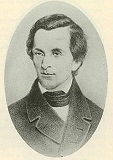

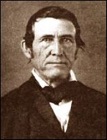
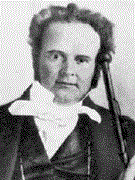
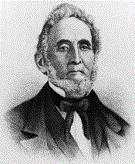
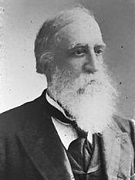
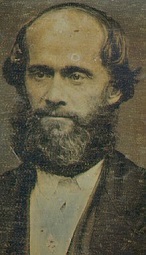
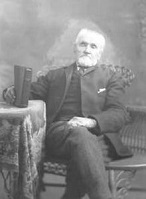

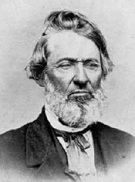
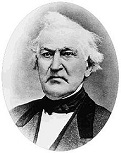
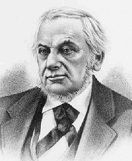








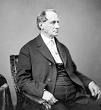



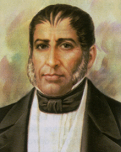

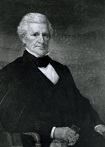
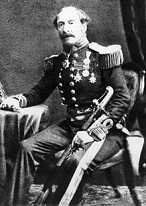
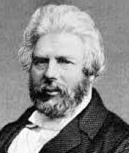


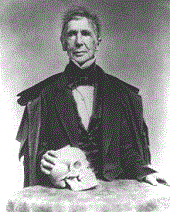








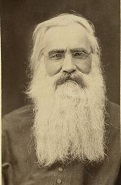







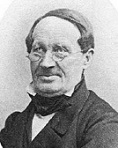
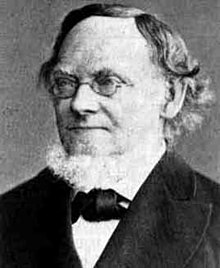
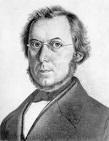



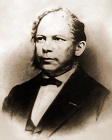
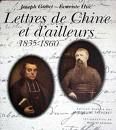






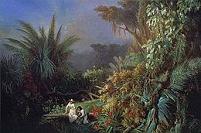
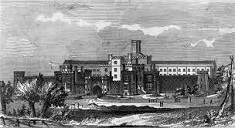
1844 Railway Mania sweeps Europe (ends 1847), spurring vast extensions of the railroad network; British railroad mileage goes from 26 in 1828 to 2,236 this year. The U.S. opens a consulate in Jerusalem, with the new consul gen. planting a U.S. flag at the Jaffa Gate and declaring that the U.S. "extended its protection to the Jews of Jerusalem"; meanwhile the first Census of Jerusalem by the Prussian consul Ernst-Gustav Schultz lists 7,120 Jews, 5,000 Muslims, and 3,390 Christians, plus 800 Turkish soldiers and 100 Europeans; Jews outnumber Muslim Arabs by 2-1 in Jerusalem? many Egyptian Muslims remain there, while Jews from Algiers and North Africa begin to settle in the city in growing numbers, call it a population war; in the 1840s and 1850s, the international powers begin a tug-of-war in Palestine as they sought to extend their protection over the region's religious minorities, a struggle carried out mainly through consular representatives in Jerusalem; the tide of Christian pilgrims increases under the Ottomans, doubling the city's pop. each Easter. On Jan. 15 the U. of Notre Dame (Notre Dame du Lac) in South Bend, N Ind. (near the border with Mich. and Ill.), founded on Nov. 26, 1842 by Father Edward Frederick Sorin (1814-93) of the French religious order Congregation of Holy Cross receives its charter from the state of Indiana; it is turned over to lay control in 1967; sports teams are known as the Fighting Irish. On Feb. 10 "the Liberator" Daniel O'Connell (1778-1847) is found guilty of political conspiracy against British rule in Ireland, protesting his innocence, and on Sept. 4 his conviction is reversed by the House of Lords. On Feb. 11 the Paulet Affair begins when British Capt. Lord George Paulet (1803-79) of HMS Carysfort claims that British subjects in the Hawaiian Islands are being denied their rights and lands in Honolulu, requesting an audience with king Kamehameha III, who play footsie with him, causing him to occupy the islands for five mo. and claim them for Britain, finally leaving on July 31 (Hawaiian Restoration Day) after his superiors intervene; the kingey utters the immortal soundbyte "Ua Mau ke Ea o ka 'Aina i ka Pono" (The life of the land is perpetuated in righteousness). On Feb. 24 the U. of Miss. (Ole Miss) in Oxford, Miss. is founded by the Miss. legislature, opening its doors to its first class of 80 students in 1848; in 1861 135 of 139 students enlist in the Confed. Army; it goes coed in 1882, hiring the first higher ed. female faculty member in the Am. Southeast in 1885; in 1897 student Elma Meek suggests the name Old Miss; on Sept. 30, 1962 after being denied entry on Sept. 20-26, USAF vet James Howard Meredith (1933-) enrolls while escorted by U.S. marshals, integrating the univ.; the sports teams are called the Rebels. On Feb. 28 Pres. Tyler (a widower since last Sept.) and guests cruise the Potomac River aboard the 1K-ton Swedish-designed gunboat USS Princeton (the U.S. Navy's first screw-propelled steamer), commanded by Princeton, N.J.-born Capt. (later Commodore) Robert Field Stockton (1795-1866); on the 3rd test-firing of its pair of 12-in. iron guns, one of them, the Peacemaker, explodes, killing six, incl. secy. of state Abel P. Upshur and Navy secy. Thomas W. Gilmer; Tyler is unhurt, but the incident damages his rep.; lucky for Tyler, David Gardiner, brother of visiting beautiful N.Y. socialite Julia Gardiner Tyler (1820-89) is among those killed, allowing him to step up to the plate and personally console her, persuading her to marry him next June 26 in New York City, which causes the U.S. pop. to raise eyebrows since she's 30 years younger, with Tyler's oldest daughter Mary only five years younger than her; Julia goes on to turn the White House into a ball house, wearing plumes in her hair attended by maids of honor dressed in white, hosting up to 3K at a time, and after he leaves office they move to Tyler's plantation in good ole Charles County, Va., where she bears seven children. On Mar. 8 Charles XIV John (b. 1763) (Jean Bernadotte) (king of Sweden and Norway since 1818) dies, and his son Joseph Francois Ocar Bernadotte, husband of Empress Josephine's granddaughter Josephine de Beauharnais becomes king Oscar I (1799-1859) of Sweden and Norway (until July 8, 1859), Bernadotte monarch #2. On Mar. 11 Joseph Smith Jr. establishes the secret Council of Fifty (which incl. non-Mormons) AKA "The Kingdom of God and His Laws with the Keys and Power thereof, and Judgment in the Hands of His Servants, Ahman Christ" to symbolize and represent t+he future theodemocratic Mormon Kingdom of God on Earth, with him as king (cooked up by his ghostwriter Wiliam Wines Phelps), but really to launch his campaign for pres. of the U.S., which is announced at the LDS Gen. Conference on Apr. 9; on May 17 Smith's new Reform Party holds its nomination convention, which uninanimously nominates him, with the platform calling for members "to carry out the principles of liberty and equal rights, Jeffersonian democracy, free trade, and sailors' rights, and the protection of person and property", announcing a nat. convention in New York City on July 13; Smith turns Southerners on with a plan to end slavery by 1850 via compensated emancipation funded with the sale of public lands and the cutting of Congresspersons' salaries from $8/day to $2/day, and proposes a nat. bank along with a reduction of the U.S. House of Reps to two members per million pop., open borders, replacement of prisons with "seminaries of learning", and the granting of power to the U.S. pres. to suppress mobs sans a request from state governors along with a constitutional amendment providing for capital punishment for officials who refuse to assist those denied their constitutional rights, with the soundbyte: "The state rights doctrines are what feed mobs"; if Smith had lived to be elected U.S. pres. instead of Abraham Lincoln, he could have avoided the bloody U.S. Civil War and kept Washington, D.C. from turning into a corrupt shark-infested swamp, and the compensated Southern ex-slaveholders might have invested their cash in factories and turned the South into an industrial dynamo?; he might even have become a nat. hero and pushed Mormonism over on the U.S. complete with polygamy and white supremacy? - the good die young? He had time to inject the Satanic core into Mormonism before his assassination? On Apr. 7 the King Follett Discourse (Sermon) is delivered by Joseph Smith Jr. in Nauvoo, Ill. before an audience of 20K Mormons at a gen. conference shortly before the funeral service of elder King Follett, who died on Mar. 9, claiming that God (Elohim) was once a mortal man, and that men and women can become gods and goddesses (divinization) via salvation and exaltation. On Apr. 27 Henry Clay and Martin Van Buren pub. letters in separate Washington, D.C. newspapers opposing Texas annexation because of the danger of war, with Clay adding in his Raleigh Letter of Apr. 17 that it would be "dangerous to the integrity of the Union"; the U.S. Senate rejects the Texas annexation plan zealously pushed by Pres. Tyler, who wants to give slavery more room - I didn't want to do it, I didn't want to do it? The slavery issue colors the election, as one white party goes for white clay, and the other for a pig in a polk on a dark horse? On May 1 the 1844 Whig Nat. Convention in Baltimore, Md. unanimously nominates Henry Clay (1777-1852) of Ky. for pres., and Theodore Frelinghuysen (1787-1862) "the Christian Statesman" of N.J. for vice-pres.; on the first-ever 1844 Whig Platform omits any reference to the hot potato of Texas; on May 27-29 the 1844 Dem. Nat. Convention in Baltimore, Md. deadlocks over anti-annexation candidate Martin Van Buren and pro-annexation candidate Lewis Cass of Mich., and on the 9th ballot nominates pro-slavery pro-expansionist (both Tex. and Ore.) James Knox Polk (1795-1849) of Tenn., who becomes the first "dark horse" candidate in U.S. history (a shock of long grizzled hair looks like a mane, and he has probing gray eyes?), and the first to announce that he won't seek reelection; the 1844 Dem. Platform calls for "the reoccupation of Oregon and the reannexation of Texas"; "president without a party" Tyler fails to win renomination by the alienated Whigs or the Dems; the Chronicle of Ithaca, N.Y. runs a false story about German tourist Baron von Roorback, who claimed to see Polk brand and sell 23 slaves at a slave auction, which backfires when it is exposed as a hoax, but doesn't stop the term "Roorback" from being coined to denote last-minute black propaganda. On May 6-8 the Philadelphia Bible (Nativist) Riots see rumors that Irish Roman Catholic immigrants are trying to remove the Bible from public schools lead to riots, which are repeated on July 6-7; the lack of law enforcement leads to consolidation of the city in 1854. On May 8 Sir John Francis Davis (1795-1890), author of Hien Wun Shoo: Chinese Moral Maxims (1823) becomes British gov. of Hong Kong (until Mar. 21, 1848), seeing his home robbed on July 16 by the natives, who hate his drug-pushing guts, not to mention British merchants, who resent his high taxes; meanwhile he goes on to perform the first census, which reports 23,988 people living in Hong Kong - by the 21st cent. that many live in a single apartment house? On May 23 Shiite Siyyid 'Ali-Muhammad Shirazi (1819-50) of Shiraz, Persia takes the title of Bab (Arab. "Gate") and announces the Declaration of the Bab, founding the Baha'i (Arab. "splendor") faith (Bahaism) in Persia, stressing universal brotherhood and equality, and forbidding slavery, polygamy, begging, and drinking alcohol; too bad, his claim that divine revelation flows through him gets him executed in 1850. The first E.F. Hutton: he talks and you listen? On May 24 "What hath God wrought", the first long distance message over telegraph wires is sent by Samuel F.B. Morse from Washington, D.C. to Mount Clare Station in Baltimore, Md.; on May 25 it appears in the Baltimore Patriot - don't blame God for it? On June 6 the Young Men's Christian Assoc. (YMCA) is founded in England by draper's shop mgr. Sir George Williams (1821-1905) as a way to get men off the streets and into nice rooms where they can read the Bible and figure out when the Second Coming is going to be; his boss George Hitchcock is one of his first converts; he is knighted in 1894 by Queen Victoria. On June 14 the Warsaw Signal pub. minutes of a meeting of residents of Warsaw, Ill. organized by Mount Holly, N.J.-born anti-Mormon activist publisher Thomas Coke "Old Tom" Sharp (1818-94), July 1841 founder of the Anti-Mormon Party in Hancock County, at which they resolve that "the Prophet [Smith] and his miscreant adherents, should... be demanded at their [the Latter Day Saints'] hands, and if not surrendered, a war of extermination should be waged to the entire destruction, if necessary for our protection, of his adherents"; on Sept. 25 a deputy sheriff attempts to arrest him as a suspect in the murders of Joseph and Hyrum Smith, but he flees to Alexandria, Mo. until Oct. 1, when he agrees to be tried in Quincy, Ill., where he and four others are acquitted of the murders. The good die young? Another beauty queen doesn't reach 40? On June 27 after 39-y.-o. holy polygamist Elvis lookalike Joseph Smith Jr. (b. 1805) becomes mayor of Nauvoo, Ill., and his city council orders the suppression of the Warsaw Signal anti-Mormon newspaper for claiming that Smith is a polygamist (which he denies), which Smith allows the Nauvoo Legion to do, causing an outcry that causes Smith to declare martial law and mobilize the Nauvoo Legion on June 18, getting him and his elder brother Hyrum Smith (b. 1800) arrested and jailed on June 23 in Carthage, Ill., they are murdered in jail by a mob after being promised protection by Dem. Ill. gov. #8 (1842-6) Thomas Ford (1800-50) and the Carthage Greys local state militia, which disobeys orders and joins the mob; Smith unloads a 6-shooter smuggled to him, missing three shots and wounding three mob members with the others; he could have escaped, but preferred martyrdom?; Smith liked tea, wine, and liquor, and Nauvoo had its own brewery; the Prophet dies at age 39 after having married at least 49 women (wives or concubines)?, incl. 12 already-married women, five sets of sisters, and one mother-daughter pair; "When I see a pretty woman I have to pray for grace"; during his life he was subjected to approx. 30 criminal actions; he leaves Joseph Smith's Translation of the Bible, written mainly in June 1830-July 1833, adding the Book of Moses (Visions of Moses and Enoch), and the Passage on Melchizedek, and amending the text of the King James Version even though he doesn't know Hebrew, Greek, or Aramaic; "The book is a curiosity to me, it is such a pretentious affair, and yet so 'slow,' so sleepy; such an insipid mess of inspiration. It is chloroform in print. If Joseph Smith composed this book, the act was a miracle - keeping awake while he did it was, at any rate... Wherever he found his speech growing too modern - which was about every sentence or two - he ladled in a few such Scriptural phrases as 'exceeding sore,' 'and it came to pass,' etc., and made things satisfactory again. 'And it came to pass' was his pet. If he had left that out, his Bible would have been only a pamphlet." - Mark Twain, Roughing It, 1872, Ch. 16; the prophet's death launches a succession crisis, with the church's five leading quorums of authority going at like cats and dogs; on July 10 Smith's longtime friend (born in Rutland, Vt.) William Marks (1792-1872), stake pres. of Nauvoo (an opponent of polygamy) is ordained by the secret Council of Fifty as his successor, backed by Smith's first wife Emma, with Marks claiming that in the weeks before his death Smith had told him that it was a curse not a blessing, and started taking steps to end the practice incl. burning his polygamy revelation and destroying his temple garments; too bad, Hopkinton, Mass.-born apostle-elder and church historian-recorder Willard Richards (1804-54) convinces them to wait until his cousin, Whittingham, Vt.-born Brigham Young (1801-77) returns from Smith's pres. campaign, then backs him as successor, after which a large meeting is held on Aug. 8, where Sidney Rigdon (1793-1876) claims that there can be no true successor to Smith, and that as the senior surviving member of the First Presidency he should be made the church's "Protector", while Young claims that the Quorum of the Twelve Apostles is "equal in authority and power" to the First Presidency, so as its pres. he should lead the church, with his speech wowing the audience so much that they claim he looks and sounds exactly like Smith, proving divine approval; actually the majority back Young for his pro-polygamy stand?; either way, Marks drops out of the race, leaving Nauvoo in Feb. 1845 before Young can get him "whittled out" (surrounded by men who whistle and whittle until he gets the idea), going on to ping-pong between support of Sidney Rigdon, James Strang, and Joseph Smith III, ending up as his counselor; after Rigdon is excommunicated on Sept. 8, causing him to excommunicate the Quorum of the Twelve Apostles and flee to Pittsburgh, Penn., founding the Rigdonite Church; on Apr. 6, 1860 the Reorganized Church of Jesus Christ of Latter Day Saints (Community of Christ since 2001) also splits off, with Joseph Smith Jr.'s eldest surviving son Joseph Smith III (1832-1914) (who is ardently anti-polygamy, claiming that his daddy never taught or practiced it, and that it was invented by Brigham Young), becoming prophet-pres. on June 6, 1860-Dec. 10, 1914; the Strangites, organized by Scipio, N.Y.-born James Jesse Strang (1813-56) split off after he produces a Letter of Appointment from Joseph Smith Jr. dated June 18, 1844 and convinces several thousand Mormons to move with him to Voree, Wisc., followed in 1848 by well-named Beaver Island in Lake Michigan after flopping from monogamy to polygamy and losing several followers, declaring himself king and ending up getting assassinated; the Church of Jesus Christ (Bickertonite) also splits off, organized by William Bickerton (1815-1905), who is converted from Methodist to Mormon by Sidney Rigdon in 1845, and backs his claim to be Joseph Smith Jr.'s rightful successor, but refuses to move with him to Adventure Farm near Greencastle, Penn., remaining in Monongahela, Penn. until it collapses in Apr. 1847, refusing Brigham Young's command to teach plural marriage, organizing his own branch of the church in West Elizabeth, Penn. in 1851, causing Young to excommunicate them in 1855, after which in 1875 he leads 35-50 families to the Zion Valley Colony in St. John, Kan.; on Sept. 19, 1853 after leaving in fall 1847 to do missionary work among the Lamanites (Native Ams.) near Kanesville, Iowa, and becoming the subject of rumors of disloyalty to the Twelve Apostles and of being elected Generalissimo of a union of 37 nations, Plainfield, N.H.-born John Alpheus Cutler (1784-1864), captain of Smith's personal bodyguard and his "chief architect and master workman of all God's holy houses" since 1838, who picked the site for Winter Quarters, breaks off from Brigham Young and founds his own Church of Jesus Christ (Cutlerite) in Manti, Iowa, claiming to be the only legitimate Latter Day Saint church in the world because the Nauvoo Temple wasn't completed in the "sufficient time" required in Doctrine and Covenants 124:31-32, rejecting polygamy but retaining baptism for the dead, reaching a high of 183 members; in 1847 Smith County, Tenn.-born apostate William Earl McLellin (1806-83) remembers that Joseph Smith Jr. once designated Harrisburg, Penn.-born Three Witnesses man David Whitmer (1805-88) as his successor, and he bites and forms the Church of Christ (Whitmerite), recruiting fellow gold plate witnesses Oliver Cowdery, Martin Harris, Hiram Page, and John Whitmer, although David Whitmer never joins, and it soon goes kaput until Whitmer ordains his nephew John C. Whitmer as First Elder in Jan. 1876, then in 1887 pub. the pamphlet An Address to All Believers in Christ blasting all other branches of the LDS movement but the Whitmerite church, which goes kaput again in the 1960s. On July 12 the Haitians are thrown out of the E half of Hispaniola, and the Dominican Repub. is established, with wealthy cattle rancher and soldier Pedro Santana Y Familias (1801-64) as pres. #1 on Nov. 14 (until Aug. 4, 1848); meanwhile uprisings and Haitian attacks continue, while the pop. splits into a faction that wants to return to Spanish rule and another that wants to be annexed by the U.S., allowing capable Santas to consolidate rule as a dictator (until Mar. 18, 1861). In July the First Maori War with the British in New Zealand begins (ends 1847). On Aug. 6-14 the First Franco-Moroccan War begins when Algerian resistance leader Abd al-Qadir retreats into Morocco to avoid the French; on Sept. 10 the Treaty of Tangiers ends the First Franco-Moroccan War, with Morocco recognizing Algeria as part of the French Empire; the oasis town of Biskra, Algeria, known for carpets and burnooses is seized from the Moors by the French, who build Ft. St. Germain. On Aug. 28 after sending his first economic work "Outline of a Critique of Political Economy" to be pub. by Marx, Friedrich Engels meets Karl Marx again at the Cafe de la Regence in Paris, and this time they become close pals. On Sept. 12 the military revolts, and Gen. Jose Joaquin (José Joaquín) Antonio de Herrera (1792-1854) becomes pres. #14 of Mexico (until Sept. 21, followed by Dec. 6, 1844-Dec. 30, 1845, and June 3, 1848-Jan. 15, 1851), proving a political moderate. In Sept. Norman-born Parisian courtesan Marie Duplessis (Alphonsine Rose Plessis) (1824-47) becomes the mistress of novelist Alexandre Dumas fils (1824-95) (illegitimate son of Alexandre Dumas pere), who hooks up with her for almost a year until next Aug., then gets to work immortalizing her as Marguerite in "La Dame aux Camelias" (1848) (with himself as Armand), while she hooks up with Franz Liszt (1811-86), then dies of TB at age 23. On Oct. 1 Halki Seminary in Heybeliada Island in Constantinople is founded, becoming the #1 Eastern Orthodox seminary; too bad, the mean Muslim Ottoman govt. closes it in 1971 to make it impossible for new priests to be ordained (until ?). When does a fashion statement make a bank statement? On Oct. 22 the Millerites, followers of Pittsfield, Mass.-born Baptist preacher William Miller (1782-1849) begin to face the Great Disappointment of 1844 when the 2,300 Year-Days of Daniel 8:14 don't jive like they thought, and the world doesn't end with the Second Coming of Christ; never fear, in Dec. Maine-born Ellen Gould White (1827-1915) begins having the first of 2K personal visions, causing the true believers to regroup and form the Seventh-Day Adventists, who claim that Christ didn't make his Second Coming because he entered the Holy of Holies in the Heavenly Sanctuary to begin the Investigative Judgment, and that they should worship on Saturday not pagan Sunday - Sunday didn't work so why not go back to the Jewish sabbath? On Nov. 1-Dec. 4 after Henry Clay suddenly flip-flops on Texas, saying that slavery there is only a "temporary institution", and that if it could be annexed "without dishonor, without war, with the common consent of the Union, and upon just and fair terms" he wouldn't object, and Polk's followers cry for "Texas and Democracy" and "Fifty-four Forty or Fight" (annexing Oregon all the way to Alaska), with Polk's Senate spokesman William Allen (1803-79) "the Ohio Foghorn" leading the charge, tasking Clay for being a gambler, dueling fool, and debaucher, with the Whig campaign slogan "Who is James K. Polk?", the 1844 U.S. Pres. Election sees Polk barely edge Clay in the popular vote by 39K (1,339,494 to 1,300,004), but win by 170-105 electoral votes; the 62K votes (out of 2.5M total) cast for abolitionist James G. Birney of the Liberty Party (former Northern Whigs) deprives Clay of N.Y. and costs him the election (he would have won by 7 electoral votes); Polk carries neither N.C., his birth state, nor Tenn., the state he served as gov. for two terms; the Liberty Party disbands in 1848 when many of its members join the Barnburners to form the Free-Soil Party. An attempt is made on the life of Prussian King Frederick William IV. PM Sir Robert Peel renews the British income tax for three more years, and takes more steps towards free trade, eliminating all duties on exports, but purposely keeps the Corn Law's high duty on imported grain. China allows the first Christian missionaries into their country, and five Chinese ports are opened to U.S. ships after negotiations led by U.S. minister Caleb Cushing (1800-79) result in the Treaty of Wang Hiya (Wangshia), the first U.S.-Chinese treaty of peace, amity, and commerce; French Lazarist missionaries Abbe Evariste Regis Huc (1813-60) and Joseph Gabet begin a journey from China to Tibet, arriving in Lhasa in 1846. Uganda in E Africa is first visited by European explorers and Arab traders. The French take over the 14-island Gambier Islands in the Tuamotus 1K mi. SE of Tahiti, claiming a protectorate, which is formally annexed in 1881. The Silesian Weaver Revolt is brutally sewn up. The island of Fernando Po in the Gulf of Guinea is reclaimed by Spain. Armed street fights between Protestants and Catholics in Philadelphia, Penn. end with 20 dead and 100 injured. Rama Varma XII dies, and Rama Varma XIII (-1851) becomes king of Cochin in SW India (until 1851). Ang May becomes reina of Cambodia for the 2nd time (until 1845). Laws giving corporations limited liability are passed in Britain, and now the era of corporate greed is in sight, though it takes until the 1860s for the U.S., France, and Germany to follow suit; meanwhile the accounting prof. begins a boom (there were only five in England in 1790 and 73 in 1822). The British Factory Act is passed, requiring children from 9-13 years of age to work at most half a day, or on alternate days, and go to school in the meantime; women are placed in the same category, and their working day reduced to 10 hours. The Spanish govt. in the Philippines outlaws private trading by provincial govs., allowing the Chinese to set up shop. Millard Fillmore loses a bid to become gov. of New York. William Henry Herndon (1818-91) is admitted to the Ill. bar, becoming the lifelong law partner of Abraham Lincoln. Am. atty. Lysander Spooner (1808-87) of Mass. founds the Am. Letter Mail Co. to compete with the U.S. Post Office, which creates a 3-cent stamp to compete with him then ties him up in court with legal challenges until he runs out of funds; the case never reaches the U.S. Supreme Court; until he started his co., postal rates were 14.5 cents and up. Francois Marbeau opens the first creche (infant nursery) in Paris, causing others to open salles d'asile, daycare facilities for children too old for the creche but too young for school. The Rochdale Society of Equitable Pioneers in Rochdale, Lancashire, in NW England near Manchester (an org. of flannel weavers) is founded, becoming the first successful cooperative in England, reaching a membership of over 5K by 1869. The Petrashevsky Circle of followers of the Socialist theories of Charles Fourier begins meeting on Fridays at the home of M.V. Petrashevsky; after the revs. of 1848 they go radical and get shut down by the govt. in 1849. The Shaftesbury Society (Ragged School Union) in London is founded by the 7th earl of Shaftesbury to provide schools and hostels for physically handicapped children and victims of muscular dystrophy. The last Great Auk is killed on an island off Iceland - what were its last words that made Milaukee famous? Jonkoping (Jönköping) in Sweden becomes a center for manufacturing matches after J.E. Lundstrom founds the Match Factory (Tandstickfabriken). His first wife Letitia (b. 1790) having died in 1842, Pres. John Tyler marries 30-years-younger Julia Gardiner (1820-89); they have 5 sons and 2 daughters, bringing his total to 8 and 6. The city of Portland, Ore. (modern-day pop. 584K/3.1M) at the confluence of the Willamette and Columbia Rivers at the end of the Oregon Trail is founded; the name is decided on a coin toss, with loser Asa Lovejoy of Boston, Mass. wanting Boston, and winner Francis W. Pettygrove of Portland, Maine wanting Portland; it is incorporated on Feb. 8, 1851. German Bible scholar Lobegott Friedrich Constantin (von) Tischendorf (1815-74) journeys to the wilderness of Sinai and finds an ancient copy of the New Testament, the Epistle of Barnabus, and about half of the Greek Septuagint (incl. the complete Deuterocanonical vols.) in the wastebasket of St. Catherine's Monastery dating to 325, (the oldest yet discovered), and takes away only 43 sheets; he returns in 1853 and finds only a further fragment; it becomes known as the Codex Sinaiticus The first public bath and wash houses open in Liverpool, England. The Toronto Globe is founded by Scottish-born George Brown (1818-80), who goes on to become active in the Reform Party. Danish poet-educator Bishop Nikolai F.S. Grundtvig (1783-1872) founds the first inst. of adult ed., and his ideas, combined with those of Soren (Sören) Kierkegaard (1813-55) rock the Danish Lutheran Church, leading to reforms. Christen (Kristen) Kold (1816-70) founds the first Danish folk high school in Rodding (Rřdding) to instill Dutch nationalism. The Am. Psychiatric Assoc. (APA) is founded in Philadelphia, Penn. by 13 insane asylum and mental hospital dirs. as the Assoc. of Medical Superintendents of Am. Institutions for the Insane (AMSAII); in 1892 it becomes the Am. Medico-Psychological Assoc.; in 1921 it changes to the present name; by 2012 it has 36K members; their logo is a likeness of Benjamin Rush. After attending lectures on animal magnetism, Blooming Grove, N.Y.-born Andrew Jackson Davis (1826-1910) begins practicing magnetic healing (until 1847), becoming known as "the Poughkeepsie Seer" and making a fan of Edgar Allan Poe, later Edgar Cayce. After HMS Beagle Capt. Robert FitzRoy teaches it to his crew, the British Royal Navy officially adopts the term "port" for the left side of a ship, replacing larboard; the right side is starboard. The Rochdale Society of Equitable Pioneers is founded in Rochdale, England, beginning the modern cooperative movement. The German humorous weekly newspaper Fliegende Blatter begins pub. in Munich (until 1945). Danish composer Niels Wilhelm Gade (1817-90) becomes conductor of the Gewandhaus Orchestra (until 1848). 12-y.-o. Hungarian violin prodigy Joseph Joachim (1831-1907), protege of Felix Mendelssohn debuts in the Leipzig Gewandhaus playing Heinrich Wilhelm Ernst's "Otello Fantasy", becoming a big hit in London playing the Beethoven violin concerto. Mass.-born Transcendentalist feminist brain babe Sarah Margaret Fuller (1810-50) moves from Boston to New York City and becomes lit. critic for Horace Greeley's New York Tribune, the first full-time book reviewer in journalism history, rising to the newspaper's first female ed. in 1846, becoming known for the statement that she never met her intellectual equal, and once announcing "I accept the Universe", to which Thomas Carlyle replies "By Gad, she'd better"; another favorite quote of hers is "If you ask me what offices women may fill, I reply, 'Any'. I do not care what case you put. Let them be sea captains, if you will", causing Greeley to yell "Let them be sea captains if they will" to her all the time. Club des Hashischins (Hashishins) (Hachichin) is founded in Paris (until 1849) to explore the pleasures of hashish smoking by Charles Baudelaire, Eugene Delacroix, Alexandre Dumas pere et al., holding monthly "seances" at the Hotel de Lauxun on Ile Saint-Louis. Victor Marie Hugo (1802-85) succeeds Charles Nodier as grandmaster of the Priory of Sion (until 1885) :). Pabst Brewing Co. in Milwaukee, Wisc. is founded in Milwaukee, Wisc. by Mettenheim, Germany-born Jacob Best Sr. (1786-1861) and his sons Philip, Charles, Jacob Jr., and Lorenz; in 1863 Philip's son-in-law Johann Gottlieb Friedrich "Frederick" Pabst (1836-1904) buys a 50% share, going on to reach 100K barrels/year in 1872, and introduce Best Select in 1875, which changes its name to Pabst Select then Pabst Blue Ribbon (PBR) in 1882, tying blue ribbons around the bottle neck until 1916; in the 1890s Pabst becomes the first U.S. brewer to sell 1M barrels a year; during the Depression the co. sells Pabst-ett brand "whole milk cheese food"; in 1978 sales reach 15.6M barrels/year before going into a steep decline. Architecture: Reading Gaol (HM Prison Reading) next to Reading Abbey on the Kennet River in Reading, Berkshire, England opens, utilizing the newfangled Separate System and executing its first prisoner next year before a crowd of 10K, followed by 1,867 more until 1913; celeb prisoners incl. Oscar Wilde and actor Stacy Keach. Sports: On Sept. 24-25 the first-ever internat. cricket match is played between Canada and the U.S. The Grand Nat. is founded as the ruling body of British archery, conducting yearly championships. Inventions: British engineer Isambard Kingdom Brunel (1806-59) builds an air-driven pneumatic train on the South Devon Railway in England; too bad, rats like to eat the leather-copper pipe valves. Vt.-born medical student Gardner Quincy Colton (1814-98) first demonstrates nitrous oxide for anesthesia to Hartford, Conn. dentist Horace Wells (1815-48) on Dec. 10, then leaves for the Calif. Gold Rush, letting Wells take the credit; too bad, next year Wells gives a public demonstration in a Boston hospital and pulls the patient's tooth before the anesthetic takes effect, causing him to be laughed at, then generously offers the discovery to the public domain with the soundbyte that pain relief should be "as free as the air" - go be my Luca Brazzi? Elijah Galloway of Britain invents waterproof easy-to-clean gray-brown rubber and powdered cork Kamptulicon (Gr. "kampto" = flexible) (the first lineoleum), which is used to line the floors of the British Parliament; real lineoleum is patented in 1863; too bad, increases in rubber prices drive the co. out of business. Leon Foucault (1819-68) of Paris develops an improved version of Sir Humphry Davy's carbon arc lamp using gas carbon instead of charcoal; next year Thomas Wright of London adds a clockwork mechanism to adjust the carbons. Adolphe Jacqueson of France invents the muselet (Fr. "museler" = to muzzle), the wire cage that secures the cork in a bottle of champagne. German weaver Friedrich Gottlob Keller (1816-95) of Krippen, Saxony invents practical wood-pulp paper, using it for grinding. Gustaf Erik Pasch (Berggren) (1788-1862) of Sweden patents a safety match with red phosphorus on the striking surface; too bad, the red stuff is too expensive, and he goes broke. Science: The Great Comet of 1844 is first observed (period 102,050 years) - don't tell William Miller's followers or they might freak? Market Bosworth, Leicestershire-born psychiatrist Sir John Charles Bucknill (1817-97) becomes suptd. of the Devon County Asylum (until 1862), ordering that no restraints be used on patients, reforming English practice. German chemist Karl Ernst Claus (1796-1864) discovers the greyish-white metallic element Ruthenium (Ru) (#44) in platinum ores. German botanist Hugo von Mohl (1805-72) identifies and names protoplasm as the source of movements in the nucleus. After beginning a tour of India and Persia in 1841, visiting Bombay and Persepolis, Danish Orientalist Niels Ludvig Westergaard (1815-78) of Denmark begins deciphering ancient Elamite cuneiform using the 3-way parallel text of the 6th cent. B.C.E. Behistun Inscription, finding 96 syllabic signs, 16 ideograms, and 5 determinants. Nonfiction: Louis Agassiz (1807-73), Fossil Fishes of the Old Red Sandstone. Hector Berlioz (1803-69), Traite de l'Instrumentation et d'Orchestration Modernes. Francisco Bilbao, Sociabilidad Chilena; a liberal essay which gets him arrested and tried, only to be liberated by a jitterbugging crowd of artisans and students. Theodor Bischoff (1807-82), Evidence for the Periodic Ripening and Detachment of the Ova in Man and the Higher Mammals. George Bush (1796-1859), The Valley of Vision; or, The Dry Bones of Israel; bestseller (1M copies) by a Presbyterian Bible scholar and ancestor of U.S. presidents George H.W. Bush and George W. Bush; calls for the Jewish state of Israel to be restored to elevate the Jews "to a rank of honorable repute among the nations of the Earth" to form a "link of communication" between humanity and God; "It will blaze in notoriety"; "It will flash a splendid demonstration upon all kindreds and tongues of the truth." Frederick Catherwood (1799-1854), Views of Ancient Monuments in Central America, Chiapas and Yucatan (May). Robert Chambers (1802-71), Vestiges of the Natural History of Creation (pub. anon.); prepares many people to come out of the closet and accept Darwin's Theory of Evolution, while chicken Darwin satisfies himself by privately circulating a long essay on his theory - so it's now OK to try some of those new condom thingies on their new lineoleum floors while getting high on laughing gas? Charles Darwin (1809-82), Volcanic Islands. Jules Dupuit (1804-66), De la Mesure de l'Utilite des Travaux Publics; first economist to identify the downward-sloping demand curve with the marginal utility curve. Ralph Waldo Emerson (1803-82), Essays, 2nd Series. Friedrich Engels (1820-95), The Condition of the Working Class in England (first book); based on his time in Manchester. Friedrich Froebel (1782-1852), Mutter - und Koselieder. Ilija Garasanin (1812-74), The Nacertanije; a proposed constitution for independent Greater Serbia, declaring that its sojuz (union) should expand to encompass all South Slavs regardless of religion incl. Bulgarians, Macedonians, Montenegrins, Bosnians, Hungarians, and Croats, inspiring the Black Hand and leading to WWI?; “Austria means to use her power to endanger the small and weak Serbia"; "The Serbian state, which has already taken off favorably, but which needs to expand and become stronger, has its strong base and foundation in the Serbian kingdom of the thirteenth and fourteenth centuries and in the rich and glorious Serbian history. Now that Turkish strength has been in a manner of speaking, broken down and destroyed, that same spirit ought to reawaken and assert its rights anew." Hermann Gunther Grassmann (1809-77), The Calculus of Linear Extension, A New Branch of Mathematics (Ausdehnungslehre); founds linear algebra and develops the idea of a vector space; his mentor Mobius can't understand it, and he gets little credit, and rival mathematician Adhemar Jean Claude Barre de Saint-Venant claims to have developed his ideas first, causing him to switch to linguistics; 2nd revised ed. pub. in 1862. Theophile Gautier (1811-72), Voyage en Espagne; cool travel book. Heinrich Heine (1797-1856), Deutschland, ein Wintermarchen (Wintermärchen). Alexander Keith (1781-1880), The Land of Israel According to the Covenant with Abraham, with Isaac, and with Jacob; report on a visit of him and three other Church of Scotland ministers to Palestine in 1839 as part of their Christian Restorationist mission of returning Israel to the Jews, claiming that Palestine is totally desolate, and coining the slogan "A land without a people for a people without a land", along with the soundbyte "Greece was given to the Greeks, and in seeking any government for Syria, may not a confederacy of kings give Judea to the Jews?" Soren Kierkegaard (1813-55), Philosophical Fragments; pub. under alias Johannes Climacus; the Socratic vs. the religious methods of arriving at Truth; The Concept of Anxiety (Dread) (June 17); pub. under the alias Vigilius Haufniensis (Watchman of Copenhagen); the first treatment of anxiety, the experience of looking over an edge and having an impulse to throw oneself over it, "the dizziness of freedom", which precedes sin as with Adam and Eve and the apple; "Consciousness presupposes itself"; Four Upbuilding Discourses (Aug. 31); the resolution made by a single individual, leading to the leap of faith. A.W. Kinglake, Eothen. Eliphas Levi (1810-75), The Mother of God. John Stuart Mill (1806-73), Essays on Some Unsettled Questions in Political Economy; makes the Catholic Prohibited Books Index, making it more popular? Edgar Allan Poe (1809-49), Marginalia (1844-9); "By ringing small changes on the words leg-of-mutton and turnip - changes so gradual as to escape detection - I would 'demonstrate' that a turnip was, is, and of right, ought to be a leg-of-mutton." William Smith (1813-93) (ed.), Dictionary of Greek and Roman Biography and Mythology (3 vols.). Arthur Penrhyn Stanley (1815-81), Life and Correspondence of Thomas Arnold. Max Stirner (1806-56), The Ego and His Own (Der Einzige und sein Eigentum) (Leipzig); refutation of Ludwig Feuerbach's 1841 "The Essence of Christianity", eliciting a counter-refutation. Charlotte Elizabeth Tonna (1790-1846), The Wrongs of Women. Samuel Wilberforce (1805-73), A History of the Protestant Episcopal Church in America. Music: Friedrich von Flotow, Alessandro Stradella (Hamburg). Fromental Halevy (1799-1862), Le Lazzarone, ou Le Bien Vient en Dormant (opera). Johann Georg Kastner, The Last King of Judah (oratorio); the first use of the saxophone in a symphonic orchestra? Heinrich Marschner (1795-1861), Kaiser Adolf von Nassau, Op. 130 (opera). Felix Mendelssohn (1809-47), Violin Concerto in E minor, op. 64; becomes a #1 classical all-time hit. Franz von Suppe (1819-95), Morning, Noon and Night in Vienna. Giuseppe Verdi (1813-1901), Ernani (the Bandit) (opera) (Mar. 9) (La Fenice Theatre, Venice); set in 1519. Art: Pharamond Blanchard (1805-73), Paul et Virginie; based on the 1788 Jacques-Henri Bernardin de Saint-Pierre novel. George Catlin (1796-1872), Indian Troupe (Nine Ojibway Indians); his exhibitions of Am. Indian life flopping, in 1849 he offers 600 of his paintings (some full-length) to the Smithsonian for $65K and is refused; he is later forced to sell over 120 of his paintings at $3 each to friend Sir Thomas Phillipps; in 1879 a donation gives 590 of his works to the Nat. Fine Arts Collection in Washington, D.C.; other sketches of Indian life end up in the Am. Museum of Nat. History in New York City. Paul Kane, Chinook Indian Encampment on the Columbia River near the Dalles. Jean Louis Ernest Meissonier (1815-91), Painter in His Studio. J.M.W. Turner (1775-1851), Rain, Steam, and Speed. Plays: Visconde de Almeida-Garrett, Frei Luiz de Sousa. Robert Browning (1812-89), Colombe's Birthday (Bells and Pomegranates No. 6). Karl Gutzkow (1811-78), Zopf und Schwert (comedy). Friedrich Hebbel (1813-63), Maria Magdalena. Angel de Saavedra (1791-1865), Disillusion in a Dream. Poetry: Elizabeth Barrett Browning (1806-61), Poems. Lydia Maria Child (1802-80), Over the River and Through the Woods; "Over the river, and through the wood,/ To Grandmother's house we go;/ The horse knows the way to carry the sleigh/ Through the white and drifted snow"; her grandfather's house is in Medford, Mass. on South St. near the Mystic River. Fanny Crosby (1820-1915), The Blind Girl and Other Poems. Heinrich Heine (1797-1856), Nachtgedanken (Night Thoughts); yearns for German unity and modernity; Neue Gedichte - riders on the storm? Thomas Hood (1799-1845), The Bridge of Sighs; "Mad from life's history,/ Glad to death's mystery,/ Swift to be hurl'd -/ Anywhere, anywhere,/ Out of this world!" Leigh Hunt (1784-1859), Imagination and Fancy. James Russell Lowell (1819-91), Poems. Coventry Patmore (1823-96), Poems. Winthrop Mackworth Praed (1802-39), Collected Poems (posth.) (New York); ed. by R.W. Griswold. Bayard Taylor (1825-78), Ximena, or the Battle of the Sierra Morena, and Other Poems. Novels: Charles Dickens (1812-70), The Chimes. Benjamin Disraeli (1804-81), Coningsby. Alexandre Dumas pere (1802-70), The Three Musketeers (Les Trois Mousquetaires); first pub. starting in Mar. as a serial in Le Siecle (Sičcle); three 17th cent. French swordsmen from Gascony incl. ambidextrous Athos, big burly Porthos, and Aramis defend the honor of Louis XIII's wife Anne of Austria (daughter of Philip III of Spain) against scheming Cardinal Richelieu; D'Artagnan makes four; The Count of Monte Cristo (Le Comte de Monte Cristo) (1844-5); in 1815 Edmond Dantes (alias Sinbad the Sailor, Abbe Busoni, and Lord Wilmore) is falsely imprisoned at age 19 and kept in the dungeon of the horrible Chateau d'If, meeting learned Abbe Faria, who turns him into a well-read dude and reveals the hiding place of the buried treasure of the Spada family of Italy (guess?); after 14 years he escapes, gets the treasure, buys the island of Monte Cristo, becomes its count, and spends the rest of his life getting even with his enemies Gaspard Caderousse, Monsieur de Villefort et al. while performing acts of kindness and charity for his friends Monsieur Morrel, his daughter Julie Morrel Herbault, his son Maxmilien Morrel et al., after which he sails away with his babe and former slave Haydee (Haydée); "There is neither happiness nor unhappiness in this world, there is only the comparison of one state with another. Only a man who has felt ultimate despair is capable of feeling ultimate bliss." Charles Lever (1806-72), Tom Burke of Ours. Everardus Johannes Potgieter (1808-75), Het Rijksmuseum. George Sand (1804-76), Jeanne; La Comtesse de Rudolstadt (sequel to "Consuela"). Joseph Marie Eugene Sue (1804-57), The Wandering Jew (Le Juif Errant) (10 vols.) (1844-5). William Makepeace Thackeray (1811-63), The Memoirs of Barry Lyndon, Esq.. Births: English "Punch" cartoonist Edward Linley Sambourne (d. 1910) on Jan. 4 in Pentonville, London. French apparition seer (1858) (St.) Bernadette (Marie Bernarde) (Maria Bernada) Soubirous) (b. 1844) on Jan. 7 in Lourdes. Russian Communist rev. leader ("Babushka or Grandmother of the Russian Rev.") Catherine Breshkovsky (Yekaterina Konstantinova Breshko-Breshkovskaya) (d. 1934) on Jan. 13 near Vitebsk; leaves her wealthy aristocratic family at age 26 to join the Bakunin anarchists in Kiev, is imprisoned in St. Petersburg in 1874-8, then exiled to Siberia until 1896. Am. Confederate guerrilla-outlaw Thomas Coleman "Cole" Younger (d. 1916) on Jan. 15 in Jackson County, Mo. Am. lawyer (black) Richard Theodore Greener (d. 1922) on Jan. 30 in Philadelphia, Penn.; educated at Phillips Academy, and Harvard U. (first African-Am. graduate in 1870). English Jack the Ripper psychiatrist Lyttleton Stewart Forbes Winslow (d. 1913) on Jan. 31 in Marylebone, London; son of Forbes Benignus Winslow (1810-74); descendant of Edward Winslow of Mayflower fame; educated at Rugby School, and Gonville and Caius College, Cambridge U, Downing College, Cambridge U., and Trinity College, Oxford U. Am. psychologist-educator Granville Stanley Hall (d. 1924) on Feb. 1 in Ashfield, Mass.; educated at Williams College, and Harvard U. (first Ph.D in psychology). Polish-German botanist ("Founder of Modern Cytology") Eduard Adolf Strasburger (d. 1912) on Feb. 1 in Warsaw; coins the terms "cytoplasm" and "nucleoplasm". Am. Church of Divine Science co-founder Malinda Elliott Cramer (d. 1906) on Feb. 12 in Greensboro, Ind. Am. retail king Aaron Montgomery Ward (d. 1913) on Feb. 17 in Chatham, N.J. French painter Victorine-Louise Meurent (Meurant) (d. 1927) on Feb. 16 in Paris; favorite model of Edouard Manet (1832-83). Austrian physicist (founder of statistical mechanics) Ludwig Eduard Boltzmann (d. 1906) on Feb. 20 in Vienna; educated at the U. of Vienna; attributes his mood swings to being born during the night between Mardi Gras and Ash Wednesday. Hungarian realist painter Mihaly von Munkacsy (Michael von Lieb) (d. 1900) on Feb. 20 in Munkacs. French composer-organist Charles-Marie Jean Albert Widor (d. 1937) on Feb. 21 in Lyon; born into a family of organ builders and organists, causing him to crank out 10 "symphonies" for the organ while presiding over the giant organ at the Church of St. Sulpice in Paris for 64 years. U.S. Supreme Court justice #61 (1909-14) Horace Harmon Lurton (d. 1914) on Feb. 26 in Newport, Ky.; educated at Cumberland U. Am. YMCA Committee for the Suppression of Vice censor and U.S. Civil War Union brig. gen. Anthony Comstock (d. 1915) on Mar. 7 in New Canaan, Conn. English "Moorland Poet" George Heath (d. 1869) on Mar. 9 in Gratton (near Horton), Staffordshire. Spanish Romantic violinist-composer Pablo Martin Meliton de Sarasate y Navascues (Pablo Martín Melitón de Sarasate y Navascués) (d. 1908) on Mar. 10 in Pamplona. English Pre-Raphaelite painter Marie Euphrosyne Stillman (Spartali) (d. 1927) on Mar. 10; of Greek descent. English "Music and Moonlight" poet Arthur William Edgar O'Shaughnessy (d. 1881) on Mar. 14 in London; Irish parents. Italian king (1878-1900) Umberto (Humbert) I (the Good) (d. 1900) on Mar. 14 in Turin (Torino); son of Victor Emmanuel II (1820-78) and Archduchess Adelaide of Austria; father of Victor Emmanuel III (1869-1947). Russian "Scheherazade", "Capriccio Espagnol", "Russian Easter Festival Overture" composer Nikolai (Nikolay) Andreevich (Andreyevich) Rimsky-Korsakov (d. 1908) on Mar. 18 (Mar. 6 Old Style) in Tikhvin; Rimsky means from Rome; enters the naval academy at age 12 and remains in the navy for 17 years. French "It wounds my heart with a monotonous langor" lyric Decadent Symbolist poet Paul-Marie Verlaine (d. 1896) on Mar. 30 in Metz. Scottish "Lang's Fairy Tales" poet-novelist-writer and psychical researcher Andrew Lang (d. 1912) on Mar. 31 in Selkirk; educated at St. Andrews U., and Balliol College, Oxford U. Am. publisher George Haven Putnam (d. 1930) on Apr. 2 in London; educated at Columbia U., and the U. of Gottingen; captured by the Confeds. at the Battle of Cedar Creek in 1864 and sent to Libby Prison in Richmond, Va., then Danville until Mar. 1865. Tasmanian politician Sir William John Lyne (d. 1913) on Apr. 6 in Great Swan Port, Van Diemen's Land. Am. Beaux Arts sculptor Olin Levi Warner (d. 1896) on Apr. 9 in West Suffield, Conn.; student of Francois Jouffroy; known for his bas reliefs on the Library of Congress Bldg. Am. Lincoln assassin (Roman Catholic) John Surratt (d. 1816) on Apr. 13 in Congress Heights, Washington, D.C.; eldest son of Mary E. Surratt (1823-65). French "Le Crime de Sylvestre Bonnard", "Thais" novelist Anatole France (Jacques Anatole Francois Thibault) (d. 1924) on Apr. 16 in Paris; son of a bookseller; educated at College Stanislas de Paris. Am. Lincoln assassination conspirator Lewis Thorn Powell (Payne) (Paine) (d. 1865) on Apr. 22 in Randolph County, Ala.; member of the Confed. Secret Service in Md. Am. Hawaiian pineapple entrepreneur and gov. Sanford Ballard Dole (d. 1926) on Apr. 23 in Honolulu; born to a family of white Protestant missionaries from Norridgewock, Maine; cousin of pineapple tycoon James Dole (1877-1958); educated at Williams College. Austrian Neo-Kantian philosopher Alois Adolf Riehl (d. 1924) on Apr. 27 in Bozen (Bolzano, Italy); brother of Josef Riehl. English Gilbert and Sullivan impresario (Savoy Theatre founder) Richard D'Oyly Carte (d. 1901) on May 3 in West End, London; of Norman ancestry. Japanese gen. Count Kuroki Tamemoto (d. 1923) on May 3 in Satsuma; samurai father. English actor-mgr. Sir John Hare (Fairs) (d. 1921) on May 16 in Yorkshire; mgr. of the Garrick Theatre in London (1889-95); knighted in 1907. German Orientalist and Biblical scholar Julius Wellhausen (d. 1918) on May 17 in Hamelin, Hanover; educated at the U. of Gottingen. Am. "The Aquarian Gospel of Jesus the Christ" New Age writer Levi H. Dowling (d. 1911) on May 18 in Bellville, Ohio. English classical scholar Sir John Edwin Sandys (d. 1922) on May 19 in Leicester; educated at St. John's College, Cambridge U.; knighed in 1911. French "The Dream", "The Sleeping Gypsy" Post-Impressionist painter ("Le Douanier") (the Customs Officer) Henri Julien Felix Rousseau (d. 1910) on May 21 in Laval, Mayenne; self-taught; known for his dreamy landscapes and jungle scenes; starts out as a customs officer in 1871-93, then teaches himself painting in his 40s, resulting in a flat, childish style that's still oh-so cool. Am. Impressionist painter Mary Stevenson Cassatt (d. 1926) on May 22 in Allegheny, Penn.; of French Huguenot descent; emigrates to Paris in 1866; one of the Trois Grandes Dames of Impressionism along with Marie Bracquemond (1840-1916) and Berthe Morisot (1841-95). Iranian Baha'i leader (1892-1921) Abdul-Baha (`Abdu'l-Bahá) (d. 1921) on May 23 in Tehran. U.S. Repub. vice-pres. #24 (1897-9) Garret Augustus Hobart (d. 1899) on June 3 in Long Branch, N.J.; educated at Rutgers College. German poet Baron Friedrich Adolf Axel Detlev von Liliencron (d. 1909) on June 3 in Kiel. German zookeeper ("Founder of the Modern Zoo") Carl (Karl) Hagenbeck (d. 1913) on June 10. Irish-Am. poet John Boyle O'Reilly (d. 1890) on June 28 in Dowth Castle, County Meath; emigrates to the U.S. in 1869. Serbian king (last) (1903-18) Peter I Karadordevic (Karageorgevich) "the Liberator" (d. 1921) on June 29 in Belgrade; son of Prince Alexander Karadordevic (1806-85) and Princess Persida Nenadovic. English explorer (Africa) Verney Lovett Cameron (d. 1894) on July 1 in Radipole (near Weymouth), Dorsetshire. Irish painter George William Joy (d. 1925) on July 7 in Dublin. Scottish boxing patron John Sholto Douglas, 9th Marquess of Queensberry (d. 1900) on July 20 in Florence, Italy; educated at Royal Naval College, and Magdalene College, Cambridge U.; father of Lord Percy Douglas (1868-1920) and Lord Alfred "Bosie" Douglas (1870-1945). Am. Assemblies of God (Pentecostal) founder Maria Buelah Woodworth-Etter (d. 1924) on July 22 in New Lisbon, Ohio. English Oxford don (albino) William Archibald Spooner (d. 1930) on July 22 in Grosvenor Place, London; educated at New College, Oxford U.; inventor of the Spoonerism, e.g., "The Lod is a shoving leopard". Am. "The Gross Clinic" realist artist Thomas Cowperthwait Eakins (d. 1916) on July 25 in Philadelphia, Penn.; criticized for innovations such as working with live nude models, even though only men say yes, while most women say no - working with his brains is he? English poet and Jesuit priest Gerard Manley Hopkins (d. 1889) on July 28 in Stratford; cousin of Sir Frederick Gowland Hopkins (1861-1947). Prussian military bandmaster (in Hawaii) ("Father of Hawaiian Music") Capt. Henri (Henry) (Heinrich August Wilhelm) Berger (d. 1929) on Aug. 4 in Berlin; moves to Hawaii in 1872. Russian realist historical painter-sculptor Ilya Yefimovich Repin (d. 1930) on Aug. 5 (July 24 Old Style) in Chuguyev, Kharkov. Sudanese Muslim leader (Mahdi) (Nubian) Muhammad Ahmad bin Abd Allah (d. 1885) on Aug. 12 in Labab Island. Swiss physician-biologist Johannes Friedrich Miescher (d. 1895) on Aug. 13. Ethiopian emperor (1889-1913) Menelik II (Sahle Maryan) (d. 1913) on Aug. 17. Am. Arctic explorer lt. cmdr. George Washington De Long (d. 1881) on Aug. 22 in New York City. Russian celeb Countess Sophia Andreyevna Behrs Tolstoy (d. 1919) on Aug. 22; daughter of physician Andrey Evstafievich Behrs (1808-68) and Liubov Alexandrovna Islavinoy (1826-66); wife (1962-) of Leo Tolstoy (1828-1910). English "Civilisation, Its Cause and Cure" Socialist poet-writer-activist (gay) Edward Carpenter (d. 1929) on Aug. 29 in Hove (near Brighton); educated at Brighton College, and Trinity Hall, Cambridge U. Am. feminist writer Elizabeth Stuart Phelps Ward (nee Mary Gray Phelps) (d. 1911) on Aug. 31 in Boston, Mass. daughter of Congregational minister Austin Phelps and writer Elizabeth Wooster Stuart Phelps (1815-52) AKA H. Trusta, author of the Kitty Brown series of books for girls; sister of Moses Stuart Phelps (1859-) and Amos Phelps (1852-); educated at Abbot Academy. Am. "Dogs Playing Poker" artist (Quaker) (abolitionist) Cassius Marcellus Coolidge (d. 1934) on Sept. 18 in Antwerp, N.Y. Kiwi nurse (first registered nurse) Ellen Dougherty (d. 1919) on Sept. 20. Scottish physician (malaria research pioneer) Sir Patrick Manson (d. 1922) on Oct. 3 in Oldmeldrum, Aberdeenshire; discovers that the mosquito is the host of the malarial parasite; knighted in 1903 - hey, what is that man doing with my clothes? Am. Mormon leader John Willard Young (d. 1924) on Oct. 1 in Nauvoo, Ill.; son of Brigham Young and Mary Ann Angell. French "original Don Jose in Carmen" tenor-baritone Paul Lherie (Lhérie) (d. 1937) on Oct. 8 in Paris. Am. "57 varieties" food magnate Henry John "H.J." Heinz (d. 1919) on Oct. 11 in Pittsburgh, Penn. Am. "Old Creole Days", "Madame Delphine" novelist George Washington Cable (d. 1925) on Oct. 12 in New Orleans, La. German "Thus Spake Zarathustra", "Superman" philosopher-philologist (atheist) Friedrich Wilhelm Nietzsche (d. 1900) on Oct. 15 in Rocken (Röcken) (near Lutzen), Saxony (East Germany); brother of Elisabeth Forster-Nietzsche (1846-1935); becomes full prof. of classical philology at the U. of Basel at age 24. Canadian Metis leader ("the Father of Manitoba") Louis Davis Riel (d. 1885) on Oct. 22 near modern-day Winnipeg, Man. in Red River Colony, Rupert's Land. French stage-film actress ("the Divine Sarah") ("the Golden Voice" - Victor Hugo) ("the most famous actress the world has ever known") Sarah Bernhardt (Bernhardt-Damala) (Rose Bernardt) (d. 1923) on Oct. 22 [Libra] in Paris; illegitimate daughter of a French-Christian father and Dutch-Jewish mother; raised in a convent; begins acting at age 13; has illegitimate child Maurice with Belgian noble Charles Joseph Eugene Henri, Prince de Ligne in 1864 (married to Polish princess Maria Jablonowska in 1863); has ill-fated marriage (1882-9) with failed Greek actor and morphine addict Jacques Damala (1855-89); loses a leg at age 70; likes to sleep in a coffin. British poet laureate (1913-30) and physician Robert Seymour Bridges (d. 1930) on Oct. 23 in Walmer, Kent; educated at Eton School, and Corpus Christi College, Oxford; quits medicine in 1882 to become a poet; helps Gerard Manley Hopkins achieve posth. fame. German realist painter Wilhelm Leibl (d. 1900) on Oct. 23 in Cologne. English economist-medievalist and Unitarian minister Philip Henry Wicksteed (d. 1927) on Oct. 25 in Leeds; educated at Univ. College, London, and Manchester New College; disciple of William Stanley Jevons and Henry George. Swedish pacifist leader Klas Pontus Arnoldson (d. 1916) on Oct. 27. French "Le Guide Culinaire" chef ("King of Chefs and Chef of Kings") (inventor of Peach Melba in 1893, and Melba Toast in 1897) Georges Auguste Escoffier (d. 1935) on Oct. 28 in Villeneuve-Loubet; originator of the brigade de cuisine system, run by chefs de partie. Am. sculptor-musician (Jewish) Sir Moses Jacob Ezekiel (d. 1917) on Oct. 28 in Richmond, Va.; first Jewish cadet to attend Va. Military Inst. Ottoman sultan #35 (1909-18) British journalist and swimming instructor (inventor of Water Polo) William Wilson (d. 1912) in London. Mehmed V Reshad (d. 1918) on ? in Topkapi Palace, Constantinople; son of Abdulmecid I. German automotive engineer (co-founder of Daimler-Benz) Karl (Carl) Friedrich Benz (d. 1929) on Nov. 25 in Karlsruhe. British princess of Wales (1863-1901) and queen consort (1901-10) Alexandra "Alix" of Denmark (d. 1925) on Dec. 1 in the Yellow Palace, Copenhagen; daughter of Christian IX (1818-1906) and Louise of Hesse-Kassel (1817-98); queen consort to Edward VII; princess of Wales (1863-1901); queen mother (1910-25); mother of George V (1865-1936). English "Dorothy" composer-conductor Alfred Cellier (d. 1891) on Dec. 1 in Hackney, London; schoolmate of Arthur Sullivan. Am. grain elevator king William Wallace "Will" Cargill (d. 1909) on Dec. 15 in Long Island, N.Y.; 2nd of four sons of a Scottish sea capt. who became a farmer in Wisc. English geologist Arthur Lakes (d. 1917) on Dec. 21 in Martock, Somerset. Hungarian dramatist Istvan (Stephen) Toldy (d. 1879). Am. sculptor Martin Milmore (d. 1883) in Sligo, Ireland; emigrates to the U.S. in 1851. Am. educator John William Burgess (d. 1931) in Cornersville, Tenn. Deaths: U.S. Supreme Court justice Gabriel Duvall (b. 1752) on Mar. 6 in Glenn Dale, Md. English writer William Thomas Beckford (b. 1760) on May 2 in Bath; buried like a Saxon king in a sarcophagus placed on an artificial mound. English writer William Beckford of Fonthill (b. 1760). Irish Christian Brothers founder Edmund Rice (b. 1762) on Aug. 29 in Waterford; beatified on Oct. 6, 1996 by John Paul II. Am. architect Charles Bulfinch (b. 1763) on Apr. 15 in Boston, Mass.; designed the Mass. State House; co-designed the U.S. Capitol. Swedish-Norwegian king (1818-44) Charles XIV John (Jean Bernadotte) (b. 1763) on Mar. 8 in Stockholm. German jurist-historian Gustav von Hugo (b. 1764) on Sept. 15. French marshal Jean-Baptiste Drouet d'Erlon (b. 1765) on Jan. 25 in Paris. German naturalist K.F. Kielmeyer (b. 1765). Am. settler LeRoy Pope (b. 1765) on June 17 in Huntsville, Ala. English atomic theory chemist John Dalton (b. 1766) on July 27 in Manchester. Scottish physician-chemist Thomas Charles Hope (b. 1766) on June 13 in Edinburgh. French composer Henri Montan Berton (b. 1767) on Apr. 22. French PM #10 (1830-1) Jacques Laffitte (b. 1767) on May 26. Corsican agriculturalist (Napoleon's big bro') Joseph Bonaparte (b. 1768) on July 28 in Florence, Italy. Am. dentistry school founder Horace H. Hayden (b. 1769) on Jan. 26 in Baltimore, Md. Russian poet ("the Russian La Fontaine") Ivan Krylov (b. 1769) on Nov. 21. Irish-born British gen. Sir Hudson Lowe (b. 1769) on Jan. 10 in Chelsea; Napoleon's jailer at St. Helena. Danish sculptor Albert Bertel Thorvaldsen (b. 1770) on Mar. 24. Italian painter Vincenzo Camuccini (b. 1771) on Sept. 2. English scholar Henry Francis Cary (b. 1772) on Aug. 14 in London; buried in Westminster Abbey. French naturalist Etienne Geoffroy Saint-Hilaire (b. 1772) on June 19. Hungarian poet Kisfaludy Sandor (b. 1772) on Oct. 28 in Sumeg. Am. minister Barton Warren Stone (b. 1772) on Nov. 9 in Hannibal, Mo.; his remains are moved to Cane Ridge, Ky. Am. politician-soldier Peter Buell Porter (b. 1773) on Mar. 20 in Niagara Falls, N.Y. English "Baily's Beads" astronomer Francis Baily (b. 1774) on Aug. 30 in London. French philologist Jean Louis Burnouf (b. 1775) on May 8 in Manche. Scottish "The Pleasures of Hope" poet Thomas Campbell (b. 1777) on July 15 in Boulogne, France; buried in Westminster Abbey. U.S. Supreme Court judge #20 (1830-44) Henry Baldwin (b. 1780) on Apr. 21 in Philadelphia, Penn. French writer Charles Nodier (b. 1780) on Jan. 27 in Paris. Am. financier Nicholas Biddle (b. 1786) on Feb. 27 in Philadelphia, Penn. English business tycoon John Edward Taylor (b. 1791) on Jan. 6. Am. Mormon leader Hyrum Smith (b. 1800) on June 27 in Carthage, Ill; murder in jail by a mob. Am. 6-ft. blued-eyed long-lashed Elvis-lookalike Mormon founder Joseph Smith Jr. (b. 1805) on June 27 in Carthage, Ill.; murdered in jail by a mob at the tender age of 39 after having married at least 49 women, incl. 12 already-married women, five sets of sisters, and one mother-daughter pair: "When I see a pretty woman I have to pray for grace"; his successor Brigham Young only has 27 wives - Viagra hadn't been invented yet? Scottish novelist-poet John Sterling (b. 1806) on Sept. 18 in Ventnor (pulmonary disease) - the good die young? Icelandic poet Jonas Hallgrimsson (b. 1807) on May 26 in Copenhagen, Denmark (blood poisoning from a broken leg).





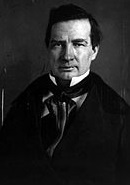



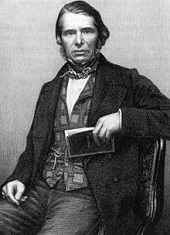










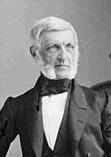

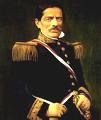


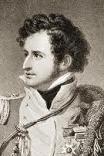


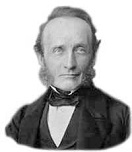









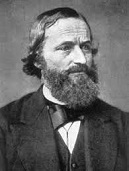
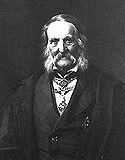

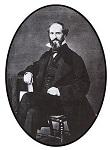







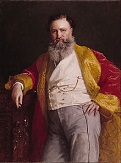

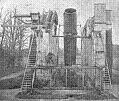
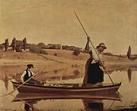
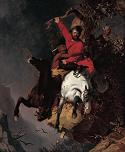
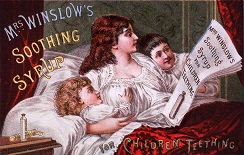

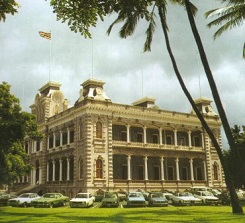

1845 Pop. of Ireland: 8M (vs. 4M in 1800, and 6M in 1850); Potato Late Blight (Phytophthora infestans) imported from the Americas infects potato crops in Ireland, which, combined with the prior reduction from four potato varieties (Black, Apple, Cup, Lumper) to one (Lumper, the least tasty, but most prolific) causes starvation to a large portion of the Irish this autumn and next winter, causing 32K to migrate to Quebec (70K more next year) in "coffin ships", dying of cholera and being buried in mass graves on shore; the avg. Irish person consumes 10 (70?) potatoes a day; there are 65K Irish potato farms of an acre or less; total potato acrage: 6M; total potato production: 15M tons/year, reduced 90% by the famine; British civil servant Sir Charles Edward Trevelyan, 1st Baronet (1807-86), in charge of famine relief slows it down because of hatred of the Irish, claiming he didn't want laissez-faire interfered with while making sure that Irish oats and grain depart on schedule for England despite the Irish starving and sometimes losing their lives trying to seize grain ships, earning their everlasting hatred esp. after he is knighted for it; PM Peel (Potato Peel?) proposes repeal of the Corn Law and importation of Indian corn to make food as cheap as possible, but his cabinet refuses to support him, so he resigns; attempts of Lord John Russell to form a Whig cabinet fail, and Peel returns with a new cabinet pledged to the repeal of the Corn Law. On Jan. 23 (Thur.) Congress decrees that all U.S. nat. elections will be held on the first Tuesday after the first Monday in Nov. of even-numbered years, with pres. elections in years divisible by four; this allows the harvest to be brought in, and nobody has to travel on Mondays, plus it doesn't violate the 30 day period before the electoral college meets on the first Wed. in Dec. On Jan. 29 Edgar Allan Poe's poem The Raven is pub. in the New York Evening Mirror, making him famous; too bad, he stinks himself up by accusing Henry Wadsworth Longfellow of plagiarism, and showing up drunk for a public appearance in Boston. On Mar. 1 outgoing Pres. Tyler signs a resolution to annex the Repub. of Texas, which passes the House by 120-98 and the Senate by 27-25, but Mexico refuses to recognize it and severs diplomatic relations; later, when he becomes a delegate at the Va. Convention approving secession in 1860, Tyler becomes the first U.S. pres. to commit treason? - Tip the Canoe Tyler Do? On Mar. 3 "Sunshine State" Florida (Fla.) is admitted as the 27th U.S. (slave) state (so that Tyler gets credit for it too). The U.S. gets a one-term pig in a polk? On Mar. 4 (Tues.) Pineville, N.C.-born Tenn.-raised math. and classics major at the U. of N.C. (Jacksonian Dem.) James Knox Polk (1795-1849), AKA "Young Hickory", "the Dark Horse President", "the Napoleon of the Stump", "Polk the Plodder", "Polk the Purposeful", "the Last Known Consequential President" (first former Speaker of the House until ?) becomes U.S. pres. #11 (until Mar. 4, 1849) in the 16th U.S. Pres. Inauguration in the East Portico of the U.S. Capitol in Washington, D.C. on a rainy day with morning thunderstorms; the last strong pre-Civil war pres.; the first inauguration reported by telegraph and shown in a newspaper illustration (in The Illustrated London News); former U.S. Sen. from Penn. (1831-3) and U.S. minister to Russia (1837-9) George Mifflin Dallas (1792-1864) becomes the 11th U.S. vice-pres. (until Mar. 4, 1849); Polk's Inaugural Address is delivered in the rain to "a large assemblage of umbrellas" (J.Q. Adams) denounces protective tariffs, nat. banks, and implied powers, and claims title to Oregon; just before his inauguration Polk presents his ever-childless (is she sarah about it?) wife Sarah Childress Polk (1803-91) with a blue-gold Polk Inaugration Fan containing portraits of all 11 U.S. presidents on one side, and the signing of the DOI on the other (shall we shag now, or shall we shag later?); on Mar. 6 Polk appoints "To the victor belong the spoils" (1832 speech) N.Y. gov. (1833-8) William Learned Marcy (1786-1857) as U.S. war secy. #21 (until Mar. 6, 1849), and Penn.-born Robert John Walker (1801-69) as U.S. treasury secy. #18 (until Mar. 6, 1849); Polk writes to Mich. Sen. Lewis Cass discussing his new admin. and jobs, becoming the first U.S. pres. to mark his private papers "private". On Mar. 4 Ky.-born Jefferson Davis (1808-89) is elected to the U.S. House of Reps after marrying Varina Anne Banks Howell (1826-1906), granddaughter of late N.J. gov. Richard Howell on Feb. 26; he then resigns in June to raise a volunteer regiment for the Mexican-Am. War, becoming a col. and later participating in the 1846 siege of Monterrey. On Mar. 6 the Mexican ambassador breaks off relations and leaves for home to protest the annexation of Texas. On Mar. 10 James Buchanan Jr. (1791-1868) of Penn. becomes U.S. secy. of state #17 (until Mar. 7, 1849), becoming the first who never marries (next Condoleeza Rice). On Apr. 10 a fire destroys a third of Pittsburgh, Penn., causing $6M-$12M in damage. On Apr. 18 the term "Jack Mormon" is coined in The Ottawa Free Trader to mean somebody who is "friendly to the Mormons, but not one himself"; it was first used to refer to sympathetic Democrats in Jackson County and/or Clay County, Mo. back in 1834?; the term evolves to mean a baptized Mormon who is lapsed but still friendly toward the LDS Church, or somebody of Mormon descent who was never baptized and/or is nonreligious, and/or a nominal Mormon who likes to sin. On Apr. 20 Gen. Ramon Castilla y Marquesado (1797-1867) (a mestizo) becomes pres. #12 of Peru (until Apr. 20, 1851), and begins reforms incl. abolition of black slavery, construction of railroads, and later, telegraph lines. A mini-Titanic 70 years early, caused by the uncanny British knack for arrogant refusal to provide backup equipment? On May 19 British Royal Navy officer Sir John Franklin (1786-1847) (lt.-gov. of Van Diemen's Land in 1837-43) begins an expedition to discover the elusive Northwest Passage in two British ships, HMS Terror (converted warship used in the War of 1812) and HMS Erebus, with a total of 129 crew; the well-financed expedition fits the ships with steel-plated hulls, locomotive-type steam engines and hot water heat, and enough food and rum for 3-5 years; too bad, the 20-ft. pack ice proves too thick, the water freezes in -100 F weather, the food cans are sealed with lead solder in them, and the 5 tons of lime juice loses its Vitamin C potency in a few years, causing scurvy; worse, there are no backup plans for escape on foot, and no sleds or hunting-fishing equipment; whalers spot the ships in Baffin Bay in the fall, the crew in good spirits as they head into the Arctic; after heading S through Peel Sound the ships get stuck in King William's Sound in Sept. 1847, find themselves in a 5-year stretch without any summer ice melting, and after three years where some resort to cannibalism, the survivors head south on foot, dying one by one of starvation and exposure; only a few graves are later discovered, along with a stone cairn containing a note recording Franklin's death on June 11, 1947; meanwhile the stupid British govt. refuses to send search expeditions until they're already dead, then disbelieves reports from Inuits that they were turning black from scurvy, frostbite, and lead poisoning, and in the "last resort" of cannibalism; after the British public is shocked by the loss, and Lady Jane Franklin spurs them on, search expeditions continue until 1859, leaving a mystery for 150 years until the pieces are put together - hello, mommy? On May 23 Spain adopts a new 1845 Spanish Constitution (#5), restoring the 1834 Estatuo Real. On June 18 a UFO is sighted over the Mediterranean Sea near Malta. In the summer the oomycete Phytophthora infestans, responsible for potato blight arrives in Antwerp, Belgium, quickly spreading through the Low Countries and W Europe. On July 4 Congress authorizes a new U.S. flag with 27 stars (design #9), incl. Fla. On July 4 (Fri.) after building it in Mar. (cost: exactly $28.12 1/2), Henry David Thoreau (1817-62) moves to smooth-as-glass Walden Pond, Mass. (in Middlesex County near Concord) to "live deliberately" in a self-built cabin on Ralph Waldo Emerson's property for 26 mo. (until Sept. 6, 1847), going on to blow his own self-reliant horn in Walden, or Life in the Woods (1854) - the RV hadn't been invented yet? On July 4 the Texas Convention of 1845, presided over by former Tex. Supreme court chief justice (1838-40) Thomas Jefferson Rusk (1803-57) accepts the offer of U.S. statehood, agreeing to pay its own war debt and reserving the option of subdividing into as many as five states; on Oct. 13 Texas voters ratify the annexation along with a new 1845 Tex. Constitution (amended in 1861, 1866, 1869, and 1876), and on Dec. 29 "Lone Star State" Texas (Tex.) is admitted as the 28th U.S. (slave) state, with a provision for dividing it into five states, but the Mexicans don't take this lying down, and border disputes cause war to loom; the U.S. claims the Rio Grande River as the boundary, while Mexico claims the Nueces River farther N; in July Pres. Polk sends Gen. "Old Rough and Ready" Zachary Taylor (1784-1850) to the Nueces River to meet Mexican troops massing there and defend the territory of the new state of Texas; the hot-to-trot independent state of Texas (Tex.) has 100K whites and 35K black slaves. In July the eastern newspaper United States Mag. and Democratic Review first mentions the term "Manifest Destiny" as a rationale for annexation of Texas by the Polk admin. in an article by editor John Louis O'Sullivan (1813-95): "The American claim is by right of our manifest destiny to overspread and to possess the whole of the continent which Providence has given us for the development of the great experiment of liberty and federative self-government entrusted to us"; "Our manifest destiny is to overspread the continent allotted by Providence for the free development of our yearly multiplying millions." In July Pres. Polk renews the U.S. offer to set the northern boundary of Oregon at the 49th parallel, but British minister Richard Pakenham rejects it, causing Polk to withdraw it and revert to claiming all of the territory up to the 54-40 line. On Oct. 10 the U.S. Naval Academy ("Canoe U.") is founded at Ft. Severn in Annapolis, Md. ("Crab Town on the Bay") by U.S. Navy secy. #17 (1845-6) George Bancroft (1800-91), with cmdr. Samuel Francis du Pont (1803-65) as dir. #1, leading seven profs. and 50 midshipmen. On Oct. 19 English Anglican prelate John Henry Newman is officially received into the Roman Catholic Church - I'm going to say yes to what? On Oct. 17 Pres. Polk writes U.S. consul Thomas O. Larkin in Monterey, Calif. that "If the people should desire to unite their destiny with ours, they would be received as brethren." On Dec. 3 the U.S. Treasury Report of 1845, prepared by treasury secy. #18 (1845-9) Robert John Walker (1801-69) becomes the most powerful attack on protectionism ever made in an official U.S. document. On Dec. 11 the Swiss Sonderbund for the protection of the seven Catholic cantons of Freiburg, Lucerne, Schwyz, Unterwalden, Uri, Valais, and Zug is formed to combat organized armed bands from the liberal cantons - now both sides are ready to rock? In Dec. Mexican pres. Joaquin Herrera is overthrown by hardliner Gen. Mariano Paredes y Arrillaga (1797-1849) - no one can do what countrywide can? In Dec. Pres. Polk gives his First Annual Message to Congress, in which he claims all of Oregon for the U.S. up to the 54-40 line, and asks for and gets permission to give a year's notice of the ending of joint occupation, reinventing the Monroe Doctrine with a statement that "The people of this continent alone have the right to decide their own destiny". In Dec. the First Anglo-Sikh War begins in Mudki, Punjab between British and Sikh forces (ends 1846). A liberal revolt in Hondora is defeated. Spanish pretender Don Carlos Maria resigns his claims in favor of his son Infante Don Carlos Luis (1818-61). A conservative coup in Nicaragua backed by troops from Salvador and Honduras ends the liberal govt., and makes Jose Leon Sandoval (1789-1854) pres. next year (until 1853) - we're so back and so ravin'? Ang Duong becomes king of Cambodia for the 2nd time (until 1860). Samuel Nelson (1793-1873) of N.Y. (Feb. 27) (until Nov. 28, 1972) and N.H.-born (Dartmouth grad.) Levi Woodbury (1789-1851) (Sept. 23) (until Sept. 4, 1851) are appointed as the 28th and 29th U.S. Supreme Court justices to replace Smith Thompson (1823-43), Henry Baldwin (1830-44) and Joseph Story (1812-45), leaving the court at a short eight members. John C. Fremont's reports on his pathfinding expeditions are pub. by Congress, exciting easterner interest; meanwhile his band of 60 frontiersmen begin engaging in "extremely mysterious" conduct, "flitting about the country with an armed body of men... regarded with suspicion by everybody (John A. Sutter); they are ordered out of the Salinas Valley by the Mexican commandant at Monterey, and head for Oregon. Josiah Quincy III retires as pres. of Harvard College (since 1829), becoming known as its "great organizer", and Whig politician Edward Everett (1794-1865) (first U.S. citizen to receive a Ph.D) succeeds him (until 1849); meanwhile Josiah Quincy Jr. (1802-82), 4th in the line of Mass. Quincys of Quincy I (b. 1709), Quincy II (b. 1744) and Quincy III (b. 1772) becomes mayor of Boston (until 1849), continuing the dynasty of education-oriented politicians, going on to found the Mass. Board of Education. David Levy Yulee (1810-86) becomes the first Jewish U.S. Sen. (D-Fla.) (1845-51, 1855-61), supporting slavery and adopting a Christian lifestyle; in 1852 Judah Benjamin becomes the first Jewish U.S. Sen. who stays Jewish. Russian Tsar Nicholas I forbids Jews to wear payot (sidelocks). La. reverts to parishes for local govt. after the counties overlaid on the old Spanish parishes after the 1803 La. Purchase prove unpopular. Aruba becomes part of the Netherlands Antilles. In 1845 Kamehameha III moves his royal court from Lahaina on Maui to Honolulu (Hawaiian "sheltered harbor", "calm port") on Oahu (modern-day pop. 350K/950K), modernizing it and turning it into a major commercial center, making 'Iolani Palace the official royal residence; he allows commoners to own land in Makawao in E Maui on the NW slope of Haleakala, causing vast sugar cane plantations and ranches to be built; Baldwin Ave. becomes a retail center. Kodaikanal (Tamil "Gift of the Forest") in Tamil Nadu, India is founded as a refuge from the sweltering plains, becoming a popular tourist destination. A group of Boston industrialists led by former U.S. Rep. (Whig-Mass.) (1835-7) Abbott Lawrence (1792-1855) found the town of Lawrence, Mass. on the Merrimack River 25 mi. NNW of Boston (modern-day pop. 80K) on land purchased from Andover and Methuen as a site for manufacturing plants; it is incorporated as a town in 1847, and as a city in 1853; it later becomes the childhood home of poet Robert Frost. Mich. moves its state capital from Detroit to Lansing. The New York Muncipal Police is founded by the N.Y. Legislature via the Municipal Police Act, recruiting 1.2K mainly fresh-off-the-boat Irish immigrants, with George Washington Matsell (1811-77) (who organized night patrols along the riverfront and lobbied for it) as police commissioner #1, becoming known for massive corruption. Prince Carl (Karl) of Solms-Braunfels (1812-75) settles New Braunfels, Tex. on the Guadalupe River with 150 families, becoming the first German emigrant colony in Tex., and the start of a planned New Germany. The Museum of Civilization is founded in Gatineau, Quebec, Canada to display aboriginal folk art. The Casa del Habano in Cuba begins manufacturing fine cigars. The White Star Line is founded by Thomas Henry Ismay, becoming known for fine ships. David Octavius Hill (1802-70) begins producing the first artistic photo portraits. Victor Hugo flops from Bonapartist to royalist back to Bonapartist, and is created a peer of France by Louis Philippe; in 1848 he goes Socialist, and becomes a rev. member of the constituent assembly. A Photo of a Clean-Shaven Abraham Lincoln (2nd earliest known photo) shows him holding an un-PC anti-slavery newspaper. The Padua-Venice railway is built, one of the first in Italy. The Portland Vase, a famous Grecian urn that was maliciously destroyed, is completely restored - after an accident you can't always trust the insurance companies to make things right? Glasgow Academy in Scotland near the Kelvin River is founded. Baylor U. in Waco, Tex. on the banks of the Brazos River is founded by the Union Baptist Assoc. after a suggestion by Ky.-born Judge Robert Emmett Bledsoe Baylor (1793-1874), becoming the first univ. in Tex. Magee College in Londonderry, Ireland is founded. The Royal College of Chemisty is founded in London, England by chemist Robert Warington (1807-67) et al., merging with the Royal School of Mines in 1852 and becoming the first constituent college of Imperial College London before closing in 1872. Alpha Sigma Phi Fraternity is founded at Yale U. by Louis Manigault (son of Charles I), Stephen Ormsby Rhea, and Horace Spangler Weiser, becoming the 10th oldest fraternity in the U.S.; members are rewarded with membership in Skull & Bones and Scroll & Key. Brunswick Corp. (originally Brunswick Manufacturing Co.) is founded on Sept. 15 in Cincinnati, Ohio by Swiss-born John Moses Brunswick (1819-86) to make carriages, expanding to billiard tables, then in 1888 to bowling equipment, popularizing the sport throughout the world, later expanding to automobile tires, phonograph records et al., introducing the fully-automated Brunswick Model A Mechanical Pinsetter for bowling alleys in 1955, reaching $3.7B annual sales by 2011. On July 14 gelatin-free Twizzlers brand licorice twists are introduced by Young and Smylie; in 1902 it merges with S.V. & F.P. Schudder and H.W. Petherbridge to form Nat Licorice Co., opening a plant in Montreal, Canada in 1908 and adopting the Twizzler brand name in 1929; in 1968 it is renamed Y&S Candies Inc.; in 1977 it is acquired by Hershey Co., who expands the line to cherry, strawberry, chocolate, and watermelon flavors, and experiments with shapes and sizes. Sports: The Knickerbocker Baseball Club of New York City, founded in 1842 by Alexander Joy Cartwright II (1820-92) (which plays at 47th Ave. and 27th St.) codifies the rules of Am. baseball, played on a diamond-shaped field with bases 90 ft. apart, three strikes per out, three outs per inning, and the first team to score 21 wins after equal numbers of innings are played by both sides; home base and batter's plate are separate, there is a fourth baseman, and pitching must be done underhand; foul balls are considered strikes; a fair or foul ball caught on the fly or the first bounce is an out, although base runners can advance on a first bounce catch; the first competitive baseball game is played next June 19, and the Knickerbockers lose to the New York Nine 23-1. The Oxford-Cambridge boat race moves from Henley-on-Thames to Putney. Happy Valley Racecourse in Hong Kong is built, holding its first horserace next Dec.; originally for the British pop. only, it causes the Chinese pop. to become interested in horseracing. Architecture: On Feb. 15 the Kroll Opera House in Berlin opens. A hotel in Boston, Mass. becomes the first U.S. bldg. to be warmed by steam heat. The Dunbrody Famine Ship is built in New Ross, County Wexford, Leinster, Ireland for the Graves family, going on to carry thousands of emigrants to North Am. Inventions: On Mar. 17 the first Rubber Band made of vulcanized rubber is patented by Stephen Perry of London, England. The first submarine cable is laid across the English Channel. Sir William George Armstrong (1810-1900) of England patents a hydraulic crane driven by a piston engine. Erastus Brigham Bigelow (1814-79) of the U.S. invents a power loom for carpet manufacturing, going on to turn Clinton, Mass. into a manufacturing center. Am. Tom Thumb builder Peter Cooper (1791-1883) patents a gelatin dessert which in 1897 is marketed as Jell-O. Joshua Heilman (1796-1848) of France patents a machine for combing cotton and wool. Am. inventor Elias Howe (1819-67) invents the modern high-speed Sewing Machine ("the queen of inventions"), with eye-pointed needle, two strands of thread, and a shuttle lock stitch process, receiving a patent next Sept. 10, and quickly revolutionizing the shoe, boot, and textile industries, dropping the labor for a man's dress shirt from 14 to 1.25 hours, and for a woman's dress from 10 to 1 hour; after failing to stir interest in the U.S., he goes to England and sells several to a corset maker, then returns to find that his idea has caught on but his patents were stolen blind, causing him to consume years in litigation with Isaac Merritt Singer (1811-75), Wheeler & Wilson, Grover & Baker, et al., making his lawyers rich, although he gets rich too; in 1856 he and the four other leaders form the Sewing Machine Combination, which controls the industry until their patents expire in 1877, making him and Singer millionaires with the first mechanical device to enter homes, helped by the hire-purchase (installment) plan introduced by Singer, who sells 43K machines a year by 1867 (5K more than #2), growing to 1M a year by the year 1900. British engineer William M'Naught invents a compound steam engine. Robert William Thomson (1822-73) of England invents the rubber pneumatic tire for bicycles, patenting it in 1847. Mrs. Winslow's Soothing Syrup begins production by Benjamin Perkins, a suspension of morphine in alcohol devised by Albion, Maine nurse midwife Mrs. Charlotte Winslow, mother of Lucy Winslow, wife of Perkins' partner Curtis; it goes on to be marketed worldwide, killing babies with morphine ODs, selling 1.5M bottles/year by 1868 at $25/bottle; in 1880 it becomes the Anglo-Am. Drug Co.; the 1906 U.S. Pure Food and Drug Act requires medicine labels to disclose their ingredients, hurting sales until the 1914 U.S. Harrison Act regulates opiates, causing morphine to be dropped from the formula and the word "Soothing" to be taken from its labels; it is not discontinued until the 1830s. Science: Dutch scientist Christoph Hendrik Diederik Buys Ballot (1817-90) first tests the brand new Doppler Effect by having an orchestra of trumpeters perform in an open railroad car as it speeds through the countryside on the Utrecht-Amsterdam line. Thomas Henry Huxley (1825-95) is admitted to the British Royal College of Surgeons, then next year becomes asst. surgeon on HMS Rattlesnake, touring Australasian waters until 1850, where he becomes an expert on the Medusa family of jellyfish and formulates the zoological class of Hydrozoa, connecting the two germ layers in the class with those in embryological stages of higher animals. German physicist Gustav Robert Kirchhoff (1824-87) proposes Kirchhoff's Circuit Laws, generalizing the work of Georg Simon Ohm and preparing the way for the work of James Clerk Maxwell; meanwhile his teacher, German physicist Franz Ernst Neumann (1798-1895) pub. a mathematical justification of the law of electromagnetic induction. Hermann Kolbe (1818-84) of Germany synthesizes acetic acid. In an effort to verify the stories in the Bible, British archeologist Sir Austen Henry Layard (1817-94) begins excavating the ruins of Nimrud (Calah) S of Mosul on the banks of the Tigris River in N Iraq, discovering the palace of Shalmaneser III (r. -859 to -824) along with the Nimrud Ivories, going on to reveal a non-Biblical civilization that existed long before the Bible was allegedly written, with the first known stories of a global flood complete with ark; in 1847 he discovers the lost ancient Assyrian capital of Nineveh N of Mosul, Iraq (destroyed in 612 B.C.E. by the Babylonians and Medes) on the Mound of Kuyunjik (ancient Mespila) (site of an Islamic shrine and cemetery), and in 1851 uncovers the lost royal Library of Assurbanipal (7th cent. B.C.E.), filled with thousands of clay tablets, incl. the Epic of Gilgamesh, sending 24K fragments to London, where they are displayed during the 1851 London Grand Exhibition and start an Assyrian fashion craze; too bad, he jumbles the tablets, making later reconstruction of their texts impossible; other discoveries made between 1842-54 by Layard and Sir Henry Creswicke Rawlinson (1810-95) of Britain, Mosul consul Paul-Emile (Paul-Émile) (Paolo Emiliano) Botta (1802-70) and Victor Place (1818-75) of France, and ethnic Assyrian Hormuzd Rassam (1826-1910) of Mosul in Nineveh, Sharrukin, and Calah slowly uncover the existence of the heretofore unknown ancient Sumerians, starting with Rawlinson independently deciphering the Behistun Stone last year; Irish clergyman Edward Hincks (1792-1866) determines that some of the Akkadian cuneiform inscriptions are in a non-Semitic language, which is later (1869) determined to be Sumerian; too bad, in 1855 Botta's successor Victor Place tries to send 235 cases of artifacts to Basra en route to Paris, but pirates ram the main barge and sink it, and only some rafts survive, the contents ending up in the Louvre and British Museum. W.A. Miller invents Spectral Analysis using colored flames, but his work is largely ignored because the alcohol flames used are too weak. Yorkshire-born Anglo-Irish astronomer William Parsons, 3rd Earl Rosse (1800-67) begins building a 72-in. telescope called the Leviathan of Parsonstown (finished 1847) in Birr Castle, Parsonstown, County Offaly, Ireland to replace his 36-in. telescope, becoming the world's largest until ?; he discovers the Whirlpool Galaxy (M51), the first spiral galaxy, and names the Crab Nebula. Friedrich Wohler extracts pure metallic element Aluminum (Al) (#13) from clay. Nonfiction: Jules Barbey d'Aurevilly (1808-89), On Dandyism and George Brummell. Ferdinand Christian Baur (1792-1860), Paulus, der Apostel Jesu Christi, Sein Leben und Wirkin, Seine Briefe und Seine Lehre (St. Paul, His Life and Work, Epistles and Writings); claims that the Acts of the Apostles was not written by the same author as the epistles to the Romans, Galatians, and Corinthians. Thomas Carlyle (1795-1881), Oliver Cromwell's Letters and Speeches. Arthur Cayley (1821-95), Theory of Linear Transformations. Auguste Comte (1798-1857), Traite d'Astronomie Populaire. Dorothea Dix (1802-87), Prisons and Prison Discipline - life is full of hassles, prison shouldn't be one of them? Frederick Douglass (1817-95), Autobiography of Frederick Douglass; bestseller by a former Southern Am. slave. Charles Dunoyer (1786-1862), De la Liberte du Travail (On the Freedom of Labor). Friedrich Engels (1820-95), The Condition of the Working Class in England (Leipzig); written in Manchester, England in Sept. 1844-Mar. 1845, where he witnessed "the most unconcealed pinnacle of social misery in our day" incl. child labor and degrading working conditions, making a fan of Karl Marx. Sarah Margaret Fuller (1810-50), On Woman in the Nineteenth Century; argues for equal rights and independence for women. Alexander von Humboldt (1769-1859), Kosmos (Cosmos) (5 vols.) (1845-62); bestseller retracing the history of science and showing its Greek origins, claiming that contemplation of the beauty of the Cosmos holistically viewed as a single entity gives one a superior outlook on life; too bad, he taints it with Romanticism?; "It was the discovery of America that planted the seed of the Cosmos." Capt. Alfred Hutton (1839-1910), Infantry Sword Exercise; becomes std. British army textbook for 50 years. James Prescott Joule (1818-89), On the Mechanical Equivalent of Heat (read before the Royal Society); gives the final result that 772 ft.-lb. of work produces enough heat to warm 1 lb. of water by 1 deg F, i.e., 4.154 Joules per calorie. Soren Kierkegaard (1813-55), Stages on Life's Way (Stadier paa Livetsvej); criticized by Peder Ludvig Moller, causing him to respond with Activity of a Traveling Esthetician and Dialectical Result of a Literary Police Action, which backfire, causing Moller to attack him personally in The Corsair, making fun of his many oddities, resulting in hounding on the streets, making him bitter and causing him to begin attacking "Christendom" (the Danish state church). Heinrich Laube (1806-84), Dramatische Werke (10 vols.) (1845-75). Karl Marx (1818-83) and Friedrich Engels (1820-95), Holy Family. William Hamilton Maxwell (1792-1850), History of the Irish Rebellion. Augustus De Morgan (1806-71), The Globes, Celestial and Terrestrial. Gen. Sir William Francis Patrick Napier (1785-1860), The Conquest of Scinde; written after his brother Gen. Sir Charles James Napier (1782-1853), CIC of British troops in India conquers Sindh in 1843. Mordecai Manuel Noah (1785-1851), Discourse on the Restoration of the Jews; calls on Americans to take the lead in helping Jews return to Israel. Lady Hester Stanhope (1776-1839), Memoirs of the Lady Hester Stanhope as Related by Herself in Conversations With her Physician Dr. Meryon (posth.). Louise Adolphe Thiers, Histoire du Consultat et de l'Empire. Wilhelm Weitling (1808-71), Der Evangelium eines Armen Sunders (The Poor Sinner's Gospel); traces Communism to 1st cent. Christianity, impressing Jewish brain man Karl Marx. Music: W.H. Fry (1813-64), Leonora (opera) (Philadelphia). Albert Lortzing (1801-51), Undine (opera) (Magdeburg). Giuseppe Verdi (1813-1901), I Due Foscari (opera) (Nov. 3) (Teatro Argentina, Rome); Alzira (opera) (Aug. 12) (Teatro San Carlo, Naples); based on Voltaire's play "Alzire, ou les Americains". Richard Wagner (1813-83), Tannhauser (Tannhäuser) und der Sangerkrieg (Sängerkrieg) auf Wartburg (Tannhauser and the Singers Contest in Wartburg) (opera) (Royal Theater, Dresden) (Oct. 19); German troubador (Minnesanger) is lured by Venus to Venusberg beneath a mountain in Thuringia, leaving his loving Elizabeth; when he breaks away from her spell he goes to Rome to unsuccessfully seek the pope's forgiveness, then returns to find that Elizabeth has died of despair, after which he dies. Art: George Caleb Bingham, Fur Traders Descending the Missouri. Thomas Couture (1815-79), Love of Money. Charles Deas (1818-67), The Death Struggle; white man vs. Indian. Jean Auguste Dominique Ingres (1780-1867), La Comtesse d'Haussonville. Jean Louis Ernest Meissonier (1815-91), The Guard Room; Young Man Viewing Drawings; A Game of Piquet. William Sidney Mount (1807-68), Eel Spearing at Setauket. Plays: Dion Boucicault (1820-90), Old Heads and Young Hearts. Alexandre Dumas pere (1802-70), La Reine Margot. Johan Ludvig Heiberg (1791-1860), The Nut Crackers; gets him a job as dir. of the Nat. Theater in Copenhagen (1847-54). Henrik Hertz, King Rene's Daughter. Heinrich Laube, Monaldeschi (tragedy). Poetry: Janos Arany (1817-82), The Lost Constitution (satire); written by a notary in Salonta, Hungary, exposing the absurdity of local officials, and wins a prize, kicking off his poetry career. Robert Browning (1812-89), Dramatic Romances and Lyrics; incl. The Laboratory, How They Brought the Good News from Ghent to Aix, The Bishop Orders His tomb at Saint Praxed's Church. Henry Wadsworth Longfellow (1807-82), The Belfry of Bruges and Other Poems; The Rainy Day; "Into each life some rain must fall"; written at the Wadsworth House in Portland, Maine (built 1785). James Russell Lowell (1819-91), A Year's Life (debut); dedicated to his future wife. Edgar Allan Poe (1809-49), The Raven and Other Poems; "Once upon a midnight dreary,/ as I pondered weak and weary"; Lenore? Johan Sebastian Welhaven (1807-3), New Poems. Novels: Honore de Balzac (1799-1850), Les Paysans (1845-55). Benjamin Disraeli (1804-81), Sybil, or The Two Nations. Alexandre Dumas pere (1802-70), Vingt ans Apres (Twenty Years After); sequel to "The Count of Monte Cristo"; Johnson Jones Hooper, Some Adventures of Captain Simon Suggs; his motto is: "It is good to be shifty in a new country." Charles James Lever (1806-72), The O'Donoghue; Arthur O'Leary. Prosper Merimee (1803-70), Carmen; about a cigarette girl from Seville in a factory in Andalusia who seduces govt. official Don Jose t o help her smuggler family, causing him to go bad; at the end she hurls her ring at him, and he stabs her; based on Maria Manuela Kirkpatrick, Countess Montijo (1794-1879) of Spain, whom he met in 1830, coaching her daughter Eugenie during her courtship by Napoleon III while opposed to their marriage; when she becomes empress Eugenie in 1853, he is made a senator; in 1875 the opera by Georges Bizet debuts. Edgar Allan Poe (1809-49), Tales; The Facts in the Case of M. Valdemar; based on attending the mesmerism lectures of Andrew Jackson Davis (1826-1910). George Sand (1804-76), Le Meunier d'Angilbault. Jules Sandeau (1811-83), Catherine. Daniel Stern (Comtesse d'Agoult) (1805-76), Nelida (Nélida). Births: Italian archeologist Rodolfo Amedeo (Amadeo) Lanciani (d. 1929) on Jan. 2 in Rome. Russian foreign minister (1900-6) (gay?) Count Vladimir Nikolayevich Lamsdorf (d. 1907) on Jan. 6 (Dec. 25 Old Style) in St. Petersburg. Bavarian king (last) (1913-18) Ludwig III (Ludwig Luitpold Josef Maria Aloys Alfried) (d. 1921) on Jan. 7 in Munich; eldest son of prince Luitpold and Italian-speaking Archduchess Augusta of Austria (daughter of Grand Duke Leopold II of Tuscany); grandson of Ludwig I; direct descendant of Louis XIV of France and William I the Conqueror of Britain; father of Crown Prince Rupprecht (1869-1955). British viceroy of India (1880-3) and gov.-gen. of Canada #5 (1883-8) Henry Charles Keith Petty-Fitzmaurice, 5th Marquis of Lansdowne, 6th Earl of Kerry (d. 1927) on Jan. 14 in London. Am. rear adm. (capt. of the USS Maine) Charles Dwight Sigsbee (d. 1923) on Jan. 16 in Albany, N.Y. Am. automobile pioneer Thomas Buckland Jeffery (d. 1910) on Feb. 5 in Stoke, Devon, England; emigrates to the U.S. in 1863; starts out making telescopes, then switches to bicycles, finally automobiles. Irish political economist Francis Ysidro Edgeworth (d. 1926) on Feb. 8 in Edgeworthstown, County Lonford; Catalonian mother; educated at Trinity College, Dublin, and Balliol College, Oxford U. Am. Johnson & Johnson co-founder Robert Wood Johnson I (d. 1910) on Feb. 15 in Carbondale, Penn.; brother of Edward Mean Johnson (1952-) and James Wood Johnson (1856-); father of Robert Wood Johnson II (1893-1968). Am. Repub. politician-statesman, U.S. war secy. #41 (1899-1904), and secy. of state #38 (1905-9) Elihu Root (d. 1937) on Feb. 15 in Clinton, N.Y.; educated at Hamilton College. Am. "Tent Life in Siberia" explorer George Kennan (d. 1924) on Feb. 16 in Norwalk, Ohio; cousin twice removed of George Frost Kennan (1904-2005). German transfinite mathematician Georg Ferdinand Ludwig Philipp Cantor (d. 1918) on Mar. 3 in St. Petersburg, Russia; educated at the U. of Berlin, and U. of Gottingen - it's just my imagination running away with me? German botanist Wilhelm Friedrich Philipp Pfeffer (d. 1920) on Mar. 9 in Grebenstein. Russian Romanov tsar #17 (1881-94) Alexander III Alexandrovich (d. 1894) on Mar. 10 in St. Petersburg; 2nd son of Alexander II (1818-81) and Princess Marie of Hesse and by Rhine (Maria Alexandrovna) (1824-80); grand-nephew of Alexander I (1777-1825); father of Nicholas II (1868-1918); known for his great size and strength and peasant roughness. Am. Dem. Okla. gov. #3 (1893-7) William Cary Renfrow (d. 1922) on Mar. 15 in Smithfield, N.C. German X-ray physicist Wilhelm Conrad (Konrad) Roentgen (Röntgen) (d. 1923) on Mar. 27 in Lennep, Prussia; educated at the U. of Zurich. Am. Steamboat Springs founder James Harvey Crawford (d. 1930) on Mar. 30 near Sedalia, Mo. French diplomat Jules-Martin Cambon (d. 1935) on Apr. 5 in Paris. Austrian conductor William Gericke (d. 1925) on Apr. 18 in Schwanberg. Swiss "Olympic Spring" poet Carl Friedrich Georg Spitteler (d. 1924) on Apr. 24 in Liestal, Baselland Scottish surgeon ("Father of Gynecology") Robert Lawson Tait (d. 1899) on May 1 in Edinburgh; collaborator of J. Marion Sims (1813-83). English mathematician William Kingdon Clifford (d. 1879) on May 4. French composer Gabriel Faure (Fauré) (d. 1924) on May 12 in Pamiers; teacher of Maurice Ravel (1875-1937). Russian microbiologist (Jewish) Ilya Ilyich "Elie" Mechnikov (d. 1916) on May 16 near Kharkov (Kharkiv), Ukraine; mother is Jewish and father is Russian Imperial Guard officer; discoverer of phagocytosis (microbes that eat other microbes); both wives die from disease, causing him to attempt suicide 2x; meanwhile he drinks sour milk every day for his health. Am. lt. gen. Arthur MacArthur Jr. (d. 1912) on June 2 in Mass.; father of Douglas MacArthur (1880-1964). Hungarian violinist-conductor-composer (mainly in Russia) Leopold Auer (d. 1930) on June 7 in Veszprem. Irish "Hurrish" writer (lesbian) Emily Lawless (d. 1913) on June 17 in Ardclouch, County Kildare. English art-lit. critic Sir Sidney Colvin (d. 1927) on June 18 in Norwood; educated at Trinity College, Cambridge U.; makes friends with Robert Louis Stevenson in 1873. French protozoan-hunting physician-pathologist Charles Louis Alphonse Laveran (d. 1922) on June 18 in Paris. Am. Civil War Confed. soldier Thomas C. "Tom" Dula (d. 1868) on June 22 in Wikes County, N.C. Hungarian painter-politician Pal Szinyei Merse (Paul von Szinyei-Merse) (d. 1920) on July 4 in Szinyeujfalu (Chminianska Nova Ves, Slovakia). English geologist Sir George Howard Darwin (d. 1912) on July 9 in Down House, Down, Kent; 2nd son of Charles Darwin (1809-82) and Emma Darwin (1808-96); brother of Sir Francis Darwin (1848-1925); educated at Trinity College, Cambridge U.; knighted in 1905. Scottish Liberal MP-sculptor (gay) Lord Ronald Charles Gower (Sutherland-Leveson-Gower) (d. 1916) on Aug. 2; educated at Eton College, and Trinity College, Cambridge U.; lover of Frank Hird; "Frank may be seen, but not Hird." (Oscar Wilde). Am. Unity Church co-founder Mary Caroline "Myrtle" Page Fillmore (d. 1931) on Aug. 6 in Pagetown, Ohio; wife (1881-) of Charles Sherlock Fillmore (1854-1948). English children's artist Walter Crane (d. 1915) on Aug. 15 in Liverpool. French physicist-inventor (Jewish) Jonas Ferdinand Gabriel Lippmann (d. 1921) on Aug. 16 in Bonnevoie, Luxembourg. French "Famous Benefactor" Zionist banker (Jewish) Baron Edmond Benjamin James de Rothschild (d. 1934) on Aug. 19 in Boulogne-sur-Seine, Paris. Bavarian "mad king" (1864-86) (bi) Ludwig II (Marchenkoenig) (Fairy-Tale King) (Swan King) (d. 1886) on Aug. 25 in Nymphenburg Castle, Munich; eldest son of Maximilian II (1811-64) and Princess Marie of Prussia (1825-89). French scientist Jean Maurice Emile Baudot (d. 1903) on Sept. 11 in Magneux, Haute-Marne; inventor of Internat. Telegraph Code No. 1. Am. brewing instructor John Ewald Siebel (d. 1919) on Sept. 17 near Wermelskirchen, Dusseldorf; educated at the U. of Berlin; emigrates to the U.S. in 1866. English philologist-Assyriolgist Rev. Archibald Henry Sayce (d. 1933) on Sept. 25 in Shirehampton, Bristol; educated at Queen's College, Oxford U. English astronomer Sir William Henry Mahoney Christie (d. 1922) on Oct. 1; educated at King's College, London, and Trinity College, Cambridge U. German caricaturist Adam Adolf Oberlander (Oberländer) (d. 1923) on Oct. 1 in Ratisbon. Italian poet Olindo Guerrini (d. 1916) on Oct. 14 in Forli; grows up in Sant'Alberto, Ravenna; writes under aliases Lorenzo Stecchetti, Argia Sbolenfi, Marco Balossardi, Giovanni Dareni, Pulinera, Bepi, and Mercutio. Indian lt. gen. and maharaja (1902-11) Prap Singh of Idar (d. 1922) on Oct. 22. English "Notes on a Cellar-Book" lit. critic-journalist and wine connoisseur George Edward Bateman Saintsbury (d. 1933) on Oct. 23 in Lottery Hall, Southampton; educated at King's College School, and Merton College, Oxford U. Portuguese realist novelist Jose Maria Eca de Queiroz (José Maria de Eça de Queirós) (d. 1900) on Nov. 25 in Povoa de Varzim; educated at the U. of Coimbra. English chemist and yachtsman Sir Thomas Edward Thorpe (d. 1925) on Dec. 8 in Harphurey (near Manchester); educated at the U. of Heidelberg. English jurist-historian Sir Frederick Pollock, 3rd Baronet (d. 1937) on Dec. 10; educated at Eton College, and Trinity College, Cambridge U.; brother of Walter Herries Pollock; (1850-1926); father of Frederick John Pollock (1878-1963). Greek king (1863-1913) George I (d. 1913) on Dec. 24; 2nd son of Christian IX of Denmark (1818-1906) and Louise of Hesse (1817-98); brother of Frederick VIII of Denmark (1843-1912), Queen Alexandra of England (1844-1925), Queen Maria Fyodorovna of Russia (1847-1928), Princess Thyra of Denmark (1853-1933), and Prince Valdemar of Denmark (1858-1939). Am. Seattle Daily Times publisher-atty. "Col." Alden J. Blethen (d. 1915) on Dec. 27 in Knox County, Maine; father of Alen J. Blethen (1896-1915). Spanish king (1870-3) Amadeus (Amadeo) I (d. 1890) (prince of Savoy); 2nd son of Victor Emmanuel II of Italy. English painter Charles Burton Barber (d. 1894) in Greater Yarmouth; known for paintings of children and their pets. Am. "Mephistopheles in Faust" actor Lewis Morrison (Morris W. Morris) (d. 1906) in Jamaica, West Indies. U.S. chief justice #9 (1910-21) and assoc. justice #55 (1894-1910) (Roman Catholic) Edward Douglass White Jr. (d. 1921) in Thibodaux, Lafourche Parish, La.; maternal relative of the Lee family of Va.; educated at Georgetown U., and U. of La. (Tulane U.); Confed. soldier in the U.S. Civil War. German art historian Wilhelm von Bode (Arnold William Bode) (d. 1929) on Dec. 10 in Calvorde; knighted in 1914; shifts the center of the German art world from Munich and Dresden to Berlin. Serbian PM (1891-2, 1904-5, 1906-8, 1909-11, 1912-18, 1921-4, 1924-6) Nikola P. Pasic (Pashitch) (Pschitch) (d. 1926) on Dec. 18 in Veliki Izvor (near Zajecar). Am. outlaw William "Curly Bill" Brocius (Brocious) (d. 1882) in Crawfordsville, Ind. Canadian Cree war chief Wandering Spirit (Kapapamahchakwew, Papamahchakwayo, Esprit Errant) (d. 1885). Romanian "Waves of the Danube" composer Ion Ivanovici (d. 1902) in Timisoara. Am. Wild West madame Mattie Silks (Martha A. Ready) (d. 1929) in Kan., Terra Haute, Ind., or Buffalo, N.Y. Am. frontiersman (writer?) Richard W. "Deadwood Dick" Clarke (d. 1930) in Yorkshire, England. Deaths: German field marshal Count Heinrich von Bellegarde (b. 1756) on July 22 in Vienna. British statesman and PM Charles, 2nd earl Grey (b. 1764) on July 17. Dutch philosopher Johannes Kinker (b. 1764). U.S. pres. #7 (1829-37) "Old Hickory" Andrew "Andy" Jackson (b. 1767) at the Hermitage in Tenn. on June 8 (6 p.m.); tells his slaves he'll see them in heaven?; spent his last years worrying about low cotton prices? Swiss scientist Nicolas de Saussure (b. 1767) on Apr. 18. German Romantic poet-critic August Wilhelm von Schlegel (b. 1767) on May 12 in Bonn. English Pears soap inventor Andrew Pears (b. 1770) in London. English divine Sydney Smith (b. 1771) on Feb. 22 in London. Am. architect Asher Benjamin (b. 1773) on July 26 in Springfield, Mass. Am. apple planter Johnny Appleseed (b. 1774) on Mar. 18. U.S. Supreme Court justice (1812-45) Joseph Story (b. 1779) on Sept. 10 in Cambridge, Mass. Am. reaper inventor Robert Hall McCormick (b. 1780) on July 4. English statesman John Charles Spencer, 3rd earl Spencer (Lord Althorp) (b. 1782). English MP Sir Foxwell Buxton, 1st baronet (b. 1786) on Feb. 19. Swedish chemist Nils Gabriel Sefstrom (b. 1787) on Nov. 30 in Stockholm. English humorist Rev. Richard Harris Barham (b. 1788) on June 17 in London. English scientist John Frederic Daniell (b. 1790) on Mar. 13 in London (apoplexy during a meeting of the Royal Society). English boxer "Gentleman" John Jackson (b. 1769) on Oct. 7 in London. English prison reformer Elizabeth Gurney Fry (b. 1780). Argentine pres. (1826-7) Bernardino Rivadavia (b. 1780) on Sept. 2 in Cadiz, Spain. Venezuelan gen. Rafael Urdaneta (b. 1788) on Aug. 23 in Paris, France (exile). Am. mayor #1 of San Antonio, Tex. (1837-8, 1840-1, 1842-4) John Wiliam Smith (b. 1792) on Jan. 12. Prussian-born English Anglican bishop of Jerusalem (1842-5) Michael Solomon Alexander (b. 1799) on Nov. 23 in Belbeis, Egypt; dies en route to England. English poet Thomas Hood (b. 1799) on May 3 in London: "Don't go to weep upon my grave,/ And think that there I be./ They haven't left an atom there/ Of my anatomie"; "There are three things which the public will always clamor for sooner or later: namely, Novelty, novelty, novelty." Norwegian writer Henrik Wergeland (b. 1808) on July 12 in Christiania - the good die young? Irish Young Ireland leader Thomas Osborne Davis (b. 1814) on Sept. 16 in Dublin (scarlet rever). Afghan emir (1842-5) Mohammad Akbar Khan (b. 1816) in Jalalabad.
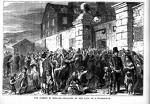
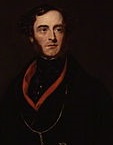











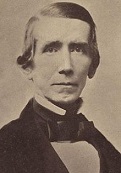




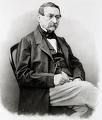


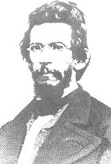




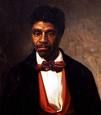


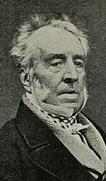

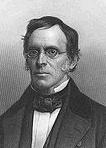
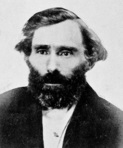



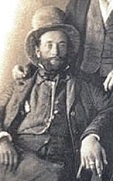



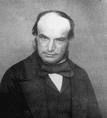


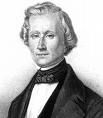








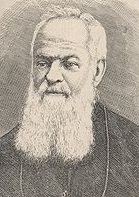
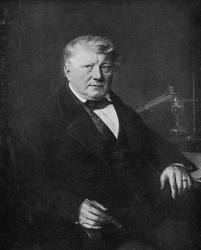
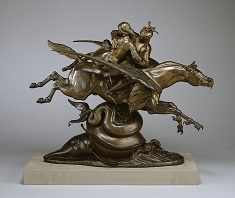


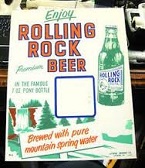
1846 At the start of the year there are about 800 Americans in Calif., plus 8K-12K Californios of Spanish descent. A census in Paraguay gives the pop. as 238,862, plus 20K nomadic Indians; 20% of all households are headed by women caused by peasants and militiamen being forced to work for the state. Famine strikes Europe (until 1847); an economic depression caused by the potato blight (Phytophthora infestans) and other crop failures strikes France (until 1847); all of this creates good hunting for revolutionary recruiters; the Great Irish Potato Famine (Hunger) in Ireland (1845-9) results from the total failure of the potato crop after an exceptionally warm winter (Jan.-Feb.), halving the 8M pop. by 1848, with 1847 (Black '47) being the worst; about 1M die and another 1M emigrate, with the eager assistance of the Roman Catholic-hating English landlords, esp. in County Cork, who forcibly remove whole towns and villages of "disaffected" tenants, incl. Lord Kingston of Fermoy, Stephen Moore, 3rd Earl Mount Cashell (Lord Kilworth) (1792-1883), Lord Doneraile, and Baron Ennismore (Earl of Listowel), packing them off in ships for Quebec, where most die from starvation, smallpox, and typhus on the journey, and those who arrive have to clear forest and build log cabins when they have never used an axe before; others, mainly from Munster and Connacht become navvies working on canals and railroads; Ottoman sultan (1839-61) Abdul Mecid I tries to send 10K sterling to the Irish, but Queen Victoria tells him to only send 1K because she sent only 2K, which doesn't stop him from sending three ships of food to Drogheda - Jesus what? In 1846-7 the District of Columbia Recession sees Congress return a 31 sq. mi. portion of its original 100 sq. mi. 1790 land grant W of the Potomac River to Va., incl. the city of Alexandria and Alexandria County, leaving 68.34 sq. mi. incl. 0.0236 sq. mi. on the W side of the Potomac River called Columbia Island. On Jan. 20 Venezuelan pres. (since 1830) Jose Antonio Paez steps down in favor of Jose Tadeo Monagas (1784-1868) of the Liberal Party (until Feb. 5, 1851), who goes on to abolish capital punishment but sink into nepotism and abuse of power, becoming one of the country's most unpopular presidents. On Jan. 28 using the excuse of ending prolonged internal disorder, the well-ordered British (East India Co.) send the British 16th Lancers under Sir Harry Smith (Henry George Wakelyn Smith) (1787-1860), who defeat the Sikhs under Ranjodh Singh Majithia (-1872) at the Battle of Aliwal, followed on Feb. 10 by the decisive Battle of Sobraon, after which on Mar. 9 they sign Treaty of Lahore, annexing Punjab; they sell Kashmir to Gulab (Ghulab) Singh (1792-1857) of Jammu, who titles himself maharaja (prince) and establishes a permanent tyrannical princedom - for your career starter kit call 1-800-1846-RAJA? In Jan. Pres. Polk orders Gen. Zachary Taylor to lead 4K troops to claim the Rio Grande as the border of Texas, and build Ft. Texas across from the Mexican city of Matamoros at the end of the Rio Grande on the Gulf of Mexico; the U.S. offers to buy a large part of N Mexico, hoping to establish a Pacific port at San Francisco Bay, but Mexico rejects the offer. In Jan. Welsh-born Am. immigrant civil engineer John Plumbe Jr. takes the first photo of the White House. On Feb. 5 Bucknell U. (originally the U. at Lewisburg) is founded in Lewisburg, Penn. by a group of Baptists, and chartered by the Penn. Gen. Assembly. Don't you want me baby, oh-oh-oh? On Feb. 10 1.6K Mormons led by Brigham Young begin their Mormon Exodus (Migration) to the Mexican-controlled Am. West, crossing the frozen Mississippi River in subzero temperatures to a temporary refuge in Sugar Grove, Iowa, sending out a recon team to plan the route across Iowa to the first major stopping point opposite Council Bluffs, Neb. on the Missouri River, digging wells along the way and planting corn; by fall Winter Quarters in modern-day North Omaha, Neb. on the Missouri River is home to 12K Mormons, who suffer a starvation and cholera epidemic that kills 600; in order to get some of their men to the West Coast cost-free, they form the Mormon Battalion of 500 volunteers from Iowa to fight in the Mexican War, and it leaves Council Bluffs on July 20, with Brigham Young giving a speech predicting that none of them will be killed in battle and their only fighting will be with wild beasts; on Dec. 1 the Battle of the Bulls in SE Ariz. results when men hunting for fresh meat cause a herd of angry bulls from an abandoned ranchero to charge their wagons, goring a mule to death and knocking two men down before several are killed to furnish them with fresh but tough meat; the battalion reaches Calif. too late to help with the war, and is disbanded in July 1847, so the prophet proves correct? - vision works, why pay more? On Feb. 12 (Washington's 114th Birthday) the Liberty Bell in Philly cracks so badly that it becomes unringable - the Wipeout Zone just got a little bit better looking? On Feb. 19 the Texas state govt. is formally installed in Austin, Tex., with Lincolnton, N.C.-born atty. James Pinckney Henderson (8108-58) as gov. #1 (until Dec. 21, 1847); on Feb. 21 Sam Houston becomes the first U.S. sen. from Tex. (until Mar. 4, 1859), and goes to Washington, D.C., counseling Pres. Polk against war with Mexico, lobbying for peaceful purchase of western lands, and attending a Baptist church; in Apr. after the Mexican-Am. War breaks out, Henderson takes a leave of absence to command a troop of Texas Rangers with the rank of maj. gen. under Gen. Zachary Taylor. On Feb. 21 emperor (since 1817) Ninko (b. 1800) dies, and on Mar. 10 his 4th son Osahito becomes Komei (1831-67), Japanese emperor #121 (until Jan. 30, 1867), the last Kyoto emperor, and the last pre-modern (not messed up by the West) emperor, opposed to opening Japan up. On Feb. 21 female crusader Sarah George Bagley (1806-83), founder of the Lowell Female Reform Assoc. in 1844, ed. of Voice of Industry in 1845, and crusader for the 10-hour workday becomes the first female telegrapher as she takes charge of the new office in Lowell, Mass.; too bad, she suddenly drops out in 1847 and returns to working in the mills in 1848. On Mar. 4 the Statute of Italy, a new constitution for the kingdom of Italy is promulgated, and the king appoints Count Cesare Balbo (1789-1853) as PM, who begins preparing to kick the Austrians out of N Italy. In Mar. U.S. ambassador John Slidell gives up on his mission to negotiate peace in Mexico City; meanwhile in Mar. Gen. Zachary Taylor uses the Santa Fe Trail and crosses the Nueces River into the disputed area between it and the Rio Grande River near U.S. Ft. Brown (modern day Brownsville, Tex.) (modern-day pop. 183K/420K) (founded in Apr.), the Mexicans cross the Rio Grande into U.S. territory in Apr. under Gen. Mariano Arista (1802-55); on Apr. 25 the Mexicans draw first blood at the Battle of Rancho de Carricitos, killing 11 U.S. soldiers, wounding five, and taking POWs; on May 8 Taylor defeats the Mexicans under Gen. Arista at the Battle of Palo Alto, then again on May 9 at the Battle of Resaca de la Palma near Fort Brown, forcing them back over the Rio Grande to Matamoros on the Gulf of Mexico; Ft. Brown cmdr. Maj. Jacob Brown, is KIA; on May 9 Pres. Polk labels these actions as acts of Mexican aggression and gets the cabinet's approval for his May 11 War Message to Congress, and on May 13 the U.S. declares war on Mexico, beginning the U.S.-Mexican (Mexican-U.S.) (Mexican-Am.) War (ends 1848); the House authorizes a call for 50K volunteers and a war appropriation of $10M, although 27 members vote for an amendment stating that U.S. troops are not approved to move below the Rio Grande River; politically ambitious Whig Gen. "Fuss and Feathers" Winfield Scott (1786-1866) (CIC) of the U.S. army in 1841-61) quarrels with Pres. Polk's secy. of war, causing Polk to withdraw his appointment as cmdr. for the Rio Grande front; when Scott says that he received a letter from the secy. as he "sat down to take a hasty plate of soup", he becomes known as Marshal Tureen; on May 18 Taylor's forces enter Matamoros to find that the demoralized Mexicans have retreated to Monterrey, further inland; Polk makes him Taylor the new cmdr. for the conquest of Mexico, figuring that the homely bow-legged old fart will not become a political threat later; waiting for reinforcements and supplies, Taylor stalls in Matamoros while New Mexico and Calif. are all but taken by his compatriots; leaving in Sept., Taylor occupies Monterrey on Sept. 20-24, followed by Saltillo on Nov. 16; jealous of Taylor's growing popularity, in Nov. Pres. Polk appoints Gen. Winfield Scott as the new CIC of U.S. forces in Mexico, and sends him to open a new front at Veracruz (Vera Cruz) on the Gulf of Mexico E of Mexico City, with the goal of capturing the latter; Scott's forces initially land in Matamoros, then wait at Tampico for Taylor's forces to link up; meanwhile, in Aug. tricky Santa Anna, living in exile in Havana convinces Polk that he could negotiate a settlement if Washington would pay well for new territories acquired, and is allowed to pass through the U.S. blockade into Veracruz; he then turns on the U.S., becomes pres. of Mexico, and gains command of the Mexican army. On May 11 the U. of Buffalo (later the State U. of New York at Buffalo) is founded by Millard Fillmore (1800-74) et al. On May 22 the New York News Agency is founded by Hale and Burnett after six newspapers decide to combine to share telegraphy costs; in 1856 it becomes the Associated Press (AP), going on to be carried by 1.7K newspapers and 5K TV and radio stations by 2007, and operate 200 news bureaus in 100 countries along with a photo library containing 10M images; in 1993 it passes its rival UPI. In May the Society of Friends to Farmers (Bondevernnernes Selskab) is founded in Denmark as a coalition of farmers and liberals to lobby the king for a liberal constitution. Mexico pinned down, the time is ripe for the liberation of "mongrel" California by eager gringos? On June 1 John C. Fremont and his 55 men leave St. Louis searching for the source of the Arkansas River, and when they don't find it, they hastily travel to the Sacramento Valley in Calif. next Jan., trying to stur up a war; in Sonoma after hearing of the U.S.-Mexican War a group of gringo Americans capture Mexican Gen. Mariano Guadalupe Vallejo (1807-90) on June 14 and declare the independent Calif. Repub., making up a flag with a Calif. grizzly and star painted on white cloth; the Bear Flag Revolt begins; by late June Fremont endorses the new repub. and sets out for Monterey, but before he arrives the revolt ends as the commodore of the U.S. Pacific Fleet sends a shore party to raise the Stars and Stripes and proclaim Calif. as part of the U.S.; in July Robert F. Stockton becomes the new commodore and prepares to invade S Calif., enlisting Fremont's band as the Calif. Battalion and promoting him to maj.; the Mexican loyalists flee, and on Aug. 17 Stockton declares himself gov. of Calif., with Fremont as military cmdr. in the N. Having California in the bag, Oregon country shuffles to the top of the U.S. list? In May despite cries of "fifty-four forty or fight", and "all of Oregon or none", Pres. Polk gives the British a required one-year notice that the joint-occupancy agreement of Oregon is being terminated; Britain decides to give up the fight, and on June 15 Pres. Polk's secy. of state James Buchanan and British envoy Richard Pakenham sign the Oregon Treaty in Washington, D.C. setting the S border of Canada at the 49th parallel from the Rockies to the Pacific, with Vancouver Island remaining British, along with promises not to interfere with the U.S.-Mexican War; the Senate ratifies it on June 18, with the bitter-end expansionists outvoted by Southerners more interested in Texas, and northerners more interested in preserving British trade. Christmastime is here on Spring Street? On June 9 Pope (since 1831) Gregory XVI (b. 1765) dies, and on June 16 young (54-y.-o.) Giovanni Maria Mastai-Ferretti (the liberal candidate) is elected Pope (#255) Pius IX (1792-1878) (until Feb. 7, 1878), the last pope under 60 until John Paul II in 1978, proclaiming amnesty for political prisoners and refugees, relaxing censorship, and creating an advisory council of laymen; Italian liberals rejoice, think he's their man, and organize demonstrations demanding a new civil guard as a first step towards resistance against the Austrians; too bad, he's got a long reign ahead of him, and ends up being just like his previous papa? On June 29 British PM (since Aug. 30, 1841) Robert Peel resigns, and on June 30 Robert Peel is succeeded as PM by liberal Whig leader "Little Giant" John "Languid Johnny" Russell, 1st Earl Russell (1792-1878) (grandfather of philosopher Bertrand Russell) (until Feb. 23, 1852); Lord Stanley becomes leader of the Conservative Party, with Bentinck as their leader in the House of Commons, who calls for a major railroad construction program in Ireland to alleviate the famine; now both the Tories (Conservatives) and Whigs (Liberals and Radicals) are divided, but it takes until 1868 to realign them into the Liberal and Conservative Parties, all cabinets in the meantime being weak and patched together from both parties; the Peelites are absorbed by the Liberal Party in 1859; William Gladstone becomes a leading Peelite; Lord Palmerston, known as Lord Cupid for his womanizing becomes foreign minister again (until 1851), getting into a war with the queen, who wants foreign policy to be her (hubby's?) prerogative. In June the First Missouri Mounted Infantry under Col. Alexander William Doniphan (1808-87) begin spending their entire 1-year enlistment marching 3.5K mi. over barren wasteland from Ft. Leavenworth to El Paso then to Matamoros, along the way pacifying hostile Navajos, defeating the Mexicans in the Battle of Brazito on Dec. 25 and the Battle of Sacramento (Feb. 28, 1847), and capturing the city of Chihuahua 400 mi. S of El Paso; they are then discharged at New Orleans in 1847. In summer after making a Grand Tour of Europe in 1843, Harvard-educated historian Francis "Frank" Parkman (1823-93) begins travelling in Europe and the Rocky Mts. in North Am., hunting buffalo with the Oglala Sioux, ending up ruining his health, not to mention his weak eyes and neurological condition that makes him go blind on and off, which doesn't stop him from become the #1 historian on early French Am. On July 3 Boston, Mass.-born abolitionist Wendell Phillips (1811-84) pub. an article in The Liberator calling for female suffrage and property rights; in 1840 he leads an unsuccessful effort to have women delegates seated at the World Anti-Slavery Convention in London, England; in 1849-50 he assists Lucy Stone in the first woman suffrage campaign in Mass; in 1851 he gives the speech "Freedom for Woman", which becomes a popular tract. On July 4 Congress starts a streak of Manifest Destiny by authorizing a new U.S. flag with 28 stars (design #10), which incl. Tex Tex Texas - yeehaw? On July 7 units of the U.S. Navy occupy Monterey, Calif., which becomes the seat of the U.S. military govt. until the admission of Calif. into the Union in 1850; on July 12 the U.S. flag is first raised at Sutter's Fort in New Helvetia (Sacramento), and saluted with cannon from the abandoned Russian Ft. Ross. The massive American gringo land grab permanently opens up the black slavery wound? On Aug. 8 (noon) Pres. Polk sends Congress a hurried request for $2M to expedite peace negotiations with Mexico; instead of being rubber-stamped by the House, pro-war Penn. Dem. David Wilmot stands up, saying that if free soil should be acquired from Mexico, "God forbid that we should be the means of planting this institution [slavery] upon it", and introducing the Wilmot Proviso to prevent slavery in any territory acquired from Mexico; it passes the House next Feb. 17 but fails in the Senate, is reintroduced next year and rejected again, and later offered unsuccessfully as an amendment to many bills, but the issue is now out of the box, and debate rages on over the extension of slavery into the western territories. On Aug. 10 the Smithsonian Institution is chartered by Congress in Washington, D.C. "for the increase and diffusion of knowledge", named after English scientist James Smithson (1765-1829), whose $500K bequest makes it possible; dir. #1 is physicist Joseph Henry (1797-1878), who leaves Princeton U. to devote full time to it. Same cantina, new owners? On Aug. 18 after Pres. Polk sends the new Army of the West under new Brig. Gen. (since June 30) Stephen Watts Kearny (1794-1848) to conquer the Far West, thanks to a corrupt Mexican govt. and a shortage of consumer goods, Kearny marches into Santa Fe without firing a shot, and on Aug. 19 raises the U.S. flag over the Palace of the Governors, promising U.S. citizenship and freedom of religion to the pop.; on Aug. 22 the U.S. steals, er, annexes the Territory of New Mexico, and Kearny sets up a civilian govt., proclaiming the Kearny Code on Sept. 22, then dividing his men and leading 300 dragoons to Calif. in late Sept.; on Oct. 6 they meet famed scout Kit Carson and his men, and Kearny divides his men again, sending 200 back to Santa Fe, then pushing W with the last 100, with the reluctant Carson as guide; Stockton occupies Monterey in Sept., followed by San Diego, Santa Barbara, and Los Angeles, all without bloodshed, but the Californios (descendants of the original Spanish ranching families), led by Gen. Andres (Andrés) Pico (1810-76) (brother of Gov. Pios Pico) regroup, form the Calif. Lancers guerrilla force and recapture Los Angeles in Oct., ousting the gringos from S Calif. by the end of Oct.; on Dec. 6 in the Battle of San Pasqual (Pascual) the Americans are nearly defeated by mounted Californios armed with lariats and lances, but are saved by the sharpshooting of Kit Carson along with the San Pasqual Indians, who help them retreat to San Diego after Carson, his Delaware Indian servant, and U.S. Navy Master Edward Fitzgerald "Ned" Beale (1822-93) sneak through the Mexican lines to San Diego to get reinforcements, becoming heroes; by now Kearny and his party have arrived, and they link up with Stockton in San Diego, and plan their final V for the White is Right master race gringos. In Aug. the Evangelical Alliance umbrella group for evangelical Christians in London is founded, growing to 3.3K churches by modern times. I cried because I had no shoes, and then I met a man who had no what? On Sept. 14 the Nepal Massacre sees the Rana family take over from the king and begin ruling no-passing Nepal under the office of PM, with the kings as virtual prisoners (until 1951). A good time for Roman Catholics to get even with Protestant America and Buddhist Korea in the way they do it best - hocus-pocus? On Sept. 16 Korea's first native Catholic priest (St.) Andrew Kim Tae-gon (Taegon) (b. 1822) is tortured and beheaded by the Hongjong regime along with several thousand Christians. On Sept. 17 despite trying to pull out, the Battle of Nauvoo sees the Mormon stronghold of Nauvoo, Ill. shelled for a week, receiving help from the Ill. militia 32nd Regiment, led by non-Mormon lt. col. Lewis Crum Bidamon (1806-91), who goes on to marry Joseph Smith Jr.'s widow Emma Smith on Dec. 23, 1847 (the Prophet's 40th birthday) in Nauvoo. On Sept. 19 two young shepherds in La Salette, France receive a vision of Mary, who tells them that Lucifer will be loosed in 1864 - close but no seegar? In Sept. the War of the Matiners (Madrugadores) (Sp. "early risers") (Second Carlist War) sees 10K Carlists led by Gen. Ramon Cabrera stage harassing actions against 50K Liberals, usually in the early houts in support of the proposed marriage between pretender Don Carlos and Isabella II, which never takes place; in 1848 Cabrera returns from exile in England; in June 1849 after the rebels in Catalonia are put down by Capt.-Gen. Fernando de Cordova, amnesty is granted after a total of 3K-10K casualties. On Oct. 7 a Roman Catholic revolt in Geneva, Switzerland led by James Fazy (1794-1878) overthrows the govt., and next year the rev. govt. promulgates a new liberal 1848 Swiss Constitution, with Fazy as pres. of the Geneva govt. (until 1862). On Oct. 10 Queen Isabella II of Spain (b. 1830) marries Francisco d'Assisi de Borbon, Duke of Cadiz (1822-1902), elder son of her daddy Ferdinand VII's youngest brother; meanwhile her sister (Spanish infanta) Maria Luisa Fernanda (1832-97) marries Duke Anton of Montpensier (1824-90), youngest son of Louis-Philippe, pissing-off Britain and France, which made Spain agree in 1845 and 1845 that Luisa could not marry a French prince unless her sister had first married and borne children; they go on to have 10 children - out of order on the border? On Oct. 24 Saint Vincent Archabbey Roman Catholic Benedictine monastery (first in the U.S.) is founded in Latrobe, Penn. by Thalmassing, Bavaria, Germany-born Boniface (Sebastian) Wimmer (1809-87), who founds a gristmill, followed by a brewery in 1856, after which in 1893 the Latrobe Brewing Co. is founded by Pittsburgh Brewing Co.; in 1933 it is acquired by the Tito brothers Frank, Joseph, Robert, Ralph, and Anthony, introducing Rolling Rock extra pale lager brand in 1939, brewed in state-of-the-art glass-lined tanks, with the slogan "From the glass-lined tanks of old Latrobe we tender this premium beer for your enjoyment, as a tribute to your good taste. It comes from the mountain springs to you"; in 2006 it is acquired by Anheuser-Busch. In Oct. Pres. Polk and his cabinet decide to move against Mexico City by way of Veracruz, just before deciding to replace Gen. Taylor by Gen. Winfield Scott. In Nov. Abraham Lincoln is elected to a 2-year term in Congress from Ill., where he mainly denounces the U.S.-Mexican War. In Nov. after setting out for Calif. in May, the Donner Party, one of the first western migrations to incl. women and children becomes the dinner party when it gets snowed-in in the Sierra Nevada Mts. (Tahoe Nat. Forest SW of Reno, Nev. and W of Truckee, Calif.) during the winter, and dabbles with cannibalism at Donner Lake, until 40 survivors of the original 81 are rescued by Sutter's men next year; on Jan. 12, 2006 U. of Ore. scientists report that 21 of them, incl. all the members of the George and Jacob Donner families were stuck 6 mi. away at Alder Creek because of a broken axle, and didn't resort to cannibalism, although they did eat pet dog Uno; their wagon wheel tracks on the Bonneville Salt Flats in NW Utah survive to modern times. On Dec. 28 "Hawkeye State" Iowa is admitted as the 29th U.S. (free) state. The St. Patrick's (San Patricio) Battalion, under Capt. John O'Reilly is formed out of Irish immigrants and some German Catholics who switch to the Mexican side after months of proselytizing by Mexican Catholic priests as they sit on the Rio Grande facing the Mexican army; they first use the slogan "Erin Go Bragh" on their banner, establishing the modern spelling; their singing of a version of Henry VIII's song "Green Grows the Holly" and/or shouting the slogan in battle causes Mexicans to adopt the word "gringo" (a cognate of "griego", Greek, as in "it's Greek to me") for Yankees; after the war ends in a V for the Yankees, they are executed for treason; the word went into the Mexican vernacular when they saw them marching in captured Mexico City in Sept. 1847? Revolts break out in Poland, and Austrian-Russian troops enter Cracow; the free repub. of Cracow is absorbed by Austria. Gen. Manuel Bulnes is reelected pres. of Chile (until 1850), although the Conservative Party is splintered by ultra-conservative Manuel Francisco Antonio Julian Montt Torres (1809-80), who opposes conciliation with the liberals. Italy suffers from bad harvests this year and next, causing price increases and shortages. James Finn (1806-72) becomes British consul at Jerusalem (until 1863). Under the leadership of Tory PM Sir Robert Peel, Britain finally peels, er, repeals the protectionist (mercantilist) Corn Laws (1815), giving Britain unilateral free trade, although it allows three years for a gradual phase-out to please the Tory landlords and country gentlemen, who oppose Peel's er, repeal; SpongeBobSquarePants Benjamin Disraeli (1804-81), the puppet leader Conservative Tory "backwoodsmen", seconded by Conservative landed racehorse owner Lord William George Frederick Cavendish-Scott-Bentinck (1802-48), who oppose repeal splits the Tories into two camps, the 230 protectionists led by Disraeli, and the 100+ free trade Peelites, causing the resignation of the cabinet the same night that the repeal passes its final reading in the House of Lords, supposedly over the Irish Coercion Bill; the Walker Tariff of 1846, based on the anti-protectionist principles of U.S. treasury secy. Robert J. Walker (a counterpart to Britain's repeal of the Corn Laws) is decided by U.S. vice-pres. George M. Dallas, and sees 63 of the 93 House no votes come from New England and Middle State reps., who consider its reduction of the avg. level to about 26% too low. Pres. Polk persuades Congress to restore the Independent Treasury, which Henry Clay's Whigs had eliminated; he also vetoes two internal improvements bills, raining more blows on Clay's American System. Penn.-born Jackson Dem. Robert Cooper Grier (1794-1870) is appointed on Aug. 4 as the 30th U.S. Supreme Court justice (until Jan. 31, 1870), giving it nine members again (John McClean, James M. Wayne, Roger B. Taney, Joseph Catron, John McKinley, Peter V. Daniel, Samuel Nelson, Levi Woodbury); no more changes until 1851; Taney and Grier are both grads of Dickinson College in Penn., and Grier becomes the only Northerner to side with the majority on the Dred Scott case. Portland, Maine becomes America's first "dry city", prohibiting the sale of alcoholic beverages except for "industrial or medicinal purposes" - donde esta la toilet paper? France drops its loyalty oath for Jews. Louis Napoleon Bonaparte escapes from the fortress of Ham to London. The Duke de Bourdeaux (Count of Chambord), exiled Bourbon heir to the French throne (who became lame in 1841 after falling from a horse in Austria) marries the daughter of Duke Francis IV of Florence (Tuscany). Haddam, Conn.-born law reformer David Dudley Field Jr. (1805-94) pub. the pamphlet The Reorganization of the Judiciary, inducing the Constitutional Convention of New York to vote in favor of codifying state laws to get away from common law pleading, appointing Field next year as head of a commission; his Field Code of civil procedure is partly enacted in 1848, and in full by the New York legislature on Jan. 1, 1850, and subsequently adopted in whole or part by more than half of U.S. States, followed by England in 1873; his code of criminal procedure is adopted by a third of U.S. states, incl. New York (1857). Italian Jews in Tunisia are granted the right to retain their original citizenship. After settlement by French Canadian explorer Solomon Laurent (Laurent-Salomon) Juneau (1793-1856) (cousin of Juneau, Alaska founder Joseph Juneau) in 1818, followed by mass immigration of Germans since 1840, the famous city of Milwaukee, Wisc. (Algonq. "good land") in SE Wisc. (alt. 580.6 ft.) at the confluence of the Milwaukee and Menominee Rivers on the W shore of Lake Michigan (modern-day pop. 594K/ 2M) is incorporated, becoming known as the "Deutsche Athen" (German Athens). The Russian city of Hughesovka is founded after S Wales steel worker John Hughes travels to Ukraine to establish the Russian steel industry; it is later renamed Donetsk. The city of Fort Benton, Mont. (modern-day pop. 1.4K) is founded by St. Louis fur traders Pierre Chouteau Jr. and Auguste Chouteau as the last fur trading post on the Upper Missouri River, becoming the terminus of the 642-mi. Mullan Road for wagons (completed in 1860) from Ft. Benton in S.D., which, along with steamboats from St. Louis carrying immigrants to the Am. West (Ft. Walla Walla, Wash., Mont., Idaho, and Canada) until 1890, when railroad transport takes over. The city of Bloemfontein (Dutch "fountain of flowers") (Sesotho "Mangaung" = place of cheetahs) in South Africa (modern-day pop. 256K/747K) is founded as a fort by British army Maj. Henry Douglas Warden on the farm of Johannes Nicolaas Brits (b. 1790), known for absence of horse sickness; it goes on to become one of South Africa's three nat. (judicial) capitals along with Cape Town (legislative) and Pretoria (administrative), with a 56% black and 13% black pop. The city of Eugene, Ore. (originally Skinner's Butte or Mudhole) at the S end of the Willamette Valley near the confluence of the Willamette and McKenzie Rivers 50 mi. E of the Ore. coast (modern-day pop. 156K/369K) is founded by Essex, N.Y.-born settler Eugene Franklin Skinner (1809-64) and 1.2K other colonists; in 1853 it is named Eugene City; in 1862 it is incorporated as a city, and renamed Eugene in 1889. New York City-born Theodore Dwight Woolsey (1801-89) becomes pres. #10 of Yale College (until 1871), succeeding Jeremiah Day. Alexander Stewart builds a store in an unseemly part of New York City, hires handsome young men to work it, organizes it into departments, and invents the "sale", launching the modern retail business. British poet Robert Browning (1812-89) marries sickly and better-known British poet Elizabeth Barrett Browning (1806-61), daughter of the severe Mr. Barrett of Wimpole St. fame, who disapproves to the day of Elizabeth's death; they move to Italy and live there for 15 years until her 1861 death, where the climate does wonders for her health; she brings her dog Flush. New hit German playwright Friedrich Hebbel (1813-63), having had a taste of the rich life in Vienna dumps his life mate Elise Lensing for wealthy actress Christine Enghaus (Engehausen) (1815-1910) (who was born poor but became a hit after her 1833 debut in Bremen as Joan of Arc), whom he marries in Vienna on May 26, uttering the immortal soundbyte: "A man's first duty is to the most powerful force within him, which alone can give him happiness and be of service to the world", i.e., it's okay to marry for money to allow him to pursue his literary gifts; poor Elise stays faithful to him until her 1851 death. Using the profits from his bestselling autobio., mulatto ex-slave Frederick Douglass (Frederick Augustus Washington Bailey) (1817-95), known for his 1838 escape to freedom launches the abolitionist newspaper The North Star in Rochester, N.Y. with William Lloyd Garrison and Martin Robinson Delany(until June 1851) - good name? Town & Country mag. (originally Home Journal, then The Nat. Press) begins pub. in the U.S., becoming the oldest gen. interest U.S. mag. to survive to modern times. DeBow's Commercial Review of the South and West begins pub. in Jan. in New Orleans, La. (ends 1884) as an "agricultural, commercial, and industrial progress and resource" for the Am. South; founding ed. is Charleston, S.C.-born James Dunwoody Brownson DeBow (1820-67); before the U.S. Civil War, it "recommended the best practices for wringing profits from slaves", and advocates secession. Va.-born slave Dred Scott (1795-1858), who was sold in St. Louis to an army surgeon as a body slave, then taken to Ft. Armstrong, Ill., followed by Ft. Snelling in Minn. (Wisconsin Territory), then back to St. Louis in 1838, is sold to Eliza Emerson in St. Louis, Mo. after his master's death in 1843, then with help from white friends sues for the freedom of himself and his family in the Missouri courts; a jury decides in his favor, but the state supreme court rules against him; the case is finally resolved in a monkey's barrel of a U.S. Supreme Court decision in 1857; his atty. is Ky.-born Montgomery Blair (1813-83), mayor of St. Louis, Mo. in 1842-3 and judge in 1843-9, who later joins the new Repub. Party. After initial predictions that it would become a great commercial and industrial center prove wrong, and the city only has a pop. of 50K, Congress returns 30.75 sq. mi. (78 sq. km) of Washington, D.C. on the Va. side of the Potomac River to the state of Va., leaving it with the original 10 sq. mi. Congress intended in 1790. The first Maid of the Mist ferries begin plying the waters below Niagara Falls. The Colville (Salishan) (Les Chaudieres) (Kettles, referring to Kettle Falls) Indian tribe, named after Ft. Colville near the town of Colville, Wash. in the region of the Colville and Kettle Rivers in NE Washington is converted to Christianity by the Jesuit mission of St. Paul. The Serpent Mound near Locust Grove in Adams County, Ohio is discovered, becoming the largest serpent effigy in North America, built sometime between -100 and +700. German explorer Friedrich Leichhardt disappears while crossing Australia - come on, take the dip, try the new steakhouse dip from Europe? Birmingham-born British radical George Jacob Holyoake (1817-1906) founds the secularist paper The Reasoner (until June 1861); in 1851 he coins the term "secularist"; in Apr. 1842 he gives a lecture at the Cheltenham Mechanics' Inst., which pisses-off the govt., causing him to become the last person convicted in Britain of blasphemy in a public lecture, serving 6 mo. in prison; in Aug. 1876 he founds Secular Review, becoming the last person indicted in Britain for publishing an unstamped newspaper. Church & Dwight is founded in Ewing, N.J. by brothers-in-law James A. Church of Conn. and John Dwight of Mass. to sell baking soda; in 1867 it begins selling the market-dominating Arm & Hammer brand of baking soda and washing soda ("The standard of purity"). The first humor mag. in the U.S., Yankee Doodle begins pub. Electric arc lighting is installed at the Paris Opera. Charles Darwin begins spending eight years dissecting barnacles (1846-54) while stalling on publishing his evolutionary theory - what would Freud say? Nathaniel Hawthorne becomes a surveyor for the Salem, Mass. custom house (until 1849). Swiss ice age naturalist Louis Agassiz gives lectures at the Lowell Inst. in Boston, Mass., resulting in his 1848 life appointment as prof. of natural history at Harvard U. - uh oh, someone's cranky? Former charwoman Catherine Hayes (1818-61) becomes prima donna at La Scala in Milan, the first Irish-born diva. Franz Liszt begins writing his famous rhapsodies, virtually resigning as a concert pianist next year, and completing 15 by 1853. German optician Carl Zeiss (1816-88) establishes an optical factory in Jena. Daily News, ed. by Charles Dickens (1812-70), the first cheap English newspaper begins pub. Sarah Margaret Fuller travels to Italy to report on the European revs. for the New York Tribune, becoming the first female foreign correspondent; next year in Rome she meets and marries Mazzini follower Marquis Giovanni Angelo Ossoli (-1850). The Hakluyt Society is founded in England, cranking out well-edited scholarly eds. of old travel books. The School of Mines (later the College of Science, Technology and Medicine) in London is founded. Taylor U. (originally Ft. Wayne Female College) in Ft. Wayne, Ind. is founded as an evangelical Christian college that admits both genders on the model of Oberlin College. Doncaster Butterscotch is first marketed in Yorkshire, England, becoming the first use of the term "butterscotch"; the recipe is "one pound of butter, one pound of sugar and a quarter of a pound of treacle, boiled together." Pepperoni, er, Peroni Brewery is founded in Vigevano, Lombardy, Italy, moving to Rome in 1864, producing Peroni Red Label brand, which becomes the best-selling beer in Italy; in 1963 it introduces Nastro Azzurro (Blue Ribbon) premium lager; in Apr. 2003 it is acquired by SABMiller; in Apr. 2016 Asahi Breweries of Japan acquires it from SABMiller. Architecture: The real attraction of Mormonism is the temple shenanigans, where mere fornication is elevated into eternity? On May 1 the 54K sq. ft. Nauvoo Temple in Nauvoo, Ill. (2nd LDS temple after the 1836 one in Kirtland, Ohio) (open to only those with an official temple recommend by their bishop of stake pres. at least one year after being baptized) is dedicated by Orson Hyde, where prophet Joseph Smith Jr. performs the Nauvoo Endowment Ceremony, where true believer Mormon couples (at least one year after baptism) make covenants with God and the LDS Church and go through ridicul, er, solemn sacred ceremonies to prepare them to become gods and goddesses, er, priests or kings and priestesses or queens in the after life, starting with a ritual washing and anointing (initiatory), where they must wear their new temple garment (sacred/magic underwear), never taking it off for life (a talisman to ward off evil?), and are taught secret gestures and passwords to use on angels; ceremonies incl. reenactments of Creation and the Fall; couples wishing to undergo a celestial (eternal) (temple) marriage in the temple must first complete the endowment ceremony; some later go through a Second Anointing, which anoints a married couple as a "priest and king" or "priestess and queen" and makes their "calling and election sure", with their celestial marriage "sealed by the holy spirit of promise", making sure they have received the "more sure word of prophecy"; after the main body are forced out of Nauvoo in winter 1846, they sell the bldg. in 1848, after which it is damaged by a fire and tornado before being demolished; in 1937 the church buys the lot on which it stood, and begins rebuilding it in 2000, dedicating it on June 27, 2002; celestial marriages may only be contracted with one living partner at a time, but a man may be sealed to more than one woman, and if the wife dies, he may be sealed to his living wife and deceased wives so that they may live for eternity together in the celestial kingdom, neatly sidestepping Matt. 22:28-30 ("people will neither marry nor be given in marriage; they will be like angels in heaven") by limiting marriage ceremonies to living persons, that will continue into the afterlife, incl. dead people who receive the eternal marriage ordinance by proxy; in 1998 the LDS Church permits a woman to be sealed to more than one man, but only after she has died via proxy sealings. Henry Chandler Bowen (1813-96) of Woodstock, Conn. builds Roseland Cottage which contains the oldest bowling lanes in the U.S. to survive to modern times; it becomes a museum in 1968. Franz Karl Leopold (Leo) von Klenze (1784-1864) begins the Propylaea in Munich, Germany (finished 1862). The Mexican War Streets section in N Pittsburgh, Penn. is begun (finished 1855), named after battles and gens. of the Mexican-Am. War incl. Buena Vista St., Monterey St., Palo Alto St., Resaca Pl., Sherman Ave., and Taylor Ave. Inventions: Oliver Allen of Norwich, Conn. patents the shoulder-fired Bomb Lance (AKA Brand Gun), with an exploding tip for a closer-range whale kill; luckily Abraham Gesner (1797-1864) from thrifty Nova Scotia first distills kerosene from coal oil, saving the whales as lamps can now be lit with it instead of whale oil, and more cheaply. Richard March Hoe (1812-86) of New York City, son of English immigrant printer Robert Hoe (1784-1833) invents the Rotary Press, using revolving cylinders instead of flat beds, becoming known as the lightning press; in 1848 he invents the Web Press, which prints on both sides of the sheet and cuts and folds it, making modern newspapers possible. German chemist Christian Friedrich Schonbein (1799-1868) discovers Guncotton (cellulose nitrate). Italian chemist Ascanio Sobrero (1812-88) invents the volatile explosive Nitroglycerine, made from nitric acid, sulfuric acid and glycerine, then keeps it secret for a year because of its horrible potential uses; his student Alfred Nobel takes it back to his family's defunct armament factory and plays around with it and making it less dangerous to handle - Father, I want to kill you; mother, I want to...? Science: On Sept. 23 planet Neptune is discovered by German astronomer Johann Gottfried Galle (1812-1910) and Heinrich Ludwig d'Arrest (1822-75) after its position is independently predicted mathematically in 1843-5 by English mathematician-astronomer John Couch Adams (1819-82) (pr. cooch) of Cambridge U. in England (not to be confused with U.S. pres. John Adams) and independently in 1846 by Urbain Le Verrier (1811-77) of France; Adams' prediction is less than 2 deg. from the actual location, making him BMOC in 19th cent. astronomy; in July 2011 it makes its first orbit around the Sun since discovery; on Oct. 10 (17 days after the discovery of Neptune), English astronomer William Lassell (1799-1880) discovers Triton, Neptune's largest moon (retrograde). Biela's Comet breaks up in the Sun's gravity, splits in two, then vanishes; in 1973 Lubos Kohoutek discovers Kohoutek's Comet while searching for the remnants. English scientist Capt. Henry Piddington (1797-1858) coins the word "cyclone" to refer to a storm that blew his freighter in circles in Mauritius in Feb. 1845. In Oct. the first surgery using sulfuric ether for anesthesia is performed at Mass. General Hospital on tumor removal patient Gilbert Abbott by Dr. John Collins Warren (1778-1856) after dentist William Thomas Green Morton (1819-68), pupil of Boston, Mass.-born surgeon Dr. Charles Thomas Jackson (1805-80) suggests it; Green and Jackson then make a public demonstration of ether's anesthetic properties, claiming the discovery of "letheon", causing Conn. rival Dr. Horace Wells to get into a bitter claim for priority and end up committing suicide in 1848 in New York City - I said it's better with a spray? In Nov. Swiss biologist-geologist Jean Louis Rodolphe Agassiz (1807-73) crosses over to the U.S. to take up a position as prof. of zoology and geology at Harvard U., going on to publicize the doctrine of polygenism, which claims that each species was created by God in "special provinces" and endowed with unequal attributes, denying any role for migration and adaptation, and that the conditions in which particular creatures live "are the conditions necessary to their maintenance, and what among organized beings is essential to their temporal existence must be at least one of the conditions under which they were created", rejecting monogenism as leading to impersonal atheistic materialism and regarding the Bible book of Genesis as recounting the origin of the white race only, helping found scientific racism and making him popular for at least a cent. Nonfiction: Fanny Burney (1752-1840), Diary and Letters (1842-6) (posth.); rockin' diary, filled with accounts of Dr. Samuel Johnson, Edmund Burke, David Garrick et al.; Early Diary is pub. in 1889. Etienne Cabet (1788-1856), Le Vrai Christianisme de Jesus Christ. Ramon de Campoamor y Compoosorio, La Filosofia de las Leyes. Charles Darwin (1809-82), Geological Observations. George Grote (1794-1871), A History of Greece, from the Earliest Period to the Close of the Generation Contemporary with Alexander the Great (12 vols.) (1846-56); his magnum opus; becomes a std. work. Edward Lear (1812-88), Book of Nonsense; defines the 5-line 39-syllable limerick; "There was an Old Man in a tree,/ Who was horribly bored by a Bee;/ When they said, 'Does it buzz?'/ He replied, 'Yes it does!'/ 'It's a regular brute of a Bee!'" James Manby Gully (1808-83), The Water Cure in Chronic Disease. F.G.J. Henle, Manual of Rational Pathology (1846-52). Mark Hopkins (1802-87), Lectures on the Evidences of Christianity; big hit. Soren Kierkegaard (1813-55), Concluding Unscientific Postscript to The Philosophical Fragments; a bitter attack against Hegelianism and its determinism, taking the side of free will or metaphysical libertarianism; "Subjectivity is truth". Karl Marx (1818-83) and Friedrich Engels (1820-95), The Communist Manifesto (Manifesto of the Communist Party) (Feb. 1) (London); a broadside for the coming revolutions; "A specter is haunting Europe, the specter of Communism"; "The history of all hitherto existing society is the history of class struggles"; "Society as a whole is more and more splitting up into two great hostile camps, into two great classes directly facing each other - Bourgeoisie and Proletariat"; "Of all the classes that stand face to face with the bourgeoisie today, the proletariat alone is a really revolutionary class. The other classes decay and finally disappear in the face of Modern Industry; the proletariat is its special and essential product"; "Those of its members who work, acquire nothing, and those who acquire anything, do not work"; "Proletarians of all countries, unite!" is popularized in English as "Workers of the world, unite! You have nothing to lose but your chains!"; "When, in the course of development, class distinctions have disappeared, and all production has been concentrated in the hands of a vast association of the whole nation, the public power will lose its political character. Political power, properly so called, is merely the organized power of one class for oppressing another. If the proletariat during its contest with the bourgeoisie is compelled, by the force of circumstances, to organize itself as a class, if, by means of a revolution, it makes itself the ruling class, and, as such, sweeps away by force the old conditions of production, then it will, along with these conditions, have swept away the conditions for the existence of class antagonisms and of classes generally, and will thereby have abolished its own supremacy as a class"; when the little revvies all fizzle, the document is repub. as The Communist Manifesto 20 years later, and those who think that socialism can be implemented bloodlessly are labelled as "utopian socialists"; of course the new Communist movement is militantly atheistic and anti-clerical; The German Ideology (Apr.-May); their new Marxist ideology and theory of history; shows their break with Bruno Bauer and the Young Hegelians; not pub. until 1932. Jules Michelet (1798-1874), Le Peuple; his masterpiece?; call on the people of France to unify it and make it great as the custodians of the spirit of Joan of Arc. Edgar Allan Poe (1809-49), The Philosophy of Composition. Lysander Spooner (1808-87), The Unconstitutionality of Slavery; splits the abolitionist movement over whether the Constitution is a "covenant with Death and an agreement with Hell", or actually doesn't support slavery, influencing Frederick Douglass et al. and leading to the 1848 platform of the Liberty Party; too bad, when the Repub. Party is formed he refuses to support it since it doesn't advocate abolition of slavery but only fights expansion, and when the U.S. Civil War breaks out he supports the right of states to secede as supported by the right of slaves to be free, and advocates compensation for emancipation. Bayard Taylor (1825-78), Views Afoot, or Europe Seen with Knapsack and Staff (2 vols.); gets him a job on Horace Greeley's Tribune. Frances Trollope (1780-1863), Travels and Travellers. Friedrich T. Vischer, Aesthetics (1846-57). Theodor Waitz, Foundation of Psychology. Josiah Warren (1799-1874), True Civilization. William Whewell (1794-1866), The Elements of Morality, including Polity. Forbes Benignus Winslow (1810-74), The Incubation of Insanity. Joseph Emerson Worcester (1784-1865), A Universal and Critical Dictionary; the British ed. claims he stole his work from his ex-boss Noah Webster, pissing him off and causing him to pub. A Gross Literary Fraud Exposed. Music: Hector Berlioz (1803-69), La Damnation de Faust (cantata) (Paris, Opera-Comique). Fromental Halevy (1799-1862), Les Mousquetaires de la Reine (opera). P.W. Joyce, Little Grey Mare of the Branches; based on Irish fiddler Hugh O'Beirne of Ballinamore, County Leitrim. Albert Lortzing (1801-51), Der Waffenschmied (opera) (Vienna). Charles Mackay (1814-89) and Henry Russell, Cheer, Boys, Cheer. Felix Mendelssohn (1809-47), Elijah (oratorio) (Birmingham); his masterpiece? Franz von Suppe (1819-95), Poet and Peasant (Dichter und Bauer) (operetta) (Theater an der Wien, Vienna) (Aug. 24); incl. the Spinach Overture, as seen in a 1935 Popeye cartoon. Giuseppe Verdi (1813-1901), Attila (opera) (Mar. 17) (Teatro La Fenice, Venice); libretto by Temistocle Solera; based on the play "Attila, King of the Huns" by Friedrich Ludwig Zacharias Werner. Art: John Banvard (1815-91), Panorama of the Mississippi; 12 ft. x 16K ft. "georama", displayed between two revolving cylinders, taking two hours to view. Jean-Leon Gerome (1824-1904), The Cockfight. Edward Hicks, Noah's Ark. Jean Louis Ernest Meissonier (1815-91), A Game of Bowls. John Everett Millais (1829-96), Pizarro Seizing the Inca of Peru; a 17-y.-o. gets his canvas exhibited at the Royal Academy. Jean Francois Millet (1814-75), Oedipus Unbound. Moritz von Schwind (1804-71), The Singers' Contest at the Wartburg. G.F. Watts, Paolo and Francesca. Plays: Robert Browning (1812-89), Luria; A Soul's Tragedy. Heinrich Laube, Rokoko, order Die Alien Herren (comedy). Poetry: Ramon de Campoamor y Compoosorio, Dos Loras (1846-90) (epigrams). Emanuel von Geibel (1815-84), Konig Sigurds Brautfahrt (epic). Leigh Hunt (1784-1859), Wit and Humour. Walter Savage Landor (1775-1864), Rose Aylmer; about his Rose Aylmer (1779-1800), daughter of his friend Baron Aylmer; "Ah what avails the sceptred race,/ Ah what the form divine!/ What every virtue, every grace!/ Rose Aylmer, all were thine./ Rose Aylmer, whom these wakeful eyes/ May weep, but never see,/ A night of memories and of sighs/ I consecrate to thee." John Godfrey Saxe (1816-87), Progress: a Satirical Poem. Novels: Louis Bonaparte (1778-1846), Marie ou les Hollandaises. Charles Dickens (1812-70), The Cricket on the Hearth; divided into 3 "chirps"; Dombey and Son (1846-8); Paul Dombey, "sole representative". Fyodor Dostoyevsky (1821-81), Poor Folk (first novel) (Jan. 15); a big hit, giving him instant fame; Russia's first social novel?; cousins Varvara Dobroselova and Makar Devushkin live across the street from each other in poor peoples' apts., and begin exchanging letters; too bad, his next several novels are duds. Alexandre Dumas pere (1802-70), Le Chevalier de Maison-Rouge. Jeremias Gotthelf (1797-1854), Uli, de Pächter (Pachter). Nathaniel Hawthorne (1804-64), Mosses from an Old Manse; stories first pub. in "Democratic Review"; incl. Roger Malvin's Burial, Young Goodman Brown, The Celestial Railroad (satire of transcendentalism), Rappacini's Daughter. Herman Melville (1819-91), Typee: A Peep at Polynesian Life; bestseller which the 22-y.-o. spends the rest of his career trying to follow without success; written after signing up on the whaler Acushnet in 1841, jumping ship in 1842 in Nuku Hiva in the Marquesas, and spending 1 mo. with the cannibalistic Typees; Tommo (himself) and his companion Toby shack up with Marheyo, and find out that the rumors of cannibalism are false and that they are noble savages who make Euros stink? James Kirke Paulding (1778-1860), The Old Continental, or the Price of Liberty. Edgar Allan Poe (1809-49), The Cask (Casque) of Amontillado (Nov.); pub. in Godey's Lady's Book; narrator Montresor takes revenge on FOrtunato during Carnival by walling him up in the wine cellar. Thomas Peckett (Preskett) Prest (1810-59), The String of Pearls, or the Fiend of Fleet Street (Nov. 21); Sweeney Todd the Devil Barber of Fleet St., known for keeping a trap door in the floor to dispose of them after he slits their throats; his wife bakes them into pies for their restaurant. George Sand (1804-76), La Mare au Diable (The Devil's Pond). Births: German Ethical Activist philosopher Rudolf Christoph Eucken (d. 1926) on Jan. 5 in Aurich, Hanover. Am. bicycle-automobile manufacturer George N. Pierce (d. 1910) on Jan. 9 in Penn. Am. vaudeville theater owner Benjamin Franklin Keith (d. 1914) on Jan. 26 in Hillsborough, N.H. Japanese adm. ("Father of the Imperial Navy") ("Nelson of the Far East") Togo Heihachiro (d. 1934) on Jan. 27 in Kajiya-Cho, Kagoshima-Joka, Satsuma. English Idealist philosopher Francis Herbert Bradley (d. 1924) on Jan. 30 in Clapham, Surrey; educated at University College, Oxford U.; brother of Andrew Cecil Bradley (1851-1935); first British philosopher to be awarded the Order of Merit. English celeb Katherine "Katie" "Kitty" Parnell (O'Shea) (nee Wood) (d. 1921) on Jan. 30 in Braintree, Essex; daughter of Sir John Page Wood (1796-1866); daughter of Sir Matthew Wood (1768-1843); brother of Sir Evelyn Wood (1838-1919); wife (1890-) of Charles Stewart Parnell (1846-91). Am. Macy's owner (Jewish) Nathan Straus (d. 1931) on Jan. 31 in Otterberg, Germany; emigrates to the U.S. in 1854; brother of Isidor Straus (1845-1912) and Oscar Solomon Straus (1850-1926). Am. "Borax King" Francis Marion Smith (d. 1931) on Feb. 2 in Richmond, Wisc. German auto designer ("King of Constructors") Wilhelm Maybach (d. 1929) on Feb. 9 in Heilbronn, Baden-Wurttemberg. Am. saccharin chemist Ira Remsen (d. 1927) on Feb. 10 in New York City; educated at the U. of Gottingen; pres. #2 of John Hopkins U. (1901-12); co-discoverer of saccharine (1879) with Constantin Fahlberg (1850-1910). Italian "Funiculi Funicula" composer Luigi Denza (d. 1922) on Feb. 24 in Castellammare di Stabia (near Naples). Am. showman (Freemason) William Frederick "Buffalo Bill" Cody (OE "pillow") (d. 1917) on Feb. 26 in Le Claire, Scott County, Iowa; favorite drink is cider with vodka and lemon. Belgian biologist Edouard Joseph Louis-Marie Van Beneden (d. 1910) on Mar. 5 in Leuven. Japanese Gen. Odera Yasuzumi (d. 1895) on Mar. 9 in Satsuma. Am. pres. son Edward Baker "Eddie" Lincoln (d. 1850) on Mar. 10; 2nd son of Abraham Lincoln (1809-65) and Mary Todd Lincoln (1818-82). English "Under the Window" children's book illustrator Catherine "Kate" Greenaway (d. 1901) on Mar. 17 in London. Irish MP (1893-99) (co-founder of the Irish Nat. Land Lague) Michael Davitt (d. 1906) on Mar. 25 in Straide, County Mayo. Spanish Bourbon pretender Don Carlos Maria de los Dolores Juan Isidro Jose Francisco, Quirico Antonio Miguel Gabriel Rafael, Duke of Madrid (Carlos VII/Charles XI) (d. 1909) on Mar. 30 in Ljubljana, Carniola (Slovenia); eldest son of Count Juan of Monitzon and Archduchess Maria Bearix of Austria-Este. Swiss physicist (first person to liquefy nitrogen) Raoul Pierre Pictet (d. 1929) on Apr. 4 in Geneva. French "Les Chants de Maldoror" poet Comte de Lautreamont (Lautréamont) (Isidore Lucien Ducasse) (d. 1870) on Apr. 7 in Montevideo, Uruguay; chooses his name from a char. in a 1837 French Gothic novel by Eugene Sue. Polish "Quo Vadis" novelist Henryk Adam Aleksander Pius Sienkiewicz (d. 1916) (AKA Litwos) on May 5 in Wola Okrzeska. English colonial admin. (founder of British Nigeria) Sir George Dashwood Taubman Goldie (d. 1925) on May 20 in Douglas, Isle of Man; knighted in 1887. English writer-explorer Sir Henry Alexander Wickham (d. 1928) on May 29 in Hampstead. Russian jewelry designer Peter Carl (Carl Gustavovich) Faberge (Fabergé) (d. 1920) on May 30 in St. Petersburg; son of Gustav Faberge (1814-93) and Charlotte Jungstedt; father descends from French Huguenots. French Egyptologist (Jewish) Gaston Camille Charles Maspero (d. 1916) on June 23 in Paris; father of Henri Maspero (1883-1945); coiner of the term "Sea Peoples". Irish nationalist leader Charles Stewart (Stuart) Parnell (d. 1891) on June 27 in Avondale, County Wicklow; of Am. and Anglo-Irish descent and a wealthy family; educated at Cambridge U.; husband (1890-) of Katharine O'Shea (1846-1921). German painter Otto Piltz (d. 1910) on June 28 in Allstedt; student of Bernhard Plockhorst (1825-1907). Scottish "Encyclopedia Biblica" Biblical scholar Rev. John Sutherland "J.S." Black "J.S.B." (d. 1923) on July 4 in Dunnikier (near Kirkcaldy), Fife; educated at Edinburgh U. Am. Dem. Tex. gov. #23 (1903-7) (Freemason) Samuel Willis Tucker Lanham (d. 1908) on July 4 in Spartansburg County, S.C. German celeb Therese Elisabeth Alexander Forster-Nietzsche (Förster-Nietzsche) (d. 1935) on July 10 in Rocken, Prussia; sister of Friedrich Nietzsche (1844-1900); creator of the Nietzsche Archive (1894). German Gen. Baron Anatoly Mikhaylovich Stessel (Stoessel) (d. 1915) on July 10 (June 28 Old Style); of German descent. French "Le Desespere" novelist-poet Leon Bloy (d. 1917) on July 11 in Notre-Dame-de-Sanilhac, Dordogne; starts out an anti-Catholic agnostic, then undergoes a dramatic conversion in 1864, turning most French intelligentsia against him. Am. "Lessons in Truth" New Thought writer Harriet Emilie Cady (d. 1941) on July 12 in Dryden, N.Y.; educated at N.Y. Homeopathic Medical College; student of Emma Curtis Hopkins (1849-1925). Am. Socialist writer Laurence Gronlund (d. 1899) on July 13 in Copenhagen, Denmark; emigrates to the U.S. in 1867. Am. journalist-politician Gen. Charles Henry Taylor Taylor (d. 1921) on July 14 in Charlestown, Mass. Am. astronomer-physicist Edward Charles Pickering (d. 1919) on July 19 in Boston, Mass.; brother of astronomer William Henry Pickering (1858-1938); educated at Boston Latin School, and Harvard U.; founder of the first physical lab in the U.S.; inventor of the meridian photometer. Am. oil magnate John Duston Archbold (d. 1916) on July 16 in Leesburg, Ohio; Methodist minister father. Am. frontier scout and actor John Baker "Texas Jack" Omohundro (d. 1880) on July 26 in Palmyra, Fluvanna County, Va.; of English descent. Russian Gen. Vladimir Aleksandrovich Sukhomlinov (d. 1926) on Aug. 16 (Aug. 4 Old style) in Telsiai, Lithuania. Am. #1 architect (skyscraper pioneer) Daniel Hudson Burnham (d. 1912) on Sept. 4 in Henderson, N.Y.; parents are Swedenborgians; fails admission tests for Harvard and Yale, then moves to Chicago where he meets biz partner John Wellborn Root (1850-91). Am. automobile inventor George B. Selden (d. 1922) on Sept. 14 in Clarkson, N.Y.; educated at Yale U. English academic Charlotte Anne Elizabeth Moberly (d. 1937) on Sept. 16 in Winchester. Am. "David Harum" novelist Edward Noyes Westcott (d. 1898). on Sept. 27. Am. "Gary dinners" steel exec Elbert Henry Gary (d. 1927) on Oct. 8 in Wheaton, Ill.; chmn. of U.S. Steel Corp. in 1903-27; namesake of Gary, Ind. Danish Modern Breakthrough (naturalist) poet-dramatist Holger Henrik Herholdt Drachmann (d. 1908) on Oct. 9 in Copenhagen. Am. inventor George Westinghouse Jr. (d. 1914) on Oct. 15 in Central Bridge, N.Y. Am. department store and Hudson Motor Car Co. magnate Joseph Lowthian Hudson (d. 1912) on Oct. 17 in Newcastle-on-Tyne, England; emigrates to the U.S. in 1896. Italian journalist-novelist-poet Edmondo De Amicis (d. 1908) on Oct. 21 in Oneglia, Liguria. English Manchester Guardian ed. (1872-1929) Charles Prestwich Scott (d. 1932) on Oct. 26 in Bath, Somerset; educated at Corpus Christi College, Oxford U. Am. realist painter-writer Francis David Millet (d. 1912) on Nov. 3 in Mattapoisett, Mass.; educated at Harvard U.; Mark Twain is the best man at his 1879 wedding. Austrian "Das Goldene Kreuz" pianist-composer (Jewish) Ignaz Brull (Brüll) (d. 1907) on Nov. 7 in Prostejov (Prossnitz), Moravia; moves to Vienna in 1850. Am. 6' 175 lb. temperance (WCTU) leader ("A bulldog running along at the feet of Jesus, barking at what He doesn't like") Carry (Carrie) Amelia Moore Nation (d. 1911) on Nov. 25 in Garrard County, Ky. Am. anthropologist William Henry Holmes (d. 1933) on Dec. 1 in Harrison County, Ohio; associated with the Field Museum of Nat. History in Chicago, the U.S. Bureau of Am. Ethnology, the U.S. Nat. Museum, and the Nat. Gallery of Art. Am. "Uncle Remus" writer and newspaper ed. (white) Joel Chandler Harris (d. 1908) on Dec. 9 in Eatonton, Ga. British-Am. pharmacist (Christian Socialist) Silas Mainville Burroughs (d. 1895) on Dec. 24 in Medina, N.Y.; partner of Sir Henry Wellcome (1853-1936); becomes British citizen in 1890; not to be confused with U.S. rep. Silas Mainville Burroughs (1810-60). Am. actor Henry James Montague (Henry John Mann) (d. 1878) in Staffordshire, England; emigrates to the U.S. in 1874. English Victorian illustrator Randolph Caldecott (d. 1886). French landscape painter Karl Pierre Daubigny (d. 1886); son of Charles-Francois Daubigny (1817-78). Sudanese self-proclaimed Mahdi and caliph (Sunni Muslim) Abdallahi ibn Muhammad (Abdullah al-Taiisha) (d. 1899); member of the Ta'aisha Baqqara Arabb tribe. Am. Lakota Sioux chief Kicking Bear (Mato Wanartaka) (d. 1904). Czech poet-novelist Svatopluk Cech (d. 1908). Am. "The Story of the Pilgrims" historian-clergyman Henry Morton Dexter (d. 1910) in Manchester, N.Y.; educated at Yale U. (Skull & Bones), and Andover Theological Seminary. Am. inventor Stephen Dudley Field (d. 1913) in Stockbridge, Mass. English poet-dramatist Katharine Harris Bradley (AKA Arran Leigh) (d. 1914); collaborator of Edith Emma Cooper (1862-1913) (AKA Michael Field). English painter Edward Charles (Charles Edward) Halle (d. 1914). French feminist leader Jeanne Elizabeth Schmahl (d. 1915) in Britain; English father, French mother; becomes a French citizen in 1873. Am. Repub. politician Joseph Benson Foraker (d. 1917) near Rainsboro, Ohio. French oil magnate and aviation benefactor ("the Oil King of Europe") Henri Deutsch de la Meurthe (d. 1919) in Paris. Am. Bissell Corp. CEO (1889-1928) (first female U.S. CEO) Anna Sutherland Bissell (d. 1934) in River John, N.S., Canada; grows up in Mich.; wife (1865-89) of Melvin Reuben Bissell (1843-89). Deaths: English antislavery agitator Thomas Clarkson (b. 1760) on Sept. 26 in Ipswich. German physician-botanist David Heinrich Hoppe (b. 1760) on Aug. 1 in Regensburg. Am. politician-journalist Theodore Dwight (b. 1764) on June 12 in New York City. Am. Old Farmer's Almanac publisher Robert Bailey Thomas (b. 1766) on May 19 in West Boylston, Worcester County, Mass. French gen. Louis Emmanuel Rey (b. 1768) on June 18 in Paris. French Gen. Count de Bourmont (b. 1773) on Oct. 27 in Freigne, Maine-et-Loire. French adm. Guy-Victor Duperre (b. 1775) on Nov. 2 in Paris. Corsican king of Holland (1806-10) Louis Napoleon Bonaparte (b. 1779) on July 25 in Florence. German astronomer Friedrich Wilhelm Bessel (b. 1784) on Mar. 17. English painter Benjamin Robert Haydon (b. 1786) on June 22. Russian explorer Otto von Kotzebue (b. 1787) on Feb. 15 in Reval (Tallinn), Estonia. German political economist Friedrich List (b. 1789) on Nov. 30 (suicide). English merchant John Owens (b. 1790) on July 29 in Manchester. British novelist Charlotte Elizabeth Tonna (b. 1790) on July 12. Am. journalist John Hampden Pleasants (b. 1797) on Mar. 1 in Va.; killed in a duel with Thomas Ritchie Jr. Am. portraitist Henry Inman (b. 1801) on Jan. 17 in New York City. Japanese emperor #120 (1817-46) Ninko (b. 1800) on Feb. 21. Korean Roman Catholic priest St. Andrew Kim Tae-gon (b. 1821) on Sept. 16 (beheaded); canonized on May 6, 1984.

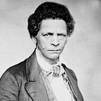



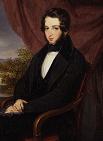
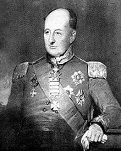
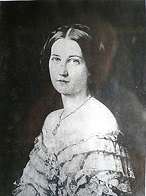



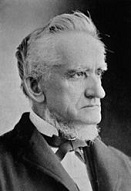





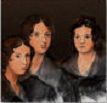

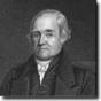
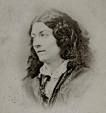
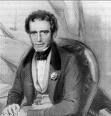



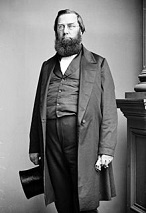


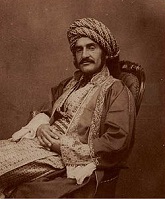











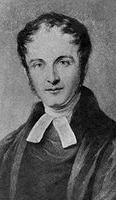

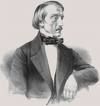


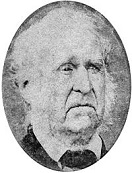
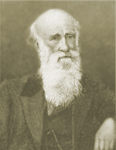




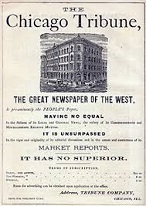
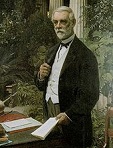
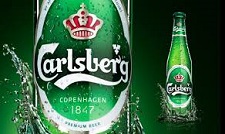
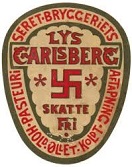
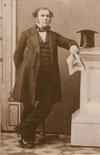
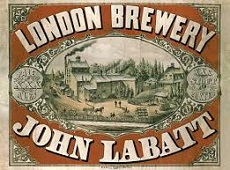


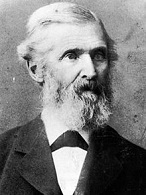
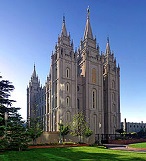
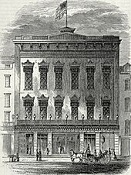
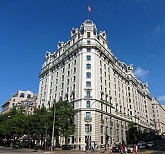
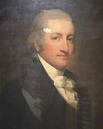
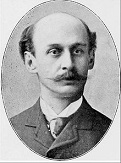
1847 There is a worldwide influenza epidemic (ends 1848), a measles epidemic in Canada (ends 1850), and a yellow fever epidemic in New Orleans. About 214K Irish emigrate to the U.S. and Canada aboard ships this year, incl. White Star Liners; 30% die on board of dysentery, typhus, and malnutrition; Irish immigrants to the U.S. bring their traditions of Trick or Treat and Jack O'Lanterns. On Jan. 8 Newton, Mass.-born John Palmer Parker (1790-1868) receives a land grant in the remote uplands N of Mauna Kea in the Big Island of Hawai, founding Parker Ranch to contain all the wild cattle on the island; the Hawaiian govt. begins privatizing land in their country that's been depleted of people by foreign diseases, giving foreign-owned plantations a free hand to monopolize agriculture and import indentured laborers from China, Japan, and other Asian countries in an attempt to mix more "hardy" genes into the Hawaiian pop. - the Hakka women have big feet, the Punti women small feet? In Jan. liberal agitation in Switzerland causes diplomats from the conservative powers of Austria, Russia and Prussia to leave Berne; supposedly liberal Louis Philippe's support of the reactionary monarchies against Switzerland finally alienates French liberals. In Jan. miffed Gen. Taylor disobeys orders to give his troops over to Gen. Winfield Scott in Tampico, instead advancing E to Saltillo - in hopes of this not being the end, my only friend? The West is the best? On Jan. 10 U.S. Brig. Gen. Stephen Watts Kearny (1794-1848), cmdr. of the Army of the West, and Robert F. Stockton enter Los Angeles after winning the Jan. 9 Battle of La Mesa in modern-day Veronon, Calif., and on Jan. 13 Lt. Col. John Fremont and Gen. Andres Pico meet at the Campo de Cahuenga and sign a peace treaty between the U.S. and Mexico; this site is just across Lankersheim Blvd. from the main entrance to Universal Studios in Hollywood, Calif. - how close is this to the Tech Noir Bar on Pico in The Terminator? On Jan. 19-July 9 the Taos Revolt in N New Mexico Territory by Mexicans and Pueblos against U.S. occupation is a V for U.S. forces incl. Sterling Price, Ceran St. Vrain, and Capt. John Henry K. Burgwin (-1847), who is KIA in the Siege of Pueblo de Taos on Feb. 3-5, 1847. On Jan. 30 the Calif. town of Yerba Buena is renamed San Francisco. In Jan. former Cape Colony gov. (1834-8) Lt. Gen. Sir Benjamin Alfred d'Urban (1777-1849) is appointed cmdr. of British forces in British North Am., setting up HQ in Montreal until his death on May 25, preparing for a possible U.S. invasion over border disputes. On Feb. 22-23 Gen. Zachary Taylor finally gets to fight the Big Beaner Gen. Antonio Lopez de Santa Anna at the Battle of Buena Vista Hacienda (La Angostura) near Saltillo after the Mexicans, seeing that they outnumber the Americans invite them to surrender without a fight, and Gen. Taylor gives the classic Am.-style smart-alecky reply, "Tell him to go to hell"; Taylor's son-in-law Col. Jefferson Davis leads a regiment that breaks up a Mexican cavalry charge, and he is shot in the foot, causing Taylor to lament refusing his daughter's hand in marriage, saying "My daughter was a better judge of men that I was"; the battle is a push, but both claim victory; Taylor is then granted leave to return home so that he can run for pres. on the strength of his big V. On Mar. 8 Gen. Winfield Scott launches an amphibious invasion of Vera Cruz (Veracruz) with his 10K-man army (first major U.S. military amphibious operation), and on Mar. 9 lands on the beaches S of Veracruz; on Mar. 27 after a week-long siege he captures Veracruz, then, following Cortes' route 300 years ealier, heads for Mexico City, evading a trap set by Santa Anna at Cerro Gordo on Apr. 18, instead capturing 3K POWs along with their equipment, incl. Santa Anna's personal effects; on May 15 Scott enters Puebla, Mexico's 2nd largest city, and watches 3K of his 10K men leave for home as their 12-mo. enlistments expire, forcing him to wait 3 mo. for reinforcements and supplies from the coast. In Mar. Japanese emperor Komei establishes the Gakushuin school for the children of the nobility in Kyoto. In Mar. after the diplomatic mission of former Roman Catholic missionary Karl Gutzlaff (1803-51) (one of the first Protestant missionaries to assume Chinese dress) is snubbed, two French warships enter Vietnamese waters and demand religious freedom for Catholics; after they shell Vietnamese defenses at Da Nang (Tourane), the emperor orders all Europeans in Vietnam put to death, but dies before the order can be carried out; he is succeeded by his youngest son Tu Duc (1829-83) as emperor of Vietnam, becoming the last independent one. In the spring of "Black '47", the British govt. provides outdoor relief (soup kitchens) for the starving Irish, which doesn't prevent massive deaths especially in the west, while massive emigration to the U.S. and Britain saves those who can afford it; the vacated land is consolidated by the British mini-William-the-Conquerors, who manipulate the famine to their own profit. One group of half-civilized Indians is pushed aside so another can move in their place? On Apr. 5 (2:00 p.m.) the Vanguard Co. of 143 men incl. eight members of the Quorum of the Twelve Apostles and three black men, three white women, and three white children, led by Brigham Young leave Winter Quarters in modern-day North Omaha, Neb. on the Missouri River heading to the Great Basin, arriving on July 24 in the Salt Lake Valley in Utah after Young says "This is the right place, drive on" from a sick wagon driven by Wilford Woodruff; on July 28 Young marks the location of the Gothic-Romanesque Salt Lake Temple (the White Man's Mecca?) on 10-acre Temple Square after Oliver Cowdery allegedly locates the exact spot with his divining rod; Morons, er, Mormons become the first white settlers in Utah (just what the Indians need, Morons who think they know all about their history when they can't even speak their language?); on Aug. 21 they leave for Winter Quarters to gather the remaining Mormon families, setting 12K Mormons in groups of 3K to work as a team to make the trek into the new Mormon Promised Land along the North Platte River, South Pass, Wyo. and Ft. Bridger, Wyo., setting up way stations for the remaining 60K Mormon pioneers, with 2.5K making the journey in 1848; on Feb. 14, 1853 the Salt Lake Temple is dedicated by Heber C. Kimball, after which groundbreaking ceremonies are held on Apr. 6, and it is dedicated on Apr. 6, 1893 by Wilford Woodruff; the architect is Truman Osborn Angell (1810-87) (brother-in-law of Brigham Young), who fills it with Masonic symbols; the walls are made of quartz monzonite from Little Cottonwood Canyon 20 mi. to the SE; Angell goes on to become the official architect of the LDS Church. On Apr. 26 after 800 emigrate from Saxony in Nov. 1838 in the Saxon Lutheran Migration, settling in St. Louis, Mo., the Lutheran Church - Missouri Synod (LCMS) is founded by recent German and Scandinavian immigrants in a broad band from Ohio to the Dakotas, led by C.F.W. (Carl Ferdinand Wilhelm) Walther (1811-87), becoming fearful of liberal "American Lutheranism" and going on to become the 2nd largest Lutheran body in the U.S. (2M members) - and want to keep their frauleins barefoot and preggers? On June 1 the Zeta Psi (Zetes) men's fraternity is founded at NYU by John Bradt Yates Sommers, William Henry Dayton, and John Moon Skillman, growing to 50K brothers in 53 active and 34 inactive chapters; on May 3, 2008 it charters Iota Omicron at Oxford U., followed on May 5, 2016 by Gamma Psi at the U. of Guelph. On June 10 the Chicago Tribune is founded in Chicago, Ill. by James Kelly (1809-95) et al., billing itself as "the Great Newspaper of the West", and "World's Greatest Newspaper", going on to support the Free Soil and Whig parties against the Dems. and promoting xenophobia against foreigners esp. Roman Catholics, affiliating with the Know Nothing Pary on Feb. 10, 1855, also supporting temperance, becoming the #1 paper in the Chicago metro and Great Lakes region; until ? the masthead displays the U.S. flag along with the motto "An American Paper for Americans". On June 11 Sir John Franklin (b. 1786) dies in the Arctic, and Capt. Francis Rawdon Moira Crozier (1796-1848) takes over as cmdr. for the Northwest Passage expedition, which gets stuck in the ice and lasts three years before all 125 crew perish. On June 27 New York City and Boston are linked by telegraph wires - the kind of country to which you really have to wanna go to get there? On July 4 Congress authorizes a new U.S. flag (design #11) with 29 stars, which incl. Iowa. On July 20 the Sonderbund War in Switzerland begins when the Roman Catholic cantons of Lucerne, Fribourg, Valais, Uri, Schwyz, Unterwalden, and Zug refuse to integrate with the Protestant ones and form the Sonderbung, which the radicalized (after a V in St. Gall) Federal Diet dissolves, declaring war on it on Nov. 4 and defeating the Catholic forces by Nov. 29, allowing it to establish a liberal-radical govt. whether the Catholics like it or not; the big V for liberalism causes crowds in France and Italy to cheer, and Marx and Engels to send kudos; meanwhile Metternich et al. rightly fear that the radicals are not going to stop there? On July 23 after the increase of Roman Catholic pilgrims to 4.2K makes exclusive control by the Franciscans inappropriate, Pope Pius IX issues the bull Nulla Celebrior, reestablishing the Latin Patriarchate of Jerusalem along with the Order of the Holy Sepulcure for the 1st time since the Crusades, with bishop Giuseppe (Joseph) Valerga (1813-72) as the first, superseding the Franciscan control that began in 1342; he arrives in Jerusalem next Jan. 17 and enters the Holy Sepulchre; the papacy retains the title of grand master of the Order of the Holy Sepulchre until 1949. On July 26 the Free and Independent Repub. of Liberia is founded by the Am. Colonization Society to Liberia (founded 1816 with backing by Pres. James Monroe) to repatriate freed U.S. black slaves, with a constitution modeled after the U.S., complete with cities named Monrovia (capital) (modern pop. 600K) (first foreign city to be named after a U.S. pres. until ?) and Buchanan on Waterhouse Bay (pop. 34K), and a constitution signed by 11 signers, hence the 11 stripes in its flag; next Jan. 3 "Father of Liberia" Joseph Jenkins Roberts (1809-76) of Va. becomes pres. #1 (until Jan. 7, 1856); James Lawrence Day (1814-54) from Morristown, N.J. becomes the colony's first physician; abundant timber and diamond wealth make it prosperous for the next cent.; the trouble starts when the Am. immigrants try to force their govt. and way of life on the other 99% and run out of free cookies? In July the Yucatan Caste War in Mexico (ends 1901) begins with a revolt of the rural native Mayan peasants of SE Yucatan against the Yucatecos of Euro descent in the NW, aided by the distraction of the U.S.-Mexico War, retaining 90% of Yucatan except Campeche and Merida, only to be driven back to Chan Santa Cruz in 1848 with a surprise attack when they are out planting corn, after which the Mayans are systematically turned into human dung by the white-is-right read-the-fine-print Euros via disease and starvation until they surrender; meanwhile in return for military aid the Second Repub. of Yucatan (founded 1841) rejoins the Mexican Federation next year. On Aug. 7 Gen. Winfield Scott sets out again for Mexico City, riding the snake through the mountain passes, thereby cutting his supply line to the coast, which causes the old fart backseat driver, the Duke of Wellington to comment that he "is lost - he cannot capture the city and he cannot fall back upon his base"; on Aug. 19-20 Scott wins the Battle of Contreras 13 mi. SSW of Mexico City, defeating a Mexican force of 7K under Gen. Valencia blocking the road to Mexico City with his force of 4.5K, with Mexican losses of 1.5K vs. U.S. losses of only 60, leading to an easy U.S. V at the Battle of Churubusco (the last fort defended to the death by Mexican officer-cadets) on Aug. 20, followed by an armistice on Aug. 23, which ends on Sept. 7, during which time Scott prepares a final assault on the remaining fortifications, starting with the enemy left at Battle of Molino del Rey on Sept. 8, then the enemy right at the Battle of Casa Mata on Sept. 11, and finally, after heavy losses on both sides, the enemy center at the Battle of Chapultepec on Sept. 13, where the Mexican Irish San Patricio Battalion puts up a desperate struggle for fear of capture and execution for treason; Scott then executes a brilliant flanking operation around the lakes and marshes guarding the E approaches, overwhelming Mexican defenses and entering Mexico City on Sept. 14, then mops up all resistance from the beaners within three days, finally having brig. gen. William Jenkins Worth (1794-1849) take down the Mexican flag on the Nat. Palace and run up the gringo Stars and Stripes flag while the U.S. Marines occupy the Halls of Montezuma; St. Patrick's Battalion is nearly wiped out at Churubusco Convent on Aug. 21, with all but 71 killed or taken POW, and 20 POWS hanged as deserters on Sept. 10, followed by several more later - when the music's over, turn out the lights? In Sept. uprisings in Reggio and Messina are crushed by King Ferdinand II. On Oct. 25 the 2nd Istanbul Cholera Epidemic begins (ends Nov. 1849) (first 1831), infecting 9,237 and killing 4,275. In Oct. Santa Anna resigns as pres. of Mexico leaves the country; on Nov. 11 the Mexican Congress elects an interim pres., and on Nov. 22 the new admin. begins negotiating with U.S. peace negotiator Nicholas P. Trist, even though Polk has just recalled him; Polk calls him an "impudent and unqualified scoundrel", but lets him continue because he's so well-connected? In Oct. 1847 after it falls into disrepair and becomes vulnerable to looting, losing its marble floor, a silver star allegedly marking the exact spot of Jesus Christ's birth in the Church of the Nativity in Bethlehem is stolen, causing a brawl between Greek and Latin clergy, which leads to a dispute between France and Russia, which leads Napoleon III of France in Dec. 1852 to force the Ottomans to recognize France as the sovereign authority over Christian sites in the Holy Land, after which the Ottoman sultan replaces the silver star, complete with a Latin inscription, pissing-off the Russians, who send armies to the Danube River, causing the sultan to back down and reverse his decision, restoring the Greeks to sovereign authority, which later gives Britain and France an excuse to go to war with Russia to stop their advance into Ottoman territory, leading to the 1854 Crimean War. On Nov. 2 Anglo-Irish landowner Maj. Denis Mahon, who had paid $1K to deport 1K of his poor and starving tenants to Canada, 25% of which died en route, then kicked 3K of his remaining 12K tenants out of his property in County Roscommon in the Midlands of Ireland is murdered by unknown assailants; the Molly Maguires are suspected. On Nov. 26 U.S. Navy Capt. William Francis Lynch (1801-65) sails with his crew on the Supply from New York City to Acre, Palestine, where they end up sailing down the Jordan River in metal boats to the Dead Sea, followed by Jerusalem and Nazareth, allegedly to measure the elev. of the Dead Sea; after returning their little pilgrimage to the Holy Land becomes a political hot potato. On Nov. 29 after a measles outbreak kills far more natives than whites, pissing-off the native Cayuse Indian leaders, the Whitman Massacre sees pioneer Presbyterian missionary-physician Marcus Whitman (1802-47), his science teacher wife Narcissa Whitman (b. 1808) and 12 others killed by Cayuse Indians led by Tiloukaikt (-1850) at their missionary 6 mi. W of Ft. Walla Walla, Wash.; the Indians take 53 hostages, who are later ransomed back to settlers in nearby Williamette Valley; too bad, a militia led by overzealous fundamentalist Protestant missionary Cornelius Gilliam (1798-1848) attacks innocent Cayuse, starting the Cayuse War (ends 1855); Tiloukaikt is captured in 1850 and executed on June 13 after accepting Roman Catholic last rites as a rebuff to the Presbyterian missionaries, uttering the soundbyte "Did not your missionaries teach us that Christ died to save his people? So we die to save our people." On Dec. 5 war hero Jefferson Davis becomes U.S. Sen. of Miss. to fill out the term (begun 1845) of N.C.-born Jesse Speight (b. 1795), who died on May 1, and after being reelected in 1849 he resigns in Sept. 1851 to run for gov. of Miss., but is defeated by a lousy 999 votes. On Dec. 27 Whittingham, Vt.-born Brigham Young (1801-77) is confirmed as pres. #2 of the LDS Church (until Aug. 29, 1877), continuing to operate the Nauvoo Legion. On Dec. 30 the Commercial & Agricultral Bank of Galveston, Tex. becomes the first bank in Tex.; it closes in 1859. In Dec. Abraham Lincoln from Ill. takes his seat in the U.S. House (one term only), and begins introducing Spot Resolutions, calling on Pres. Polk to name the spot where American blood had been shed on U.S. soil first before the U.S. invaded Mexico, claiming that the U.S. is the aggressor, calling some to call him a traitor - 5-4-3, Lincoln's open, and he's got it? The 15-year Algerian uprising against the French is quashed. An abortive revolt is quashed in Dublin. Charles Albert caves in to liberal nobles Camillo di Cavour et al. and eases press censorship and revises the police system in Piedmont. Conservative El Savador pres. (1841-2) Juan Lindo (Juan Nepomuceno Fernandez Lindo y Zelaya) (1790-1857) becomes pres. of Honduras (until 1851), with a program of reestablishing Central Am. unity. Basque mercenary and heartbreak hero Don Jose Oyanguren vanquishes fierce Datu Bago and annexes Davao Gulf (Bagobo "Daba-Daba" = fire) on Mindanao for Christian Spain. Jose Antonio Paez leads a revolt against his successor, Venezuelan pres. Jose Tadeo Monagas, but is quickly stopped, captured and imprisoned for three years, ending up in exile in the U.S. in 1850-8; Monagas puts his brother Jose Gregorio Monagas (1795-1858) in power as co-pres. (until 1858). Leopold II annexes the maritime province of Lucca to Tuscany. The British Factory Act restricts the working day for women and children ages 13-18 to a lenient 10 hours. Belgium replaces its coalition Unionist govt. with a party system and council of ministers, which, with a new electoral law next year that doubles the number of voters helps Belgium avoid the 1848 rev. fever. The Icelandic Althing asks Danish king Christian VIII for reforms incl. expanded suffrage, more direct voting, and the use of the Icelandic language in assemblies. The Reports of the Commissioners of Enquiry into the State of Education in Wales is pub. in three blue-covered vols., claiming that Welsh schools are inadequate and that the Welsh themselves are lazy, ignorant and immoral, and tracing it to the Welsh language, pissing-off the Welsh, who call the affair "the Treachery (Treason) of the Blue Books". Wellington Hospital in New Zealand is founded as the country's first hospital. Russian Romantic realist Vissarion Belinsky (1811-48), "Father of Russian Radical Intelligentsia" acquires the popular mag. The Contemporary (Sovremennik) (founded in 1836 by Alexander Pushkin), and with his collaborator Nikolai Alexeyevich Nekrasov (1821-78) go on to shake up the Tsarist regime with their free, noble, Romantic those-were-the-days-my-friend-we-thought-they'd-never-end articles, featuring writers incl. Ivan Turgenev, Ivan Goncharov et al, and pub. tr. of works by George Sand, Charles Dickens et al. The Bavarian Halls of Montezuma, or, The first Evita starring Madonna? Irish babe Lola Montez (1818-61) (real name Elizabeth Rosanna Gilbert), who married English Capt. Thomas James in 1837, went with him to India, ditched him and returned to become a dancer in London in 1842, getting popular and becoming a Euro star, finally hooks big fish King Louis I of Bavaria, who creates her baroness of Rosenthal and countess of Lansfeld, and she goes on to intrigue against conservatives and Jesuits (until 1848); she tells Louis that she's a Spanish dancer from Seville, Spain, born in 1823? French-born English chef Alexis Benoist Soyer (1810-58) invents the soup kitchen to serve "famine soup" to the poor in the Great Irish Famine. The first Swiss railroad opens between Zurich and Baden. The Hamburg-America Line is founded, becoming the first German transatlantic steamship line. Prince Otto von Bismarck (1815-98) of Schonhausen begins his political career as a substitute delegate to the Prussian United Diet. 22-y.-o. Samuel Langhorne Clemens (1835-1910) becomes a cub pilot under captain Horace Bixby, spending 18 mo. as an apprentice pilot, and two years as a licensed pilot on Miss. steamboats. The city of Atlanta, Ga. (named after the Western and Atlantic Railroad), near the Chattahoochee River is incorporated (modern pop. 500K/5M) - only how many years till it's gone with the wind? The city of Salinas, Calif. 10 mi. E of Monterey Bay (47 mi. SEE of San Jose) is founded as a stagecoach stop between Monterey and San Juan Bautista (modern pop. 150K). The first chemical factory is established in the town of Widnes on the N bank of the Mersey River in Cheshire, NW England, turning it into a center of the chemical industry, attracting large-scale immigration from Ireland, Wales, Poland, and Lithuania; the Sankey Canal (opened in 1757) closes in 1963, leaving Spike Island in Widnes, which houses the Catalyst Science Discovery Centre (1992), the only science museum in the U.K. devoted to chemistry. The Mexicans out of the way, 33 members of the socialistic German Freethinker Darmstadt Society of Forty move to the hill country of Texas. After surviving the Trail of Tears, the Choctaw Nation in Okla. collects donations and sends $5K (modern-day) to Middleton (S of Dublin), County Cork, Ireland to aid them during the Potato Famine; in 1995 Irisih pres. Mary Robinson visits them to thank them; in 2017 the sculpture "Kindred Spirits" is erected in their honor. London-born Am. Restorationist John Thomas (1805-71), friend of Restoration Movement founder Alexander Campbell founds the crypto-Anabaptist Unitarian (anti-trinitarian) Christadelphian (Gr. "brethren in Christ") sect in America, claiming to be a return to first cent. apostolic Christianity, going on to promote a nat. homeland for Jews in Israel, claiming that Britain would play a leading role; by modern times there are 50K members in 120 countries. The Am. Medical Assoc. (AMA) is founded in Philadelphia, Penn. by Nathan Smith Davis (1817-1904) et al.; in 1897 it incorporates, becoming the largest physician assoc. in the U.S., with 217K members by 2011, going on to become one of the largest lobbying orgs. in the U.S., fighting the New Deal, Medicare, and single-payer health care plans while fighting to limit damage awards in medical malpractice suits. The first Working Men's Club is founded in Cologne, Germany, soon going internat. and gaining key members Karl Marx (1818-83) and Friedrich Engels. Henry Ward Beecher (1813-87) becomes minister of the Plymouth Congregational Church in Brooklyn, N.Y. City U. of New York (CUNY) is founded in New York City as the Free Academy, becoming the first inst. of free public higher ed. in the U.S., becoming the 3rd largest univ. in the U.S. after SUNY and Calif. State U.; on Dec. 15, 1928 the cornerstone for Baruch College (originally City College School of Business and Civic Admin.) is laid, becoming the biggest business school in the U.S., renamed in 1953 to Baruch School of Business; in 1930 it begins admitting women; by 1935 enrollment reaches 40K; in 1961 the City U. of New York system is established, and in 1968 the Baruch School of Business is spun off as an independent college in the system; in 1970 it adopts an open admissions policy to accommodate minorities, and by 2016 the student body comes from 200+ countries, with white, black, and Hispanic pops. each comprising 25%+, and Asians 18%; in 1976 after enrollment swells from 174K to 268K it begins charging tuition. Earlham College in Richmond, Ind. is founded by the Quakers. Lawrence U. in Appleton, Wisc. is founded, becoming the 2nd U.S. college to be founded as a coeducational inst. Charles Dickens begins managing a touring theatrical co. (until 1852). Marlboro brand cigarettes are first marketed in England, named after Great Marlboro St. in London, where they are manufactured, and target to English women smokers, followed in the 1920s by Am. female smokers; during WWII it is discontinued, then relaunched in the 1950s after stories about the health detriments of smoking, touting its mildness and filter, changing the marketing emphasisis to men, introducing the Tatooed Man, followed in 1954 by the Marlboro Man, becoming the #1 brand by 1972. 18-y.-o. Levi Strauss (b. 1829) comes to the U.S. from Germany to work in his brother's dry goods business. The Chicago, Milwaukee, St. Paul and Pacific Railroad is founded; on Jan. 1, 1986 it merges with the Soo Line Railroad. The Philadelphia Bulletin in Penn. begins pub. (until 1982), becoming the #1 newspaper in Philly for 76 years and the largest evening newspaper in the U.S.; "Nearly everybody in Philly reads the Bulletin". Skandinavia, the first Swedish mag. in the U.S. begins pub. in New York City on Jan. 15. Carlsberg Group is founded in Copenhagen, Denmark by Danish industrialist Jacob Christian Jacobsen (1811-87), student of Gabriel Sedlmayr to produce German-style beer, incl. Carlsberg Beer (named after his son Carl), introduced in 1883, becoming the first quality modern lager, brewed with a special yeast isolated by their scientists, giving them a new level of control of quality and consistency, going on to become known for their "golden pint"; their original logo is a Swastika, which they drop in the early 1940s; in 1970 they acquire Tuborg Brewery (founded 1873); in 1990 they acquire Baltika (founded 1990), the best-selling beer in Russia (40% market share); in 2001 they merge with Orkla ASA of Norway, becoming the 5th biggest brewery co. on Earth, rising to 4th in 2009. John A. Huck (-1878) and John Schneider found a brewery in Chicago, Ill. two blocks E of Lill's, producing the first lager in Chicago; Huck's house becomes the center of the city's first beer garden, with the elms shading his lagering cellars; in 1855 he changes the co. name to Eagle Brewing Co.; too bad, it burns down in the 1871 Great Chicago Fire; when he dies, his son John founds a new brewing co. that becomes the first in the U.S. to use the Saladin Box malting process, invented by French Lt. Col. Charles Saladin (1878-1942), using rotating screws to move the barley across the air flow to keep it from forming large unusable mats. Labatt Brewing Co. Ltd. is founded in London, Ont., Canada by Irish immigrant John Kinder Labatt (1803-66), going on to survive Prohobition as one of 15 breweries left in Canada, allowing it to grow into one of Canada's largest breweries; in 1945 it goes public; in 1951 it introduces Labatt Blue Pilsner Lager, named after the Canadian Football League Blue Bombers, becoming #1 in Canada until the late 1980s when Molson Canadian passes it up, then switching lead until 2004 when Budweiser becomes #1, which doesn't hurt it since in the 1980s it began brewing Budweiser in Canada, after which it becomes the best-selling Canadian beer on Earth; in 1974 it acquires Kokanee; in 1976-95 it becomes the majority owner of the Toronto Blue Jays ML baseball team; in 1984 it introduces the first twist-off cap in a refillable bottle; in 1989 they hire Canadian actress Pamela Anderson as their Blue Zone Girl; 1995 it is acquired by Interbrew. Necco Wafers are introduced by English immigrant Oliver Chase, who in 1901 forms the New England Confectionary Co. (Necco); they are sold in rolls with eight flavors; during WWII the U.S. military orders them for rations. Architecture: On Apr. 4 the Gran Teatre del Liceu (AKA Liceo) in Barcelona opens, becoming the #1 opera house in Spain. On July 24, 1847 Mormon leader Brigham Young and his Mormon pioneers arrive in the Salt Lake Valley in Utah; on July 28 he marks the location of the Gothic-Romanesque Salt Lake Temple on 10-acre Temple Square after Oliver Cowdery allegedly locates the exact spot with his divining rod; on Feb. 14, 1853 it is dedicated by Heber C. Kimball, after which groundbreaking ceremonies are held on Apr. 6, and it is dedicated on Apr. 6, 1893 by Wilford Woodruff; the architect is Truman Osborn Angell (1810-87) (brother-in-law of Brigham Young), who fills it with Masonic symbols; the walls are made of quartz monzonite from Little Cottonwood Canyon 20 mi. to the SE; Angell goes on to become the official architect of the LDS Church. On Sept. 27 the (Old) Broadway Theatre at 326-330 Broadway and 98 Anthony (Worth) Street in Manhattan, N.Y. (cap. 4.5K) opens, modeled on the Haymarket Theatre in London, becoming the largest theater so far in New York City, closing on Apr. 2, 1859 with a production of Shakespeare's "Antony and Cleopatra". The Grand Hotel in Mobile, Ala. opens. Using some of the gold discovered in 1690 in Brazil, Palace of Queluz in Queluz, Sintra (near Lisbon), Portugal is begun as a summer retreat for Dom Pedro of Braganza, becoming one of the last great Rococo bldgs. in Europe, known as the Portuguese Versailles; designed by architect Mateus Vicente de Oliveira (1706-86); construction is suspended after the 1755 Lisbon earthquake, and recommenced in 1758 with modifications to the design to handle future earthquakes; after the Ajuda Palace burns down in 1794, it becomes the official residence of Prince Regent Joao (John) VI and his mad wife Maria II, for whom the Pavilion of Dona Maria is built in 1785-192 by architect Manuel Caetano de Sousa. The Willard Hotel at 1401 Pennsylvania Ave. in Washington, D.C. is founded by Henry Willard after leasing six bldgs. built in 1816 by Col. John Taylor III (1770-1828) (wealthiest man of his time?) and combining them into a single 4-story structure, purchasing it in 1864 from Ogie Taylor, paying with U.S. currency instead of gold or silver like he agreed, launching a dispute over the purchase price that is settled by the U.S. Supreme Court in 1869 in Willard v. Tayloe; the hotel becomes the only one from which one can easily visit downtown Washington, D.C., becoming the favorite haunt of dignitaries incl. P.T. Barnum and Gen. Tom Thumb, Mark Twain, Walt Whitman, the Duke of Windsor, Harry Houdini, Gypsy Rose Lee, Gloria Swanson, Emily Dickinson, Jenny Lind, and Charles Dickens, with Nathaniel Hawthorne writing the soundbyte: "The Willard Hotel more justly could be called the center of Washington than either the Capitol or the White House or the State Department"; on Mar. 4, 1853 Pres. Millard Fillmore stays there before his inauguration; in 1860 the first group of three sword-carrying Japanese ambassadors to the U.S. stay at the hotel with 74 other delegates, causing many lookie-loos go gather; in Nov. 1861 Julia Ward Howe writes the lyrics to "The Battle Hymn of the Republic" while staying there; in 1901 a new 12-story bldg. designed by Am. architect Henry Janeway Hardenbergh (1847-1918) opens, suffering a fire in 1922 that causes $250K damage, requiring U.S. vice-pres. Calvin Coolidge to be evacuated, along with several U.S. senators, March King John Philip Sousa, film producer Adolph Zukor, newspaper publisher Harry Chandler et al.; the Willard family sells-out in 1946, and the hotel closes in 1968, reopening in the late 1990s after restoration; in 1963 Martin Luther King Jr. writes his "I Have a Dream" speech in his hotel room there; in summer 2001 Steven Spielberg shoots the finale of his film "Minority Report" at the hotel. Inventions: Thomas Beecham (1820-1907) of Wigan, England patents a laxative known as Beecham's Pills, containing aloe, ginger, and soap, with the slogans "Worth a guinea a box" and "Make all the difference"; they are sold for 1 shilling 1-1/2 pence, and cost half a farthing to produce; they are actually a clone of Holloway's Pills (1837). Sea capt. Hanson Gregory of Maine invents the hole in doughnuts; in ? a monument is erected to him; on July 9, 1872 John F. Blondel of Maine receivea a U.S. patent for a spring-loaded doughnut cutter. The U. of Deseret in Utah begins developing the Deseret Alphabet (until 1854), advertising and promoting it in books, newspapers, street signs and correspondence before giving up in 1869. Science: Christoph Buys Ballot determines the period of rotation of the Sun from daily temp observations in the Netherlands in 1729-1846. On July 20 Brorsen's (Brorsen-Metcalf) Comet is first observed (period 5.6 years). French physician Marie Jean Pierre Flourens (1794-1867) first demonstrates the anesthetic effect of chloroform on animals. James Prescott Joule pub. the principle of the conservation of energy. Carl F.W. Ludwig (1816-95) of Germany invents the Kymograph (Gr. "wave writer") to record blood pressure, boosting the study of physiology. Big brain Renaissance man (7 languages) U.S. Rep. (Whig-Vt.) (1843-9) George Perkins Marsh (1801-82) (architect of the Washington Monument) gives a speech to the Agricultural Society of Rutland County, Vt., becoming the first modern thinker to theorize that man's activities influence climate, but never mentioning carbon dioxide, with the soundbyte: "Man cannot at his pleasure command the rain and the sunshine, the wind and frost and snow, yet it is certain that climate itself has in many instances been gradually changed and ameliorated or deteriorated by human action. The draining of swamps and the clearing of forests perceptibly effect the evaporation from the earth, and of course the mean quantity of moisture suspended in the air. The same causes modify the electrical condition of the atmosphere and the power of the surface to reflect, absorb and radiate the rays of the sun, and consequently influence the distribution of light and heat, and the force and direction of the winds. Within narrow limits too, domestic fires and artificial structures create and diffuse increased warmth, to an extent that may effect vegetation. The mean temperature of London is a degree or two higher than that of the surrounding country, and Pallas believed, that the climate of even so thinly a peopled country as Russia was sensibly modified by similar causes." Samarskite, a lustrous velvet-black mineral rich in uranium, thorium, and rare earths (samarium, cerium, etc.) is named after Russian mining official Col. M. von Samarski. Austrian-Hungarian physician Ignaz Philipp Semmelweis (1818-65) discovers the connection between childbed fever and puerperal infection, and pisses-off physicians by suggesting that their filthy hands and instruments are killing their patients - be hot and stay cool? Nonfiction: John Quincy Adams (1767-1848), Letters on the Masonic Institution; "It is confidently believed that in the materials of the present volume will be found a solemn warning, conveyed by a voice in the feebleness of age still powerful over the sympathy of American citizens, against the formation of secret obligations." Louis Agassiz (1807-73), The Glacial System; his theory of a "glacial epoch" (ice age), causing a buzz. Ferdinand Christian Baur (1792-1860), Kritische Untersuchungen uber die Kanonischen Evangelien, ihr Verhaltniss zu Einander, ihren Charakter und Ursprung (Critical Investigation of the Canonical Evangelists, their Resemblance to Each Other, their Character and Origin); the gospels are redactions of an older lost gospel, with Matthew being the closest?; John "does not possess historical truth, and cannot and does not really lay claim to it" - Biblical higher criticism is cooking long before Darwin? Bruno Bauer (1809-82), History of the French Revolution (3 vols.). Louis Blanc (1811-82), History of the Revolution (1847-62). Paul Emile Botta, Monuments de Ninive (1847-50). George Boole (1815-64), Mathematical Analysis of Logic. George Bush (1796-1859), Mesmer and Swedenborg; backs them both. Andrew Jackson Davis (1826-1910), The Principles of Nature, Her Divine Revelations, and a Voice to Mankind; dictated in a trance in 1845 to his scribe William Fishbough. John Bovee Dods (1795-1872), Philosophy of Mesmerism. Charles G. Finney (1792-1875), Systematic Theology (2 vols.); revised eds. in 1851 and 1878; becomes a seminal work for Am. evangelicals. John Frost, Pictorial Life of George Washington: Embracing a Complete History of the Seven Years' War, the Revolutionary War, the Formation of the Federal Constitution, and the Administration of Washington. Nikolai Gogol (1809-52), Selected Passages from a Correspondence with Friends. Hermann von Helmholtz (1821-94), On the Conservation of Energy (Uber die Erhaltung der Kraft); presents the concept of the conservation of energy (First Law of Thermodynamics) with such cogent analysis that it gains widespread acceptance, resulting in aceing out non-establishment boy James Prescott Joule as the discoverer? Leigh Hunt (1784-1859), Men, Women and Books (2 vols.). Fanny Kemble (1809-93), Year of Consolation; her travels in Italy. Soren Kierkegaard (1813-55), Edifying Discourses in Diverse Spirits; Works of Love. Alphonse de Lamartine (1790-1869), Histoire des Girondins; lauds them. Karl Marx (1818-83), The Poverty of Philosophy; an attack on Proudhon's "Philosophy of Poverty". Jules Michelet (1798-1874), History of the French Revolution; historian Francois Furet hails it as "the cornerstone of all revolutionary historiography and is also a literary monument." Augustus De Morgan (1806-71), Formal Logic, or The Calculus of Inference, Necessary and Probable. William Hickling Prescott, History of the Conquest of Peru (3 vols.). Pierre-Joseph Proudhon (1809-65), The System of Economic Contradictions, or The Philosophy of Poverty; pisses-off Karl Marx, who this year pub. The Poverty of Philosophy, accusing him of wanting to rise above the bourgeoise, leading to a permanent split between the Anarchist and Marxist wings of the Internat. Working Men's Assoc. Leopold von Ranke (1795-1886), Neun Bucher Preussicher Geschichte. Arthur Penrhyn Stanley (1815-81), Sermons and Essays on the Apostolic Age. David Friedrich Strauss (1808-74), A Romantic on the Throne of the Caesars; draws parallels between Prussian king Frederick William IV and Roman emperor Julian the Apostate, claiming that both were romantic dreamers who tried to turn the calendar back. Wilhelm Weitling (1808-71), Ein Nothruf an die Manner der Arbeit und der Sorge, Brief an die Landsleute. Noah Webster (1758-1843), Dictionary (posth.). Horace Wells (1815-48), A History of the Application of Nitrous Oxide Gas, Ether and Other Vapors to Surgical Operations - the complete list of excuses for missing work? Music: Adolphe Charles Adam (1803-56), Oh Holy Night (Minuit, Chretiens!). Daniel Auber (1782-1871), Haydee (opera) (Opera Comique, Paris). Friedrich von Flotow, Martha (opera) (Vienna). Fromental Halevy (1799-1862), Les Premiers Pas (opera). Henry Francis Lyte (1793-1847), Abide with Me; Christian (Anglican) hymn, written by Lyte as he lays dying from TB; later set to the tune of the 1861 hymn "Eventide" by William Henry Monk (1823-89); a favorite of George V and Gandhi; played on the sinking Titanic; sung at the annual Anzac Day services; "Abide with me; fast falls the eventide;/ The darkness deepens; Lord with me abide./ When other helpers fail and comforts flee, /Help of the helpless, O abide with me." Goffredo Mameli (1827-49) and Michele Novaro (1818-85), Il Canto degli Italiani (Mameli's Hymn); "Brothers of Italy" (first line); becomes the anthem of the Italian independence-unification movement, and later the Italian nat. anthem. Giuseppe Verdi (1813-1901), Macbeth (opera) (Mar. 14) (Teatro della Pergola, Florence); based on the Shakespeare play; libretto by Francesco Maria Piave and Andrea Maffei; incl. La Luce Langue; I Masnadieri (The Bandits) (opera) (July 22) (Her Majesty's Theatre, London); based on Friedrich von Schiller's "Die Rauber"; Jerusalem (opera) (Nov. 26) (Academie Royale de Musique, Paris); French libretto by Alphonse Royer and Gustave Vaez. Henryk Wieniawski (1835-80), Grand Caprice Fantastique, Op. 1. Art: Thomas Couture (1815-79), Romans in the Decadence of the Empire; his masterpiece, exhibited at the Paris Salon. George Cruikshank (1792-1878), The Bottle (drawing); the evil effects of alcohol. Charles Deas (1818-67), Prairie on Fire; dramatic work. Jean-Leon Gerome (1824-1904), The Greek Cockfight; makes him an instant hit. Adolph von Menzel (1815-1905), Artist's Sister in the Sitting Room. Plays: George Dibdin-Pitt (1799-1855), The String of Pearls: The Demon Barber of Fleet Street; the Sweeney Todd story; claims to be "founded on fact"; "I believe I am not easily forgotten by those who have once seen me". Heinrich Laube, Struensee (tragedy); Gottsched und Gellert (comedy); Die Karlsschuler (comedy); the youthful Schiller. Poetry: Janos Arany, Toldi (pt. 1 of 3); his masterpiece, based on Magyar legends; Toldi's Love (pt. 2), Toldi's Evening (pt. 3). George Henry Boker (1823-90), The Lesson of Life and Other Problems. Alexandre Dumas fils (1824-95), Peches de Jeunesse (Netting the Waters) (debut). Edgar Allan Poe (1809-49), Ulalume; a man takes a walk one night in "lonesome October", ending up at the vault of his "lost Ulalume" exactly 1 year after burying her. Christina Georgina Rossetti (1830-94), Verses. Joseph Roumanille (1818-91), Li Marbarideto. Alfred, Lord Tennyson (1809-92), The Princess: A Medley; his first hit; incl. Tears, Idle Tears ("Tears, idle tears, I know not what they mean,/ Tears from the depth of some divine despair"), Now Sleeps the Crimson Petal, Godiva, The Princess; satire on women's education, about a princess who swears-off men and founds a women's-only univ. Henry Wadsworth Longfellow (1807-82), Evangeline: A Tale of Acadie; Evangeline Bellefontaine of Grande-Pre in Acadia searches for her lost love Gabriel Lajeunesse during the Acadian Expulsion; "This is the forest primeval. The murmuring pines and the hemlocks,/ Bearded with moss, and in garments green, indistinct in the twilight,/ Stand like Druids of eld, with voices sad and prophetic." (first lines) Novels: All those women left back home during all the military fun add up to a big year for the ding-dong Bronte (Brontë) Sisters, who live in a lonely parsonage in Yorkshire, England with their brother Branwell and build their brains to epic proportions? On Oct. 16 Charlotte Bronte (1816-55) (eldest sister) pub. her 2nd novel (the first, The Professor was rejected, and is later pub. posth.) Jane Eyre: An Autobiography under the alias Currer Bell, about a meek, plain (not beautiful, so Bronte can make a moral point?) orphan governess, raised at Gateshead and sent to horrible Lowood School by her mean guardian aunt, becoming governess at Thornfield Manor, where she falls in love with her tormented, mysterious and tragic employer Edward Rochester (whose creole wife Bertha died in a fire), after which she moves in with the Rivers family in Marsh's End (Moor House), then Morton, where her fish-cold clergyman-cousin St. John Rivers proposes to her, after which she reunites with and marries Rochester at his Ferndean House; the first novel written by a woman from a woman's point of view?; "There was no possibility of taking a walk that day" (first line); in Dec. Anne Bronte (1820-49) (middle sister) pub. Agnes Grey under the alias Acton Bell; a bankrupt minister's daughter becomes a governess to wealthy spoiled children of the Bloomfields and Murrays, then marries a man who loves her for herself and lives happily ever after; one of George Moore's favorites; in Dec. Emily Bronte (Brontë) (1818-48) (youngest sister) pub. her only novel Wuthering Heights under the alias Ellis Bell, about the doomed love between the sinister Byronic hero and Liverpool foundling Heathcliff (1764-1802) (son of the Devil?) and his beautiful foster sister Catherine Earnshaw (1765-84) on the Yorkshire Moors, and how he screws her up after she dumps him for higher class Edgar Linton (1762-1801) in 1783, causing her to go mad and die during childbirth on Mar. 20, 1784, while he elopes with her sister Isabella Linton (1765-97) in Feb. 1784 and mistreats her, causing her to escape to London and give birth to son Linton Heathcliff (1784-) before dying in 1797, after which Catherine's daughter Cathy (1784-) marries Linton Heathcliff in Aug. 1801, and he dies in Sept., then Heathcliff dies in Apr. 1802; meanwhile in 1801 newcomer Mr. Lockwood of Thrushcross Grange gets housekeeper Ellen "Nelly" Dean to tell him the whole story so he can write it down; "Wuthering being a significant provincial adjective, descriptive of the atmospheric tumult to which its station is exposed in stormy weather"; written in an interlocking fashion like Matryoshka dolls. Benjamin Disraeli (1804-81), Tancred. Fyodor Dostoyevsky (1821-81), The Double; an unpopular civil servant goes mad and sees his you know what. James Anthony Froude (1818-94), Shadows of the Clouds; pub. under alias "Zeta". Ivan Goncharov (1812-91), A Common Story (first novel); about young Russian nobleman Aleksander Aduev, who arrives in St. Petersburg from the provinces and loses his romanticism amid the pragmatic commercialism, becoming a big hit esp. in St. Petersburg, gaining praise from critic Vissarion Belinsky, with critic Vasily Botkin issuing the soundbyte: "How much good it will bring to our society, what a massive blow will it administer to romanticism, dreaminess, sentimentality and provincialism." Jeremias Gotthelf (1797-1854), Kathi (Käthi), die Grossmutter. Heinrich Hoffmann (1809-1904), Struwwelpeter. Charles James Lever (1806-72), The Knight of Gwynne: A Story of the Union. Frederick Marryat (1792-1848), The Children of the New Forest, a children's novel about the four Beverly orphans, who hide from the Roundheads. Herman Melville (1819-91), Omoo. Wolf Pascheles, Galerie der Sippurim; after an edict by the emperor to kill all Jews in Prague, 16th cent. rabbi Judah Loew the Maharal makes a golem from the mud of the banks of the Vltava River to kill attacking goyim, but it gets out of hand, and he ends up erasing the "e" from the word "emet" (truth) on its forehead, turning it into the word for death; first pub. story of the Jewish golem, which only rabbis could make because some of God's creative power rubs off on them; the real golem allegedly is still kept in the Old-New Synagogue of Prague. George Sand (1804-76), Le Peche (Péché) de M. Antoine. William Makepeace Thackeray (1811-1863), Vanity Fair: A Novel Without a Hero (Jan. 1847-July 1848); based on John Bunyan's "The Pilgrim's Progress" (1678), Ch. 6: "Therefore at this fair are all such things sold as houses, lands, trades, places, honors, preferments, titles, countries, kingdoms, lusts, pleasures, and delights of all sorts, as wives, husbands, children, masters, servants, lives, blood, bodies, souls, silver, gold, pearls, precious stones, and what not"; set during the Battle of Waterloo; Becky Sharp and Amelia Sedley of Miss Pinkerton's Academy for Young Ladies, Capt. George Osborne, Amelia's father John Sedley and brother Joseph Sedley, baronet Sir Pitt Crawley and his son Capt. Rawdon Crawley; Dominick Dunne; George's note to Becky Sharp is revealed at the end; title of the first full Technicolor film (1935), starring Marian Hopkins, with Thelma Catherine Ryan (Mrs. Pat Nixon) as an extra. Charlotte Elizabeth Tonna (1790-1846), The System. Births: Am. financier-philanthropist (Jewish) Jacob Henry (Jakob Heinrich) (Hirsch) Schiff (d. 1920) on Jan. 10 in Frankfurt-am-Main, Germany; emigrates to the U.S. in 1865. Am. astronomer Ormond Stone (d. 1933) on Jan. 11 in Pekin, Ill.; brother of Melville Stone (1848-1929); educated at the U. of Chicago. Am. "Philosophy of Theism" Personalist philosopher (Methodist) Borden Parker Bowne (d. 1910) on Jan. 14 in Leonardvile, N.J. French celeb Camille Monet (nee Doncieux) (d. 1879) on Jan. 15 in La Guillotiere, Lyons; wife (1870-) of Claude Monet Hungarian novelist Kalman Mikszath de Kiscsolto (d. 1910) on Jan. 16 in Szklabonya. Russian aerodynamic-hydrodynamic mathematician Nikolai Yegorovich Zhukovski (Joukovsky) (d. 1921) on Jan. 17 in Orekhovo, Vladimir Oblast; educated at Moscow U. French stereochemist Joseph Achille Le Bel (d. 1930) on Jan. 21 in Pechelbronn; educated at the Ecole Polytechnique. Am. Ouija Board inventor Elijah Jefferson Bond (d. 1921) on Jan. 23 in Bel Air, Md. Am. neoclassical economist John Bates Clark (d. 1938) on Jan. 26 in Providence, R.I.; educated at Amherst College, the U. of Zurich, and the U. of Heidelberg; father of John Maurice Clark (1884-1963). Am. marksman Francis E. "Frank" Butler (. 1926) on Jan. 30 in County Longford, Ireland; emigrates to the U.S. at age 13; husband (1876-1926) of Annie Oakley (1860-1926). Am. beer magnate Adolph Herman Joseph Coors Sr. (Adolph Hermann Josef Kuhrs) (d. 1929) on Feb. 4 in Barmen, Prussia, Germany; parents die in 1862; emigrates to the U.S. in 1868; brother of William Kuhrs (1849-1923); husband (1879-) of Louisa Webber Coors; father of Adolph Coors Jr. (1884-1970). Am. Waldorf-Astoria Hotel architect Henry Janeway Hardenbergh (d. 1918) on Feb. 6 in New Brunswick, N.J.; student of Detlef Lienau (1818-87). Am. overachieving sleep-misering inventor ("Wizard of Menlo Park") Thomas Alva Edison (d. 1931) on ? in Milan (pr. MY-lin), Ohio on Feb. 11 [Aquarius]; Canadian immigrant father; formal education consists of 3 mo. at a public school in Port Huron, Mich.; becomes deaf at age 12 after a conductor allegedly pulls him aboard a train at Frazer Station, Mich. by his ears; moves at age 21 to New York City to work in the financial industry. Am. atty. and suffragist Ada Harriet Miser Kepley (d. 1925) on Feb. 11 in Somerset, Ohio; educasted at Union College of Law in Chicago, Ill. German advisor (to Wilhelm II) (gay) Prince Philip Frederick Alexander, Prince of Eulenburg-Hertefeld, Count of Sandels (d. 1921) on Feb. 12 in Konigsberg. German economist Karl Wilhelm Bucher (Bücher) (d. 1930) on Feb. 16 in Kirberg, Hesse; educated at the U. of Bonn. English #1 Shakespearean actress Dame Alice Ellen Terry (d. 1928) on Feb. 27 in Coventry; comes from a family of actors; great-aunt of actor Sir John Gielgud; debuts at age 8; has a "paper courtship" with George Bernard Shaw; created dame in 1925. Scottish telephone, gramophone, photophone, electric eye, and induction balance inventor Alexander Graham Bell (d. 1922) on Mar. 3 in Edinburgh; son of Alexander Melville Bell (1819-1905); home-schooled, becoming a teacher at age 16; uses the alias H.A. Largelamb in Nat. Geographic. Italian PM #19 (1906, 1909-10) Baron Sidney Constantino Sonnino (d. 1922) on Mar. 11 in Pisa; Jewish descent Italian father, Welsh mother. Am. painter Albert Pinkham Ryder (d. 1917) on Mar. 19 in New Bedford, Mass.; known for his moody allegorical paintings. German chemist (Jewish) Otto Wallach (d. 1931) on Mar. 27 in Konigsberg (Kaliningrad); educated at the U. of Gottingen. English "Tales of the Punjab" novelist Flora Annie Webster Steel (d. 1929) on Apr. 2; spends 22 years in India. Danish naturalist novelist-poet Jens Peter Jacobsen (d. 1885) on Apr. 7 in Thisted, Jutland. Austrian architect Ferdinand Feller (d. 1916) on Apr. 19 in Vienna; educated t the Vienna U. of Tech.; collaborator of Hermann Helmer (1849-1919). Am. muckraker writer-journalist Henry Demarest Lloyd (d. 1903) on May 1 in New York City; educated at Columbia U. Canadian Internat. Paper Co. founder Hugh Joseph Chisholm (d. 1912) on May 2 in Niagara-on-the-Lake, Ont.; not to be confused with English journalist Hugh Chisholm (1866-1924). Am. surgeon Henry C. Dalton (d. ?) on May 7. English Liberal PM (1894-5) Archibald Philip Primrose, 5th Earl of Rosebery (d. 1929) on May 7 in Berkeley Square, London (Charles St.); son of Lord and Catherine Dalmeny (daughter of Earl Stanhope); educated at Eaton School, and Christ Church, Oxford U.; has gay relationship at Eaton with future Eaton pedophile schoolmaster William Johnson Cory (1823-92). Am. impresario (Jewish) Oscar Hammerstein I (d. 1919) on May 8 in Stettin, Pomerania, Germany (Prussia); father of Arthur Hammerstein (1872-1955) and Willie Hammerstein (1875-1914); grandfather of Oscar Hammerstein II (1895-1960); emigrates to the U.S. in 1864 and makes his fortune in the cigar biz before going into theater. English historian (ancient Roman religion) William Warde Fowler (d. 1921) on May 16 in Langford Budville, Somerset. U.S. First Lady (1897-1901) (epileptic) Ida Saxton McKinley (d. 1907) on June 8 in Canton, Ohio; wife of William McKinley. British suffragist Dame Millicent (OF "brave strength") Fawcett (nee Garrett) (d. 1929) on June 11 in Aldeburgh, Suffolk; sister of Elizabeth Garrett Anderson (1836-1917); wife (1867-) of economist Henry Fawcett (1833-84); created dame in 1925. French historical school socialist economist-historian (Protestant) Charles Gide (d. 1932) on June 29 in Uzes; uncle of Andre Gide (1869-1951). English shipping magnate Walter Runciman, 1st Baron Runciman (d. 1937) on July 6; father of Walter Runciman, 1st viscount Runciman of Doxford (1870-1949); created baronet in 1906. German Impressionist Berliner Succession Movement painter-printmaker (Jewish) Max Liebermann (d. 1935) on July 20 in Berlin. Am. Theosophist leader Katherine Augusta Westcott Tingley (d. 1929) on July 6 in Newbury, Mass. U.S. white supremacist Sen. (D-S.C.) (1895-1918) Benjamin Ryan Tillman (d. 1918) on Aug. 11 near Trenton, S.C.; brother of George Dionysius Tillman (1826-1902). Am. outlaw hero Jesse Woodson James (d. 1882) on Sept. 5 in Centerville (Kearney), Clay County, Mo.; goes by the alias Curly, er, Thomas Howard; brother of Frank James (1843-1915); husband (1874-) of Zerelda Mimms (1845-1900). Am. Cosmopolitan ed.-pub. (1889-1905) John Brisben Walker (d. 1931) on Sept. 10 near Pittsburgh, Penn. English suffragist poet-writer Alice Christiana Gertrude Thompson Meynell (d. 1922) on Sept. 22 in Barnes, London. English Theosophist and women's rights activist Annie Wood Besant (nee Wood) (d. 1933) on Oct. 1 in Clapham, London; of Irish descent; leader in India's independence movement; writes under the alias Ajax. German field marshal and Weimar Repub. pres. #2 (1925-34) Paul Ludwig Hans Anton von Beneckendorff und von Hindenburg (d. 1934) on Oct. 2 in Posen, Poland (at Podgorna 6); son of Robert von Beneckendorff und von Hindenburg (1816-1902) and Luise Schwickart (1807-93); descendant of Martin Luther - there's something about Adolf? French "Le Capitaine Casse-Cou" novelist ("the French Rider Haggard") Louis Henri Boussenard (d. 1910) on Oct. 4 in Escrennes, Loiret. German sculptor Adolf von Hildebrand (d. 1921) on Oct. 6 in Marburg; son of economist Bruno Hildebrand (1812-78); father of Dietrich von Hildebrand (1889-1977) - back when the name Adolf didn't have bad connotations? Am. real estate developer ("Father of Hollywood") Hobart Johnstone "H.J." Whitley (d. 1931 on Oct. 7 in Toronto, Canada; becomes a U.S. citizen in the 1870s; names Hollywood in 1886 while on his honeymoon with wife Gigi after a Chinese man in a wagon carrying wood allegedly says "I holly wood". Am. "Moonlight" lRomantic Tonalist andscape painter Ralph Albert Blakelock (d. 1919) on Oct. 15 in New York City; educated at CCNY. Italian physicist-engineer Galileo Ferraris (d. 1897) on Oct. 31 in Livorno Vercellese, Sardinia; educated at the U. of Turin, and Turin Royal School of Engineering; inventor of the 3-phase electric induction motor (1885). French syndicalist philosopher-journalist Georges Eugene (Eugčne) Sorel (d. 1922) on Nov. 2 in Cherbourg, Normandy; educated at the Ecole Polytechnique, Paris; founder of Sorelianism. Irish "Dracula" novelist Abraham "Bram" Stoker (d. 1912) on Nov. 8 in Fairview; son of Abraham Stoker (1799-1876) and Charlotte Mathilda Blake Thornely (1818-1901) (feminist); educated at Trinity College, Dublin; husband (1878-) of Florence Balcombe (1858-1937); distant relation of Sir Arthur Conan Doyle; asst. (1878-) of Lyceum Theatre (London) owner Henry Irving. Am. writer-illustrator (Quaker) Mary Hallock Foote (d. 1938) on Nov. 9 in Milton, N.Y. Am. psychologist-logician-mathematician Christine "Kitty" Ladd-Franklin (d. 1930) on Dec. 1 in Windsor, Conn.; educated at Vassar College. Am. Jewish rabbi (founder of the United Synagogue of Am.) Solomon Schechter (d. 1915) on Dec. 7 in Focsani, Romani, Moldavia; educated at the U. of Vienna, and Humboldt U.; emigrates to Vienna in 186?, Germany in 1879, Britain in 1882, and the U.S. in 1902. French WWI Gen. Michel Joseph Maunoury (d. 1923) on Dec. 17 in Maintenon, Eure-et-Loir. Am. Dem. Ill. gov. #20 (1893-7) John Peter Altgeld (d. 1902) on Dec. 30 in Westerwald, Germany; emigrates to Mansfield, Ohio as an infant; educated at the U. of Mo. Am. outlaw Joseph Isaac "Ike" Clanton (d. 1887) in Callaway County, Mo. Am. prospector (Tombstone, Ariz. founder) Edward Lawrence "Ed" Schieffelin (d. 1897) in Wellsboro, Penn. French airship pioneer Charles Renard (d. 1905) in Damblain, Vosges. Am. anti-Chinese labor leader Denis Kearney (d. 1907) in Oakmount County, County Cork, Ireland; emigrates to San Francisco, Calif in 1868; becomes a U.S. citizen in 1876. U.S. First Lady (1897-1901) (epileptic) Ida Saxton McKinley (d. 1907) in Canton, Ohio; wife of U.S. Pres. William McKinley. Am. architect Charles F. McKim (d. 1909). English automobile-motorcycle manufacturer George Singer (d. 1909) in Stinsford, Dorset. Am. newspaper publisher (Jewish) Joseph Pulitzer Sr. (d. 1911) in Mako, Hungary; emigrates to the U.S. in 1864; serves in the 1st N.Y. Cavalry in the U.S. Civil War; father of Ralph Pulitzer (1879-1939); grandfather of Joseph Pulitzer Jr. (III) (1913-93). English New Thought writer Thomas Troward (d. 1916). Am. pacifist leader Benjamin Franklin Trueblood (d. 1916). Am. theatrical mgr. (Jewish) Raphael "Al" Hayman (d. 1917) in Wheeling, W. Va.; brother of Alf Hayman (1865-1921). Australian statesman-explorer Sir John Forrest (d. 1918) in Western Australia; first PM of Western Australia (1890-1901); knighted in 1891; first Australian statesman Elevated to the peerage (1918). Irish naturalist-mountaineer-priest (Roman Catholic) William Spotswood Green (d. 1919) in Youghal; educated at Trinity College Dublin. Am. still life painter (black) Charles Ethan Porter (d. 1923) in Hartford, Conn.; grows up in Rockville (modern-day Vernon), Conn. Deaths: German-born Rappism founder George Rapp (d. 1757 on Aug. 7 in Economie, Penn. Am. jurist James Kent (b. 1763) on Dec. 12 in New York City. English writer Mary Ann Lamb (b. 1764) on May 20 in London. French marshal Emmanuel Marquis de Grouchy (b. 1766) on May 29 in Saint-Etienne. Am. historian-atty.-politician Timothy Pitkin (b. 1766) on Dec. 18 in New Haven, Conn. English painter Thomas Barker of Bath (b. 1767) on Dec. 11 French marshal Nicolas Charles Oudinot (b. 1767) on Sept. 13 in Paris. French paleontologist Alexandre Brongniart (b. 1770) on Oct. 7 in Paris. Austrian archduke Charles of Teschen (b. 1771) on Apr. 30. Czech philologist Josef Jungmann (b. 1773) on Nov. 14 in Prague. Irish nationalist leader Daniel O'Connell (b. 1775) on May 15 in Genoa, Italy; his Catholic Assoc. dies despite efforts by his sons: "Bigotry has no head, and cannot think; no heart, and cannot feel." German biologist Karl Friedrich Burdach (b. 1776) on July 16 in Konigsberg. English veterinarian William Youatt (b. 1776). English poet-botanist-clergyman William Herbert (b. 1778) on May 28. French diplomat Pierre Amedee Jaubert (b. 1779) on Jan. 28 in Paris. Russian painter Alexei Venetsianov (b. 1780) on Jan. 4 in Safonkovo (carriage accident). Ecuadorian statesman-poet Jose Joaquin Olmedo (b. 1780); the govt. erects a statue to him, but due to limited funds uses a recycled statue of Lord Byron. Swedish historian-poet Erik Gustaf Geijer (b. 1783) on Apr. 23. German painter Georg Friedrich Kersting (b. 1785) on July 1. English navigator-naturalist Sir John Franklin (b. 1786) on June 11 near King William Island, Canada; dies aboard HMS Terror. English landscape painter William Collins (b. 1788). French surgeon Jacques Lisfranc de St. Martin (b. 1790) on May 13 in Paris. French empress (1810-4) Marie Louise (b. 1791) on Dec. 17 in Parma, Italy; 2nd wife of Napoleon I. Scottish "Abide with Me" hymnodist Henry Francis Lyte (b. 1793) on Nov. 20 in Nice, Sardinia (France) (TB). Am. Protestant missionary William Richards (b. 1793) on Nov. 7 in Honolulu, Hawaii. Peruvian pres. (1833-6) Luis Jose Orbegosa (b. 1795) on June 4 in Lima. English fossil hunter Mary Anning (b. 1799). Am. pioneer missionary Marcus Whitman (b. 1802) on Nov. 29 in Waiilatpu (near Walla Walla), Wash. (murdered). French celeb Francoise, duchess de Praslin (b. 1807) on Aug. 17 in Paris (murdered by her hubby for firing his lover-goveness Henriette Deluzy in June, after which he poisons himself with arsenic on Aug. 24 without confessing; their deaths add to the malaise surrounding the court of Louis Philippe I, adding fuel to the 1848 French Rev. Am. pioneer missionary Narcissa Whitman (b. 1808) on Nov. 29 in Waiilatpu (near Walla Walla), Wash. (murdered). German composer Felix Mendelssohn (b. 1809) on Nov. 4 in Leipzig; the death of his favorite sister Fanny causes the overworked genius to collapse and never recover?; actually, Fanny was a talented composer too, who pub. six pieces under his name as Op. 8 and Op. 8, and left "Easter Sonata", which isn't discovered until 1970 - the good die young? German poet Moritz von Strachwitz (b. 1822) on Dec. 11 in Vienna. French courtesan Marie Duplessis (b. 1824) on Feb. 3 in Paris (TB); her former lovers Count von Stakelberg of Sweden and Count Edouard de Perregaux of France are with her to the end; her funeral in Montmartre Cemetery is attended by hundreds.

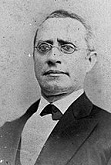


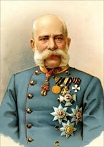










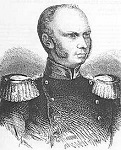



















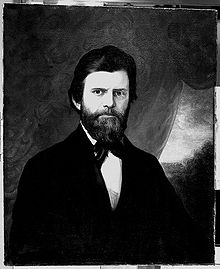



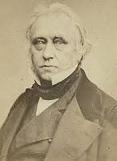












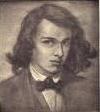




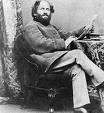

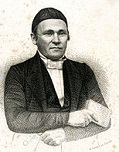

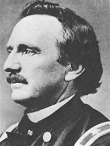


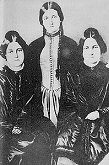















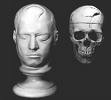

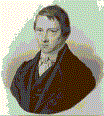



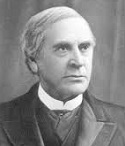
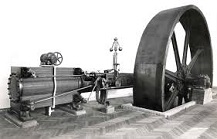
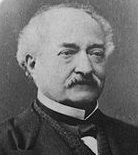

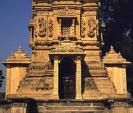


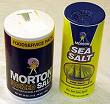
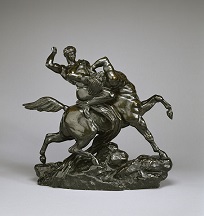
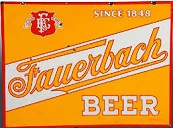
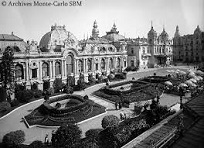
1848 There is a cholera epidemic in E North Am. (ends 1849), killing 1K in Philly; the strain disappears by modern times. After crop failures and recessions leave many of the poor on the verge of starvation, the European Revs. of 1848 (Springtime of Nations) (Springtime of the Peoples) (Year of Rev.) sees liberal revs. er, spring up simultaneously across Europe; only the Euro states of Britain, Russia, Netherlands, Poland, Serbia, and the Ottoman Empire are spared; too bad, most of them are quickly quashed, with tens of thousands tortured and killed, although the social changes later prove profound; "Society was cut in two: those who had nothing united in common envy, and those who had anything united in common terror" (Alexis de Tocqueville); Russia suffers from a major cholera epidemic, unusually dry weather causing fires and a bad harvest; at the start of the year, revolution-ripe Ugly Betty Italy is still divided into the Kingdom of Sardinia (incl. Piedmont, Genoa, Nice, Savoy), the Austrian provinces of Lombardy and Venetia, the duchies of Parma and Modena, the Hapsburg grand duchy of Tuscany, the Papal States (incl. Romagna, Ancona, Rome), and the Bourbon kingdom of the Two Sicilies. Make a run for the border? On Jan. 2 after the All Mexico idea of annexing Mexico by force is toyed with and dumped (making Pres. Polk reluctant to sign a treaty with Mexico yet), with S.C. Sen. John C. Calhoun uttering the soundbyte: "[W]e have never dreamt of incorporating into our Union any but the Caucasian race - the free white race. To incorporate Mexico would be the very first instance of the kind of incorporating an Indian race; for more than half of the Mexicans are Indians, and the other is composed chiefly of mixed tribes", and John O'Sullivan uttering the soundbyte: "There is no growth in Hispanic America... How would it kick the beam against the simple, solid weight of the two hundred and fifty, or three hundred millions - and American millions - destined to gather beneath the flutter of the stripes and stars, in the fast hastening year of the Lord 1945?", formal peace talks between the proud WASP U.S. and defeated BHRC (Brown Hispanic Roman Catholic) Mexico begin at the village of Guadalupe Hidalgo outside Mexico City, where what's left of the Mexican govt. is holed-up, trapped like brown rats by white wolves?; on Feb. 2 after Nicholas P. Trist engages them in brinksmanship, down-on-its-knees Mexico signs the grossly 1-sided dirty-deal Treaty of Guadalupe Hidalgo, ceding all of Texas above the Rio Grande, plus New Mexico and Calif. (incl. the Nevada region), a total of 529,189 sq. mi. (half of all Mexican territory, incl. the modern states of Calif., Nevada, Utah, and parts of modern Ariz., N.M., Colo., and Wyo.) (the old Aztec homeland of Aztlan?), giving the U.S. a new Am. Southwest and making it a continental power, with a 1,952-mi. 4-state (Texas, N.M., Ariz., Calif.) border with Mexico, while making "reconquista" a perennial Mexican cause, and becoming the first time that the lily-white U.S. actually doesn't want to absorb a people or steal all of their land, preferring to create a border with them racial underclassers safely on the other side, all nicely color-coded for inferiority or separated by language, religion and culture, or both; the rev.-free U.S. has completed its transformation from a cute little agrarian repub. into a continental giant; in return for the land grab the U.S. agrees to pay Mexico $15M ($300M in 2009 dollars, about enough to buy a major league sports team) and assume the claims of U.S. citizens against Mexico up to a $3.75M limit; the treaty is signed days before news of the Calif. gold strike is received; white supremacist gringo (Anglo) disdain for "inferior" Mexicans is firmly implanted, while the continental U.S. is pretty much rounded out (modulo the Gadsden Purchase in 1853); the messy town of Mesilla on the Camino Real N of El Paso is designated as the border of Mexico, causing native Mexicans on the E side of the Rio Grande River to settle there, but they have to move again in 1854 after the Gadsden Purchase gives it to the U.S.; the El Camino Real becomes an extension of the Santa Fe Trail from Mo., and the gringos begin calling it the Chihuahua Trail; Pres. Polk is actually miffed at the terms, since he is eyeing the growing movement that wants to annex all of Mexico, but his fear of Congress' shenanigans causes him to submit the treaty to them, and they ratify it on Mar. 10, ending the Mexican-Am. War (begun 1846); the last Americans leave Veracruz by the end of July, bringing back with them a new taste for cigars (and Mexican senoritas?), although chewing tobacco is still preferred in the South; the Mexican War costs the U.S. 1,721 KIA, 4,102 wounded, and 11,155 dead of disease (total 13,283), at a total cost of $98M; the first successful offensive U.S. war is also the first reported by modern war correspondents, and the first in which West Point graduates play a major role (Robert E. Lee, U.S. Grant, Thomas "Stonewall" Jackson, George B. McClellan, George Pickett, George Meade, Braxton Bragg, et al.); "There will be added to the United States an immense empire, the value of which twenty years hence it would be difficult to calculate" (Polk); "Alas, poor Mexico, so far from God and so close to the United States!" (Mexican pres. Porfirio Diaz). On Jan. 12 Scottish-born British statesman James Andrew Broun-Ramsay, 1st Marquess of Dalhousie (1812-60) becomes gov.-gen. of British India (until Feb. 28, 1856), going on to introduce the "three great engines of social improvement", passenger trains, the electric telegraph, and uniform postage, and consolidate East India Co. rule in India, engaging in centralizing activity and expansive annexations which, combined with his overbearing self-confidence later get him accused of fomenting the Indian Rebellion of 1857 - say 'IN-dya' and squint through your pince nez? On Jan. 12 Europe's first rev. of the Year of Revolution occurs in Sicily on the birthday of despotic King Ferdinand II of the Two Sicilies after the brief unity and enlightened rule of Napoleon whets their appetite for nat. union and constitutional govt., triggering an Italian Rev. aiming at ending papal rule and instituting a dem. form of govt., spreading to Venice and Milan (Cinque Giornate); the rebels first take Palermo, then all of Sicily, triggering an uprising in Naples; Ferdinand yields on Jan. 27, accepting a French-style constitution, asking for England and France to mediate when they balk at the wording; too bad, on Apr. the Sicilians declare his deposition, and declare a provisional govt., electing the duke of Genoa (son of the king of Sardinia) as king of Sicily in June, which he declines; Mistah Big Stuff Ferdinand regroups, gains the support of reactionaries, then captures Messina in Sept., his excessive bombing earning him the title "King Bomba"; on Oct. 8 the French and British impose a 6-mo. armistice - the boys in the hood are always hard? On Jan. 14 French authorities ban a liberal banquet (rally), causing it to be reset for Feb. 22. On Jan. 20 Christian VIII (b. 1786) dies, and his son Frederick VII (1808-63) becomes king of Denmark (until Nov. 15, 1863), as concern over the stability of the Danish Helstat grows, and declares himself in favor of a new liberal constitution, declaring himself a constitutional monarch on Mar. 22; he offers Holstein and Lauenberg their own constitution and the right to join the Germanic Confederation, but at the urging of the Eiderdanes he declares Schleswig an inseparable part of Denmark, having the same constitution but its own Diet, which pisses-off the Germans in the area, who on Mar. 24 revolt and set up a provisional govt. for Schleswig-Holstein (northernmost 16 states of Germany, capital Kiel). Eureka, greedy gringos go for the gold in somebody else's territory, haha, their territory? On Jan. 24 (Wed.) a gold nugget is discovered by Sutter's partner James Wilson Marshall (1810-85) in the tailrace of Sutter's Mill (Sawmill) in Coloma on the Trinity River in the foothills of the Sierras in N Calif. 50 mi. NE of Sutter's Fort on the South Fork of the American River, launching the Calif. Gold Rush (ends 1855) (300K rush in, 100K+ stay, 28.4M troy oz. of gold at $18.89 an oz. worth $536M by 1859) after a publicity stunt is staged by Sutter's Fort store owner Samuel Brannan (1819-89), a Mormon elder hoping to make a fortune outfitting gold seekers in San Francisco, causing most of the town's 800 residents to head for the gold fields within a few days; Brannan becomes the first millionaire of the gold rush; on Aug. 19 the New York Herald reports the discovery, turning on the 500K pop. crowded in too small a space and plagued by horse manure, wild dogs and pigs, and drunks from cheap whiskey; several lucky early miners make sizeable fortunes fast and easy, the news feeding "gold fever"; in Aug. Sutter's son John Augustus Sutter Jr. (1826-97) arrives to help save the claim from squatters and thieves, in vain, causing Sutter Jr. in Dec. to begin laying out the city of Sacramento, Calif. 2 mi. S of New Helvetia on the Sacramento River (modern-day pop. 490K/2.4M), incorporating on Feb. 27, 1850 (oldest incorporated city in Calif.), which becomes an overnight success, causing the father to grow bitter at the son; it is chartered as a city in 1920; on Dec. 5 Pres. Polk confirms the discovery in his Fourth Annual Message, complete with an oyster tin full of gold, starting a nationwide and later a worldwide stampede known as the Forty-Niners, ruining Sutter's land grant with claim jumping, while gold fever is further pumped up by newspaper stories about gold nuggets lining the streets and gold dust so easy to harvest that one could coat oneself with sticky stuff and roll down a hill to collect it; others see the easy riches as proof that the Am. West is God's promised land for whites, and that the U.S. was meant to have Calif. not Indians and beaners; the mining puts mercury in San Francisco Bay, which ends up in fish. The original quit to live, or the original cigar-puffing Ahnuld? In Jan. the Tobacco War erupts when Italians protest Austrian control of the tobacco monopoly, and the citizens of Milan stop using tobacco, causing Bohemian-born Austrian marshal Johann Josef Wenzel Radetzky von Radetz (1766-1858) to order his soldiers to smoke large cigars in the streets - that'll fix 'em: secondhand smoke? In Jan. Charles Albert expands the Piedmont army. In Jan. after trying to stop the British from messing with him in vain, Gen. Andries Pretorius picks up and moves farther N past the Vaal River (trans-Vaal, get it?), settling in the Magaliesberg Mts., then declares a "war of freedom", and raids back S, capturing Bloemfontein on July 20, but is defeated on Aug. 29 at the Battle of Boomplaats (Boomplaas) by the Brits under lt. gen. Sir Harry Smith (Henry George Wakelyn Smith) (1787-1860), and skedaddles back N, after which the Brits put a Ł2K reward on his head (until 1852). On Feb. 1 London Tribune reporter (managing ed. Richard Henry Dana Jr. - a coincidence? Did he mention his California days?) Karl Marx (1818-83) and Friedrich Engels (1820-95) pub. The Manifesto of the Communist Party in London as a broadside for the coming revolutions, containing the immortal soundbyte: "When, in the course of development, class distinctions have disappeared, and all production has been concentrated in the hands of a vast association of the whole nation, the public power will lose its political character. Political power, properly so called, is merely the organized power of one class for oppressing another. If the proletariat during its contest with the bourgeoisie is compelled, by the force of circumstances, to organize itself as a class, if, by means of a revolution, it makes itself the ruling class, and, as such, sweeps away by force the old conditions of production, then it will, along with these conditions, have swept away the conditions for the existence of class antagonisms and of classes generally, and will thereby have abolished its own supremacy as a class"; when the little revvies all fizzle the document is repub. as The Communist Manifesto 20 years later, and those who think that socialism can be implemented bloodlessly are labelled as "utopian socialists"; of course the new Communist movement is militantly atheistic and anti-clerical. On Feb. 2 the first Chinese immigrants to the former Spanish mission (founded June 29, 1776) of San Francisco in Calif. (modern-day pop. 870K/8.7M) arrive in the Eagle one week after the Calif. Gold Rush starts, adding to the seven already there; the city's pop. grows from 1K in 1848 to 25K in Dec. 1849; the city is incorporated on Apr. 15, 1850. On Feb. 8 a student revolt in Padua, Italy draws citizens on their side, holding up in the univ. and Caffe Pedrocchi. An ocean away from Europe's troubles, the white American mojo is rising, or, L.A. woman? On Feb. 13 Charles Albert yields to liberal demands and promises to create a civic guard and a 2-chamber parliament, and lowers the price of salt. On Feb. 14 Pres. Polk becomes the first U.S. pres. to be photographed while in office, by Mathew Brady. The French Revolution of 1848 is all about the workers? On Feb. 22 the French govt. stops a liberal banquet in Paris at the last minute after a public procession, causing students and workers to protest and erect barricades, beginning the February Rev. (ends Dec. 2), which controls Paris by Feb. 24, displaying a red flag which comes to represent the left wing of the Second Repub.; on Feb. 23 after being deserted by both sides, former football hero (only the strong survive) Louis-Philippe replaces conservative PM Francois Guizot with Count Louis-Mathieu Mole (Molé) (1781-1855) to appease the middle class, then on Feb. 24 replaces him with former PM (1836-40) Louis Adolphe Thiers, who is unable to gather support and resigns, causing Louis-Philippe to abdicate in favor of his grandson the Comte de Paris, then flee Paris with his family to England, where he spends the last two years of his life in Clarement as the Comte de Neuilly, trying to count sheep; the comte's mother Helene Louise of Mecklenburg-Schwering (1814-58) appears before the chamber of deputies, and rioters enter calling for a republic, which is formed with Romantic poet Alphonse Marie Louis de Prat de Lamartine (1790-1869) leading the right wing, and Socialist historian Louis Jean Joseph Charles Blanc (1811-82) leading the left wing; on Feb. 24 renowned physicist-astronomer Dominique Francois Jean Arago (1786-1853) leaves his job as dir. of the Paris Observatory to join the French provisional govt., and becomes ministry of marine and colonies, improving rations and abolishing flogging, then ministry of war on Apr. 5, abolishing black slavery in French colonies; on Feb. 25 the new govt. recognizes workers' rights, and on Feb. 26 it sets up nat. workshops to provide work relief (2 francs a day if you work, 1.5 if you don't, 2 days a week), which are flooded with the unemployed; on Feb. 27 after an abortive coup the govt. passes up the red flag for the 1789 French Rev. tricolor as the nat. flag, with the motto "liberty, equality, fraternity"; on Feb. 28 the Luxembourg Commission is created to develop a permanent plan for labor, and on Mar. 2 sweat labor is abolished, and work days reduced to 10 hours in Paris and 11 in the provinces; on May 10 Francois Arago becomes PM #25 of France (pres. of the executive power commission); on June 24 the entire commission resigns, and it all thuds to a halt. On Feb. 23 after sitting for a daguerrotype photograph (becoming the first U.S. pres. to have his picture taken), former U.S. pres. J.Q. Adams collapses on the floor of the U.S. House of Reps. while preparing to deliver a speech, and dies after more than 50 years of public service; his seat in the House is taken by Horace Mann (until 1853), who resigns from the Mass. board of ed.; the House Chamber has a small disk installed on the floor to mark the spot where he is stricken, and in 1870 after the Old Hall of the House (opened 1807) closes in 1857, it is turned into Nat. Statuary Hall - must have been all the excitement? On Feb. 29 a financial panic begins in Pressburg, Hungary among merchants after news of the French rev. reaches them, followed by a bank run on Mar. 5 in Buda; on Mar. 3 Hungarian lawyer Lajos Kossuth (1802-94), who had spent from 1837-42 in prison on trumped-up political charges, making him a hero gives a speech in the Diet calling for a repub. constitution; on Mar. 15 the 1849 Hungarian Rev. (ends 1850) begins with a march of peasants and students in the city of Pest (E side of Danube) that spreads to the nearby town of Buda (W side of Danube), calling for the Twelve Points, followed by anti-Jewish riots; the rev. govt. of Count Lajos Batthyany (Batthyány) (1807-49) is proclaimed on Mar. 30; imperial troops invade from Croatia on Sept. 11, triggering a year-long Hungarian war of independence; Kossuth is proclaimed pres. of the Committee for the Nat. Defense of Hungary, and recruits a peasant army, creating a red-white-blue (pan-Slavic colors) tricolor Croatian Flag; the Croatians are halted on Sept. 28; Austrian Field Marshal (military gov. of Bavaria) Prince Alfred I (Alfred Candidus Ferdinand) of Windisch-Graetz (Windisch-Grätz) (1787-1862) attacks the revolutionists in mid-Dec., then halts for the winter; horse and babe-loving Count Julius (Gyula) Andrassy Sr. (1823-90) begins his rise in Hungary. In Feb. Grand Duke Leopold II of Tuscany grants a liberal constitution. On Mar. 1 the French rev. spawns the copycat March Rev. in Baden, Germany, followed by others in Vienna on Mar. 12, Parma, Italy on Mar. 13, Hungary on Mar. 15, Venice, Italy on Mar. 22, and Naples, Italy on May 15 - business is beautiful? On Mar. 2 Muhammad Ali's eldest son Ibrahim Pasha (1789-1848) becomes wali and unrecognized khedive of Egypt and Sudan, dying 4 mo. later on Nov. 10. On Mar. 4 king (since 1831) Charles Albert (1798-1849) of Sardinia-Piedmont grants the Statuto, a conservative constitution. On Mar. 6 Frederick William IV appeases revolutionaries with a promise to call the Prussian Landtag, and on Mar. 8 relaxes press censorship; on Mar. 10 street demonstrations begin in Berlin, with barricades erected so fast that surprised Frederick William IV goes out on his City Palace (Stadtschloss) balcony to talk to them, and has to remove his hat as a sign of respect before they listen; army troops are called out to disperse them, but when they hold their own he promises them a new constitution, which Prussian minister Bismarck forever thinks sucks eggplant? On Mar. 11 a meeting in Prague draws up the Twelve Articles of St. Wenceslas demanding Czech-German equality in govt. services and education; on Mar. 13 students march to the Landhaus in Vienna to present a petition, are blocked, spread throughout the streets, and then fired on by the authorities, starting rioting; on Mar. 13 useless old fart yesterday's news Klemens von Metternich resigns as state chancellor (since 1809); on Mar. 15 Austrian emperor (ince 1835) Ferdinand I (1793-1875) summons the Diet, which on Apr. 25 promulgates a new constitution excluding workers and women, which fails to satisfy the revolutionists; on May 9 a new elector law gives the lower middle class and peasants the vote but still excludes workers and women, causing the Storm Petition (Sturmpetition) to be presented by revolutionists to the Hofburg, and the emperor and his family to flee Vienna for Innsbruck; on May 26 the govt. retrenches, sending the army to fight the rebel-controlled Nat. Guard, and barricades to go up throughout Vienna as a committee of safety begins controlling the city. On Apr. 27 after an uprising in the Grand Duchy of Posen against the Prussians begins, Polish nationalist poet Juliusz Slowacki (1809-49) addresses the nat. assembly, uttering the soundbyte: "I tell you that a new age has dawned, the age of holy anarchy"; too bad, the revolt is crushed by May 9, and he is arrested and exiled to Paris, soon croaking. On June 2-12 the First Pan-Slav Congress in Prague, composed of Czechs led by Bohemian historian Frantisek Palacky (Palácky) (1798-1876) ("Father of Bohemia") calls for Slavic solidarity; on June 12 Princess Windisch-Graetz, wife of Prince Alfred Windisch-Graetz is accidentally killed in a student demonstration, causing him to call in reinforcements and begin repressive measures, bombarding Prague on June 17 and crushing the Czech rev. movement; on Aug. 23 the Battle of the Prater sees demonstrating mineworkers in Vienna crushed by the govt.; on Oct. 6 a last demonstration is held, backed by the Nat. Guard, causing the emperor (since 1835) Ferdinand I to leave Vienna again and the army to be called in, which captures Vienna on Oct. 11; on Dec. 2 Ferdinand I abdicates in favor of his nephew, who becomes Hapsburg emperor Francis Joseph (Franz Josef) I (1830-1916) (until Nov. 21, 1916) (motto "Viribus Unitis" or "Mit Vereinten Kraften", meaning "With united forces"), going on to reign over his heterogeneous empire 68 duck pluckin' years and become the longest-reigning monarch in Euro history after Louis XIV of France (1643-1715) (72 years 110 days) and ? (??-??) (?? years), speaking fluent German, Hungarian, and Czech, plus a little Italian and French, and nearly always appearing in military uniform, later telling Pres. Theodore Roosevelt that he's the last remaining monarch of the Old School; a new govt. is established by Bohemian Prince Felix Ludwig von Schwarzenberg (1800-52) (nephew of the prince of Schwarzenberg who was a big Austrian field marshal during the Napoleonic Wars), who is appointed pres. of Austria in Nov., and goes on to restore the Hapsburg Empire before his premature death in 1852 throws a monkey wrench in it - the French Rev., the Rev. of 1848, and WWI are linked by this one Austrian dude, Arnold Schwarzenegger's real grandfather? On Mar. 18-22 the massive repub. demonstration known as the Five Days of Milan in Lombardy is opposed by the Austrian govt. and the liberals, and Marshal Radzetsky's troops in Milan are kept out of the demonstration until the govt. palace is attacked, but the barricades hold him; on Mar. 18 a liberal-radical govt. is established in Milan with Carlo Cattaneo (1801-69) as head, but the radicals are soon ousted and rural demonstrators are kept outside the city walls; meanwhile the Piedmontese intervene, and on Mar. 22 Sardinia-Piedmont (incl. Nice and Savoy) declare war on Austria, beginning the Austrian-Piedmontese War (ends 1848), sending troops to Milan on Mar. 26; Pope Pius IX waffles, refusing to release troops to attack a Roman Catholic nation, then on Aug. 29 publishing an ambiguous statement supporting all Catholics and declaring neutrality of the Papal States. On Mar. 20 in Bavaria the liberals force king (since 1825) Ludwig I to abdicate in favor of his son Maximilian II (1811-64), who on Mar. 28 becomes king of Bavaria (until Mar. 10, 1864). On Mar. 22 news of the Vienna rising causes the Repub. of San Marco (Venice) (ends Aug. 27, 1849) to be declared after Daniele Manin (1804-57) and his supporters seize Venice's navy yard, but fail to secure the Austrian fleet, which is filled with sympathetic sailors. On Mar. 23 student-led revolutionaries cause Austrian marshal Josef Radetzsky von Radetz and his forces to evacuate Milan, and the revolutionists declare a provisional govt. On Mar. 28-29 Horseshoe Falls on the Niagara Falls freezes completely for 30 hours, allowing people to walk on it. On Mar. 29 John Jacob Astor (b. 1763) dies, leaving his $20M fortune to his son William Backhouse Astor Sr. (1792-1875), who becomes the wealthiest person in the U.S. (last Astor to do it). On Mar. 31 the Fox Sisters, Leah Fox (1814-90), Margaret Fox (1836-93), and Katherine "Kate" Fox (1838-92) of Hydesville, N.Y. begin claiming that spirit rappings are coming out of their farmhouse in Hydesville, Arcadia (E of Rochester), N.Y. (guess where, the burned-over district of W. N.Y., home of Millerism and Mormonism), launching the Spiritualist Movement in the U.S., which attempts to communicate with dead spirits while raking in money from crowds of dupes; in 1888 after making fans of Horace Greeley, William Lloyd Garrison, James Fenimore Cooper, William Cullen Bryant, Sojourner Truth et al., they come clean, admitting that they caused the rappings themselves via trick joints which cause explosions in gas bubbles in synovial fluid, stinking the movement up bigtime, which doesn't stop it from reaching 8M followers by 1897 in the U.S. and Europe. In Mar. Baden, Wurrtemberg and Saxony incl. liberal ministers in their govts. to appease the revolutionaries, and the S German govts. meet in Heidelberg and decide to call a meeting of the liberal leaders to plan the unification of Germany; on Mar. 31 the Frankfurt am Main Parliament (which incl. poet Johann Ludwig Uhland) rejects the radical program in favor of the liberal, calling for the election of a nat. assembly and male suffrage for every "independent" male over age 30, which is later interpreted so as to excluding working men; 60-y.-o. old fart gymnastics man Friedrich Ludwig Jahn is also elected to the Frankfurt parliament - the first Gov. Ahnuld? In Mar.-Apr. railroad and waterway workers in Germany begin violent protests, destroying the Taunus Railroad on Apr. 5.; meanwhile other German workers rise, organizing strikes and demanding higher wager; peasants, esp. in the south also rise against the manors. On Apr. 3 the Chicago Board of Trade in Ill. is founded by 83 merchants at 101 S. Water St. On Apr. 8 a provisional govt. is formed in Lombardy. On Apr. 10 the monster Kennington Common Procession of Chartists presents a petition to Parliament, which is found to have not 5M but only 2M signatures, many of them forged, and the resulting ridicule finally kills Chartism, and all popular agitation for parliamentary reform in England along with it for many years. In Apr. 15-16 the Pearl Incident sees 70 runaway slaves from Washington, D.C., incl. a former slave of Pres. Madison who had worked at the White House stage a publicity stunt to make the U.S. think twice about extending slavery, hiring the schooner Pearl to take them down the Potomac River to Chesapeake Bay, but their plot is discovered, causing a steamboat to set out from Georgetown to catch them, resulting in a dramatic escape to freedom. On Apr. 23 French elections give moderate (Lamartine) Repubs. a V (500 seats), with Louis Blanc's left wingers winning less than 100, the Legitimists (Bourbon royalists) 100, and the Orleanists 200. On Apr. 30 Sardinia defeats the Austrians at the Battle of Pastrengo, and again on May 30 at the Battle of Goito. In Apr. military-school grad. Franz Sigel (1824-1902) leads the "Sigel-Zug", a 4K-man volunteer rev. militia in a siege of Freiburg, only to be annihilated on Apr. 23 by prof. Prussian and Wurttemberg troops; after becoming CIC of the Baden military next year, he ends up fleeing to Switzerland, England and the U.S., becoming an Am. Civil War Union gen. On May 3-9 the May Uprising in Dresden lures Richard Wagner into taking part, and when it is quashed he is forced to flee to Zurich - play that funky music, white boy? On May 15 workers in Paris riot over the harsh conditions of the nat. workshops, attempting to overthrow the newly elected Constituent Assembly; artisans also participate, changing the urban social protest base?; Louis Auguste Blanqui (1805-81) of France, who was pardoned early in the year from a life sentence for an 1839 insurrection receives a 10-year sentence (until 1859), using the time to study up on Socialism, originating the theory of the dictatorship of the proletariat, which later is the soap for doing all the Russian dirty Lenin? On May 15 a new uprising in Naples led by radicals mad at Ferdinand for not revising the constitution is put down, and the radicals driven out of Naples; the Nat. Guard is dissolved. On May 18 the Frankfurt Parliament (Nat. Assembly) convenes in the Paulskirche (until May 31, 1849), becoming the first freely elected parliament for all of Germany (39 member states), with mainly middle-class reps. On May 22 the Prussian nat. assembly convenes with a strong leftist element, drafting a new constitution, countering the govt.'s proposed new Belgian-style constitution drafted by Rudolf Camphausen. On May 29 "Badger State" (after 1820s lead miners who lived in caves in hillsides like badgers) Wisconsin (Wisc.) is admitted as the 30th U.S. (free) state, becoming the last Northwest Territory state; on June 7 Dem. Nelson Dewey (1813-89) becomes Wisc. gov. #1 (until Jan. 5, 1852). On May 29 Charles Albert intervenes in the Austrian-Piedmontese War in an attempt to unite Piedmont and Lombardy. On May 29 a referendum approves a union of Piedmont and Venice. In May the Blaj Assembly demands that Romania become an autonomous entity of the Austrian Empire, with Transylvanian orthodox bishop (St.) Andrei Saguna (1809-73) as PM #1, unsuccessfully trying to effect a compromise until Sept. when the conflict between the Hapsburgs and Hungarians erupts, after which in Oct. they are allowed by Vienna to create a loyalist admin. in Sibiu, Transylvania. In May after becoming the first Euros to enter Africa from the Indian Ocean coast in 1846, then setting out last Oct. 16 to find the "mountain of Kenya", German Lutheran missionary explorers Johann Ludwig Krapf (1810-81) and Johannes Rebmann (1820-76) claim to sight 16,100-ft. (4.9km) Mount Kilimanjaro, incl. seeing snow, which is disbelieved for 12 years; on Dec. 3, 1849 Krapf claims to sight 7,058-ft. Mt. Kenya (with three peaks, Batian, Nelion, and Lenana, all named after great local ancestral chiefs), the #2 highest mountain in Africa, containing 12 glaciers despite being near the equator; nobody believes him, and it takes 34 years to rediscover it - that story's a pile of krapf? In May after Pres. Polk refuses to run for a 2nd term the Dems. nominate pro-"squatter sovereignty" Mich. Sen. (1845-57) and U.S. war secy. (1831-6) (who supported the forcible removal of Indians beyond the Mississippi and backed Pres. Jackson in the nullification crisis) Lewis Cass (1782-1866) at the 1848 Dem. Nat. Convention in Baltimore, Md.; the Barnburners (N.Y. Dems.) bolt the convention, join up with James G. Birney's Liberty Party (their candidate John P. Hale withdraws), and form the anti-slavery Free-Soil Party, opposing admission of new slave states into the Union, which on Aug. 9 nominates Martin Van Buren for pres. and Charles Francis Adams (son of J.Q. Adams) for vice-pres. at its convention in Buffalo, N.Y.; U.S. Supreme Court judge (1830-61) John McLean (1785-1861) was the original pres. candidate until the abolitionist North Star newspaper revealed in July that he once gave instructions to the jury in the Crosswait trial telling them it was a crime to thwart any attempt by a white person to respossess a runaway slave, pissing-off abolitionist Salmon P. Chase, who got him replaced. On June 9 the Miracle of the Gulls sees hordes of flightless katydids threaten the Mormons' first crop of 5K acres of grain, until in June flocks of Calif. seagulls from the Great Salt Lake arrive just in time, and they are saved, causing the Morons, er, Mormons to believe it's a miracle and make the sea gull the state bird of Utah, complete with a Seagull Monument in Salt Lake City. On June 11 the Wallachian Rev., led by Nicolae Balcescu (1819-52) takes over Bucharest for two days until it is quashed by the Ottomans; on Sept. 13 Balcescu is arrested, and ends up in exile. On June 22-26 the June Days Rebellion starts when workers erect barricades in Paris, and are ruthlessly crushed by Gen. Louis Eugene Cavaignac (1805-57); the govt. backlash ends up in labor legislation reversed, and new restrictions on civil liberties; Louis Blanc flees to England (until 1870). On June 28 Archduke John of Austria is appointed provisional executive head of Germany, but never sets up a govt. because of the Schleswig rising, which causes Prussian troops to be sent at the request of the Frankfurt Parliament. In June with slavery now the big nat. issue, and the two blocs balanced at 15 states each, but neither party able to address it because each party has national pretensions and is internally split, the Whigs pass over Henry Clay and nominate Mexican War hero, La. planter, and slave owner (father-in-law of Miss. Sen. Jefferson Davis) Gen. Zachary Taylor at their convention in Baltimore, Md., with former New York Rep. Millard Fillmore as vice-pres., causing the Conscience Whigs to join the new Free Soil Party, which nominates Martin Van Buren for pres. and Charles Francis Adams for vice-pres., then rejoin after the election, with many Conscience leaders later helping found the Repub. Party. Never trust anyone over 30? On July 4 Congress authorizes yet another new U.S. flag, breaking the 20s threshold with 30 (design #12), incl. Wisc. On July 4 15K-25K attend a celebration in Washington, D.C. for the laying of the cornerstone to the Washington Monument (finished 1884); Ill. Rep. Abe Lincoln attends, along with James and Dolly Madison. On July 20-Sept. 20 the Frankfurt German Workers' (Labor) Congress drafts the Industrial Code, demanding a return to the traditional guild systems and a corporatist state. On July 23-26 Austrian marshal Josef Radetzsky defeats the Piedmontese army of Charles Albert at the Battle of Custoza, and on Aug. 9 an armistice with Piedmont is signed at Vigevano in Lombardy; on Aug. 7 Radetzky enters Milan promising leniency, and signs the Armistice of Salasco on Aug. 9 with Piedmont, which gives up Lombardy; the Austrian fleet blockades Venice, and forces the Sardinian troops to leave. Millennium Fever Cushion gives even women courage to step out? On July 19-20 the Seneca Falls Women's Rights Convention in N.Y., organized by wealthy married feminists Elizabeth Cady Stanton (1815-1902) and Lucretia Mott (1793-1880 (a Quaker) meets at the Wesleyan Chapel, becoming the world's first women's rights convention, attended by over 100, incl. 32 male lechers, er, sympathizers, with the aim of enfranchisement of women; Stanton is the principal author of its Declaration of Sentiments and Resolves, patterned after the U.S. Declaration of Independence, with the soundbytes: "All men and women were created equal" and "The right is ours, have it we must, get it we will"; the public reaction is to ridicule the "shrieking sisterhood" and accuse them of being drunken sluts or whores, with Horace Greeley and William Lloyd Garrison being among the few supporters; suffragist speakers are later attacked by gangs of street bullies; the convention is also attended by sisters Sarah Grimke (Grimké) (1792-1873), Angelina Grimke (Grimké) (1805-79), Quakers James Mott (1788-1868) (hubby of Lucretia), and Amelia Jenks Bloomer (1818-94); spinster teacher Susan Brownell Anthony (1820-1906) (back when that doesn't mean lezzie teacher?) doesn't attend, and doesn't meet Stanton until Mar. 1851 - there's a reason we call it merry maids? A duck, a hen, a cuckoo and a nightingale, with more birds to come, robins and larks? In July the Young Ireland Movement starts an unsuccessful rising in famine-depleted Ireland; this time the rebels come from the middle class, and the leader is lawyer-journalist John Mitchel (1815-75), ed. of The Nation and The United Irishman, who is railroaded to 14 years in Van Dieman's Land (Tasmania) for "felony treason" for his writings, is given a "ticket of leave" in Bothwell (46 mi. from Hobart Town), where he begins his Jail Journal: Five Years in British Prisons, escaping to the U.S. in 1853, returning to Ireland in 1874 and getting elected as MP for Tipperary, then refused his seat because he is a convicted escaped felon; novelist Charles Joseph Kickham (1828-82) lucks out this time, but gets 14 years in 1865, and is pardoned in 1869, sticking to lit. work afterward. In July-Sept. Edward Fitzgerald Beale of the U.S. Navy crosses from San Francisco, Calif. to Mexico in disguise to bring the Mexican govt. proof of Calif. gold. On Aug. 14 the Oregon Territory is established; an act provides that income from two sections (1,280 acres) in each township will be set aside for education; next year the territorial legislature passes laws proviidng for a free public school system. On Aug. 16-18 the 300-400 member Junker Parliament in Berlin repudiates the attempted abolition of manorial rights in the name of protection of property, which actually is popular in the countryside? On Aug. 26 the Armistice of Malmo (Malmö) is signed by Denmark and Prussia, and Prussian troops evacuate Schleswig, pissing-poff German nationalists, causing the Sept. Crisis of 1848 in Germany as the Frankfurt nat. assembly rejects the armistice then flip-flops and accepts it by a narrow margin on Sept. 16 after 10K meet in Worringen on Sept. 10 and call for a "Red Repub.", followed by an armed uprising in Frankfurt am Main against the assembly on Sept. 18, which is quashed by Prussian and Austrian troops, only to see a "German Repub." proclaimed on Sept. 21 in Lorrach by Gustav (von) Struve (1805-70), rescinding all debts owed to the aristocracy, state and Church, which is also put down by govt. troops. In Aug. uprisings in Tuscany and Bologna are put down by liberal govts. next year Bologna is taken by Austria (until 1859). On Sept. 12 the new 1848 Swiss Federal Constitution replaces the Pact of 1815, organizing Switzerland as a federal union modeled on the U.S., with a council of state (Standerat) and a nat. council (Nationalrat) elected by universal male suffrage; the 7-member federal council (Bundesrat) is elected by the two chambers, with a pres. that has weak powers. On Sept. 5 Persian shah (since Oct. 23, 1834) Mohammad Shah Qajar (b. 1808) dies of gout, and on Sept. 17 his ignorant son Naser (Nasser) (Nasr) al-Din (ed-Din) Shah (1831-96) becomes Qajar shah #4 of Persia (until May 1, 1896), going on to rule as a dictator and persecute Babis and Bahais while leading a dissolute sex life and letting Russia take it apart piece by piece for almost 50 years; at first he retains capable minister (since May 12) Amir Kabir (Mirza Taghi Khan Farahani) (807-52), but has him executed on Nov. 13, 1851 after three years, and sells governorships of cities to his servants and borrows large sums of money to pay for two dissolute trips to Europe accompanied by the boy Malijak, who he believed brought him good luck; overhearing some intellectuals talking behind his back, he had them thrown in a well, shot, and buried alive; he becomes the first Persian monarch to write and pub. a diary. On Sept. 6 Henry David Thoreau finally leaves Walden Pond, where he's been communing with Nature since July 4, 1845. On Sept. 13 U.S. railroad worker ("Am. Crowbar Case") Phineas P. Gage (1823-60) gets a 3-ft. rod through the jaw and brain in Cavendish, Vt., which doesn't kill him, but destroys his frontal lobes and changes his personality, causing a rev. in thinking about brain functions being localizable. On Sept. 24 Branwell Bronte (b. 1817) dies shortly after sister Anne pub. her 2nd novel (Aug.), then Emily (b. 1818) dies of TB on Dec. 19, and Anne (b. 1820) dies of TB next May 28, leaving only Charlotte, who lasts until 1855, for a total of ten years of producing madly-in-love classic lit.? On Sept. 24 Charles Fontayne and William Porter take the first daguerreotype of a human in Cincinnati, Ohio? On Oct. 11 the Netherlands adopts a liberal constitution, which becomes the model for all future constitutions (until ?). On Nov. 4 the French nat. assembly drafts a new constitution with a strong pres. and single chamber, both elected by universal direct male suffrage; the new motto is "liberty, equality, fraternity, plus family, work, property and public order"; the right to work is replaced by the right to fraternal assistance; it is repealed on Jan. 14, 1852. On Nov. 7 the 1848 U.S. Pres. Election sees for the first time voters in all 30 U.S. states (except Mass.) go to the polls on the same day; Taylor receives a slight majority of the popular vote (163 electoral votes to Cass' 127); Van Buren receives 10% of the popular vote, not carrying a single state but costing Cass the election; former N.Y. gov. William H. Seward is elected U.S. Sen. from N.Y. On Nov. 10 Prussian troops under Gen. von Wrangel return to Berlin, and a state of siege is declared in Prussia after Frederick William IV appoints Count Friedrich Wilhelm, Count Brandenburg (1792-1850) (son of Frederick William III) as PM and orders the moving of the Prussian Assembly to Brandenburg; on Dec. 5 the assembly is dissolved and a new constitution is proclaimed, creating three unequal classes of voters based on wealth, with the divine right of kings affirmed. On Nov. 15 conservative papal minister of the interior (former French ambassador to Rome) Pellegrino Rossi (Luigi Edoardo Pellegrino, Count Rossi) (b. 1787) is assassinated on the steps of the assembly, causing demonstrations in Rome on Nov. 16, backed by the army and nat. guard, causing Pope Pius IX to agree to a radical govt. and the election of a nat. assembly; the new govt. abolishes the flour tax and begins public make-work programs; on Nov. 24 the pope flees Rome for Gaeta in Naples. Don't them Frogs ever learn not to trust Napoleons to lead them? On Dec. 10 Prince Charles Louis Napoleon Bonaparte (1808-73), nephew of Napoleon I is elected pres. (until May, 1852) of the new French Second Repub. with a landslide V of 5,327,345 votes to 1,879,298 for his opponent Cavaignac; on Dec. 20 he is sworn in, and appoints an Orleanist ministry despite a Republican nat. assembly. Serfdom is abolished in Austria. The French declare Berber-filled Algeria an integral part of France (ends 1962). A liberal revolt in Guatemala causes Rafael Carrera to resign, but he stages an army coup, driving the liberals into exile. A revolt of the British and their Miskito Indian allies in San Juan del Norte (Greytown) in Nicaragua proclaims the Kingdom of Mosquitia (ends 1894); the U.S. (always on the side of the kiddie kabob when the episode airs? backs the conservative Nicaraguan govt. The Second Anglo-Sikh War begins (ends 1849). Nova Scotia becomes the first area in Canada to receive local self-govt. Now that the military is down in the southwest, they might as well mop up some loose ends? The Navajo Wars with the U.S. govt. begin (end 1868). Ala. Dems. clamor for a federal slave code to protect the property of slaveholders in the new territories acquired from Mexico in the Platform of the Alabama Democracy, authored by former U.S. rep. William Lowndes Yancey (1814-63). The Treason Felony Act of 1848 is passed in Britain, making it a crime to "compass, imagine, invent, devise", or intend to "move or stir" any foreigner to "invade the United Kingdom or any other country belonging to the Queen". The first Public Health Act is passed in Britain. After lobbying efforts by Paulina Wright Davis (1813-76), N.Y. passes a law giving wives control of property owned before marriage. Sir John Franklin's expedition completes the discovery of the Northwest Passage despite all the other members of the expedition perishing; his failure to return causes the launching of the Franklin Relief Expeditions (ends 1859), which end up discovering and mapping major portions of Arctic regions of North Am. Philly-born explorer Elisha Kent Kane (1820-57) joins the U.S. Marine Corps to fight in the Mexican-Am. War, capturing and befriending Mexican Gen. Antonio Gaona and surveying the Gulf of Mexico. U.S. Army topographical engineer William Franklin Raynolds (1820-94) leads a party that ascends 18,491 ft. (5,636m) Pico de Orizaba (citlaltepetl), on the border between Veracruz and Puebla, tallest mountain in Mexico, setting an Am. alpine alt. record that lasts for 50 years. The settlement set up by Stephen W. Kearny in Nebraska Territory by the Platte River becomes tent fort Ft. Kearny; it is abandoned in 1871. The Shawnee (Sedalia) (Kansas) Trail across Indian Territory into Tex. is created by immigrants to Tex., later becoming known as the Texas Road, carrying Tex. Longhorn cattle N; it later becomes part of U.S. Route 69. The first 152 settlers aboard the Mooltan arrive in Dunedin on the the SE coast of South Island, New Zealand (modern pop. 100K). Kamehameha III institutes the Great Mahele (Hawaiian "to divide or portion") Western-style land ownership in Hawaii, awarding five land divs. to chiefs who supported his father, and keeping eight for himself. Vietnam cracks down on Roman Catholic missionaries and believers, leading to increased French attacks from Cochin China. The Am. Assoc. for the Advancement of Science (AAAS) is founded in Philadelphia, Penn., based on the British assoc., to make science a profession and keep quacks out and raise salaries? John Humphrey Noyes (1811-86) of Brattleboro, Vt. founds the Oneida Community of Biblical Communist Perfectionists in Putney, Vt.; after being expelled, it settles in Oneida, N.Y. (until 1880); its members believe that Christ has already returned, and that true believers should renounce private property and marriage, although they are permitted "complex marriage", i.e., sleeping around, with conception controlled by the leaders using eugenic principles; the group establishes several successful manufacturing enterprises, which raise their capital from $67K to $600K by 1880, when they are again expelled, and most members quit, marry, and form the joint-stock Oneida Community Ltd., while the remainder move to Canada. The Pre-Raphaelite Brotherhood of painters, poets, and critics is founded in England, seeking a return to the good ole non-industrial days before the time of artist Raphael, achieving the high moral tone and purity of medieval painting, refusing to paint anything they didn't paint before Raphael; members incl. Dante Gabriel Rossetti (1828-82), John Everett Millais (1829-96) (most famous), William Holman Hunt (1827-1910), and James Collinson (1825-81), who all sign their paintings "PRB"; Dante's brother, writer William Michael Rossetti (1829-1919) becomes their bibliographer; art critic Frederic George Stephens (1828-1907) models for them; it is later joined by homoerotic artist Simeon Solomon (1804-1905), Thomas Woolner (1825-92), Henry Holiday (1839-1927), and Sir Edward Coley Burne-Jones (1833-98), who produces some of the best - it's not time to widen the definition of beauty? U.S. army man Ulysses Grant (b. 1822) marries Julia Dent (1826-1902); they have 3 sons and 1 daughter - she put a dent in the granite? Russian writer Nikolai Gogol goes to the Holy Land, and on his return is taken in by priest Matthew Konstantinovsky, who convinces him that writing fiction is a sin, causing him to destroy his unpub. mss. - like Johnny Depp would probably do? The mother of French brothers Edmond de Goncourt (1822-96) and Jules de Goncourt (1830-70) dies and leaves them a legacy after getting them to promise to spend their lives in the closest association as lit. collaborators (Naturalism writers), and they never are apart except for a single 24-hour period until the death of Jules. The title of Clan MaDonald of Keppoch in Scotland goes dormant; in 2006 after a 20-year battle, Ranald MacDonald (1831-1916) wins a court battle to be named chief of the clan, getting a coat of arms, a tartan, and a motto, uttering the soundbyte The record has been straight; that is the point." The word "leak" is first used in a journalistic sense. The word "Old" is added to the title of the Farmer's Almanac, pub. since 1792. The term "World war" is coined by the People's Journal of Scotland. Elihu Burritt (1810-79) founds the pacifist League of Universal Brotherhood, which establishes branches in the U.S. and Europe; too bad, the U.S. Civil War causes the U.S. peace movement to implode? After the Brazilian slave ship L'Elizia was captured near Loango in 1846 and the slaves freed, Libreville on the Komo River near the Gulf of Guinea in modern-day Gabon (named in honor of Freetown, Sierre Leone) is founded by the French for them. Slavery is abolished on Reunion Island, and indenturied servants from India and SE Asia are brought in to work the sugar plantations. Radical utopian socialist Etienne Cabet (1788-1856), who was convicted of treason in France and forced into exile after the 1830 July Rev., then returned to France after the amnesty of 1839 and founded the Icarians (Icarian Society) and the journal Le Populaire sends a group of his followers to Texas to set up a Communist community, but they leave for New Orleans before he can join them, then they all move to Nauvoo, Ill., and prosper until 1856. After opening two lunatic asylums in Hammersmith last year, where he pioneers humane methods of treatment, English psychiatrist Forbes Benignus Winslow (1810-74) founds the Quarterly Journal of Psychological Medicine (until 1864). The U.S. Mint coins 1,389 $2.50 gold pieces with gold from Calif. Busy man, you got time for breakfast? Otto von Bismarck founds the Neue Preussische Zeitung. Charles Philipon founds Le Journal pour Rire. John Jacob Astor donates $400K for the Astor Public Library in New York City. Boston Public Library, the first free municipal tax-supported library system in the world is founded in Boston, Mass. Roman Catholic Ottawa (Bytown) College is founded in Canada, becoming a univ. in 1866, and one of four North Am. pontifical univs. in 1899. Queen's College for women on Harley St. in London is founded by Christian Socialist theologian Frederick Denison Maurice (1805-72), prof. at King's College in London (1840-53); its mission is to educate governesses. Girard College is founded in Philadelphia, Penn. with $5.26M from the will of Stephen Girard (d. 1831) after a challenge is thrown out by the U.S. Supreme Court; it opens with 100 pupils and 17 instructors, and within a cent. grows to 1.5K students doing primary thru high school level work. Neue Freie Presse, founded by August Zang (1807-88) begins pub. in Vienna on July 3 (until ?); it later changes its name to "Die Presse". German poet-in-Paris Heinrich Heine becomes bedridden from a painful paralyzing spinal disease. German physician Julius Robert von Mayer sees two of his children die, and his brother get mixed up in rev. activities, causing him to attempt suicide next year by jumping from a 3rd story window, crippling him; in 1851 he ends up in a mental institution, treated like a dog. The Walter E. Fernald State School (originally the Mass. School for Idiotic Children) in Waltham, Mass. is founded by abolitionist physician Samuel Gridley Howe (1801-76) (husband of Julia Ward Howe, who calls him "Chev"), becoming the first publicly-funded inst. in the Western hemisphere for people with developmental disabilities; in 1925 it is renamed after the first resident supt. Walter E. Fernald (1859-1924) (a eugenicist). Morton Salt Co. is founded in Chicago, Ill. by E.I. Wheeler, and is later purchased by Joy Morton (1855-1934), son of Arbor Day founder J. Sterling Morton, changing to its present name in 1910, developing its motto "When it rains it pours" in 1911, and its logo the Morton Salt Girl in 1914; magnesium carbonate is used to absorb moisture and prevent caking in 1911. The first macaroni factory is founded in the U.S. by Antoine Zegera in Brooklyn, N.Y. Fauerbach Brewery is founded in Madison, Wisc. by Bavarian immigrant Frederick Adam Sprecher, reaching 3K barrels/year, surviving Prohibition and reaching 8M bottles/year in 1961 and 75K barrels/year before closing in 1967. Architecture: On July 4 Pres. Polk lays the cornerstone of the Washington Monument in Washington, D.C.; it is not completed until 1884 after each state is invited to donate a memorial stone. After the towns of Menton and Roquebrune break away and quit paying taxes, Princess Caroline of Monaco tries to save the House of Grimaldi from bankruptcy by founding a casino; in 1854 French businessman Napoleon Langlois and French writer Albert Aubert are granted a 30-year concession, and open the first casino the Villa Bellevu in 1856, selling it in 1857 to Pierre Auguste Daval; in 1863 the Monte Carlo Casino, designed by Gobineau de la Bretonnerie opens, along with the Hotel de Paris Monte-Carlo, but after they can't handle the load, a 50-year concession is acquired by French entrepreneur Francois Blanc (1806-77) AKA "the Magician of Homburg", who obtains 15M francs in capital from investors incl. Cardinal Pecci (future Pope Leo XIII), becoming known as "the Magician of Monte Carlo"; in 1878 the casino is redesigned by Jean-Louis Charles Garnier (1825-98) and Jules Dutrou (1819-85). Pres. Fillmore commissions Thomas Ustick Walter (1804-87) to supervise enlargement of the U.S. Capitol (1848-1862), during which time he also completes the U.S. Treasury Bldg. and the Washington, D.C. Post Office. The Jainist Temple of Hathi Singh (Hutheesing) is built in Ahmedabad, India, capital of Bombay and Gujarat states. The Mosque of Muhammad Ali (begun 1830) in Cairo is completed. Inventions: Rudolph Bottger of Frankfurt am Main, Germany invents the first safety matches, with the phosphorus placed on the box for striking. Easton, N.Y.-born engineer George Henry Corliss (1817-88) of Providence, R.I. invents the Corliss Steam Engine, and patents it next Mar. 10, delivering 30% more fuel efficiency than previous steam engines. The Plymouth Rock Chicken, a hybrid of Asian and English varieties is first displayed in Boston, Mass. as a "mongrel of little worth". The first commercial Bubble Gum is manufactured by John B. Curtis in Maine. Playing cards are manufactured in New York City that use presidents instead of kings (Washington is hearts, Adams is diamonds, Franklin is clubs, Lafayette is spades), the queens are Venus, Fortune, Ceres, and Minerva, and the jacks are Indian chiefs. Science: Jean Foucault observes that a sodium flame that emits a D spectrographic line also absorbs that line from the light of a sodium arc. ? Hancock performs the first appendectomy. Bavarian priest Sebastian Kneipp (1821-97) introduces cold water cures in Worrishofen, Germany - the celibate oughta know about cold water? Saturn's moon Hyperion is discovered by William Lassell of England. Louis Pasteur separates tartaric acid into its two racemates, components with mirror-image structures, founding Stereochemistry. Scottish physician Sir James Young Simpson (1811-70), who discovered the soporific properties last year first uses Chloroform for anesthesia during childbirth, after which in 1853 English physician John Snow (1813-58) uses it during the delivery of Queen Victoria's son Leopold, causing Simpson to become the first person to be knighted for services to medicine; meanwhile Dr. Horace Wells tries it on himself for a week in Jan., goes crazy and throws sulfuric acid on two hos, causing him to be committed to Tombs Prison in N.Y.; when he comes to, he takes more chloroform, then slits a l eg artery with a razor and commits hari kari. Friedrich Wohler discovers hydroquinone, a relative of carbolic acid (phenol). Nonfiction: Paul Emile Botta (1802-70), Memoires de l'Ecriture Cuneiforme Assyrienne; by the man who uncovered Sargon II's palace; Inscriptions Decouvertes a Khorsabad; by the man who excavated the ruins near Mosul. Henry Charles Carey, The Past, the Present, and the Future; abandons free trade. James Dwight Dana (1813-95), Manual of Mineralogy; becomes std. textbook. John Bovee Dods (1795-1872), Six Lectures on the Philosophy of Mesmerism. Orson S. Fowler, A Home for All; on the virtues of octagonal houses, which he invents and become popular through the 1860s. Asa Gray (1810-88), A Manual of the Botany of the Northern United States, from New England to Wisconsin and South to Ohio and Pennsylvania Inclusive; becomes the #1 U.S. botany manual, going through 6 eds. during his lifetime and reaching the 8th ed. by 1850 as "Gray's Manual of Botany", proposing the Asa Gray Disjunction, the surprising morphological similarities between E Asian and E North Am. plants. Manual of the Botany of Northern United States; becomes the #1 botany manual, reaching the 8th ed. by 1950 as "Gray's Manual of Botany". Jakob Grimm (1785-1863), History of the German Language. Henry William Herbert (1807-58), Field-Sports of the United States and the British Provinces. Alexander Herzen (1812-70), From the Other Shore (1848-50). Bruno Hildebrand (1812-78), Economics of the Present and the Future; his magnum opus; claims that economic development is linear not cyclical; too bad, he is sentenced to death for treason, and flees to Switzerland, where he becomes a prof. at the U. of Zurich with Swiss citizenship. Soren Kierkegaard (1813-55), Christian Discourses. Eliphas Levi (1810-75), The Testament of Liberty. James Russell Lowell (1819-91), A Fable for Critics. Thomas Babington Macaulay (1800-59), The History of England from the Accession of James the Second (5 vols.) (1848-61)l covers 1685-1702; known for its cool prose combining the dramatic style of Thucydides and Tacitus with the learned factual style of David Hume, pushing the Whig interpretation of British history, i.e., that it represents the march of civilization itself, with anybody standing in its way being a villain; too bad, he dies before he can finish it; "A systematic falsifier of history" (Karl Marx). Harriet Martineau (1802-76), Eastern Life, Present and Past. John Stuart Mill (1806-73), Principles of Political Economy; 7th ed. 1871; used by Oxford U. until 1919; claims that internat. trade benefits the country whose demand for goods is most elastic; argues that Malthus' scenario can be defeated when technology advances faster than population and capital stock increases; shows sympathy with Fourierism and socialism, making him popular with the working classes. Edgar Allan Poe (1809-49), Eureka: A Prose Poem; based on his lecture "The Universe". William J. Powell (-1848), Tachyhippodamia: The New Secret of Taming Horses; how to be a horse-whisperer; based on the original horse-whisperer Daniel Sullivan (-1810). Lucius Manlius Sargent (1786-1867), The Temperance Tales (2 vols.) Mary Somerville (1780-1872), Physical Geography. Platt Rogers Spencer (1800-64), Spencer and Rice's System of Business and Ladies' Penmanship (Spencerian or Semi-Angular Penmanship); teaches the Spencer Method of cursive handwriting, developed in 1840, which becomes the U.S. std. until the advent of the Palmer Method of Austin Palmer in 1888 and the widespread use of typewriters in the 1920s. John Sterling (1806-44), Essays and Tales (posth.) (2 vols.). Daniel Stern (1805-76), Lettres Republicaines. Ambroise Verschaffelt (1825-86), Nouvelle Iconographie des Camellias (1848-60). Richard Whately (1787-1863), Historic Doubts Relative to Napoleon Bonaparte; disses Gospel skeptics. Art: Antoine-Louis Barye (1796-1875), Lapith and the Centaur (bronze sculpture). Rosa Bonheur (1822-99), Ploughing in Nivernais. George Cruikshank (1792-1878), The Drunkard's Children (drawing). Thomas Couture (1815-79), Romans in the Decadence of the Empire. Frederick Denison Maurice (1805-72), Moral and Metaphysical Philosophy. Jean Louis Ernest Meissonier (1815-91), Soldiers. John Everett Millais (1829-96), Ophelia. Jean Francois Millet (1814-75), The Winnower. Pierre Etienne Rousseau (1812-67), The Edge of the Forest; his masterpiece, exhibited in the Salon, making him PC again. Music: Stephen Foster (1826-64), Oh! Susanna (Feb. 25); brings him instant fame, becoming the anthem of the Calif. Gold Rush; Foster steals his melodies from waterfront blacks in Cincinnati and elsewhere, making him the 19th cent. Elvis?; "I came from Alabama, Wid a banjo on my knee,/ I'm gwyne to Louisiana, My true love for to see./ It rain'd all night the day I left, The weather it was dry,/ The sun so hot I froze to death; Susanna, don't you cry"; chorus: "Oh! Susanna, Oh don't you cry for me,/ cos' I've come from Alabama, Wid my banjo on my knee"; in the 20th cent. un-PC lyrics get it into trouble: "I jumped aboard the telegraph, /And trabbled down the riber,/ De lectric fluid magnified,/ And killed five hundred nigger." Fromental Halevy (1799-1862), Le Val d'Andorre (opera). Johann Strauss I (1804-49), Radetzky March, Op. 228; named for Joseph Radetzky von Radetz (1766-1858); the audience is expected to clap and stomp their feet during the chorus. Giuseppe Verdi (1813-1901), Il Corsaro (The Corsair) (opera) (Oct. 25) (Teatro Grande, Trieste); libretto by Francesco Maria Piave; based on Lord Byron's poem "The Corsair". Plays: Emile Augier (1820-89), L'Aventuriere. George Henry Boker (1823-90), Calaynos (tragedy). Poetry: J.Q. (John Quincy) Adams (1767-1848), Poems of Religion and Society. Janos Arany, The Bards of Wales (A Walesi Bardok); the Welsh campaigns of Edward I Longshanks are used to parallel Austria's trashing of Hungary. Arthur Hugh Clough (1819-61), The Bothie of Tober-na-Vuolich; hexameter. Isaak da Costa (1798-1860), Hagar. Emmanuel von Geibel, Juniuslieder. Dorothy Greenwell, Poems. Leigh Hunt (1784-1859), A Jar of Honey from Mount Hybla; The Town (2 vols.). John Keats (1795-1821), The Eve of St. Mark (posth.); "Upon a Sabbath-day it fell;/ Twice hoy was the Sabbath-bell,/ That call'd the folk to evening prayer." Charles Kingsley (1819-75), Old and New: A Parable; "So fleet the works of men, back to their earth again; ancient and holy things fade like a dream." James Russell Lowell (1819-91), The Biglow Papers; satirical Yankee dialect verses by farmer Hosea Biglow in opposition to the Mexican War, ed. by Homer Wilbur, "Pastor of the Furch Church in Jaalam"; a 2nd ed. against the Yankee side in the U.S. Civil War is pub. in 1867. Juliusz Slowacki (1809-49), The Slavic Pope; fortells the 1978 ascension of John Paul II? Moritz von Strachwitz (1822-47), Neue Gedichte (New Poems) (posth.). Richard Wagner (1813-83), Siegried's Death; becomes the basis for "Der Ring des Nibelungen" (1848-74). Novels: Anne Bronte (1820-49), The Tenant of Wildfell Hall (Aug.). Edward George Bulwer-Lytton (1803-73), Harold: Last of the Saxon Kings. Alexandre Dumas fils (1824-95), La Dame aux Camelias (The Lady of the Camellias); Armand Duval (narrator) and his babe Marguerite Gautier, based on his real life babe, Parisian courtesan Marie Duplessis (Alphonsine Rose Plessis) (1824-47); basis of Verdi's 1853 opera "La Traviata". Alexandre Dumas pere (1802-70), Memoirs d'un Medicin (Memoirs of a Physician) (2 vols.). Elizabeth Gaskell (1810-65), Mary Barton, a Tale of Manchester Life; disses English employers' treatment of employees during the "hungry forties"; pub. anon., it later gains her the friendship of Charles Dickens. Friedrich Gerstacker (1816-72), Die Flusspiraten des Mississippi (The Mississippi River Pirates)- comes with a good tow hitch? Ivan Goncharov (1812-91), Ivan Savvich Podzhabrin. Franz Grillparzer (1791-1872), Der Arme Spielmann. Charles Kingsley (1819-75), Yeast (first novel); an attack on Roman Catholicism, the Oxford Movement, celibacy, and the English social system, with the title suggesting the "ferment of new ideas". George Sand (1804-76), Francois the Waif. Jules Sandeau (1811-83), Mademoiselle de la Seigliere; Madeleine. Births: Mexican historian-journalist-poet-politician Justo Sierra Mendez (d. 1912) on Jan. 26; son of Justo Sierra O'Reilly (1814-61). French "La Bas", "A Rebours" novelist J.K. (Joris-Karl) (Charles-Marie-Georges) Huysmans (d. 1907) on Feb. 5 in Paris; Dutch father. Am. outlaw Belle Starr (Myra Maybelle Shirley) (d. 1889) on Feb. 5 near Carthage, Mo. Dutch botanist (Mennonite) Hugo Marie De Vries (d. 1935) on Feb. 16 in Haarlem. Swiss chef Joseph Favre (Swiss "smith") (d. 1903) on Feb. 17 in Vex, Valais; educated at the U. of Geneva. Australian feminist suffragist poet-writer Louisa Lawson (d. 1920) on Feb. 7 in Gulgong, N.S.W.; mother of Henry Lawson (1867-1922). Am. Art Nouveau decorative stained-glass artist Louis Comfort Tiffany (d. 1933) on Feb. 18 in New York City; son of jewelry store owner Charles Lewis Tiffany (1812-1902). Am. railroad financier and Gilded Age robber baron Edward Henry Harriman (d. 1909) on Feb. 20 in Hempstead, N.Y.; father of W. Averell Harriman (1891-1986). Canadian novelist-writer (agnostic) Charles Grant Blairfindie Allen (d. 1899) on Feb. 24 in Kingston, Ont.; educated at Merton College, Oxford U. French historian Henri Houssaye (d. 1911) on Feb. 24 in Paris; son of Arsene Houssaye (1815-96). German Wurttemberg king #4 (1891-1918) William II of Wurttemberg (d. 1921) on Feb. 25 in Stuttgart. English "Jerusalem", "Repton" composer Sir Charles Hubert Hastings Parry, 1st Baronet (d. 1918) on Feb. 27 in Bournemouth, Dorset; educated at Eton College, and Exeter College, Oxford U.; created baronet in 1902. Am. $20 Gold Double Eagle Beaux-Arts American Renaissance sculptor Augustus Saint-Gaudens (d. 1907) on Mar. 1 in Dublin, Ireland; grows up in New York City; brother of Louis Saint-Gaudens (1854-1913). Russian war minister (1898-1904) Gen. Alexei Nikolayevich Kuropatkin (d. 1925) on Mar. 17 (Mar. 29 Old Style) in Pskov; known for losing the Russo-Japanese War of 1904-5. Am. Wild West lawman Wyatt Berry Stapp Earp (d. 1929) on Mar. 19 in Monmouth, Warren County, Ill. French automobile manufacturer Armand Peugeot (d. 1915) on Mar. 26 in Herimoncourt. British hotel magnate and art-antiquity collector William Waldorf "Willy" Astor, 1st Viscount Astor (d. 1919) on Mar. 31 in New York City; only son of John Jacob Astor III (1822-90); educated at Columbia U.; born a U.S. citizen, he decides he's a blue blood and becomes a British subject in 1899; created baron in 1916 and viscount in 1917; father of Waldorf Astor (1879-1952) and John Jacob Astor, 1st baron Astor of Hever (1886-1971). German "Two Planets" scientist-writer ("Father of German Science Fiction") Kurd Lasswitz (AKA Velatus) (d. 1910) on Apr. 20; educated at the U. of Breslau, and U. of Berlin. German philosopher-psychologist Carl Stumpf (d. 1936) on Apr. 21 in Wiesentheid, Franconia; educated at the U. of Wurzburg. French Gen. Joseph Simon Gallieni (d. 1916) on Apr. 24 in Saint-Beat, Haute-Garonne. Am. historian-industrialist James Ford Rhodes (d. 1927) on May 1 in Cleveland, Ohio; brother-in-law of Mark Hanna (1837-1904); educated at NYU, and College de France. Scottish tea magnate ("Sir Tea") and America's Cup sportsman Sir Thomas Johnstone Lipton, 1st Baronet (d. 1931) on May 10 in Glasgow; of an Ulster-Scot family from County Fermanagh, Ireland; starts out as a cabin boy in 1865, works as a door-to-door salesman in New Orleans, then returns to Glasgow and sets up his first shop in 1871; knighted in Mar. 1901; created baonet in 1902. Russian artist Viktor Mikhailovich Vasnetsov (d. 1926) on May 15 in Lopyal, Vyatka. English evolutionary biologist-physiologist George John Romanes (d. 1894) on May 19 in Kingston, Ont., Canada; emigrates to England in 1850; educated at Gonville and Caius College, Cambridge U.; friend of Charles Darwin; coiner of the term "Neo-Darwinism". German painter Fritz von Uhde (d. 1911) on May 22 in Wolkenburg, Saxony. German aviation pioneer ("German Glider King") Karl Wilhelm Otto Lilienthal (d. 1896) on May 23 in Anklam, Pomerania; first to use curved rather than flat wings. German Gen. (German army CIC in 1906-14) Helmuth Johannes Ludwig von Moltke (the Younger) (d. 1916) on May 25 in Mecklenburg-Schwerin; nephew of field marshal Count Helmuth Karl Bernhard von Moltke (1800-1891). Am. Stanley Steamer founders Francis Edgar Stanley (d. 1918) and Freelan Oscar "Freel" Stanley (d. 1940) on June 1 in Kingfield, Maine; educated at the U. of Maine. French Post-Impressionist artist Eugene Henri Paul Gaugin (d. 1903) on June 7 in Paris. Belgian "original Escamillo in Carmen" baritone Jacques Joseph Andre Bouhy (d. 1929) on June 18 in Pepinster. Scottish surgeon (brain surgery pioneer) Sir William Macewen (d. 1924) on June 22 in Port Bannatyne, Isle of Bute; educated at the U. of Glasgow; knighted in 1902. French Gen. Fernand Louis Armand Marie de Langle de Cary (d. 1927) on July 4 in Lorient. British Liberal MP (1880-94) and First Lord of the Admiralty (1905-8) Edward Marjoribanks, 2nd Baron Tweedmouth (d. 1909) on July 8; son of Dudley Marjoribanks, 1st baron Tweedmouth (1820-94); husband (1853-1904) of Lady Fanny Spencer-Churchill (1853-1904) (aunt of Winston Churchill). English Hegelian philosopher Bernard Bosanquet (d. 1923) on July 14 in Rock Hall, Alnwick, Northumberland; educated at Harrow School and Balliol College, Oxford U. French-Italian "Pareto Principle" economist-sociologist Vilfredo Federico Damaso Pareto (d. 1923) on July 15 in Paris. English cricket champ William Gilbert "W.G." "Gilly" Grace (d. 1915) on July 18 in Downend (near Bristol), South Gloucestershire. British Conservative statesman, philosopher and PM (1902-05) (lifelong bachelor) Arthur James Balfour, 1st Earl of Balfour on July 25 in Whittingehame House, East Lothian, Scotland; brother of Francis Balfour (1851-82); educated at Eton College, and Trinity College, Cambridge U. Am. prospector-philanthropist Winfield Scott Stratton (d. 1902) on July 22 in Jeffersonville, Ind. German physicist Friedrich Ernst Dorn (d. 1916) on July 27 in Guttstadt (Dobre Miaso), Prussia (Warmia, Poland). Hungarian physicist Roland Eotvos (Vasarosnamenyi Baro Eotvos Lorand) (d. 1919) on July 27. Russian-German pianist Vladimir de Pachmann (Pachman) (d. 1933) on July 27 in Odessa, Ukraine; student of Joseph Dachs and Anton Bruckner; known for performing Chopin while muttering and monkeying around, causing him to be called the "Chopinzee". Dutch novelist-poet-playwright Marcellus Emants (d. 1923) on Aug. 12 in Voorburg. English botanist Sir Francis "Frank" Darwin (d. 1925) on Aug. 16 in Down, Kent; 3rd son of Charles Darwin (1809-82) and Emma Darwin (1808-96); brother of Sir George Howard Darwin (1845-1912); educated at Trinity College, Cambridge U. Am. newspaper publisher Melville Elijah Stone Sr. (d. 1929) on Aug. 22 in Hudson, Ill.; brother of Ormond Stone (1847-1933); founds the Chicago Daily News, the first daily penny paper in Chicago. Am. music collector Francis O'Neill (d. 1936) on Aug. 28 in Tralibane (near Bantry), County Cork, Ireland; emigrates to the U.S. at age 16 and in 1873 becomes a Chicago policeman. German mathematician Ernst Heinrich Bruns (d. 1919) on Sept. 4. Am. inventor (black) Lewis Howard Latimer (d. 1928) on Sept. 4 in Chelsea, Mass. British diplomat Arthur Nicolson, 1st Baron Carnock (d. 1928) on Sept. 19; educated at Rugby School, and Oxford U. Am. physician Edward Livingston Trudeau (d. 1915) on Oct. 5 in New York City; named after Edward Livingston; educated at Columbia U. Irish nationalist leader and journalist Thomas Power "Tay Pay" O'Connor (d. 1929) on Oct. 5 in Athlone, County Westmeath; educated at Queen's College, Galway; serves in the British House of Commons for 49 years 215 days. Am. "Lady with Fan" realist painter (Roman Catholic) Frank Duveneck (d. 1919) on Oct. 9 in Covington, Ky.; German immigrant parents; studies in Germany with Wilhelm von Diez and Wilhelm Leibl; teacher of John W. Alexander, William Merritt Chase, Herman Wessel, and John Twachtman. Swedish meteorologist Nils Gustaf Ekholm (d. 1923) on Oct. 9 in Smedjebacken, Dalarna; educated at the U. of Uppsala; lifelong friend of Svante Arrhenius (1859-1927). English "Peace Handbooks" historian Sir George Walter Prothero (d. 1922) on Oct. 14 in Wiltshire; educated at Eton School, King's College, Cambridge U., and U. of Bonn; knighted in 1920. English "Ivanhoe" novelist-poet-librettist-lyricist Julian Russell Sturgis (d 1904) on Oct. 21 in Boston, Mass.; educated at Eton College, and Balliol College, Oxford U. Am. candymaker ("the Salt Water Taffy King") Joseph F. Fralinger (d. 1927) on Oct. 22 in Sweetwater, N.J.; starts out as a glassblower. Am. celeb Grace Greenwood Bedell Billings (d. 1936) on Nov. 8 in Westfield, N.Y.; influences Abraham Lincoln to grow a beard. English nature writer John Richard Jefferies (d. 1887) on Nov. 6 in Coate (near Swindon), Wilshire. German "The Foundations of Arithmetic" mathematical logician Friedrich Ludwig Gottlob Frege (d. 1925) on Nov. 8 in Wismar, Mecklenburg-Schwerin; educated at the U. of Gottingen, and U. of Jena. Indian nationalist leader Sir Surendranath "Surrender Not" Banerjea (Banerjee) (d. 1925) on Nov. 10 in Calcutta. German historian Hans Delbruck (Delbrück) (d. 1929) on Nov. 11 in Bergen, Rugen; father of Max Delbruck (1906-81). Russian Adm. Zinovy Petrovich "Mad Dog" Rozhestvensky (Rodjestvensky) (d. 1909) on Nov. 11 (Oct. 30 Old Style). Monaco prince (1889-1922) Albert I (Albert Honore Charles Grimaldi) (d. 1922) on Nov. 13 in Paris; son of Charles III (1818-89) and Countess Antoinette de Merode-Westerloo (1828-64). Am. vacuum cleaner inventor James Murray Spangler (d. 1915) on Nov. 20 in Plains Township, Penn. German soprano Lilli Lehmann (d. 1929) on Nov. 24 Wurzburg. German Gen. Maximilian "Max" von Prittwitz und Gaffron (d. 1917) on Nov. 27 in Bernstadt, Prussia; son of Gen. Gustav von Prittwitz. French Gen. Paul Marie Cesar Gerald Pau (d. 1932) on Nov. 29 in Montelimar. Am. mural painter Edwin Howland Blashfield (d. 1936) on Dec. 5 in New York City; pupil of Leon Bonnat. Japanese Gen. Count Nogi Maresuke (Kiten, Count Nogi) (d. 1912) on Dec. 25 in Edo. English explorer Claude Reignier Conder (d. 1910) on Dec. 29 in Cheltenham; educated at Univ. College London. English "The Woman Who Did" novelist Grant Allen (d. 1899). Russian artist Vasilii Surikov (d. 1916). Am. "man bites dog" newspaper newspaper (The Sun) ed. John B. Bogart (d. 1921). Am. "Nick Carter" novelist John R. Coryell (d. 1924). French chef Alfred Prunier (d. 1925) in Yerville; father of Emile Prunier. French Melinite chemist Francois Eugene Turpin (d. 1927) in Paris. Scottish Egyptologist Rev. Colin Campbell (d. 1931) in Campbeltown, Argyllshire; educated at Glasgow U. Deaths: German-born Am. animal butcher, er, fur king (first U.S. millionaire) John Jacob Astor (b. 1763) on Mar. 29 in Manhattan, N.Y. Am. Federalist leader Harrison Gray Otis (b. 1765) on Oct. 28 in Boston, Mass.' net worth in 1846: $800K. English scholar Isaac D'Israeli (b. 1766) on Jan. 19 in Bradenham House, Buckinghamshire (influenza). U.S. pres. #2 J.Q. (John Quincy) Adams (b. 1767) on Feb. 23 at the Capitol in Washington, D.C. (stroke); last words: "This is the last of Earth; I am content"; his wife was preggers 19x in 22 years, incl. son George Washington Adams; "He preferred his own company to that of most other humans, and he wasn't especially fond of himself" (Andy Jackson) - a dome top is a sign of what? French Romantic writer Francois Rene de Chateaubriand (b. 1768) on July 4 in Paris; dies a recluse in his apt. at 120 Rue du Bac; buried on the tidal island of Grand Be near Saint-Malo: "The original writer is not he who imitates others, but he who cannot be imitated"; "One is not superior merely because one sees the world in an odious light"; "Take away the art of writing from the world, and you will probably take away its glory." German novelist Heinrich Daniel Zschokke (b. 1771) on June 27 in Blumenhalde. German classical scholar Johann Gottfried Jakob Hermann (b. 1772) on Dec. 31 in Leipzig. German historian Johann Joseph von Gorres (b. 1776) on Jan. 29. British princess Sophia (b. 1777) on May 27 in Kensington Palace, London. Swedish #1 chemist Jons Jakob Berzelius (b. 1779) on Aug. 7 in Stockholm. English PM Viscount Melbourne (b. 1779). Austrian mathematician Bernhard Bolzano (b. 1781) on Dec. 18. English railroad pioneer George Stephenson (b. 1781) on Aug. 12 in Tapton House, Chesterfield, Derbyshire. Dutch poet-novelist Steen Steensen Blicher (b. 1782). Am. chemist Samuel Guthrie (b. 1782) on Oct. 19 in Sackett's Harbor, N.Y. English-born Am. stage actor-mgr. Edmund Simpson (b. 1784) on July 31 in New York city. Danish king (1839-48) Christian VIII (b. 1786) on Jan. 20. French archeologist Jean Antoine Letronne (b. 1787) on Dec. 14 in Paris. Italian statesman-philosopher Pellegrino Rossi (b. 1787) on Nov. 15 in Rome (assassinated). Egyptian gen. Ibrahim Pasha (b. 1789) on Nov. 10. U.S. Sen. (D-Ark.) (1844-8) Chester Ashley (b. 1790) on Apr. 29 in Washington, D.C. English novelist Frederick Marryat (b. 1792) on Aug. 9 in Langham Manor, Norfolk. Austrian "Silent Night" lyricist Josef Mohr (b. 1792) on Dec. 4 in Wagrain (pulmonary disease). U.S. Gen. Stephen W. Kearny (b. 1794) on Oct. 31 in St. Louis, Mo. Italian composer Gaetano Donizetti (b. 1797) on Apr. 8 in Bergamo; composed 66 operas, 51 for the Teatro di San Carlo in Naples. German poet-novelist Annette von Droste-Hulshoff (b. 1797) on May 25 in Schloss Meersburg (pneumonia). English-born Am. Hudson River School painter Thomas Cole (b. 1801) on Feb. 11 in Catskill, N.Y. British Conservative MP (1828-48) Lord George Bentinck (b. 1802) on Sept. 21 in The Dukeries, Nottinghamshire. Bavarian sculptor Ludwig von Schwanthaler (b. 1802). Russian intellectual Vissarion Belinski (b. 1811) on May 26 (consumption); dies before he can be arrested: "What is it to me that the Universal exists when the individual is suffering"; "The fate of the individual person is more important than the fate of the whole world." Ukrainian writer Yevhen Hrebinka (b. 1812) on Dec. 15 in St. Petersburg. Am. anesthesia pioneer Dr. Horace Wells (b. 1815) on Jan. 24 in Tombs Prison, New York City (suicide at his home on an escorted mission to pick up his shaving kit, sitting on an artery in his leg with a razor after inhaling chloroform). English writer Emily Bronte (b. 1818) on Dec. 19 - the second of the three sisters wuthers first?













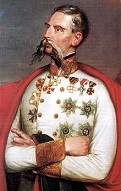



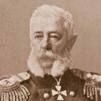


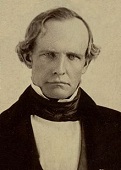




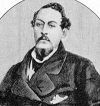
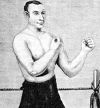


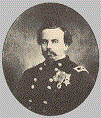


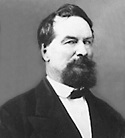


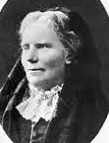

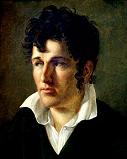




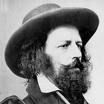
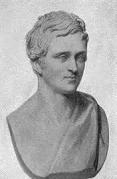

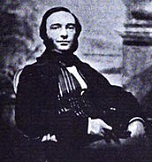







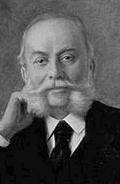
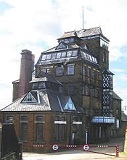
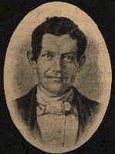
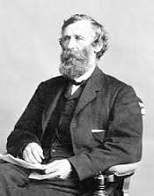
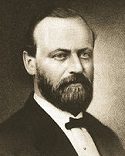
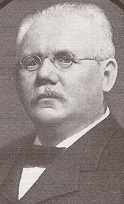
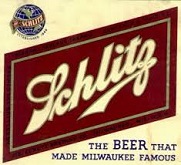





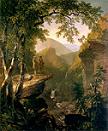
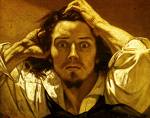
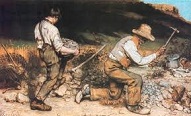

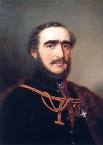
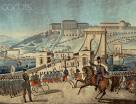
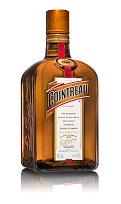
1849 After the failed revs. of 1848 make them want to give up on their home countries, the Forty-Eighters emigrate from Germany, Hungary, Czech. et al. to the U.S., U.K., Australia, Belgium, Netherlands, Switzerland, and France to start over, with a large number bringing wealth and educations that make them successful in their new countries, incl. several beer brewers and wine growers. On Jan. 13 16K British East India Co. troops under gen. (later field marshal) Sir Hugh Gough (1779-1869) fight 23K Sikhs at the Battle of Chillianwalla in the Punjab, with both sides claiming a V, although the Sikhs suffer 3.6K casualties to 4K for the Brits, who are strategically checked; on Feb. 21 the Battle of Gujarat is a V for 24K Brits under Gough against 20K Sikhs and 1.5K Afghans under Gen. Sher Singh Attariwalla, with 2K Sikh vs. 700 British casualties; on Mar. 14 the Battle of Rawalpindi sees the Brits defeat the Sikh army under Chattar Singh and Sher Singh Attariwalla and force them to surrender, after which the Punjab is annexed by Britain and its infant ruler Duleep Singh deposed. Let's shake, shake your daddy-o? On Jan. 22 S.C. Sen. John Caldwell Calhoun (1782-1850) issues the written Southern Address (Address of the Southern Delegates in Congress to Their Constituents) at the behest of "a committee of Southern members of Congress for Southern unity in the face of steady Northern Aggressions and encroachments" on the slavery issue, which, after pointing out that "the British West India possessions are ruined, impoverished, miserable, wretched, and destined probably to be abandoned to the black race", predicts that, if emancipation is ever effected, "it will be through the agency of the Federal Government... against the resistance and struggle of the Southern. It can then only be effected by the prostration of the white race... We would, in a word, change conditions with them [blacks], a degradation greater than has ever yet fallen to the lot of a free and enlightened people, and one from which we could not escape... but by fleeing the homes of ourselves and ancestors, and by abandoning our country to our former slaves, to become the permanent abode of disorder, anarchy, poverty, misery, and wretchedness"; 48 (fewer than half) of the Southern members (incl. not more than 3 Whigs) endorse it, but Calhoun gets brownie, er points as a prophet? In Jan. Buda and Pest are occupied by Austrian Prince Windisch-Graetz, but after he dilly-dallies in his pursuit, the Hungarian army, led by Gen. Arthur Gorgei (Görgei) (Artúr Görgey) (1818-1916) regroups and kicks him out, causing him to be relieved of command by Ahnuld, er, Prince Schwarzenberg, who calls in a Russian army to crush the Hungarian revolt so Austria can concentrate on Prussia, uttering the soundbyte that Austria would "shock the world by the depth of its ingratitude". In Jan. a constituent assembly is elected in Rome, and new elections in Piedmont return a dem. majority to parliament. Smells like teen spirit? On Feb. 9 a rev. mob led by Giuseppe Mazzini (1805-72) overthrows the govt. of Pope Pius IX, and declares the Roman Repub., ending Roman Catholic control of the univ., and causing Pope Pius IX in Naples to appeal to Catholic powers for aid. On Feb. 9 Polish gen. Jozef Bem (1794-1850) (known as "hero of two countries" for helping rev. movements wherever called) defeats the Austrians at the bloody Battle of Piski Bridge, liberating Transylvania. On Feb. 21 the British defeat the Afghans and their Sikh allies in the Battle of Gujrat, and British India annexes the Punjab and Peshawar to create a buffer zone with Afghanistan, but doesn't formalize the boundary for more than 40 years (1893). The original sex, drugs and rock & roll in San Francisco? On Feb. 28 the California Gold Rush begins as the ship SS California arrives in San Francisco Bay, Calif. carrying the first boatload of 365 (called the Argonauts) of 80K white gold-seeking Forty-Niners gold prospectors; Stephen Foster sells the rights to "Oh! Susanna" for $100 to be their theme song?; "I have seen purer liquors, better seegers, finer tobacco, truer guns and pistols, larger dirks and bowie knives, and prettier courtesans here in San Francisco than in any place I have ever visited, and it is my unbiased opinion that California can and does furnish the best bad things that are obtainable in America" - anon.; Pretty Juanita becomes the first person hung in the mining camps; U.S. mint official Matthew F. Stephenson stands on the courthouse steps in Dahlonega, Ga. haranguing miners to stay and mine Georgia gold rather than leave for California, pointing to a nearby peak, and exclaiming, "There's millions in it!"; Mark Twain paraphrases him, writing the immortal line, "There's gold in them thar hills!"; aptly-named Ah Toy (1828-1928) becomes the 2nd Chinese woman to arrive in San Francisco, setting up a brothel in an alley off Clay St., where the fact that she's tall and has lily-bound feet causes block-long lines of horny white men after each ship docks; a man later sends a letter from Hong Kong claiming that she's his wife and requesting her return, but she goes to court and a judge grants her leave to stay; she then returns to court to complain of customers paying the 1 oz. fee with brass filings instead of gold, pointing out several in the audience as culprits, but the judge rules insufficient evidence when she can't explain what the services rendered are, giving the lame explanation "to gaze on the lovely Ah Toy"; within a year she imports five additional Chinese "soiled doves" and moves to a fancier house on Pike St. just off Clay St., then disappears in 1859; in 1926 an obituary in a San Fran newspaper says that she married a wealthy Chinese man and vended clams at Alviso; the San Francisco 49er Egg Rush sees 49ers brave the dangerous shark-infested waters around the Farallon Islands 28 mi. offshore to collect seabird eggs; meanwhile U.S. gen. Bennett C. Riley (1787-1853) (leader of the first military escort along the Santa Fe Trail in 1829) becomes the 7th and last military gov. of Calif. Territory prior to statehood - where he meets up with Zorro? In Feb. King Ferdinand II of Naples offers autonomy to the pesky Sicilians, but is rejected, and when the imposed cease-fire expires on Apr. 8 he invades Sicily and occupies Palermo on May 15, ending the rev. of 1848, then institutes a war-is-hell repressive police state, causing the English to eventually intervene to check his atrocities - it is, in Data's words, an eruption of anti-time? In Feb. the Battle at Fort Utah begins when the mainly friendly Timpanogos Indians begin stealing Mormon cattle, and 50 armed Mormons corner them on Mar. 3 in Battle Creek Canyon and massacre them all, incl. women and children; on Mar. 10 Brigham Young sends 30 families (150 people) to colonize Utah Valley, beginning a fort on Apr. 3, which pisses-off the Timpanogos, who threaten them with death until they swear that they will be good and not drive them away, giving them time to build Fort Utah, going on to hog all their food sources and cause massive starvation, and infect them with measles, causing massive deaths; too bad, in Aug. three Mormons murder Old Bishop and throw his body in the Provo River then brag about it, pissing-off the Timpanogos, who finally agree to a peace treaty in Oct.; too bad, on Jan. 31, 1850 Fort Utah bishop John Higbee meets with Gov. Brigham Young to demand a war, and he authorizes an extermination campaign via Special Order No. 2, ordering the Mormons to kill all the men but save the women and children, announcing the decision to the gen. assembly on Feb. 2, causing the Nauvoo Legion to leave Salt Lake City on Feb. 8, sieging their village for two days until they flee to Spanish Fork River and Rock Canyon, then chasing and killing them like vermin; Mormon frontiersman William Adams "Wild Bill" Hickman (1815-83) finds Rock Canyon leader Old Elk dead, and cuts off his head for the $100 reward offered by Jim Bridger, which is hung by the hair at Fort Utah, after which 50 more heads are taken and piled in boxes near the prisoners to intimidate them before being shipped to Salt Lake, causing rumors of ghosts haunting Rock Canyon; on Feb. 13 15-20 families surrender in modern-day Lake Shore, Utah, only to be executed the next morning, for a total of 102 Timpanogos killed and 40 taken POW and turned into slaves in Salt Lake City before they escape; leaders Old Elk and his wife become martyrs, and Squaw Peak is named after her; in 1868 after allegedly refusing to commit a murder ordered by Brigham Young, Hickman is excommunicated from the LDS Church, causing nine of his 10 wives to leave him, taking their 36-39 children with them; in 1871 Hickman pub. his autobio. Brigham's Destroying Angel, exposing his numerous murders and implicating Brigham Young as the one who ordered him to do them, causing federal authorities to put him under protective custody in Ft. Douglas, Utah to be states' witness against Brigham Young; too bad, the case never goes to trial; in 1850 Fort Utah is renamed Provo, Utah in honor of French-Canadian trapper (1824-5) Etienne (Étienne) Provost (Provot) (Proveau) (1785-1850), later (1875) becoming home to Brigham Young U. On Mar. 1 after Neil McLennan settles in the area in 1845, Waco, Tex. (modern-day pop. 134K/265K) on the Brazos River is founded on lands formerly inhabited by the Waco (Huaco) tribe. On Mar. 3 after a statehood convention in Stillwater, Minn. petitions them, Congress creates the Minnesota Territory (so that Polk gets credit for it); a "lumbering frontier" opens up in Minn.; St. Paul is selected as the capital, and Stillwater is selected as the site of the Minn. territorial prison (opens 1853) (which they thought would be more profitable?). and N Wisc., creating a lumberjack culture that spawns the tall tales of Paul Bunyan and Babe, the Blue Ox, incl. how Paul's cradle created 75-ft. tides in the Bay of Fundy, and how he dug Puget Sound as a sluice for his logs. On Mar. 3 the cabinet-level U.S. Dept. of Interior, brainchild of U.S. treasury secy. Robert J. Walker is created during the short-lived Taylor admin., and the Bureau of Indian Affairs is shifted to it. Just when the U.S. is destabilizing, it gets an unstable no longer rough and no longer ready old fart for president? On Mar. 4 (Sun.) after pres.-elect Taylor refuses to be sworn in on a Sunday, Frogtown, Ky.-born Dem. Mo. Sen. David Rice Atchison (1807-86), pres. pro-tem of the U.S. Senate becomes pres. of the U.S. for one day, which he spends mostly sleeping; actually there was no pres. since Atchison's term had also expired? Tailor Twelve for Me, Rough and Ready? On Mar. 5 (Mon.) Va.-born "Old Rough and Ready" (sloppy dresser) Whig Gen. Zachary Taylor (1784-1850), AKA "Old Rough and Ready", "Old Zack", "the Hero of Buena Vista", "Old Buena Vista" (a career soldier who never voted) becomes the 12th U.S. pres. (until July 9, 1850) in the 17th U.S. Pres. Inauguration in the East Portico of the U.S. Capitol in Washington, D.C. (Tyler 10, Taylor 12?); the first U.S. pres. not previously elected to any public office (and he lasts less than 500 days); his wife Margaret Mackall "Peggy" Smith Taylor (1788-1852) likes to smoke a pipe in private; Millard Fillmore (1800-74) becomes the 12th U.S. vice-pres. (until July 9, 1850); Taylor's inaugural address incl. the soundbyte: "As American freemen we can not but sympathize in all efforts to extend the blessings of civil and political liberty, but at the same time we are warned by the admonitions of history and the voice of our own beloved Washington to abstain from entangling alliances with foreign nations. In all disputes between conflicting governments it is our interest not less than our duty to remain strictly neutral, while our geographical position, the genius of our institutions and our people, the advancing spirit of civilization, and, above all, the dictates of religion direct us to the cultivation of peaceful and friendly relations with all other powers. It is to be hoped that no international question can now arise which a government confident in its own strength and resolved to protect its own just rights may not settle by wise negotiation; and it eminently becomes a government like our own, founded on the morality and intelligence of its citizens and upheld by their affections, to exhaust every resort of honorable diplomacy before appealing to arms. In the conduct of our foreign relations I shall conform to these views, as I believe them essential to the best interests and the true honor of the country"; Taylor eulogizes Dolley Madison as "our first lady for a half-century", becoming the first use of the term for the wife of a U.S. pres., although it doesn't become common until the 20th cent. On Mar. 7 the Austrian consitutional assembly meeting in Kremsier unanimously approves the new federalist 1849 Austrian Constitution of the Reich with a bicameral parliament and universal male suffrage for the lower house, with the emperor having the power to call for a new assembly and suspend legislation, plus choose a minister of state responsible to the parliament; the govt. responds by dissolving the constitutional assembly and substituting its own constitution sansa the federalist system and limiting the franchise to property owners, and then ignores its own constitution and withdraws it officially in 1851. On Mar. 17 William II (b. 1792) dies, and his debauched son ("an uneducated farmer" - Queen Victoria) William III (1817-90) becomes king of the Netherlands and grand duke of Luxembourg (until Nov. 23, 1890). On Mar. 18 a UFO is sighted over the Tortuga Bank in the Caribbean Sea. On Mar. 23 after the Piedmontese govt. renounces its armistice with Austria and invades Lombardy, it is defeated by the Austrians under Marshal Josef Radetzky von Radetz at the Battle of Novara; on Mar. 24 Sardinian king (since 1831) Charles Albert (b. 1798) abdicates in favor of his handlebar-mustachioed son Victor Emmanuel II (1820-78), goes into exile in Portugal, and dies on July 28; Victor Emmanuel II appoints liberal artist-turned-politician Massimo Taparelli, Marquess d'Azeglio (1798-1866) as PM, who threatens to dissolve parliament until it has a liberal majority; on Aug. 6 the Treaty (Peace) of Milan ends the Piedmontese-Austrian War (begun Mar. 23, 1848), and Piedmont-Sardinia becomes the only constitutional monarchy in Italy during the 1850s. On Mar. 28 a new draft constitution for Germany is drafted, but is rejected by King Friedrich Wilhelm IV; the March Rev. in Germany fails, and many disaffected Germans begin emigrating to the U.S., reaching a peak of 252K in 1854. On Mar. 28 the Frankfurt Parliament proclaims a new 1849 German Constitution, providing for a federal system with state govts. and universal male suffrage and secret ballot; too bad, it stumbles on the grossdeutch-kleindeutsch issue (is Austria incl. or not) and never goes into effect; on Mar. 28 the Frankfurt Parliament elects Frederick William IV as "emperor of the Germans" in a proposed All-German Union, but on Apr. 3 he refuses the crown without refusing to head a German state; on Apr. 21 the Prussian govt. rejects the Frankfurt constitution, and it ends up moving to Stuttgart and then dissolving on June 18; in June Dresden-born Friedrich Ferdinand Graf von Beust (1809-86) (you're simply the Beust?) is appointed foreign minister by the king, and begins his rise; the 1848 German rev. is kaput; Prussia, Saxony and Hanover form the "Three Kings Union"; a great German migration to the U.S. begins, bringing their institutions with them, incl. the Turnverein (gymnastic club), causing a revival of gymnastics in the U.S. On Mar. 29 Va. slave Henry "Box" Brown (1815-79) pays $86 to have himself mailed in a dry goods container to Philly abolitionist Presbyterian minister James Miller McKim (1810-74), arriving 27 hours later, his first words being "How do you do, gentlemen?", after which he sings a psalm, and becomes a celeb until the 1850 Fugitive Slave Law forces him to flee to Britain, where he tours with an anti-slavery panorama for 10 years then becomes mesmerist Prof. H. Box Brown AKA the African Prince; McKim attends the 1859 execution of John Brown at Harpers Ferry, Va. and helps his wife take his body home. In the spring tens of thousands of Forty-Niner families pull up stakes and head west to the Calif. gold fields, where the town of Eureka, Calif. (modern-day pop. 27K) is founded on May 13, 1850 on the coast for gold-prospecting "Argonauts", who tap into the 100 mi. Mother Lode, a quartz vein stretching through Tuolumene, Calaveras, Amador and El Dorado counties; Calif.'s non-Indian pop. grows from 14K in 1848 to 224K in 1852 as the gold grows scarcer and the technology grows more involved; meanwhile whites chase out non-whites and hog everything? In Mar. after seeing Calif. and N.M. applying for statehood, the Mormons propose the new State of Deseret, with Brigham Young having a new state constitution drafted based on that of Iowa, sending messengers to Washington, D.C., boldly claiming most of the territory bought (stolen) from Mexico in 1848, from the Sierra Nevada Mts. to the Rocky Mts. incl. the entire watershed of the Colo. River and the entire Great Basin, consisting of modern-day Utah and Nev., with large portions of Ariz., Calif., and smaller portions of Colo., N.M. (excluding the Rio Grande), Wyo., Idaho, and Ore. (excluding the Williamette Valley); afteer Pres. Zachary Taylor offers to combine Deseret with Calif., and the Calif. Constitutional Convention of 1849 is a push, Congress creates Utah Territory on Sept. 9, 1850 (until Jan. 4, 1896), and on Feb. 3, 1851 Brigham Young becomes gov. #1, never giving up the idea of the state of Deseret. On Apr. 13-14 Hungary declares independence, with Lajos Kossuth de Udvard det Kossuthfalva (1802-94) as "gov.-pres."; on June 5 his troops capture Budapest; in June Tsar Nicholas I detours an Austrian-Russian army from Cracow under Count Theodor von Rudiger to defeat him, and Serbs and Romanians join them; on Aug. 13 the Hungarians surrender at the Battle of Vilagos (modern-day Siria, Romania) (near Arad), ending the Hungarian Rev. of 1848 (begun Mar. 15, 1848) after 18 mo. 19 days, after which Austrian gen. ("the Hapsburg Tiger") ("the Hyena of Bescia") ("the Hangman of Arad") Julius Jacob von Haynau is appointed imperial plenipotentiary, brutally subjugating the country, ordering the Oct. 6 hanging of the Thirteen Martyrs of Arad in Arad, along with the execution of Count Lajos Batthyany in Pest; during the hangings in Arad, Austrian soldiers allegedy loudly clank their beer mugs together to celebrate, causing Hungarians to vow to quit clinking their beer glasses until Oct. 6, 1999, continuing it for another decade for good measure. On Apr. 23 Fyodor Dostoyevsky (1821-81) and other members of the young revolutionary Petrashevsky Circle (who meet to read and discuss banned books) are arrested, tried, and sentenced to death, left to stew, then pardoned on Dec. 22 at the last min. before execution, their sentences magnanimously commuted to four years of hard labor in Omsk, Siberia and life servitude in the army, causing Dostoevsky's epilepsy to run wild; after four years at Omsk and one year as an army private in Siberia his commission is restored, but he isn't allowed to return until 1859, during which time he chucks his Socialist internationalist views and goes religious and nationalistic - I got my mind right boss? On Apr. 24 a French force of 10K men under Gen. Nicolas Oudinot lands on the Italian coast and marches to Rome; on May 4 the Austrians begin bombarding Venetian garrisons, causing food riots to break out in the city in June; on May 15 Neapolitan troops reconquer Sicily, and on June 2 Gen. Oudinot sieges Rome, which is defended on the Janiculum Hill by Giuseppe Mazzini and Giuseppe Garibaldi (1807-82), until on June 30 the Roman parliament votes against Mazzini, causing him to leave the city with troops loyal to him, which are then decimated; on July 1 French troops occupy Rome, restore the pope, and dissolve the parliament; the pope then creates a conservative govt. against French wishes. We were a wrong fit right from the start? On May 10 the Astor Opera House Riot in Manhattan, New York City that kills 25 and injures 120+ results from a jealousy feud between stage actors Edwin Forrest (1806-72) of the U.S. and William Charles Macready (1793-1873) of England, caused when Forrest hissed him from the audience in 1843 in Edinburgh after an English audience hissed him in Macbeth, and this time Macready plays Macbeth, the riot causing the militia to be called out; after barely escaping with his life, Macready is forced to leave the U.S., and retires from the stage in 1851; in 1852 Forrest's wife Catherine divorces the ham in a sensational divorce trial, which only boosts his career? On May 16 after the Austrians under gen. Baron Anton von Puchner occupy Oltenia (W Wallachia) and Transylvania then suffer a cholera epidemic, Polish gen. Jozef Bem defeats them at the Battle of Orsova, driving them out of the Banat region. On May 26 a Prussian Union scheme wins approval of several N German states, and by the end of the year 26 states join. On May 28 the French legislative assembly convenes, with the monarchist right and radical left dominating and the moderates in the minority (500-200-80). In May after being exiled from Prussia and printing his final newspaper issue in red, Karl Marx emigrates to London, taking the HQ of the Communist League with him, staying for life; in the winter a schism is led by Prussian-born Johann August Ernst von Willich (1810-78) and German-born Karl Schapper (1812-70), who want an immediate Communist rev., and are expelled; meanwhile they stir up the German Workers' Educational Society of London, and this time they win, so Marx resigns next Sept. 17. On June 5 the new liberal 1849 Denmark Constitution takes effect, ending the absolute monarchy; the bicameral Rigsdag ("kingdom day/session") legislature, consisting of the Folketing and Landsting begins meeting (until 1953); the king retains the right to choose ministers and veto legislation. On June 6 the city of Ft. Worth, Tex. (modern-day pop. 854K/7.1M) ("Where the West begins") is founded 30 mi. W of Dallas as the northernmost of a chain of 10 forts for protecting the U.S. frontier, named after maj. gen. William Jenkins Worth (1794-1849) (who died in Feb. of cholera while trying to establish 10 new forts to mark the W Texas frontier from Eagle Pass to the confluence of the West and Clear Forks of the Trinity River), later being called "Cowtown" after the Chisholm Trail runs through it; it is incorporated in 1873. On June 13 French troops bombard republican Rome, causing the leftist members of the French assembly to walk out in protest. On June 17 Russian troops enter Hungary and quash the revolutionaries by Aug. 13; Constantinople refuses to extradite rebel leader Lajos Kossuth, causing squabbles. In summer a cholera epidemic in Chicago, Ill. caused by bad sanitation causes the Ill. legislature to create the Ill. Board of Sewage Commissioners on Feb. 14, 1855, with Ellis Sylvester Chesbrough (1813-86) as chief engineer, who goes on to build a new above-ground sewer system and raise city bldgs. up to 10 ft. with jacks, incorporating the first manhole covers. In the summer S.C.-born former Texas Ranger John Joel Glanton (Gallantin) (1819-50) forms the Glanton Gang of scalp hunters to work for the Mexican govt. killing Apaches along the U.S.-Mexican border, going too far and killing peaceful Indians and Mexican citizens, causing the state of Chihuahua to put a bounty on their heads in Dec., driving them through Sonora to Ariz; 7-ft. hairless Judge Holden is 2nd in command; meanwhile the Apache Wars (end 1886) begin with the White Massacre on Oct. 18, which sees a band of Utes and Jicarilla Apaches ambush the family of merchant James White, killing him and kidnapping his wife Ann White, who is killed during a U.S. Army rescue attempt a couple of weeks later, leading to the Jicarilla War (ends 1855); Glanton is finally killed on Apr. 23, 1850 by a band of Quechans led by Caballo en Pelo after his men destroy their ferry on the Colorado River; N.H.-born former gang member Samuel Emery Chamberlain (1829-1908) later writes My Confession: The Recollections of a Rogue after rising to brig. gen. in the U.S. Civil War as head of the Fifth Mass. African-Am. Cavalry; meanwhile in winter 1853/4 the U.S. Army enters the Jicarilla War. On July 6 the Danes win the Battle of Fredericia, and set up a provisional govt. in Schleswig, but the hostilities soon resume, keeping them from controlling it (until 1851). On July 31 the Battle of Segesvar (Segesvár) (Schassburg) sees the 6K-man Hungarian Transylvanian army under Polish gen. Jozef Bem annihilated by the 12K-man Russian V Corps under Russian gen. Count Alexander Nikolayevitch von Luders (Lüders) (1790-1874), which Bem survives by faking death; on Aug. 6 he returns to fight at the Battle of Gross-Scheueren. On July 29-Aug. 26 the 1847 British Gen. Election becomes a V for the Conservatives led by Lord Stanley, with 367 seats, vs. 271 for the Whig Party led by Lord John Russell, while the free trader Peelites led by former PM Sir Robert Peel exit the Whig Party; the Irish Repeal Party of John O'Connell wins 20 of 329 seats; Liberal Lionel Nathan de Rothschild (1808-79), son of British Jewish banking house founder Nathan Mayer Rotschild is elected to the British House of Commons from the city of London; too bad, he won't take a Christian oath to be seated, causing a political struggle, with Lord Russell proposing that the oath be amended to allow him to take his seat, and Benjamin Disraeli backing him, arguing that Christianity is "completed Judaism", with the soundbyte: "Where is your Christianity if you do not believe in their Judaism?", while Oxford Bishop Samuel Wilberforce argues against it, implying that the Jews paid-off Russell, after which all but one member (Disraeli) of the future protection cabinet votes against the measure; Conservative Commons leader Lord George Bentinck resigns, and is succeeded by Lord Granby; in 1858 Rothschild is finally allowed to take a Jewish oath, after which in 1868 Queen Victoria refuses to elevate him to the House of Lords, but mellows and elevates his son Nathan Mayer de Rotschild in 1885, who becomes the first unconverted Jewish member. In July the Austrians begin bombarding disease and famine-ridden Venice; on July 28 the grand duke of Tuscany is restored, and on Aug. 6 the assembly gives Manin leave to negotiate with the Austrians, causing the surrender of Venice on Aug. 28, ending the Repub. of Venice and the Italian rev.; Venice is in Austrian hands until 1866; Radetzsky becomes gov. of Upper Italy; Manin goes into exile in Paris. On Aug. 2 Mehmet Ali (b. 1769) dies, and on Nov. 10 his horse-loving grandson Abbas I Helmi (1812-54) becomes pasha (ruler) (viceroy) of Egypt (until July 13, 1854). I thought that dot on your head was from a sniper rifle? On Aug. 9 the Battle of Temesavar (Timosoara) sees Austrian revolutionaries led by Gen. Julius Jacob von Haynau (1786-1853) defeat Hungarian revolutionaries led by Gen. Jozef Bem, who falls from his horse during a calvary charge, causing them to lose; after being seriously wounded, Bem flees to the Ottoman empire with 6K Poles, and pretends to adopt Islam, becoming gov. of Aleppo under the name Yusuf (Murad) Pasha, until he croaks in 1850, becoming a Polish and Hungarian nat. hero. In Aug. after being appointed cmdr. of the French navy in the Pacific in 1846, rear adm. Louis Francois Marie Nicolas Le Goarant de Tromelin (1786-1867) occupies Honolulu, claiming Hawaii for France until he is driven from the fort. On Sept. 17 (Mon.) the Stony Monday Riot in Bytown (later Ottawa), Canada between Tories and Reformists over the planned visit of new (since 1847) British gov.-gen. (1847-54) James Bruce, 8th Earl of Elgin (1811-63) (son of the Elgin Marbles guy) results in 30 injured and one killed, after which an armed standoff on Sappers Bridge is ended by military intervention, and the pro-Elgin party prevails. On Sept. 27 Irish-born Thomas Lynch of the New York Municipal Police (established 1845) becomes the first NYPD cop to die in the line of duty. In Sept. 27-y.-o. Gustave Flaubert finishes his 500+-page novel The Temptation of St. Anthony, and spends several days reading it aloud to his friends Maxime Du Camp and Louis Bouillhet, only to be told that it is so boring it should be burned, and he doesn't pub. it until after the success of Madame Bovary in 1856, 1872, and 1874. In Sept.-Oct. the Calif. Constitutional Convention is held in Monterey, Calif., and on Nov. 13 12K ballots are cast in the first Calif. election, after which the new senators head for Washington, D.C. to petition for statehood; the proactive approach allows them to stop Congress from subdividing the state into neat little squares and keep it big big big? On Nov. 1 Louis Napoleon dismisses the ministry of Barrot, and holds off on appointing a new one until next year. On Oct. 19 the Erfurt Parliament (Nat. Assembly) (Union) confirms the Prussian Union, but Austria threatens a war. On Dec. 3 German missionary Johann Ludwig Krapf (1810-81) becomes the first Euro to sight Mount Kenya. On Dec. 6 Harriet Tubman (1820-1913) escapes from slavery, reaching Philly 100 mi. away and joining the super-secret Underground Railroad, which smuggles runaway slaves from Ky. and W. Va. N across Ohio to Detroit ("Midnight"), then across the Detroit River to Windsor, Ont., Canada ("Dawn"), then to other communities in Ont. incl. Elgin, Buxton, and Chatham; they allegedly "follow the Drinking Gourd", the pointer stars in the Big Dipper on the way N to the Ohio River; starting next year Tubman makes the first of 19 journes to slave states to help escaping slaves. On Dec. 20 Nashville, Tenn.-born Dem. Peter Hardeman Burnett (1807-95) becomes Calif. gov. #1 (until Jan. 9, 1851), becoming the first to resign. On Dec. 25, 1849 a 100-wagon train traveling W from Salt Lake City headed for the Calif. gold fields enters a parched depression near the Calif.-Nevada border hoping for a shortcut, and after a stay at Furnace Creek they get stranded near Bennett's Well, sending William Manly and John Rogers for help; 2 weeks later they reach the San Fernando Valley 200 mi. to the SW, obtain supplies, and head back; after 25 days they return, finding all to have survived but one, and as they leave they issue the soundbyte "Goodbye, Death Valley", giving Death Valley its name; by next year small amounts of gold are discovered at Salt Spring, followed by silver, copper and lead. On Dec. 29 the Scottish barque Ayeshire wrecks on the Brigantine shoals of Atlantic City, N.J., after which 201 persons are saved by special life-saving equipment consisting of a line and a closed car. In Dec. after Lord Rothschild visits Athens on Greek Orthodox Easter Sun. (Apr. 4), and the govt. attempts to please him by banning the tradition of hanging an effity of Judas Iscariot, causing the Greeks to take it out on the nearest Jew, the Athens home of Moorish Jew (Gibraltar-born British subject) (former Portuguese consul-gen. to Greece)Don David Pacifico (1784-1854) is burned by an anti-Semitic mob while the police watch and cheer, causing him to press claims against the Greek govt., and after they refuse, t he British place an embargo on all Greek vessels in the Piraeus and finally seize them in Jan. A rev. in Tuscany causes grand duke Leopold II to flee, but he returns in a few mo. after a counterrev. succeeds. Britain annexes Punjab by treaty with the maharajah of Lahore. Bukovina becomes an autonomous duchy administered from Vienna (until 1914). The U.S. Tariff of 1849 favors the Middle Atlantic and New England manufacturers with higher duties on finished goods. Abbott Lawrence, U.S. rep. from Mass. 1834-6, 1838-40 becomes U.S. minister to Great Britain (until 1852). U.S. Sen. Benjamin Tappan (1773-1857) is censured for leaking private info. on Texas annexation. The Swiss federal assembly forbids recruiting of Swiss mercenary soldiers by foreign powers, ending their longtime pastime. In Sarah C. Roberts v. City of Boston, the Mass. Supreme Court (chief justice Lemuel Shaw) originates the doctrine of "separate but equal" regarding school segregation. Ft. Laramie in Wyoming Territory (founded 1834) becomes a military outpost, as well as a major stopping point on the Overland (Oregon) Trail; the fort is garrisoned until 1890. Mich. becomes the first U.S. state to host a state fair. The Calif. Gold Rush causes many whaling ship crews to desert, leading to a decline in the industry. Great Britain proclaims Vancouver Island a crown colony (until 1866). Hungarian Croatia takes over the seaport of Fiume (until 1870). Cape Colony forbids the landing of convicts. Britain passes the Encumbered Estates Act, making it possible, on the petition of creditors, to sell estates encumbered with debts after cutting the legal intricacies; though well-meaning, it proves a disaster to the Irish tenants it was designed to help. King (since 1834) Honjong II of Korea dies, and Cholchong Ch'oljong ("the summit") (1831-64) (distant relative of Yeongjo) becomes Yi king #25 of Korea (until 1864), ending the repression of Roman Catholics; the Annals of the Choson (Joseon) Dynasty, which began with T'aejo in 1392 ends with his reign. Argentina prepares for war with Paraguay, causing its enemies Brazil and Uruguay to recognize it. A state monopoly on alcohol in Nicaragua leads to revolts against the govt. and cane planters, while Indians rebel against land seizures by whites and mestizos; meanwhile the conservatives defeat the liberals and introduce coffee cultivation - one lump or two? The 1849 Cruelty to Animals Act is passed by the English Parliament, replacing the 1822 Cruel Treatment of Cattle Act and the 1835 Cruelty to Animals Act. The Mormons in Utah adopt a Utah Constitution and send a delegate to the U.S. Congress to petition for admission in the Union, which is denied. The Athapascan-speaking acorn-eating Hupa Tribe in the Hoopa Valley of the Trinity River of NW Calif., known for dentalium-shell and woodpecker scalp currency ends its long isolation as the Forty-Niners move in and drive them from their homes; they are finally given a Rez in 1864. The Marshalsea court of justice, under the marshal of the English royal household is abolished. Lola Montez (1821-61), who was kicked out of Munich by the revolutionaries last year to London, marries British soldier George T. Heald, but it doesn't last, and she divorces him and travels to the U.S. in 1851 to become a star. Cornelius Vanderbilt (1794-1877) of New York City obtains a concession from the liberal govt. of Nicaragua to build an interoceanic canal to milk the Calif. Gold Rush, using the profits to invest in railroads, and using Robber Baron methods to destroy fair competition and create a Microsoft, er, monopoly, ending up with a wealth of $105M, three times what Bill Gates is later worth in adjusted dollars; meanwhile he gives Robber Barons their bad name by whoring at the docks, mistreating his family, getting syphilis and giving it to his wife, spitting on the floor whenever he wants, and telling people who ask for charity "Let them do what I have done". Baton Rouge (Fr. "red pole") on the Mississippi River (founded 1719, incorporated 1817) becomes capital of La. David Livingstone ventures beyond the Tropic of Capricorn, crosses the Kalahari Desert and discovers Lake Ngami. The Order of the Star Spangled Banner is founded in New York, and grows into a serious third party fostering hatred of foreigners and Catholics. William Hamilton fires a pistol sans bullet at Queen Victoria in Hampstead, North London, and receives a sentence of 7 years of transportation to Australia. English-born Elizabeth Blackwell (1821-1910) becomes the first woman in the U.S. to receive a medical degree, a M.D. from the Medical Inst. of Geneva, N.Y.; her sister Emily Blackwell (1826-1910) gets her M.D. from Western Reserve U. in 1854, and together in 1856 they found the New York Infirmary for Women and Children, with an all-female physician staff - look what sister made for you-ou-ou? Abraham Lincoln fails to win a 2nd term in Congress, and returns to Springfield, Ill., where he begins speaking out against slavery to revitalize his career. Nevada (Nev.) is settled. Petropavlovsk in Siberia, Russia is founded. Toronto becomes the capital of Canada (until 1851). Telegraph Hill in San Francisco, Calif. is set up in Sept. on one of Frisco's Seven Hills, and named for a semaphore. A 2-story log house becomes the first bldg. erected in Vancouver, Wash.; in 1852 it becomes the first military post in the territory, where Capt. U.S. Grant serves as quartermaster. Bedford College for Women is founded in London. John M. Bradstreet (1815-63) founds the Bradstreet Co., becoming the first U.S. co. to offer standardized credit ratings; it merges with the R.G. Dun Corp. (Mercantile Agency) in 1933. Henry Varnum Poor (1812-1905) becomes ed. of Am. Railroad Journal, which evolves in 1860 into Standard & Poor's, which pub. financial research and analysis on stocks and bonds. Amelia Jenks Bloomer (1818-94) wears loose ankle-length trousers below knee-length skirts (promoted by early women's libber Mrs. Elizabeth Smith Miller as more modest than the customary floor-length dresses with no underwear) on a lecture tour, earning press ridicule for her Bloomers and starting a U.S. craze, immortalizing her name; when used as underpants they become known as (directoire) knickers. The Iowa Star is founded, becoming the first newspaper in Des Moines. Charles Dickens begins editing the weekly mag. Household Words, going on to pub. 19 vols. in 1850-9. The first comic strip in Britain, Leech's Mr. Briggs appears in Punch. The first Royal Caledonian Ball for charity is held in London, attended by Scots from all over the world in full dress; in 1930 it begins to be held at Grosvenor House in Park Lane. German dramatist Heinrich Laube (1806-84) becomes dir. of the Hofburg Theater in Vienna (until 1867). The 47.6-mi. Panama (Canal) Railway (originally the Inter-Oceanic Railroad) running parallel to the Panama Canal and linking the Atlantic Ocean to the Pacific Ocean is founded; construction begins next year, and the first revenue train runs on Jan. 28, 1855. The Calif. Gold Rush makes instant millionaires out of some miners, who actually are Shakespeare literate, demanding performances and correcting wrong lines, throwing buckskin purses full of gold to show appreciation; a favorite performer is McKean Buchanan (1823-72), who once performs on the stump of a giant redwood tree called the Discovery Tree (Big Stump) in Calaveras Grove. The first mental institutions in China are founded by Western missionary John G. Kerr et al. The LDS Church establishes the Perpetual Emigrating Fund Co. (Perpetual Emigration Fund) to provide economic assistance (low-interest loans) to 30K Mormons emigrating to Salt Lake Valley in Utah; it is disincorporated by Congress in 1887, and reincorporated in 2001 as the Perpetual Education Fund. British archeologist-geologist William Kennett Loftus (1820-58) discovers the ancient city of Uruk, along with the 21st cent. B.C.E. Ziggurat of Nana (Nanna) (Ur) near Nasiriya in modern-day Dhi Qar Province, Iraq, dedicated to the Sumerian Moon god Nana (Nanna) (Sin). In 1851 he excavates Susa for the British Museum, discovering the Persepolis Apdana. In Feb. 1855 he discovers the burnt 9th cent. B.C.E. Palace of Assurnasirpal II in Nimrud near modern-day Mosul, Iraq. German immigrant Charles (Karl) Pfizer (1824-1906) and his cousin Charles (Karl) F. Erhard (1821-91) found Charles Pfizer & Co. in New York City to produce fine chemicals, going on to discover Terramycin in 1950, acquire Warner-Lambert in 2000, Pharmacia in 2003, and Wyeth in 2009, marketing popular drugs incl. Lipitor, Lyrica, Diflucan, Viagra, Celebrex, and Zoloft. Hook Norton Brewery is founded in Oxfordshire, England as a Victorian tower brewery with different brewing stages on different floors, going from top to bottom, all driven by a steam engine in 1899-2006; a horse-drawn dray delivers beer to the local village; modern-day bottled beers incl. Old Hooky and Hooky Gold. The Joseph Schlitz Brewing Co. is founded in Kilbourntown, Milwaukee, Wisc. by Miltenberg, Bavaria-born Georg August Krug (1815-56), and acquired in 1858 after his death by his Mainz, Germany-born bookkeeper Joseph Schlitz (1831-75), who doubles Chicago sales after the 1871 Great Chicago Fire before being lost at sea in 1875, after which Krug's four nephews starting with Georg Carl August Uihlein (1842-1911) found a dynasty that runs the co. permanently; the logo is a globe girdled by a buckled belt and support by four playful female figures representing the four hemispheres, with gnomes at their feet, the whole structure supported by four beer keg pedestals (3 kegs/pedestal) with a trumpet-blowing herald on top; the ad slogans are "The beer that made Milwaukee famous" and "When you're out of Schlitz, you're out of beer"; in 1886 the co. produces 600K barrels/year, and each employee drinks an avg. of 40 "short glasses" of free beer a day, with the plant champion downing 100 (3 gal.); in 1888 brewery employees in Milwaukee, New York, and Chicago go on strike; in 1889 the Schlitz Hotel is built, followed in 1896 by Palm Garden; in Dec. 1902 the co. passes Pabst, becoming the largest brewery in the U.S. (1M barrels/year); too bad, in the early 1970s it cheapens its formula without telling consumers, pissing them off and ruining their market, causing them to slip to #2 by 1976 behind Anheuser-Busch after recalling 10M bottles, then run an ad campaign for 10 weeks in 1977 by Leo Burnett seemingly ordering the viewers to drink Schlitz or else, which pisses-off customers more; in 1981 a strike closes the Milwaukee plant; in 1982 after slipping to #3 it is acquired by Stroh Brewery Co., which is acquired in 1999 by Pabst Brewing Co; in 2008 the 1960s classic "gusto" formula is reintroduced; in 2014 Pabst Brewing Co. is acquired by TSG Consumer Partners. The U.S. Mint begins minting $20 Double Eagle Gold Coins (until 1933), containing 30.0926g of 90% gold and 10% copper alloy. The Adam Schuppert Brewery is founded in Gold Rush City San Francisco, Calif., becoming the first in Calif.; by 1852 San Francisco (pop. 36K) has 350 saloons, increasing to 800 by 1860, with 24 breweries. Cointreau Distillery is founded in Angers, France by confectioner Adolph Cointreau and his brother Edouard-Jean Cointreau, selling guignolet cherry liqueur before introducing the wondrous 80-proof orange-flavored Cointreau liqueur in 1875 (made with bitter and sweet orange peels), with sales growing to 13M bottles/year by 2017; it claims to have been part of the original recipes for margaritas and cosmopolitans. Architecture: Starting this year San Francisco, Calif. becomes the primo building site for 48K Painted Ladies, designed in the Victorian style until the death of Queen Victoria in 1901, then changing to the Edwardian style until 1915, when war surplus battleship gray Navy paint is used; Postcard Row at 710-720 Stiner St. across from Alamo Square is built in 1892-6; the 1906 San Francisco Earthquake wipes out most of the mansions on Nob Hill, after which mass-produced houses replace them; "Red, yellow, chocolate, orange, everything that is loud is in fashion... if the upper stories are not of red or blue... they are painted up into uncouth panels of yellow and brown." The Szechenyi Chain Bridge (Szechenyi Ianchid) across the Danube River between Buda and Pest (first non-pontoon bridge) is built by Count Istvan Szechenyi (István Széchenyi) (1791-1860) - Steven the Chain? Sports: On Feb. 7 the first widely-publicized boxing match in the U.S. sees Tom Hyer (1819-64), son of the first (1816) U.S. boxing champ Jacob Hyer defeat English boxer Yankee Sullivan (1811-56) in round 16 (total 17 min. 18 sec.) in Still Pond Creek, Md., winning a $10K purse and becoming the first recognized world boxing champ. The first Field Hockey (from Fr. "hoquet") club is founded in Blackheath, London. The Scottish Bowling Assoc. is founded in Scotland by 200 lawn bowling clubs; after it goes defunct, it is refounded in 1892. Architecture: The 1,017-ft.-long Holyoke Dam across the Connecticut River is built, furnishing the town of Holyoke, Mass. (8 mi. N of Springfield) at the foot of 1,214-ft. Mt. Tom with water power and putting it on the map. A lighthouse is built on Cape Agulhas (Port. "needles"), the southernmost point of Africa, 100 mi. ESE of the Cape of Good Hope. 800 sq. mi. (510K acre) W.T. Waggoner Ranch near the Red River in N Tex. 13 mi. S of Vernon, Tex. and W of Wichita Falls, Tex. is founded, becoming the 2nd largest ranch in Tex. after the King Ranch, largest fenced ranch in the U.S., and largest estate on Earth, becoming the "Statue of Liberty of cowboy culture." Brookwood Cemetery in London is founded by the London Necropolis Co., becoming the largest cemetery on Earth by 1854 (until ?); it opens to the public on Nov. 13, 1854. Inventions: Norwich, N.Y.-born inventor Gail Borden Jr. (1801-74) of Tex. (who helped plot the towns of Houston and Galveston in 1836) invents the concentrated "meat biscuit" (beef broth and flour) for travelers going West, revolutioning travel by allowing meat to be transported great distances without spoiling - if I only had some milk to drink with it? After planting 22K seedlings of the indigestible hard-skinned fox (skunk) grape Vitis labrusca in an attempt to develop a palatable wine from "pure" native Am. species to get around the "debauched" European and Semitic species Vitis vinifera, the slip-skin Concord Grape is invented by Boston-born gold leaf artisan and amateur farmer Ephraim Wales Bull (1806-95) of Concord, Mass.; too bad, after he fails to obtain a patent others begin growing and selling them, turnng them into grape juice, jelly, Communion and sacramental wine, and Kosher wine; his epitaph reads "He sowed others reaped." Artificial fertilizers are first manufactured in the U.S. Science: French physicist Armand Hippolyte Louis Fizeau (1819-96), who predicted the red shift of electromagnetic waves measures the speed of light, and next year he measures the speed of electricity; still not fizzing out in 1864, he becomes the first to prose that the length of a light wave be used as a length standard. English chemist Edward Frankland (1825-99) isolates amyl. Henry Clifton Sorby (1826-1908) pioneers the field of microscopic petrography, the examination of mountains with microscopes. English botanist Richard Spruce (1817-93) begins an expedition to South America (ends 1864), discovering yage (ayahuasca), the hallucinogenic drink used by Amazonian tribes that is prepared from the bark of giant flowering vines (Banisteria caapi). Nonfiction: A&C Black, Who's Who; lists names of all notable people in the U.K., adding bios. in 1897. Horace Bushnell (1802-76), God in Christ; gets him tried for heresy by the Congregational Church, but he aces it and is acquitted. Thomas Carlyle (1795-1881), Occasional Discourse on the Negro Question (Feb.); argues for the reintroduction of slavery in the West Indies, and coins the term "the dismal science" for political economics; "...not a gay science... no, a dreary, desolate, and indeed quite abject and distressing one; what we might call, by way of eminence, the dismal science." Francois-Rene de Chateaubriand (1768-1848), Memoirs from Beyond the Grave (Memoirs d'Outre-Tombe) (autobio.) (posth.) (2 vols.) (1848-50); originally intended it to be pub. 50 years after his death, but financial problems forced him "to mortgage my tomb"; "Far from being at its term, the religion of the Liberator is now only just entering its third phase, the political period, liberty, equality, fraternity" (ending); "A degree of silence envelops Washington's actions; he moved slowly; one might say that he felt charged with future liberty, and that he feared to compromise it. It was not his own destiny that inspired this new species of hero: it was that of his country; he did not allow himself to enjoy what did not belong to him; but from that profound humility what glory emerged! Search the woods where Washington's sword gleamed: what do you find? Tombs? No; a world! Washington has left the United States behind for a monument on the field of battle." Sir John Gilbert (1817-97), The Plays of Shakespeare. Chapin Aaron Harris (1806-60), Dictionary of Dental Surgery, Biography, Bibliography, and Medical Terminology; first dental dictionary pub. in the U.S.; 6th ed. in 1898. Rev. Josiah Henson (1789-1883), The Life of Josiah Henson, Formerly a Slave, Now an Inhabitant of Canada, as Narrated by Himself. Henry William Herbert (1807-58), The Field Sports of the United States and British Provinces (pub. under alias Frank Forester). Alexander Hislop (1807-65), The Red Republic. J.M. Kemble, History of the Saxons in England - full flavor that's easy to drink? John Pendleton Kennedy (1795-1870), Memoirs of the Life of William Wirt (2 vols.); 2nd ed. 1850. Soren Kierkegaard (1813-55), The Sickness Unto Death; pub. under alias Anti-Climacus; treats despair, which he equates with original sin. Alphonse de Lamartine (1790-1869), Confidences. Karl Richard Lepsius (1810-84), Denkmaeler aus Aegypten und Aethiopien nach den Zeichnungen der von Seiner Majestät dem Koenige von Preussen, Friedrich Wilhelm IV., nach diesen Ländern gesendeten, und in den Jahren 1842–1845 ausgeführten wissenschaftlichen Expedition auf Befehl Seiner Majestät (12 vols.) (Monuments from Egypt and Ethiopia with Drawings Made the 1842-1845 Expedition Sent by Frederick William IV, King of Prussia); contains almost 900 plates of ancient Egyptian hieroglyphic inscriptions; becoming the std. textbook. William Francis Lynch (1801-65), Narrative of the United States' Expedition to the River Jordan and the Dead Sea. Augustus De Morgan (1806-71), Trigonometry and Double Algebra. Luise Muhlbach (Klara Mundt), Aphra Behn (3 vols.). Francis Parkman (1823-93), The Oregon Trail: Sketches of Prairie and Rocky-Mountain Life; an account of his 2-mo. summer 1846 tour of Neb., Wyo., Colo., and Kan., incl. hunting buffalo with the Oglala Sioux. Samuel Birley Rowbotham, Zetetic Astronomy: Earth Not a Globe; founds the modern flat Earth movement. John Ruskin (1819-1900), The Seven Lamps of Architecture (vol. 2 of "Modern Painters"); defends the Gothic style. Francesco De Sanctis (1817-83), Saggi Critici (Critical Essays); makes a disciple of Benedetto Croce. David Friedrich Strauss (1808-74), Life of Christian Friedrich Daniel Schubart (2 vols.). Henry David Thoreau (1817-62), On the Duty of Civil Disobedience; inspired by a night spent in jail for refusing to pay a poll tax; "That government is best which governs least"; "It is not desirable to cultivate a respect for the law, so much as for the right"; A Week on the Concord and Merrimack Rivers (with his brother John) - John goes, left, Henry goes right? Wilhelm Weitling (1808-71), Garantien der Harmonie und Freiheit (Guarantees of Harmony and Freedom); confuses harmony, Fourier, socialism, French and German in order to sell opera? Music: Adolphe Charles Adam, Le Toreador (opera). Teodoro Cottrau (1827-79), Santa Lucia (Naples); first Neapolitan song to be given Italian lyrics; about the waterfront Borgo Santa Lucia district in Naples Bay; ends up being sung during the St. Lucy winter light festival (darkest time of the year). Fromental Halevy (1799-1862), La Fee aux Roses (opera). Franz Liszt (1811-86), Tasso's Lament (symphonic poem) (Weimar). Giacomo Meyerbeer (1791-1864), Le Prophete (Prophčte) (opera) (Paris Opera) (Apr. 16); libretto by Eugene Scribe; incl. Coronation March. Carl Otto Nicolai (1810-49), The Merry Wives of Windsor (Die Lustigen Weiber von Windsor) (opera) (Jan.) (Berlin); dies of a stroke 2 mo. after the debut. Giuseppe Verdi (1813-1901), La Battaglia di Legnano (opera) (Jan. 27) (Teatro Argentina, Rome); libretto by Salvatore Cammarano; based on Joseph Mery's play "La Battaille de Toulouse"; Luisa Miller (opera) (Dec. 8) (Teatro San Carlo, Naples); libretto by Salvatore Cammarano; based on Friedrich von Schiller's play "Kabale und Liebe". Art: Gustave Courbet (1819-77), A Burial at Ornans (After Dinner at Ornans); The Stone-Breakers; shocks the Romantics with its realism. Thomas Couture (1815-79), Volunteers of 1793. Eugene Delacroix (1798-1863), Ceiling of Salon d'Apollon at the Louvre. Asher Brown Durand (1796-1886), Kindred Spirits; shows late fellow Hudson River School artist Thomas Cole (1801-48) with poet William Cullen Bryant in the Catskills; sold by Sotheby's in May 2005 for $35M. Eugene Fromentin (1820-76), La Place de la Breche a Constantine; launches his career painting Romantic scenes from N Africa esp. Algeria. Jean Louis Ernest Meissonier (1815-91), A Day in June (unfinished); The Smoker. John Everett Millais (1829-96), Lorenzo and Isabella; based on "Isabella" by Keats (1820); draws comparisons with early Flemish and Italian masters; Christ in the House of His Parents (1849-50); panned by critics as "too Jewish" for its "gawky" Jesus, the public protest causing Queen Victoria to have it delivered to Buckingham Palace for a private viewing; "A" wry-necked boy in a nightgown who seems to have received a poke playing in an adjacent gutter" (Charles Dickens); "The attempt to associate the Holy Family with the meanest details of a carpenter's shop, with no conceivable omission of misery, of dirt, of even disease, all finished with loathsome minuteness, is disgusting" (London Times); "A painful display of anatomical knowledge, and studious vulgarity of portraying the youthful Saviour as a red-headed Jew boy, and the sublime personage of the virgin a sore-heeled, ugly, every-day sempstress [seamstress]" (Builder). John Ruskin (1819-1900), The Seven Lamps of Architecture. Plays: Henri Murger (1822-61), Scenes de la Vie de Boheme (Varietes, Paris); a big hit, later turned into operas by Puccini and Leoncavallo. Eugene Scribe (1791-1861), Adrienne Lecouvreur (comedy) (Theatre Francais, Paris). Poetry: Arthur Hugh Clough (1819-61), Ambarvalia; Amours de Voyage. James Thomas Fields (1817-81), Poems. Leigh Hunt (1784-1859), A Book for a Corner (2 vols.). Alphonse de Lamartine (1790-1869), Raphael. Edgar Allan Poe (1809-49), Annabel Lee (last poem) (posth.). Alfred, Lord Tennyson (1809-92), In Memoriam A.H.H.; original title "The Way of the Soul"; starts out as a memorial for his Cambridge U. friend Arthur Henry Hallam (1811-33), son of historian Henry Hallam, who died of a brain hemorrhage in Vienna, after which he spends 17 years turning it into his opus maximus, stirring controversy with its meditations on the meaning of evolution after reading "Vestiges on the Natural History of Creation" by Robert Chambers (1844); "'Tis better to have loved and lost/ Than never to have loved at all"; "Tho' Nature, red in tooth and claw/ With ravine, shriek'd against his creed"; "Are God and Nature then at strife,/ That Nature lends such evil dreams?/ so careful of the type she seems,/ So careless of the single life." Novels: Matthew Arnold (1822-88), The Strayed Reveller. Charlotte Bronte (1816-55), Shirley (2nd novel); 1811-12 Yorkshire during the Luddite riots; Fieldhead Estate; makes the man's name Shirley popular for women. Fernan Caballero (1796-1877), La Gaviota (in French). Dinah Craik (1826-87), The Ogilvies. Charles Dickens (1812-70), David Copperfield (autobio. novel) (1849-50); original title "Mag's Diversions"; Dickens' most popular work, and personal favorite; Leo Tolstoy becomes a big fan; David is born at midnight on a Fri. 3 mo. after his father dies, and his mother Clara, who employs loving nurse Clara Peggoty marries mean Mr. Murdstone (brother of icy Jane Murdstone), who abuses David, breaking his mother's heart enough to kill her, then pulls David out of school and sends him to a grim London blacking factory, where he lodges with ever-overspending good-hearted landlord Wilkins Micawber ("something will turn up") until he is sent to debtors' prison, then runs away, is adopted by great-aunt Betsey Trotwood of Dover (who hates men, and keeps donkeys on her lawn) and her doting hubby Mr. Dick, who send him to school in Canterbury, after which when he grows up he works as a clerk for lawyer Spendlow, whose daughter Dora he marries in Ch. 43, then loses to sickness, after which he marries childhood sweetheart Agnes Wickfield, unattainable dream babe of 'umble greasy-palmed law clerk Uriah Heep (who blackmails lawyer Wickfield and is exposed by Micawber) as his 2nd wife in Ch. 62, realizing his dream of being a writer; Mr. Dick; Barkis; Em'ly Peggoty; harp-playing powder keg Miss Rosa Dartle ("I only ask for information") and her cad lover James Steerforth, who disfigured her lip with a hammer; "I Am Born" (ch. 1); "To begin my life at the very beginning, I was a posthumous child"; coins the phrase "old as the hills". James Anthony Froude (1818-94), The Nemesis of Faith; comes out about his break with the Anglican faith, getting him kicked out of Oxford U., where he was fellow and deacon, causing him to become a prof. historian instead, with a big axe to grind. Henry William Herbert (1807-58), The Deerstalkers. Charles Kingsley (1819-75), Alton Locke: Tailor and Poet: An Autobiography; rev. ed. 1856. Herman Melville (1819-91), Mardi; Redburn. James Kirke Paulding (1778-1860), The Puritan and His Daughter. George Sand (1804-76), Little Fadette (La Petite Fadette) (Fanchon the Cricket); written after her return from Paris to the countryside of Chateauroux; English trans. pub. in 1900; identical twins Landry and Sylvinet are inseparable until Landry is forced to go to work on a neighboring farm, and falls for Fadette; Francois le Champi. Jules Sandeau (1811-83), La Chasse au Roman. Theodor Storm (1817-88), Immensee. Births: Scottish Unionist politician-statesman-banker Alexander Hugh Bruce, 6th Baron Balfour of Burleigh (d. 1921) on Jan. 13 in Kennet, Clackmannashire; educated at Eton School, and Oriel College, Oxford U.; son of Robert Bruce. Russinan "Chronicle of Four Generations" historical novelist Vsevolod sergeyevich Solovyov (d. 1903) on Jan. 13 (Jan. 1 Old Style) in Moscow; son of Sergei Solovyov (1820-79); brother of Vladimir Solovyov (1853-1900). French symbolist painter-lithographer Eugene Anatole Carriere (Carričre) (d. 1906) on Jan. 16 in Gournay-sur-Marne (Seine-Saint-Denis); grows up in Strasbourg; pupil of Cabanel; known for brown monochrome gray-misty works, which helps spawn Picasso's Blue Period; friend of Auguste Rodin. Australian PM #1 (1901-3) (Freemason) Sir Edmund Barton (d. 1920) on Jan. 18 in Glebe, Sydney. Swedish "The Dance of Death" poet-dramatist-novelist-artist Johan August Strindberg (d. 1912) on Jan. 21 in Stockholm. Am. Miami, Fla. founder ("the Mother of Miami") Julia DeForest Tuttle (nee Sturtevant) (d. 1898) on Jan. 22 in Cleveland, Ohio. Am. archeologist ("the Father of American Archeological Photography") John Henry Haynes (d. 1910) on Jan. 27 in Rowe, Mass.; educated at Williams College. Am. whiskey distiller Jasper Newton "Jack" Daniel (d. 1911) in Jan. in Lynchburg, Tenn.; of Scots-Irish, Scottish, and Welsh descent. Am. New York City Dem. mayor #94 (1910-13) (Roman Catholic) William Jay Gaynor (d. 1913) on Feb. 2 in Oriskany, N.Y. French "Le Flibustier", "Les Chanson de Gueux" poet-novelist-dramatist Jean Richepin (d. 1926) on Feb. 4 in Medea, Algeria. Canadian chemist (inventor of peanut butter) Marcellus Gilmore Edson (d. 1940) on Feb. 7 in Bedford, Quebec. Norwegian realist Four Greats novelist-dramatist Alexander Lange Kielland (d. 1906) on Feb. 18 in Stavanger. Am. classical scholar William Gardner Hale (d. 1928) on Feb. 9. English Tory radical politician Lord Randolph Henry Spencer-Churchill (d. 1895) on Feb. 13 in Bleinheim Palace, Oxfordshire; 3rd son of John Winston Spencer Churchill, 7th duke of Marlborough (1822-83); f ather of Sir Winston Churchill (1874-1965); educated at Eton School, and Merton College, Oxford U; coiner of the term "Tory Democracy". English surgeon (Quaker) (brain surgery pioneer) Sir Rickman John Godlee, 1st Baronet 9d. 1925) on Feb. 15 in Upton, Essex; educated at Univ. College London; created baronet in 1912. French Coggia's Comet astronomer Jerome Eugene Coggia (d. 1919) on Feb. 18 in Ajaccio, Corsica. Austrian Luger designer Georg Johann Luger (d. 1923) on Mar. 6 in Steinach am Brenner, Tyrol; grows up in Padua, Italy. Am. Russell Burbankpotato horticulturist Luther Burbank (d. 1926) on Mar. 7 in Lancaster, Mass. English painter Robert Wiedeman Barrett "Pen" Browning (d. 1912) on Mar. 9 in Florence; son of Robert Browning (1812-89) and Elizabeth Barrett Browning (1806-61). Am. inventor Charles Francis Brush (d. 1929) on Mar. 17 in Euclid Township, Ohio; educated at the U. of Mich. German WWI grand adm. Alfred Peter Friedrich von Tirpitz (d. 1930) on Mar. 19 in Kustrin, Brandenburg, Prussia. English "The Lady of Shalott", "Ophelia" Pre-Raphaelite painter ("the modern Pre-Raphaelite") John William Waterhouse (d. 1917) on Apr. 6 in Rome, Italy. German surgeon Ludwig Wilhelm Carl Rehn (d. 1930) on Apr. 13 in Bad Sooden-Allendorf; educated at the U. of Marburg. German mathematician Felix Christian Klein (d. 1925) on Apr. 25. German chancellor (1900-9) Prince Bernhard Heinrich Karl Martin von Bulow (Bülow) (d. 1929) on May 3 in Klein-Flottbeck (Hamburg), Holstein; son of Count Bernhard Ernst von Bulow (1815-79); great-uncle Heinrich von Bulow is Prussian ambassador to England 1827-40; created prince in 1905. Am. Muckraker journalist and slum reformer Jacob August Riis (d. 1914) on May 3 in Ribe, Denmark; emigrates to the U.S. in 1870. Japanese empress consort (1869-1912) Shoken (Haruko) (Masako Ichijo) (d. 1914) on May 9 in Kyoto. French "Theatre d'Amour" dramatist-novelist Georges de Porto-Riche (d. 1930) on May 20 in Bordeaux. English Buckingham Palace architect Sir Aston Webb (d. 1930) on May 22 in Clapham, South London; son of Edward Webb; collaborator of Edward Ingress Bell (1837-1914); knighted in 1904. French Impressionist painter Paul Albert Besnard (d. 1934) on June 2 in Paris. Honduran pres. (1883-91) Gen. Luis Bogran Barahona (d. 1895) on June 3 in Santa Barbara; descended from French immigrants named Beaugrand; half-brother of Francisco Bogran; 1st cousin of Miguel Paz Barahona; educated at the U. of San Carlos. Russian PM (1905-6) Count Sergei (Sergius) Yulyevich Witte (d. 1915) on June 29 (June 17 Old Style) in Tiflis; father's side is Lutheran German, mother's side is Russian nobility. English Stead Act #1 journalist (investigative journalism pioneer) William Thomas Stead (d. 1912) on July 5 in Embleton, Northumberland; invents the interview in 1884. Canadian physician-writer-educator ("Father of Modern Medicine") Sir William Osler, 1st Baronet (d. 1919) on July 12 in Bond Head (Tecumseh), Ont., Upper Canada; educated at McGill U.; created baronet in 1911. Austrian architect Hermann Gottlieb Helmer (d. 1919) on July 13 in Harburg upon Elbe, Germany; collaborator of Ferdinand Feller (1847-1916). German musicologist Karl Wilhelm Julius Hugo Riemann (d. 1919) on July 18 in Grossmehlra (near Sondershausen). Am. Dem. New York City mayor #91 (1898-1901) Robert Anderson Van Wyck (d. 1918) on July 20 in New York City; educated at Columbia U. Am. journalist Talcott Williams (d. 1928) on July 20 in Abeih, Turkey; Congregationalist missionary parents; educated at Amherst College. Am. "The New Colossus" poet (Jewish) (Zionist) Emma Lazarus (d. 1887) on July 22 in New York City; of Portuguese Sephardic ancestry; related to Benjamin Cardozo; father is a wealthy sugar refiner. German writer-physician and Zionist leader (Jewish) Max Simon Nordau (Sudfeld) (d. 1923) on July 29 in Budapest; gets assimilated, goes German and marries a Protestant woman, then is converted to Zionism by Theodor Herzel after the Dreyfus Affair. Canadian geologist George Mercer Dawson (d. 1901) on Aug. 1 in Pictou, N.S.; educated at McGill U., and Imperial College London. Am. gasoline-powered farm tractor inventor John Froelich (d. 1933) on Aug. 9 in Clayton County, Iowa. Am. "Monadnock in Winter" painter (inventor of camouflage) Abbott Handerson Thayer (d. 1921) on Aug. 12 in Boston, Mass. Am. vacuum cleaner magnate William Henry "Boss" Hoover (d. 1932) on Aug. 18 in New Berlin (North Canton), Ohio; of Swiss descent; educated at Mt. Union College; brother of Frank G. Hoover (1883-1954); husband of Susan Troxel Hoover (1846-1925); father of Herbert William Hoover Sr. (1877-1954). English "Invictus" poet-dramatist-critic-ed. ("the Samuel Johnson of the Late Victorian Era") William Ernest Henley (d. 1903) on Aug. 23 in Gloucester; pupil of poet Thomas E. Brown; friend and collaborator of Robert Louis Stevenson. French journalist-novelist-poet Emile (Émile) Goudeau (d. 1906) on Aug. 29 in Perigeux, Dordogne. Am. crypto-lez writer Sarah Orne Jewett (d. 1909) on Sept. 3 in South Berwick, Maine; lover of Annie Adams Fields (1834-1915). Russian Pavlov Dog physiologist Ivan Petrovich Pavlov (d. 1936) on Sept. 14 in Ryazan, Russia; father is the village priest; educated at the U. of St. Petersburg. Am. actor Herbert Arthur Chamberlayne "Maurice" Barrymore (d. 1905) on Sept. 21 in Amritsar, Punjab, India; educated at Harrow School, and Oxford U.; husband (1876-93) of actress Georgiana Drew (1856-1893); father of Lionel Barrymore (1878-1954), Ethel Barrymore (1879-1959), and John Barrymore (1882-1942). English poet-critic-biographer Sir Edmund William Gosse (d. 1928) on Sept. 21 in London; son of naturalist Philip Henry Gosse (1810-88); translates Henrik Ibsen and other Scandinavian writers to English. Belgian Flemish Impressionist (Luminist) painter Emile Claus (d. 1924) on Sept. 27 in Sint-Eloois-Vijve. Am. Presbyterian minister and real estate developer (founder of Aurora, Colo.?) Rev. Donald George Fletcher (d. 1929) on Sept. 29 in Cobourg, Ont., Canada; of Scottish descent. Austrian mountaineer (Kilimanjaro) Ludwig Purtscheller (d. 1900) on Oct. 6 in Innsbruck. Greek arms dealer and financier Sir Basil Zaharoff (Basileios Zacharias) (d. 1936) on Oct. 6 in Mugla, Ottoman Empire; becomes French citizen. British netball inventor Martina Sofia Helena Bergman-Osterberg (Bergman-Österberg) (d. 1915) on Oct. 7 in Sweden. Am. "Little Orphant Annie" poet ("the Hoosier Poet") ("the Children's Poet") James Whitcomb Riley (d. 1916) on Oct. 7 in Greenfield, Ind.; creator of Little Orphan Annie and the Raggedy Man. Am. Hawaiian shipping magnate William Matson (Wilhelm Mattson) (d. 1917) on Oct. 18 in Lysekil, Vastra Gotaland; emigrates to the U.S. in 1863. German mathematician Ferdinand Georg Frobenius (d. 1917) on Oct. 26. Am. Impressionist painter William Merritt Chase (d. 1916) on Nov. 1 in Williamsburg (Nineveh), Ind. Brazilian finance minister (1889-91) (abolitionist) ("the Eagle of the Hague") Ruy (Rui) Barbosa de Oliveira (d. 1923) on Nov. 5 in Salvador, Bahia. Am. stage actor James O'Neill (d. 1920) on Nov. 15 in Kilkenny; father of Eugene O'Neill (1888-1953); acts 5,352x in the play "The Count of Monte Cristo", commenting "I believe that I should have lost my memory and mind altogether had I continued to keep up the strain." German Prussian gen. Friedrich Adolf Julius von Bernhardi (d. 1930) on Nov. 22 in St. Petersburg, Russia; emigrates to Schopstal, Silesia in 1851; first German to ride through the Arc de Triomphe in 1871. Czech philosopher Fritz Mauthner (d. 1923) on Nov. 22 in Horschitz. British-Am. "Little Lord Fauntleroy", "The Secret Garden", "A Little Princess" children's writer Frances Eliza Hodgson Burnett (d. 1924) on Nov. 24 in Cheetham Hill, Manchester. German field marshal Anton Ludwig August von Mackensen (d. 1945) on Dec. 6 in Haus Leipnitz, Saxony; boasts of his descent from a Highland chieftain named Mackenzie, then when WWI starts changes it to the village of Mackenhausen. Swedish suffragist educationalist-writer (proponent of state child support) Ellen Key (d. 1926) on Dec. 11 in Sundsholm Mansion, Sweden. Am. publisher (Collier's Weekly founder) (Roman Catholic) Peter Fenelon Collier (d. 1909) on Dec. 12 in Myshall, County Carlow, Ireland; father of Robert Joseph Collier (1876-1918); uncle of Robert Collier (1885-1950). Am. industrialist and art collector Henry Clay Frick (OE "brave man") (d. 1919) on Dec. 19 in West Overton, Penn. Am. "A Kentucky Cardinal" novelist James Lane Allen (d. 1925) on Dec. 21 near Lexington, Ky. English economist William Cunningham (d. 1919) on Dec. 29 in Edinburgh, Scotland; educated at Trinity College, Cambridge U. Am. Oglala Sioux Chief Crazy Horse (Tashunca-Uitco) (d. 1877); on the winning end of Custer's Last Stand. Syrian Muslim scholar and Arab nationalist Abd al-Rahman al-Kawakibi (d. 1903) in Aleppo. Am. artist Edwin Lord Weeks (d. 1903) in Boston, Mass.; pupil of Leon Bonnat and Jean-Leon Gerome. Egyptian liberal scholar-jurist ("Founder of Islamic Modernism") Muhammad Abduh ('Abduh) (d. 1905) in the Nile Delta. Am. dietitian ("The Great Masticator") Horace Fletcher (d. 1919); teaches Fletcherism, the practice of chewing food slowly and thoroughly (32 times) to aid digestion, with the soundbyte: "Nature will castigate those who don't masticate." Afghanistan emir (1879) Muhammad (Mohammed) Ya'qub (Yaqub) (Yakub) Khan (d. 1923); son of emir Shir Ali Khan. Swedish "Brinell Test" metallurgist J.A. Brinell (d. 1925). Am. New Thought leader Josephine Emma Curtis Hopkins (d. 1925) in Killingly, Conn. Am. coloraturo soprano (black) Marie Selika Williams (d. 1937) in Natchez, Miss.; grows up in Cincinnati, Ohio. Deaths: French fur trader Jean-Pierre Chouteau (b. 1758) on July 10 in St. Louis, Mo. Japanese artist Katsushika Hokusai (b. 1760) on May 10 in Edo (modern-day Tokyo). Am. statesman-diplomat Albert Gallatin (b. 1761) on Aug. 12 in Astoria, N.Y. Am. clergyman Ethan Smith (b. 1762) in Royalston, Mass. Spanish-Mexican chemist Andres Manuel del Rio (b. 1764) on Mar. 23 in Mexico City. Chinese scholar Juan Yuan (b. 1764) on Nov. 27 in Yangzhou, Jiangsu. Dutch gen. David Hendrik, baron Chasse (b. 1765) on May 2 in Breda. English poet-historian William Smyth (b. 1765) on June 24 in Norwich. Am. inventor Jacob Perkins (b. 1766) on July 30 in London. Russian naval cmdr. Pavel Chichagov (b. 1767) on Sept. 1 (Aug. 20 Old Style). Anglo-Irish "Castle Rackrent" writer Maria Edgeworth (b. 1767) on May 22. U.S. First Lady (1809-17) Dolley Madison (b. 1768) on July 12. French-born English engineer Sir Marc Isambard Brunel (b. 1769) on Dec. 12 (stroke). Egyptian ruler (1805-48) Mehmet Ali (b. 1769) on Aug. 2 in Alexandria. German brewer Franz Xaver Zacherl (b. 1772) on Sept. 16 in Aus. Italian polyglot cardinal Giuseppe Caspar Mezzofanti (b. 1774) on Mar. 15 in Rome. English-born Am. painter John Rubens Smith (b. 1775) on Aug. 21 in New York City. English architect Thomas Rickman (b. 1776) on Jan. 4 in Birmingham. French salon host (Napoleon's opponent) Julie Recamier (b. 1777) on May 11 in Paris. British gen. Benjamin d'Urbain (b. 1777) on May 25 in Montreal, Canada. English poet-novelist Horace Smith (b. 1779) on July 12 in Tunbridge Wells. German chemist Johann Wolfgang Dobereiner (b. 1780) on Mar. 24 in Jena, Saxe-Weimer-Eisenach. Am. Baptist preacher William Miller (b. 1782) on Dec. 20 in Hampton, N.Y. British gov.-gen. of India (1836-42) George Eden, 1st earl of Auckland (b. 1784) on Jan. 1 in Hampshire. English artist William Etty (b. 1787) on Nov. 13 in York. Dutch king (1840-9) William II (b. 1792) on Mar. 17. U.S. gen. William Jenkins Worth (b. 1794) on May 7 in San Antonio, Tex. (cholera); his monument is built in Manhattan, N.Y. at 25th St. between 5th Ave. and Broadway. U.S. pres. #11 James Knox Polk (b. 1795) on June 15 in Nashville, Tenn. Am. educator Mary Mason Lyon (b. 1797) on Mar. 5: "There is nothing in the universe that I fear but that I shall not know all my duty, or shall fail to do it." Sardinian-Piedmontese king (1831-49) Charles Albert (b. 1798) on July 28 in Porto, Portugal (exile). Viennese waltz composer Johann Strauss I (b. 1804) on Sept. 25 in Vienna (scarlet fever). French mathematician Pierre Francois Verhulst (b. 1804) on Feb. 15 in Brussels. Am. "The Raven", "The Case of Amontillado", "Masque of the Red Death" #1 horror writer Edgar Allan Poe (b. 1809) on Oct. 7 in Baltimore, Md.; dies after being found delirious from a drinking binge on Oct. 3 at the Horse You Came In On Saloon in Fell's Point (founded 1775), repeatedly calling the name "Reynods" (allergy, rabies, diabetes, murdered?); dies 10 days before a planned marriage with 2nd wife Sarah Elmira Royster Shelton (his boyhood sweetheart), atempting to accompany Mrs. Clemm to it; his cousin Neilson Poe doesn't announce his death publicly, and only 10 show up for his funeral; the train carrying his tombstone crashes; his lit. executor Rufus Griswold pub. a mean obituary that damages his rep for decades until he is rediscovered by Charles Baudelaire, Stephane Mellarme, and Paul Valery; he finally gets a proper funeral in 2009; last words: "The best thing a friend could do for me is blow my brains out... Lord help my poor soul"; his home at 85 W. 3rd St., New York City is later claimed to be haunted; beginning on Jan. 19, 1949, the Poe Toaster, a mysterious stranger dressed in black and wearing a fedora hat begins laying three roses and a half-filled bottle of cognac on Poe's grave marker in Baltimore for his birthday, and in 1977 Poe House curator Jeff Jerome begins holding a vigil for him; in 1993 he leaves a note saying "The torch will be passed"; in 2001 he leaves a note mentioning the NFL Baltimore Ravens; in 2007 former ad exec Sam Porpora (1915-) claims to be him - the good die young? Polish poet Juliusz Slowacki (b. 1809) on Apr. 3 in Paris. Polish-French Romantic composer-pianist Frederic Chopin (b. 1810) on Oct. 17 in Paris at Place Vendome 12 (TB?) (cystic fibrosis?); suffers from temporal lobe epilepsy, as proved by suddenly leaving the stage during a 1848 performance of his Sonata in B flat minor in Manchester, England after seeing monsters emerge from the piano?; his body is buried in Paris and his heart in Holy Cross Church in Warsaw; his Paris funeral on Oct. 30 draws 3K. German composer Otto Nicolai (b. 1810) on Mar. 9 (stroke). Swabian "Watch on the Rhine" poet Max Schneckenburger (b. 1819) on May 3 in Burgdorf, Switzeland. English novelist Anne Bronte (b. 1820; the youngest of the three Bronte sisters goes 2nd. Hungarian poet Alexander Petofi (b. 1823) on July 31 in Segesvar; last seen in the Battle of Segesvar. Italian nat. anthem poet-writer Goffredo Mameli (b. 1827) on July 6 in Rome; dies of an infection from an amputated leg.